GROOTE SCHUUR HOSPITAL
A more holistic approach for healthcare

SOLARCENTURY AFRICA
Harnessing the sun’s energy to enhance the continent’s power

GROOTE SCHUUR HOSPITAL
A more holistic approach for healthcare

Harnessing the sun’s energy to enhance the continent’s power

We dial in with CEO, Khalil Al Americani, to discuss facilitating sustainable connectivity for the country


For over a decade, our portfolio of in-house magazines has been lovingly produced, printed, and distributed to our esteemed subscribers across the globe from our headquarters in the UK.


But now we are moving with the times, adopting a digital-first approach by producing online-only publications. A major factor in this decision is to minimise our environmental footprint, reducing the carbon emissions involved in the logistics of print magazine distribution and the resources required therein.
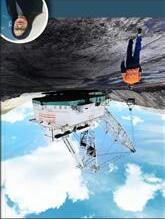


Going forward, we will provide print orders of any magazine in-line with the requests of our featured companies, subscribers, and conference & expo partners.



Please get in touch for a print-on-demand quote or visit our website to find out more.
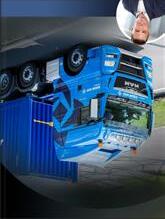

“We always planned that when our digital subscribers consistently accounted for 85% of our total magazine subscribers, we would cease printing our publications in-line with our environmental and sustainability goals.”
– Ben Weaver, CEO, Outlook Publishing Ltd
EDITORIAL
Editorial Director: Phoebe Harper phoebe.harper@outlookpublishing.com
Senior Editor: Marcus Kääpä marcus.kaapa@outlookpublishing.com
Editor: Jack Salter jack.salter@outlookpublishing.com
Editor: Lucy Pilgrim lucy.pilgrim@outlookpublishing.com
Junior Editor: Ed Budds ed.budds@outlookpublishing.com
Junior Editor: Rachel Carr rachel.carr@outlookpublishing.com
PRODUCTION
Production Director: Stephen Giles steve.giles@outlookpublishing.com
Senior Designer: Devon Collins devon.collins@outlookpublishing.com
Designer: Sophs Forte sophs.forte@outlookpublishing.com
Junior Designer: Louisa Martin louisa.martin@outlookpublishing.com
Production Assistant: Megan Cooke megan.cooke@outlookpublishing.com

Digital Marketing Manager: Fox Tucker fox.tucker@outlookpublishing.com
Social Media Executive: Bria Clarke bria.clarke@outlookpublishing.com
Web Editor: Oliver Shrouder oliver.shrouder@outlookpublishing.com
BUSINESS
CEO: Ben Weaver ben.weaver@outlookpublishing.com
Managing Director: James Mitchell james.mitchell@outlookpublishing.com
Sales Director: Nick Norris nick.norris@outlookpublishing.com
Regional Director: Joshua Mann joshua.mann@outlookpublishing.com
TRAINING & DEVELOPMENT MANAGER
Marvin Iseghehi marvin.Iseghehi@outlookpublishing.com
BUSINESS DEVELOPMENT DIRECTOR
Thomas Arnold thomas.arnold@outlookpublishing.com
HEADS OF PROJECTS
Callam Waller callam.waller@outlookpublishing.com
Eddie Clinton eddie.clinton@outlookpublishing.com
Deane Anderton deane.anderton@outlookpublishing.com
Ryan Gray ryan.gray@outlookpublishing.com
SALES MANAGERS
Sales & Partnerships Manager: Donovan Smith donovan.smith@outlookpublishing.com
Josh Hyland josh.hyland@outlookpublishing.com
PROJECT MANAGERS
Alfie Wilson alfie.wilson@outlookpublishing.com
Bex Middleton bex.middleton@outlookpublishing.com
Cameron Lawrence cameron.lawrence@outlookpublishing.com
Jordan Sibley jordan.sibley@outlookpublishing.com
Kyle Livingstone kyle.livingstone@outlookpublishing.com
Taylor Green taylor.green@outlookpublishing.com
ADMINISTRATION
Finance Director: Suzanne Welsh suzanne.welsh@outlookpublishing.com
Finance Assistant: Suzie Kittle suzie.kittle@outlookpublishing.com
Finance Assistant: Victoria McAllister victoria.mcallister@outlookpublishing.com
CONTACT
Africa Outlook
First Floor, Norvic House, 29-33 Chapelfield Road
Norwich, NR2 1RP, United Kingdom.
Sales: +44 (0) 1603 363 631
Editorial: +44 (0) 1603 363 655
SUBSCRIPTIONS
Tel: +44 (0) 1603 363 655 phoebe.harper@outlookpublishing.com www.africaoutlookmag.com
Like us on Facebook: facebook.com/africaoutlook Follow us on Twitter: @africa_outlook
Welcome to our 102nd issue of Africa Outlook magazine. As mobile connectivity broadens its reach across the continent, bringing the power of digital connection to an unprecedented scale, we foreground the movers and shakers of the telecommunications industry.
One such entity is our cover star, Vodacom DRC. A facilitator of sustainable and people-centric digital connectivity, we follow the company’s pursuit of providing widespread access across both urban and remote areas throughout the underdeveloped territory of the Democratic Republic of the Congo (DRC).
“The DRC has a very exciting business environment for the telecommunications industry. We haven’t yet reached all potential consumers and there is definitely room for growth,” outlines Vodacom DRC’s CEO, Khalil Al Americani.
Elsewhere, operating in another region ripe with potential, ATCOMM tells a similar story as we speak with CEO, Sebastian Dalais, about democratising connectivity for Mauritius.
“There’s more room for clients to benchmark with the increasing number of operators and services. As a result, there is a healthy choice for the people of Mauritius, and we find that we are a big part of that,” he shares.
Meanwhile, powering these technological advances is Africa’s ever-evolving energy sector. Jumping onboard the cross-continental solar-coaster, we speak with major players in the field including the South African Photovoltaic Industry Association (SAPVIA) and Solarcentury Africa. After the latter established its reputation by completing more solar hybrid projects than any other company in Africa, it is now pursuing utility-scale projects for major industrial clients such as mines.
Finally, set to make a significant impact on the African energy landscape, we take a look at OpenMod4Africa as the ambitious EU project aimed at developing sustainable and reliable energy systems for the continent.
With a host of other fascinating insights and corporate stories, we hope that you enjoy your read.
Phoebe Harper Editorial Director, Outlook PublishingREGULARS
6 NEWS
Around Africa in seven stories
8 EXPERT EYE
Expediting the evolution of African livestock monitoring
BUSINESS INSIGHTS
12 Technology
Advancing Angolan Air Travel
The airline with the people-centric digital edge
14 Energy & Utilities
An End to Energy Poverty
Global collaboration to impact Africa’s energy landscape
TOPICAL FOCUS
16 Retail
Like, Share, and Buy
The advent of social commerce in a tech-savvy market

INDUSTRY SPOTLIGHT
18 South African

Photovoltaic Industry Association
Delivering a bright future powered by solar PV
EVENTS
170 ITW Africa
Accelerating connectivity In Africa
17 2 THE FINAL WORD
What are your greatest motivators as a leader?
32

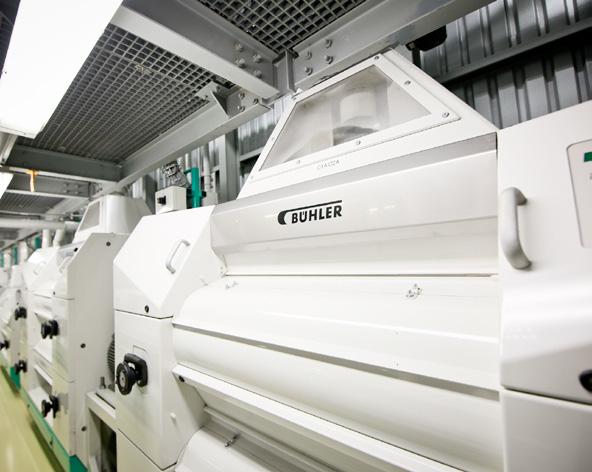
Tell
Dedicated
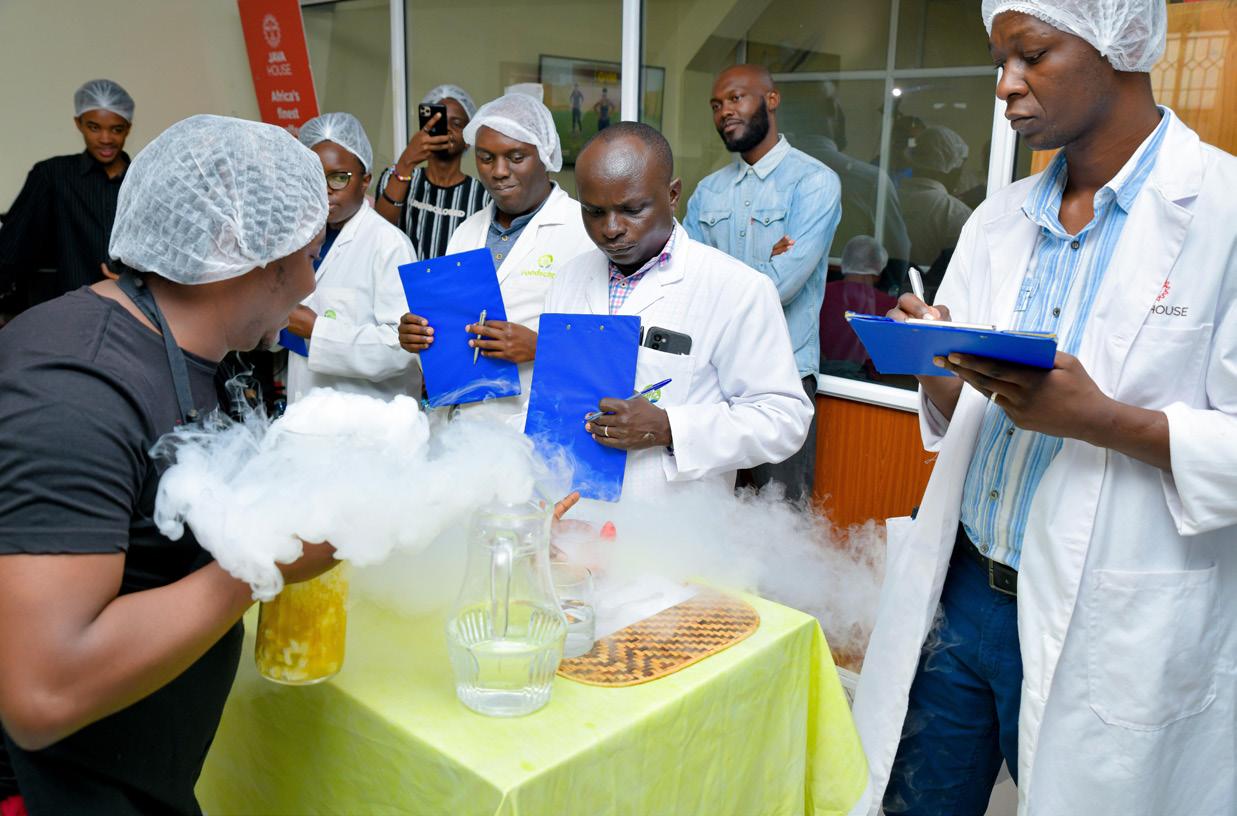
162
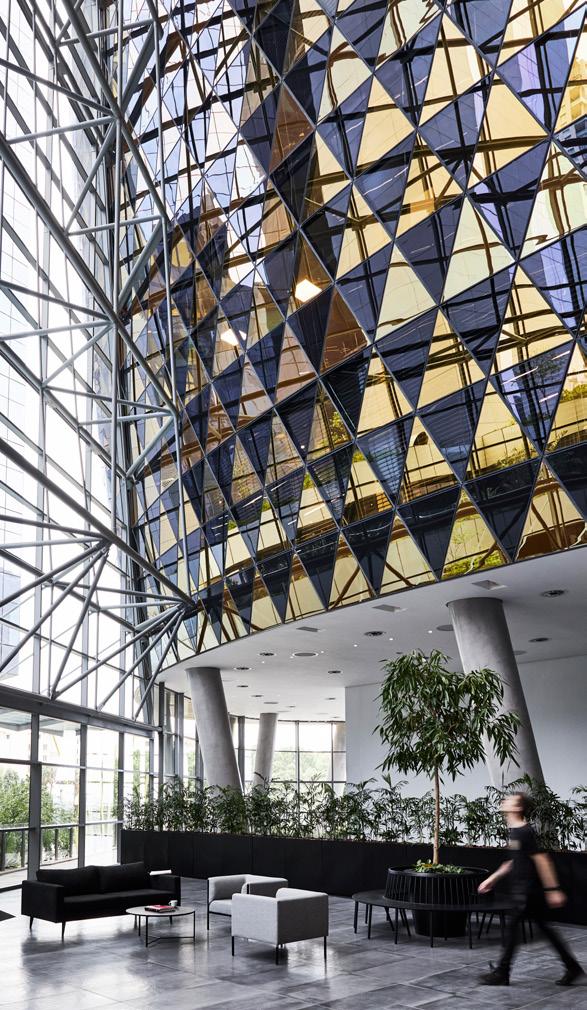
Africa is experiencing an uptick in over-the-top and unreasonable requests from tourists who are new to safari vacations. Potential clients are asking if they can breed a white rhino or ride a lion.


To enable progress in the shape of sustainability, safety, and animal welfare, Discover Africa is spurning the wishes of travellers, who are consequently booking elsewhere –namely in locations with no code of conduct. Director and co-Founder of Discover Africa, Andre Van Kets, states, “social media plays a role in hyping up anything unusual.”
ELON MUSK’S STARLINK is making its debut in Western Africa this year. Nigeria became the first country on the continent to experience the satellitebased internet service, followed by Rwanda, Mauritius, and Mozambique.
The next country connecting to Musk’s broadband service will be Sierra Leone. Moreover, Starlink’s Low-Earth Orbit (LEO) satellites are positioned approximately 550 kilometres (km) from Earth - a much closer distance than traditional satellites, which are 35,000km above the planet’s surface. The close proximity enables the network to provide coverage to remote parts of the continent at no extra cost.

AT A SIGNING ceremony in the capital city Nairobi, Kenya made its trade deal with the European Union (EU) official. Safeguarding exports, the Economic Partnership Agreement will guarantee duty-free access to its farm produce.
The EU accounts for 21 percent of Kenya’s overall exports as the
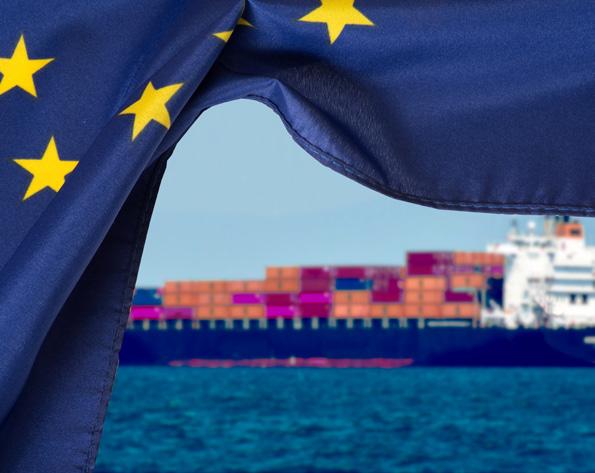
Ironically, the hospitality industry may have accidentally worsened the growing sense of traveller entitlement by accommodating clients’ demands.
country is a major exporter of flowers, fruits, vegetables, tea, and coffee. Additionally, European products entering Kenya will see tariffs reduced over a 25-year period under the agreement. It was one of the fastest deals the EU has ever struck, taking only seven months to negotiate.
Kenya is also pursuing a trade and investment deal with the US, which is expected to be finalised next year.
FUEL SUBSIDIES HAVE ended in Nigeria, therefore tripling petrol prices. President Bola Tinubu has called upon citizens, who are already contending with 20 percent inflation, sporadic petrol shortages and an unpredictable electricity supply, to show patience. The abolition of fuel subsidies has also sent transport and food prices soaring.
Nigeria is one of Africa’s biggest oil producers, however, it spends billions of dollars on imported fuel due to the failure of its state refineries. A
litre of petrol has risen from NGN190 to NGN540, with four out of 10 Nigerians living on the poverty line prior to the price hike.


CÔTE D’IVOIRE HAS its first water ambulance, designed for patient transfers and emergency care. Equipped with four beds, oxygen, a defibrillator, and a heart monitor, it can transport several health professionals along with the relatives of the patient.
AND
company Red Rock Resources is primed to start lithium production in Zimbabwe. This follows an environmental impact assessment (EIA), where
Although Red Rock Resources has interests in other minerals such as gold and copper, this will be its first project in Zimbabwe. Now that the company has clearance, mining can begin on site, and it can start shipping the product immediately.
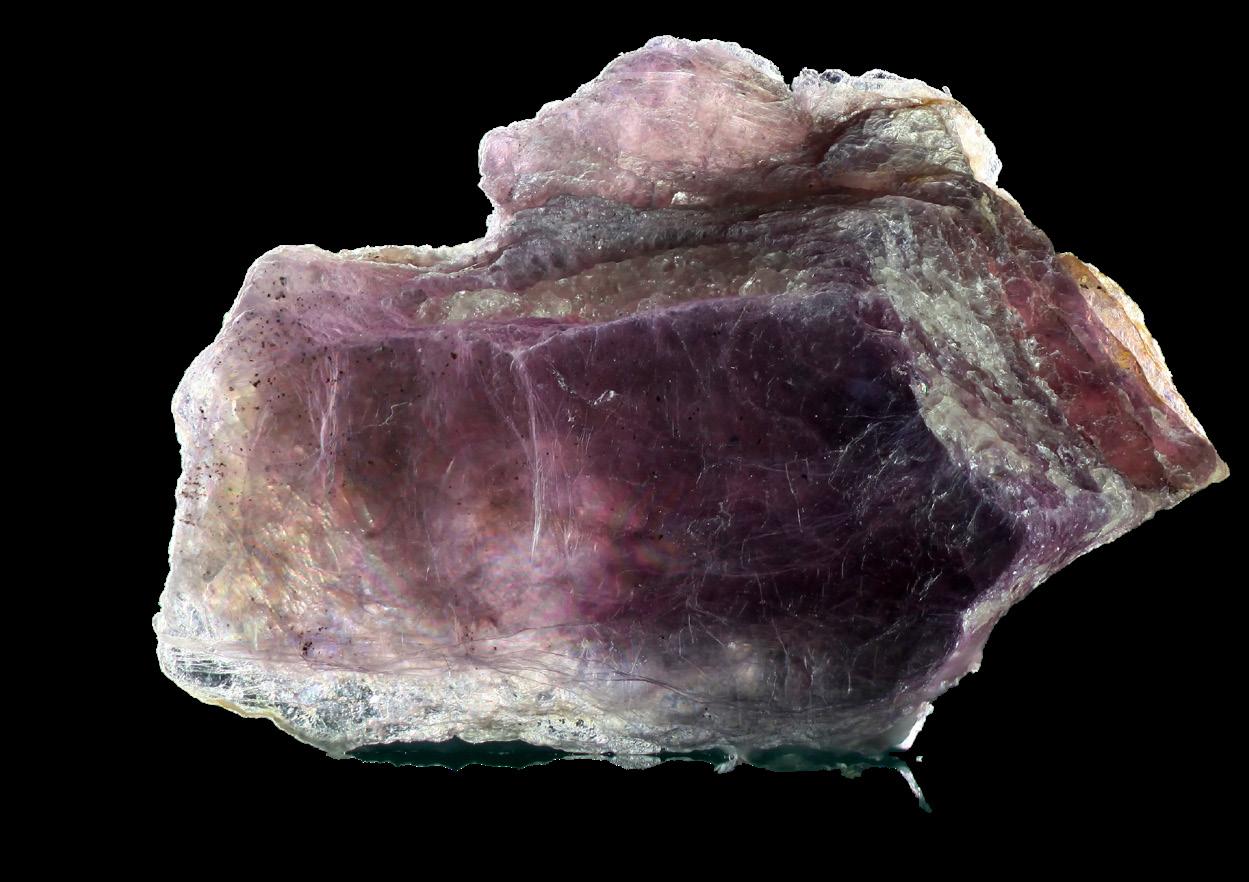
Red Rock Resources is developing a series of lithium projects across Zimbabwe, which has the largest lithium reserves in Africa.
The boat ambulance serves 16 villages bordering a lagoon. Residents had experienced difficulty accessing the health centres based in Assini-Mafia and Asswindé. Previous emergencies relied upon finding a canoe – without medical staff. The free of charge rescue vehicle was funded by Assini-Mafia’s city council, which it bought for €76,000.
ACCORDING TO GHANA’S Finance Minister, Ken Ofori-Atta, the country is making progress in renegotiating its debt repayments with foreign creditors. The country is hoping to restructure its external debt before the first review of the International Monetary Fund (IMF) agreement later this year.
Ghana wants to defer interest payments worth GHS137.3 billion. When addressing the media in Accra, Ofori-Atta gave an indication that the country was in the process of clinching a new deal with its lenders in the coming weeks.
The minister said that the IMF has created fertile ground for implementing measures to revive the economy but added that Ghanaians should brace themselves for muchneeded reforms.
Streamline is a specialist in asset tracking services and has been in the tracking industry for more than 30 years. As technologies have advanced, Streamline now designs bespoke solutions for a wide range of tracking use cases and has expanded into livestock tracking management for farming unions and associations.
South Africa has stringent compliance laws around the movement, placement, and sales of livestock, in order to ensure pure sales that are not impacted by Foot and Mouth Disease (FMD). Streamline turned to CommsCloud, floLIVE’s leading reseller in Africa, to design a bespoke, interactive Internet of Things (IoT) solution that would offer farmers the visibility and control they needed over their animals. This would ensure compliance, and reduce the heavy costs associated with movement bans. By working with CommsCloud and floLIVE, Streamline has quickly deployed hundreds of IoT device trackers in South Africa, obtaining realtime visibility over cattle placement and movement.
Anywhere animals travel, Streamline’s customers can view where devices are, and even gain granular insight into behaviours, such as when animals are being chased or have been stolen. Using floLIVE’s multi-IMSI solution, Streamline is not locked into any specific operator, and can ensure always-on connectivity wherever animals roam. Utilising both Narrowband IoT (NB-IoT) and satellite connectivity, Streamline aims
• Hundreds of devices already in the field, with the potential for 7.5 million across South Africa
• Real-time intelligence into livestock placement and behaviour, ensuring regulatory compliance and reduced theft
• Always-on connectivity, with zero visibility gaps, using both NB-IoT and satellite technologies
to deploy hundreds of thousands of devices before the end of 2023.
According to the World Bank, more than 1.3 billion people globally rely on small-scale livestock production for their livelihoods and their nutritional needs. In some areas of South Africa, cattle production makes up as much as 80 percent of the agricultural GDP.

Regulation is fierce, often aimed at reducing the spread of diseases such as FMD. In fact, in 2022, the South African government placed movement restrictions on all cloven-hoofed animals, with the goal to reinstate its FMD-free status. The export of cattle meat cannot take place unless the animals have been in a disease-free area for a certain period of time.
Working with farming unions and associations, Streamline set out to support its customers with managing this colossal challenge, accurately tracking livestock using IoT devices to facilitate compliance, without adding heavy manual efforts.
Streamline wanted to be able to offer farmers:
Real-time traceability: Knowing where livestock are at any given time would be a game-changer for ensuring compliance, and provide buyers, retailers and end consumers with peace of mind that all meat is FMD-free.
Accurate tracking: Traditional methods of tracking livestock use radio-frequency identification (RFID) tags, which need to be manually scanned at a regular cadence to prove the placement of different animals. With hundreds of thousands of animals, this was impossible to maintain.
Always-on connectivity: As livestock can move quickly from one location to another, Streamline needed to ensure that devices never lost availability or coverage when moving from one mobile operator’s region to another.
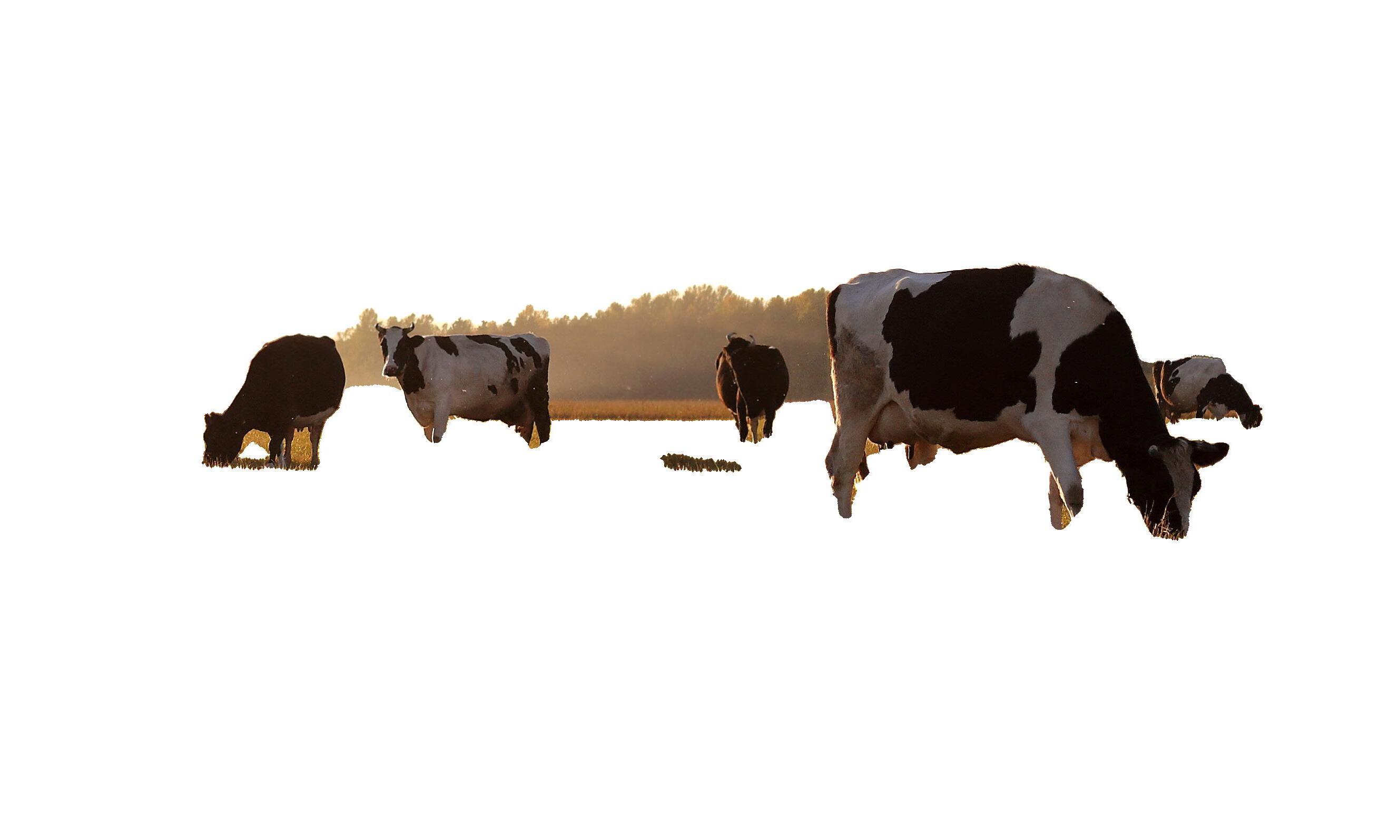
Two-way control: As well as gathering information from the devices,
Streamline knew that its customers would need to be able to push information and updates back to the field. This would allow them to react to data on battery life, coverage, latency, and more.
Streamline chose CommsCloud and floLIVE for its low-cost, always-on connectivity:
“We selected CommsCloud and floLIVE because they offered connectivity across the board at the best possible rates compared to the big players. From day one, we’ve experienced excellent service. Our solution was up and running within a week, and they were online and assisted us with any issues right away,” Samuel Schalkwyk, owner and managing partner of Streamline declared.
Streamline spent some time researching its options for telecommunications and connectivity, and chose to work with CommsCloud, a connectivity solutions provider with more than 20 years of experience in the industry. CommsCloud partnered with floLIVE’s IoT platform, using its
unique multi-IMSI SIM technology and holistic connectivity management suite to provide connectivity to Streamline’s devices.
The devices have been designed with every contingency in mind. They are just 16 grams in weight, and equipped with solar panels so they can be charged by the sun. Without sunlight, they can go for around a week without being charged. They monitor temperature, battery level, effectiveness of radiation, and they are equipped with an accelerometer to track different animal behaviours, such as if an animal is being chased, or if it has been stolen.
If a device stops moving for a predefined period of time, the farmer will get an alert, prompting them to take action. With geofence areas defined, and an additional mapping application, farmers can track the device in real-time, and quickly find a lost device or a hurt or stolen animal in the wild. Stolen livestock is becoming increasingly common in South Africa, making anti-theft devices more important than ever.
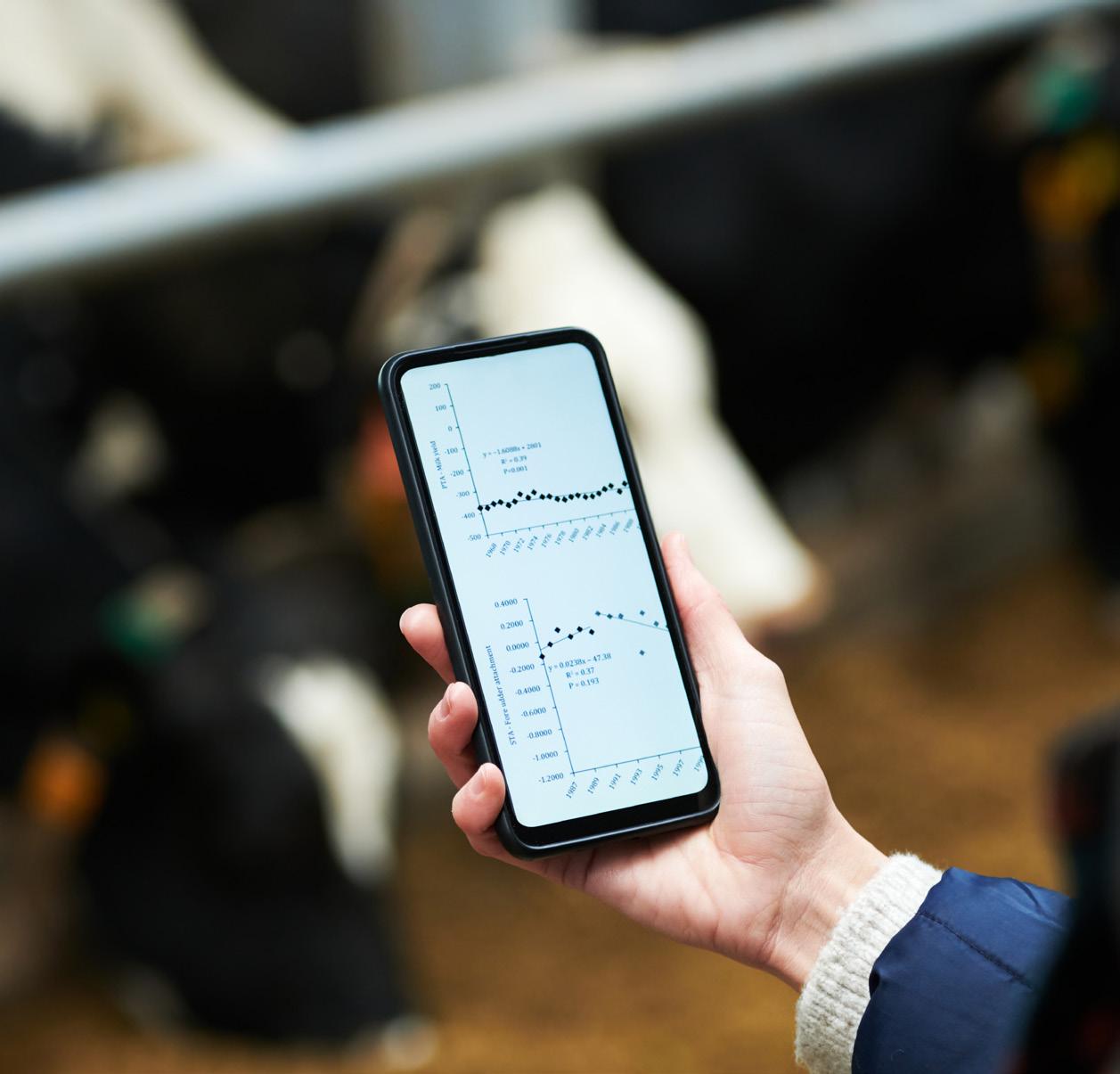


While the devices were designed to predominantly use NB-IoT, the use of floLIVE’s multi-IMSI solution gives Streamline the ability to switch operators where possible to get better availability or lower latency. As latency directly impacts battery life, this is critical. Soon, Streamline will be able to use satellite communication to augment connectivity where there is a lack of operator coverage.
Streamline can now pass over the following benefits to their own customers:
Real-time visibility: Wherever livestock travel, farmers will be able to monitor behaviour in real-time and without gaps, passing on this visibility to their own customers. There are already hundreds of active devices in South Africa, with 350,000 planned by the end of 2023, and the potential for 7.5 million across the country.
Intelligent thresholds: Farmers can update the devices remotely, triggering less frequent updates to lengthen battery life during rainy periods, or automatically reducing the reporting rate at a specific threshold.

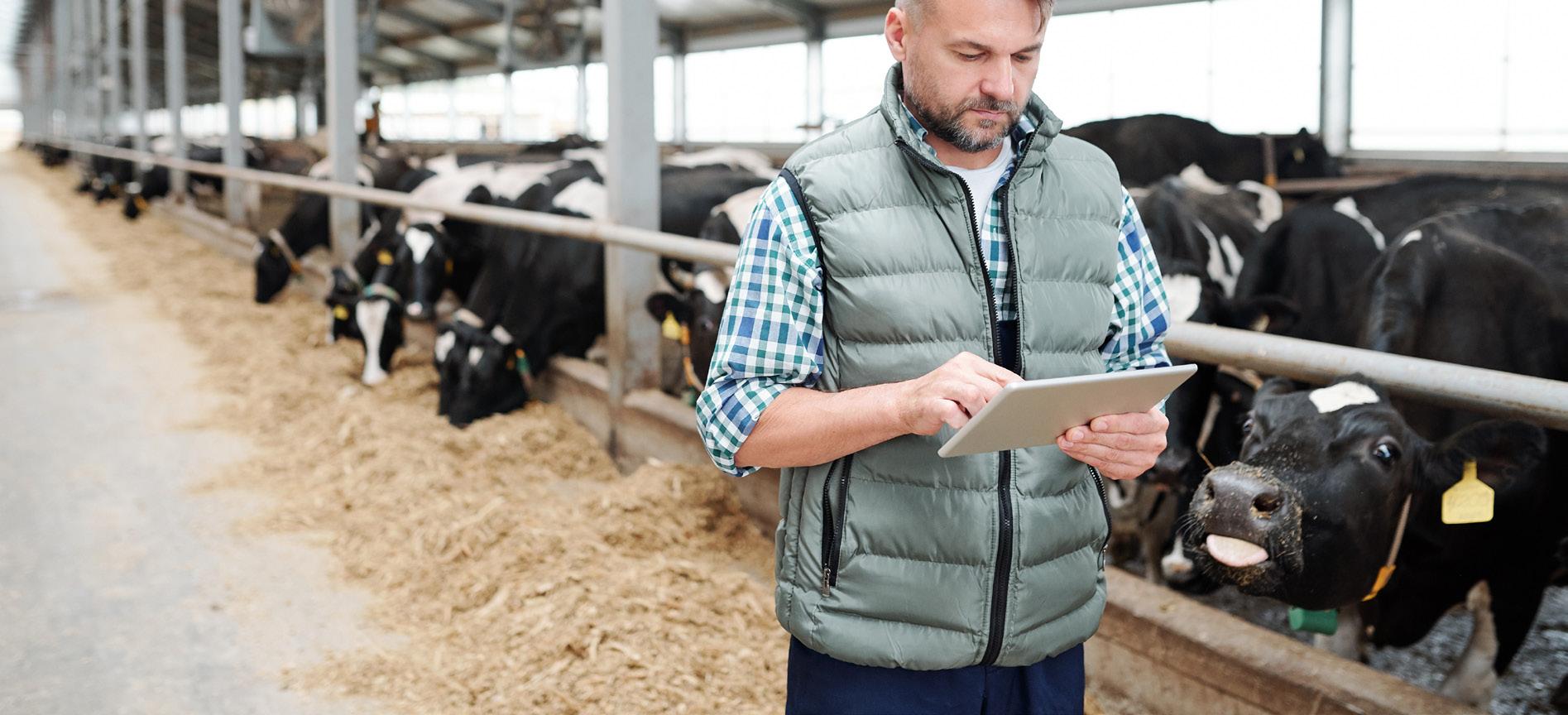
Low rates: floLIVE’s connectivity is significantly less expensive than larger
players, especially considering the usage of both NB-IoT and satellite connectivity. By using the same technology for both, cost-savings are huge.
Full coverage: The multi-IMSI approach means devices can be made in China, shipped to South Africa, or deployed anywhere globally, and they will work without interruption. Even where there is no cell phone coverage, Streamline can offer always-on visibility.
No operator lock-in: Streamline can work with any operator, without being tied to a specific service agreement, contract, or coverage area. This gives them the flexibility and future-focus that wouldn’t be possible with a larger player.
CommsCloud is a South African firm that provides innovative solutions to African organisations, streamlining the management of connectivity. We aim to simplify the management process by offering quality and up-to-date solutions that connect people, workplaces, and things. Our vendor-agnostic team focuses on delivering fit-for-purpose, costeffective solutions aligned with our clients’ needs. With over 12
years of experience in ICT and IoT optimisation and SIM management, we ensure global connectivity everywhere. Our track record of success, saving clients an average of 30 percent on monthly costs, speaks to our commitment to building longterm partnerships and staying ahead of industry disruptions.
Benny Einhorn is floLIVE’s President of Europe, the Middle East and Africa, running the company’s business operations in the region. Benny has vast experience in executive sales and marketing positions from large global enterprises and innovative startups. Prior to floLIVE, he held various executive sales and marketing roles at NICE, including the role of President of NICE EMEA, before joining Powermat as Vice President of Sales. Before this, he held several C-level or VP roles at Comverse, Indigo and Optrotech. Benny holds a BSc in Industrial Engineering and an MBA from Tel Aviv University.
www.theinternationalexchange.co.uk

Digital tools and connectivity are the cornerstones of progress and success in an ever-growing digital age. Greater communication, information and data gathering, monitoring, e-commerce, business analytics, and customer experience are all reliant on the level of technological and digitalisation incorporated into an enterprise.
It is for these reasons that companies, no matter which industry and market they operate in, are investing heavily in the digital side of business development.
Within the African airline industry, TAAG Angola Airlines (TAAG) is one such company taking great strides in its digital transformation, becoming increasingly customer-orientated and operationally streamlined.

Based in Angola’s capital city of Luanda, TAAG was founded in 1938 and for more than 80 years has connected Angolans with its key domestic and international
a strong track record of service and performance excellence.
Leveraging its digital footprint, TAAG recently launched its new website, available to all parties and forming a new key channel for customers and passengers to request services online.
Writer: Marcus Kääpä markets. TAAG is the leading airline in the country, recognised worldwide for its strong, high-yield market, having grown its current network to 14 domestic and 13 international destinations. In addition to passenger transport, TAAG operates air cargo services which have become essential for Angola’s growth and development. At its centre, the company prides itself on
In line with the company’s commitment to excellence and a greater customer experience, TAAG’s website launch provides valueadded propositions to customers, passengers, and its general audience. The platform is available in four languages (Portuguese, English, French, and Spanish), and boasts seamless navigation and easy access to key functionalities such as bookings, ticket acquisition, online check-in, seat quotation, multipoint routes, and more. Aligned with the best commercial practices in aviation, TAAG is focused on digitalisation, aiming to establish the new website as the preferred platform for customers
Airlines is focused on bettering the customer experience. We take a look at the company’s digital developments, which are putting people first and keeping it ahead in the market
and passengers to request services.
Overall, the benefits of such an investment encompass full autonomy, 24-hour self-service availability, agility, and security. The website has been fully optimised, is more user-friendly, appealing, faster at processing commands, interactive, and — critically in this growing digital age — mobile responsive.
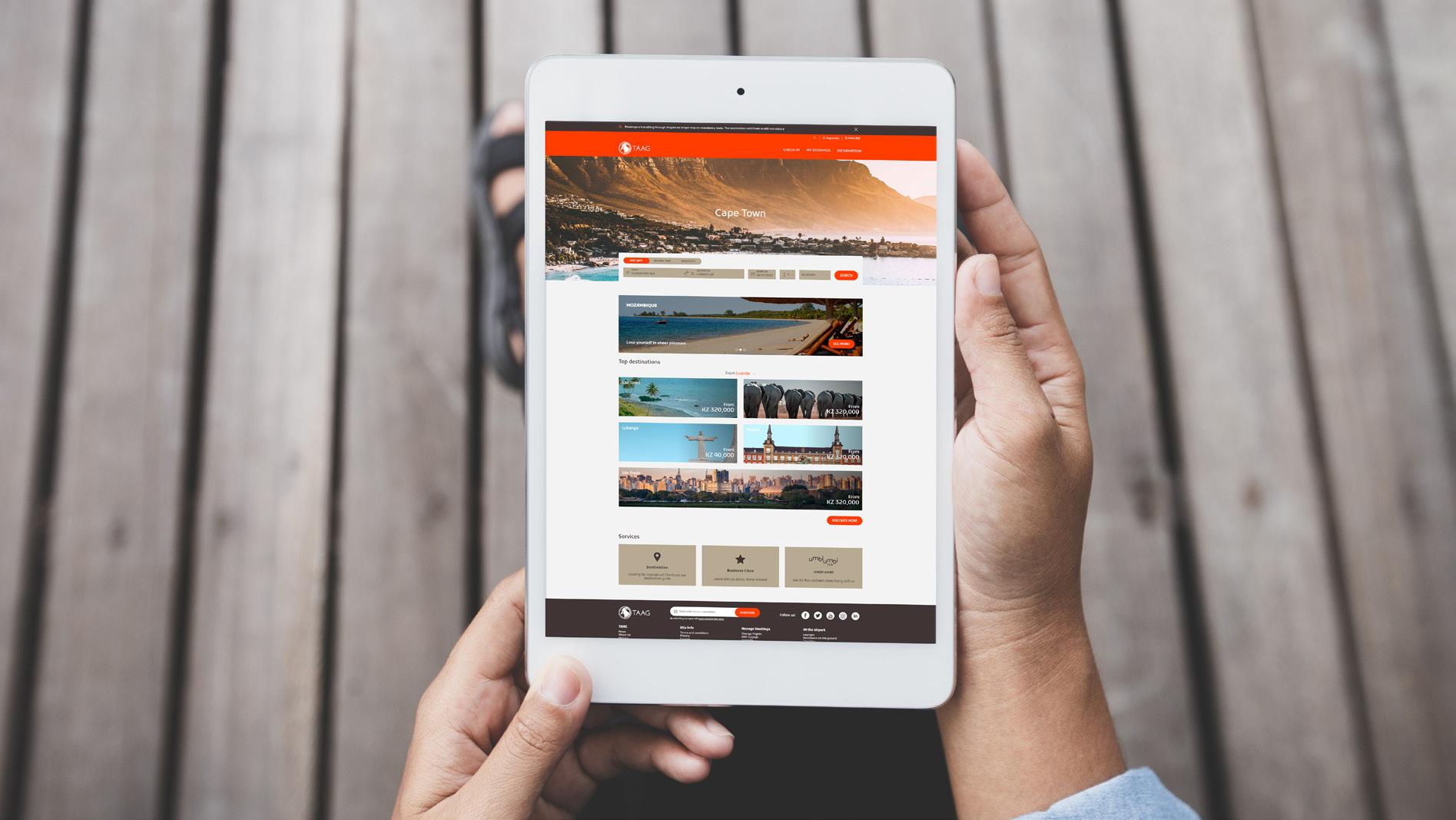
TAAG’s newest features have been incorporated into the website, namely the TAAG Upgrade promotion. This tool (subject to the terms and conditions) allows passengers to request an upgrade to their original ticket and be placed in a higher class. With TAAG Upgrade, passengers are invited to make an offer on top of the amount they have already paid for their tickets to move to a higher-class cabin (business or first class), as long as such seats are available.
For the company, TAAG Upgrade auctions are a way to drive increased revenue from ticket sales. These auctions are possible through the
integration of the Plusgrade tool, which allows TAAG to auction empty premium stock seats on each flight among passengers with reservations in lower category classes. In these auctions, passengers have the ability to submit an offer that they are willing to pay to upgrade their flight class. The upgrade offer is per one-way flight and does not apply to return flights, however, the promotion does not stop passengers from placing offers on other individual tickets. Along with the upgrade in class seating comes the additional benefits of such classes, including increased baggage, fine dining, priority boarding/check-in, lounge access, more comfortable, spacious and even private seating, as well as a host of upgraded policies. Of course, each of these upgraded benefits is reliant on the kind of seating upgrade (Plusgrade First or Plusgrade Business) passengers bid for.
TAAG Upgrade is both an intuitive and uncomplicated system, with
passengers benefitting from a simple and efficient customer journey. Customers can simply check their eligibility to enter the auction by searching with a reservation number and surname, submit a value offer for the upgrade of their ticket to a higher flight class, then pay for the offer online if they succeed.
TAAG analyses the offers based on criteria and pricing, and it is one to three days before a flight’s departure date that the company’s automated processes accept or decline a passenger’s offer.
The addition of both an upgraded website and TAAG Upgrade has made the customer journey easier and more useful than ever before.
TAAG will therefore continue to embrace innovation, quality, and convenience for customers, as the new website represents the first milestone towards the company’s comprehensive modernisation and digitalisation process, with TAAG Upgrade at the fore of its customerorientated offers.
 Writer: Jack Salter
Writer: Jack Salter
Africa is home to the planet’s best renewable resources, such as solar, wind and hydro, which have the potential to provide clean and sustainable solutions.
Despite this, however, 596 million people in Africa still lacked access to modern energy in 2021, representing around 43 percent of the continent’s population of nearly 1.2 billion.
Access to reliable and affordable energy is crucial for sustainable development in both rural and urban areas of Africa.
“It is a fundamental requirement for meeting basic needs and driving economic growth,” explains Ingeborg Graabak, Project Coordinator at Norwegian research institute, SINTEF Energy Research (SINTEF).

Of the 900 million people without electricity access in the world, 565 million (72 percent) live in

sub-Saharan Africa, where almost 80 percent of the energy consumed is generated through the inefficient combustion of solid biomass such as wood or charcoal for cooking. Africa leads other continents when it comes to wood consumption and the net loss of forest area, with demand for charcoal and firewood
EAPP – Libya, Egypt, Sudan, South Sudan, Ethiopia, Djibouti, Somalia, Kenya, Uganda, the Democratic Republic of the Congo (DRC), Rwanda, Burundi, Tanzania
WAPP – Senegal, The Gambia, Guinea Bissau, Guinea, Sierra Leone, Liberia, Ivory Coast, Ghana, Togo, Benin, Nigeria, Niger, Burkina Faso, Mali
projected to increase to 800 million cubic metres by 2030. It is also the largest household black carbon emitter in the world, leading to further implications for climate change and the health of communities.
The continent is already seeing the damaging ripple effects of climate change, as around 40 million Africans could be pushed into extreme poverty by the end of the decade due to extreme weather changes. Temperatures have risen faster in Africa than the global average, increasing the need for the transition to accessible, affordable, and sustainable energy solutions. However, the potential of Africa’s immense natural resource endowments remains largely untapped, undermined by weak
energy policies, especially in the subSaharan region.
High levels of energy poverty in Africa have subsequently been caused by severe energy shortages, exacerbated by the additional challenge of rapid population growth across the continent. Indeed, Africa’s population is projected to increase by over one billion people by 2050.
The abundance of renewable energy resources that Africa has can meet current and projected power demands as the population grows, and address these shortages. The cost of renewable energy has also decreased dramatically over the past decade, whilst financial innovations such as feed-in tariffs and pay-as-you-go mobile systems have increased accessibility, affordability and demand.
Aiming to target the pressing challenge of energy poverty, OpenMod4Africa is a three-year project that seeks to develop expertise, analytical models, and knowledge to achieve sustainable and reliable energy systems in Africa.
Coordinated by SINTEF, it will receive funding from the EU’s Horizon Europe research and innovation programme and develop an open modelling toolbox, leveraging state of the art models adapted to the context and needs of Africa.
These models will enable comprehensive analyses of long-term
energy pathways, tailored to different regions, cities, industries and countries. OpenMod4Africa will also facilitate transparent data exchange and collaboration, allowing stakeholders to benchmark results.
Graabak, who has decades of experience from modelling the Nordic and European energy systems, highlights the importance of local capacity building.
“By working closely with African universities and experts, we aim to develop the necessary knowledge and tools for analysing and planning African energy systems,” she outlines.
This will ensure that Africa can independently drive its energy transition and maximise the benefits of its extensive renewable resources.
Africa is divided into five power pools, with OpenMod4Africa to focus on the countries included in the power pools of East and West Africa, examining and developing energy pathways to each specific region to address the unique challenges and opportunities they face.
Veritas Consulting, which is leading the work package focusing on the
East African Power Pool (EAPP), aims to contribute to increase access to energy and enhance the capacities of decision making in the region by harnessing the power of collaborative modelling and expertise.
“Importantly, we believe that a contextualised tool for energy modelling and analysis will leverage each country’s complement of renewable resources for an optimal regional pool, resulting in solutions that optimise cost, availability and sustainability,” emphasises Dr Atsede Gualu Endegnanew, an Energy Practice Lead at Veritas Consulting in Ethiopia.

Equally enthusiastic about the potential of the project is Professor Cheikh Mouhamed Fadel Kebe, President of the Centre de Test des Systèmes Solaires (CT2S).

“As the leader of the West African case study within OpenMod4Africa, I am excited to contribute to the development of sustainable energy systems in our region,” he says.
The OpenMod4Africa project is a great opportunity to develop these sustainable energy systems and will help to train qualified personnel in electrical modelling for the West African Power Pool (WAPP), while developing decarbonisation scenarios.
 Dr Atsede Gualu Endegnanew
Dr Atsede Gualu Endegnanew
The realm of digital transformation across Africa is decidedly on the rise, thanks to the advancements in the telecommunications industry and surrounding infrastructure. Such achievements were most recently celebrated at the first Gitex Africa Summit, where over 900 companies from across Africa met in Morocco to discuss the changing landscape of the digital economy.
Shoulder to shoulder with topics such as artificial intelligence (AI) and cloud technology, the rise of
social commerce generated much discussion as the latest innovation in marketing and trading commodities.
As a sub-sector of e-commerce, the notion of social commerce relies on the trading and selling of goods via social media platforms. This marks a turning point in the meaning of trade as it centres more on the customer experience and the personalisation of each consumer, hence the greater need for analysis of consumer

As Africa undergoes a digital transformation, the use of social commerce is on the rise. We explore how the phenomenon is changing the meaning of marketing and trade Writer: Lucy Pilgrim
behaviours, social media habits and the rise of influencers on such platforms.
Social commerce is pointedly taking the continent by storm, as according to a 2022 survey, the industry in Africa and the Middle East had an estimated value of USD$8.9 billion. This is indicative of the mass use of social media, as more companies across Africa utilise these platforms for selling. More specifically, 92 percent of small and mediumsized enterprises (SMEs) in Kenya used social commerce as of June 2020, demonstrating a major increase from previous years.
But why is this? One contributing factor is that many businesses are departing from more conventional methods of advertising, which have become outdated in comparison to the greater accessibility afforded by social media. From a business perspective, the use of social media requires less time, money and effort — a golden trifecta for effective marketing.
Furthermore, the use of social media platforms allows for greater capabilities, such as target driven algorithms, content sharing and messaging services, that increase the personalisation of the buying and selling process and provide instant access to different services and products.
In Africa, now more than ever, it is the optimum time to utilise the opportunities afforded by social media, as there has been proactive growth in internet connectivity and the use of 5G networks. Thus, tapping
into a market in which 34 percent of Africans are using social media seems like a natural and obvious step forward for commerce.
A survey by ReferralCandy shows that word-of-mouth is the most trusted form of marketing among consumers. The need for the opinions of other users is so high that nearly nine out of 10 consumers (89 percent) read reviews before buying products online. Consequently, many startups across Africa are reaching much wider audiences through the use of Facebook, Instagram, Twitter, and TikTok.
One such company utilising the influence of others is the Nigerian start-up, Chooya, which was founded in 2019 and has digitised word-ofmouth marketing. Chooya, which translates as ‘to find something’, brands itself as ‘the TikTok for e-commerce’. By leveraging social media to make it easier for consumers to find traditional African markets via mobile connectivity, companies such as Chooya position themselves at the cutting edge of the region’s digital economy.
Significantly, it is not just high-fashion brands and trend commodities that are yielding social commerce opportunities. In Nairobi, social commerce start-up, Tushop is tackling the cost of living crisis across Africa. Created in 2021, Tushop
is lowering the price of everyday commodities for its customers by allowing people in the local community to buy essential goods from local traders and assisting in last mile delivery.
The founder of Tushop, Cathy Chepkemboi, was a previous employee of commodity titan Unilever. Upon the launch of Tushop, the company gained substantial investment, which helped jumpstart community buying and give it the ability to make the platform as easy to use as possible.
Tushop provides vital commodity infrastructure by collaborating with traders in the local community, known as community leaders, to offer the highest-quality service. Each community leader has a virtual shop where neighbours can order their products. Thus, Tushop aggregates for bulk orders to manufacturers or farmers.
As a result, shoppers can earn up to 60 percent in savings; with the retailer being in direct contact with the customer, costs are lowered overall. Consequently, ‘everyone is able to elevate their livelihoods across the country and the continent.’
The realm of social commerce is still in its infancy. Therefore, there are many challenges emerging from its use that still need to be overcome. Namely, organising informal African retail is proving to be an expensive challenge that requires serious effort. Furthermore, a significant proportion of the African population reside in more rural areas.
However, with recent telecommunications developments, the future of social commerce is looking bright, with a projected growth of 55.2 percent between 2022 and 2028 across Africa and the Middle East. Therefore, the boundaries of buying and selling could be in for sizeable transformation as more of Africa takes to social media to not only like and share, but buy and sell.
‘THE USE OF SOCIAL MEDIA PLATFORMS ALLOWS FOR GREATER CAPABILITIES, SUCH AS TARGET DRIVEN ALGORITHMS, CONTENT SHARING AND MESSAGING SERVICES, THAT INCREASE THE PERSONALISATION OF THE BUYING AND SELLING PROCESS’

A country soaked in sunshine, South Africa is beginning to harness the power of solar to diversify its energy mix and transition away from a historical reliance on fossil fuels
Writer: Jack Salter | Project Manager: Jordan Sibley
Fossil fuels, including coal, natural gas and diesel, dominate the energy mix in South Africa (SA) and have always been the primary source of energy in the country.
This is despite solar photovoltaic (PV) power being SA’s most readily accessible resource, with most areas averaging eight to 10 hours of sunshine a day and more than 2,500 hours per year.
However, for some time, there has been a need to change the structure of the electricity sector in SA to establish efficiency and create a more diverse energy mix, transitioning away from fossil fuels and investing in renewable energy sources such as solar PV.
Indeed, since 2008, SA has endured frequent supply restrictions, known as load-shedding, as the aging state-owned power grid and mainly coal-fuelled power stations struggle to keep up with demand. The South African government is continuing with efforts to boost the amount of renewable energy generation in general, and solar power specifically, in the country to try and solve this problem, as well as improve its environmental
credentials.
The current electricity sector structure and energy mix in SA presents an opportunity for reform, particularly for increasing the share of renewables. SA’s targeted energy mix by 2030, as per the Integrated Resource Plan (IRP), comprises an installed solar PV capacity of more than 8,000 megawatts (MW), accounting for just shy of 11 percent of the total energy mix.
This reflects the bold declaration of intent by SA to develop scalable, reliable and sustainable energy solutions to achieve universal electricity access by the end of the decade, supporting the much-needed sustainable socio-economic development of the country.
Solar PV can help to diversify the electricity mix in SA, produce distributed generation and provide off-grid electricity. In addition to helping the national power grid, solar PV can bring power to many rural homes that aren’t connected to the mains.
Such renewable technologies also have enormous potential to create new industries, jobs, and localisation across the value chain.


What is your take on the solar energy industry in South Africa at the moment? Is it an exciting space to be working in?
The solar photovoltaic (PV) sector is South Africa’s fastest growing industry and will be for the next five years. This is due largely to the escalating power cuts or “load shedding” that has been increasing over the last half decade. South Africa has experienced an average of “stage four” load shedding so far in 2023, equating to 4,000 megawatts (MW), meaning electricity has not been available to consumers for an average of 10 hours per day, every day this year so far.
This lack of service delivery of electricity is driving high demand for solar and battery systems in the residential, commercial, industrial, and agriculture sectors. A recent bottomup study by Hohm Energy of the solar PV demand in South Africa values the residential total addressable market at one trillion rand (USD$50 billion). This study was performed by counting the number of residential rooftops, taking into account their north-facing square meterage and tilt and overlaying that information with a household financial index to determine the sizes of solar systems appropriate for each household.
What is exciting about this space is that only about five percent of the market demand has been met to date. The number of households that would benefit from solar is in the region of about 4.2 million. The largest solar installation companies at the moment are only performing about 2,000 installations per month. This is one indicator to look at to understand the magnitude of demand and the limited supply of good solar installations in South Africa currently.
Can you briefly introduce Hohm Energy and the role it plays in the sector?
Hohm Energy is a first of its kind solar marketplace aggregator. What that means is that we are a tech platform that enables clients to do a solar assessment and generate an indicative solar proposal in under five minutes and then connect them to vetted


trusted installers, supply them with top Tier 1 products, and through our finance partners provide them with options of financial products to fund the installation.
We originate out of the electrical metering and management business where we started an installation business back in 2013. We realised that we were severely constrained from scaling by the resource intensive process of meeting clients, manually developing proposals, doing marketing and more. We decided to build an application that could automate much of this process to enable working at scale for us and our partners, and so Hohm Energy was born.
Following on from above, what we offer clients is the ability to quickly understand their solar requirements, connect them with vetted installers and assist them in accessing funding
for their solution, all while taking a high-touch approach and walking the journey with the client – our product is trust, and we offer this service nationwide. Our signups exceed 30,000,
involves offering solar as a subscription service option to clients.
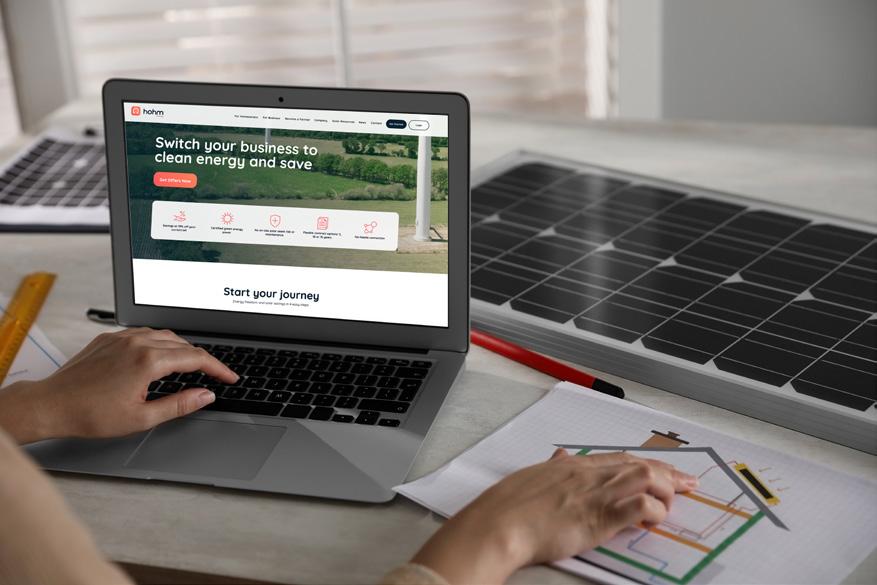
In addition, we are partnering with dominant players in the mortgage origination space and retail space to gain more presence in the market.
Projects aside, are there any key investments or other things you’re working on that you’d like to pay
green energy transition by being the leading solar marketplace, supported by values of accountability, trust and customer service excellence.
Our most notable project currently on the go is the partnership between Hohm Energy and Glint Finance, which
We are in the process of developing the Hohm Energy Virtual Power Plant (VPP) platform. A VPP is a software platform that communicates with and receives electricity from distributed energy resources and battery storage, with this electricity then being distributed to where it is needed most. By operating a localised VPP within a city or residential municipality, it is possible to power the homes within the chosen area that do not have solar installations with electricity from the homes that are producing and storing solar-based electricity.
This will be South Africa’s first locally developed VPP that has been designed according to the nation’s unique context, and one addressing its current energy crisis.
Our core mission is to facilitate the green energy transition by being the leading solar marketplace, supported by values of accountability, trust and service excellence.
- Hohm EnergyCould you elaborate on Hohm Energy’s relationship with the South African Photovoltaic Industry Association (SAPVIA)? Stemming from this, how does the company envision the future of PV usage in Africa?

We have been a sponsor of SAPVIA for the past two years. They play a pivotal role in PV in South Africa through their GreenCard Accreditation. A more qualified and connected installer base is vital to ensure quality. This is also better for everyone in the ecosystem, but especially clients who are parting with large amounts of capital to install solar and require that these systems are properly installed. Hohm Energy is taking an active role to elevate the quality of installers in South Africa beyond the benefit just to the company.
The future of PV usage in South Africa is bright. Projections show that over
two million households will receive solar installations between June 2023 and June 2025. The sector has a fragmented nature at present and Hohm Energy believes through its scalable marketplace ecosystem approach that we can satisfy a substantial 40 percent of this demand. In light of this, we are very focused on scaling our platform and growing our market share. Additionally, we are onboarding the leading financial service providers as well as an innovative new solar finance subscription offering. www.hohmenergy.co.za

At the forefront of developing SA’s renewable energy transformation, the South African Photovoltaic Industry Association is delivering a solar PV powered future for the country. Rethabile Melamu, CEO, weighs up the challenges and opportunities for the solar PV industry in SA
Africa Outlook (AO): Firstly, could you talk us through the association’s origins and vision?
Rethabile Melamu, CEO (RM): The South African Photovoltaic Industry Association (SAPVIA) was founded in 2010 to represent the interests of a couple of project developers at the time. We started out with only six entities, but we have grown to represent more than 700 actors who operate along the entire solar PV value chain in SA. As the voice of solar PV in SA, our vision is for solar PV to be a significant and reliable contributor to the South African electricity mix by 2050. In particular, we believe that well over 30 percent of our electricity mix should come from solar by 2050.

AO: What is your current take on the solar PV industry in SA?
RM: It’s both exciting and challenging. It’s exciting in that we have seen drastic growth in the past couple of years, and there are several reasons for that. The main reason is the current energy crisis that SA finds itself in, which has really forced households that can afford to install a solar PV system to do so. The major banks in SA all have instruments to support their clients in installing solar PV systems.
We’ve also seen businesses looking to solar to deal with their energy security challenges. Typically, the solar PV industry in SA is not just viewed as a nice-to-have climate mitigation technology. It’s about making sure when people don’t have power, which is currently anything from two to 12 hours a day because of load-shedding, that they are still able to carry out their everyday activities at a household level, and businesses are also able to continue to operate.

I think the energy crisis, and the electricity crisis specifically, is dire, but we have seen solar PV uptake increase as the price of renewable electricity has come down quite significantly over time. In other ways, it’s challenging in that we have recently discovered that we have limited grid capacity in high renewable energy resource areas.
The Northern Cape province has the best solar resources in the country, and most renewable energy or solar PV developers prefer their projects in that region. However, despite the great resources in that area, the grid infrastructure was only designed to move electricity from the Mpumalanga province to the Western Cape, and wasn’t designed to connect the additional capacity that is being developed.
What has happened in the past year or so is that SA’s national utility, Eskom, is unable to offer independent

power producers or project developers access to the grid because it’s oversubscribed. It takes eight or 10 years to build grid infrastructure, so that is one of the main challenges that we are facing. In the short term, a combination of wind, solar and storage technologies can offer a reprieve, however, an urgent grid infrastructure build programme is required.
Be that as it may, the growth in the domestic, commercial and industrial market segment has really skyrocketed in the past couple of years.
AO: What opportunities does solar PV offer to SA, and how are your members capitalising on them?
RM: One of the positive things that the government introduced in the past couple of years was lifting the need for private projects to be licenced.
Previously, if you were developing a project above 1MW, you were required by law to get a licence with the National Energy Regulator of South Africa (NERSA). However, due to our current electricity crisis, the government initially lifted the need to get a licence to 10MW, then a couple of months later that cap was pushed to 100MW.
Last year, the cap was removed altogether, which means if a private developer has identified a piece of land and
an end user to sell the electricity to, all they need to do is register their project with NERSA instead of going through a longer licensing process. However, developers are still expected to get all the other necessary licences and requirements.
That has opened up the private utility market, which was previously driven by public sector procurement. Policies and regulations in the South African electricity and energy sector are drafted and developed by the Department of Mineral Resources and Energy (DMRE). The department’s Integrated Resource Plan (IRP) is committed to procuring about 17 gigawatts (GW) of power from renewable energy sources.
Because the government couldn’t afford to invest in that capacity on its own, it decided to use a tender process and established the Independent Power Producer Office (IPPO), which was mandated to procure renewable energy on behalf of DMRE. The first bid window was issued in 2011, the sixth bid window has just closed, and there are now plans to open up a seventh window.
In parallel, there are other bid windows that IPPO has issued, including what they call risk mitigation when demand outstrips the supply of electricity. To date, through the government’s tender process, about 2.4GW of utilityscale solar PV power has been installed and there is about 3GW under construction.
In terms of private market growth, we saw SA install 1GW of solar PV capacity for the first time in 2022, but since
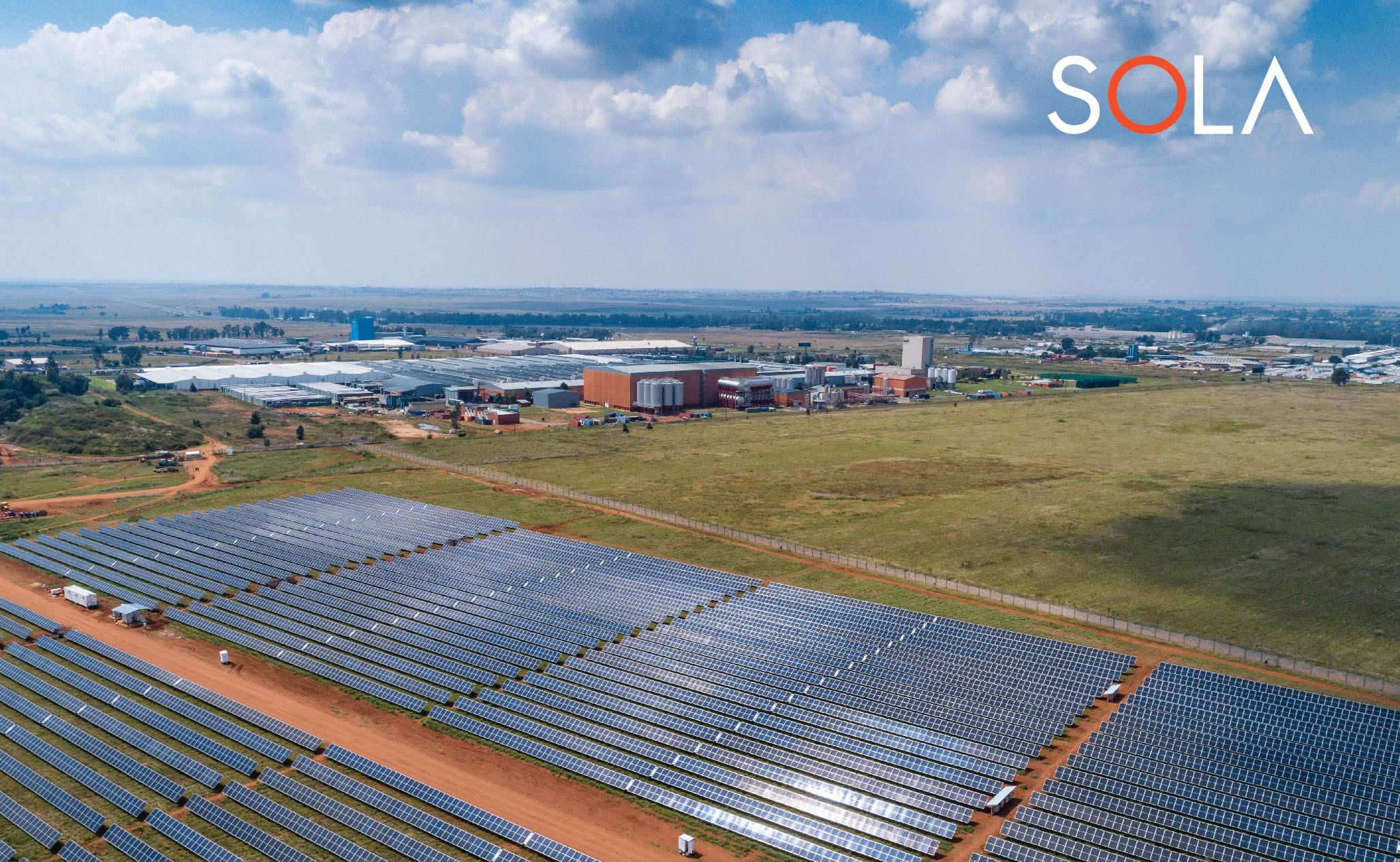
the lifting of the licence cap we have seen about 4GW of solar PV projects registered with NERSA. Over half of those registered projects were in the first quarter of 2023, so most of them haven’t been developed yet, but they have sufficient resources to meet the criteria that NERSA requires for projects to be registered.
The government has done a really good job in enabling the sector, and the private market is taking off a lot quicker than the public market. The Minerals Council of South Africa estimates that their members will be installing about 9GW of solar PV or renewable energy capacity in the next couple of years, and we’ve also seen a lot of interest from telecommunication companies.
AO: Could you outline some of SAPVIA’s key achievements in the last decade?
RM: We’ve contributed quite significantly in lobbying the government to change the regulations. The removal of the licence cap is our greatest achievement, which came from consistent lobbying and engagement with government.
SAPVIA has also been at the forefront of ensuring quality installations for small to medium-sized businesses in the sector. In collaboration with BSW and with the support of other players in the country such as GreenCape, we put together the PV GreenCard initiative to address opportunistic behaviour in the sector which was leading to shoddy installations.
To date, the country still does not have standards for solar PV installations. The initiative comprises skills development and proper documentation, focused on upskilling electricians already registered with government in solar PV design, installation and mounting.

This is based on a nationally approved qualification, which is used as a framework for training. It’s a very condensed five-day module that was designed to be delivered over the period of a year and a half, but typically those who undertake skills development have had prior exposure to the trade. Once an individual, ideally an electrician, has undertaken this additional training, they can apply for their company to be registered on the PV GreenCard database as a vetted installer.
PV GreenCard is a credible platform that end users, banks, and even some government departments use to
establish how competent an installer is or how experienced they are.
The other element of PV GreenCard was to have an as-built report for the direct current (DC) side of the installation, not just the alternating current (AC) side which requires a Certificate of Compliance (CoC) by law, which electricians are able to issue so that the client knows what kind of components were utilised and whether the installer is actually compliant with local government regulations.
Since PV GreenCard launched in 2017, we have registered 400 small to medium-sized companies. We are by no means the only entity that plays in the space, but we are the most recognised brand. We think the initiative is a very strategic intervention, and it’s growing in leaps and bounds. It’s not without its shortcomings, but we are working on these as we go along.

“WE HAVE SEEN SOLAR PV UPTAKE INCREASE AS THE PRICE OF RENEWABLE ELECTRICITY HAS COME DOWN QUITE SIGNIFICANTLY OVER TIME”
– RETHABILE MELAMU, CEO, SAPVIA
When Enel Green Power South Africa (EGP SA) concluded two long-term Power Purchase Agreements to supply 220MW of renewable energy to a commercial and industrial (C&I) client, it became the first renewable energy supplier to conclude a large-scale C&I wind PPA in the country.
Today, EGP SA’s total managed capacity in South Africa is almost 2GW, cementing it as a leading renewable energy supplier in the country. With 12 operational projects that form part of the country’s Renewable Energy Independent Power Producers Procurement Programme (REIPPPP), Enel Green Power South Africa now boasts a 20% share of South Africa’s renewable energy market. The company is currently in discussions with various other private off-takers to increase energy capacity, a move that will further consolidate its position as a leader in the renewable energy industry.
By leveraging its international track record, competitive financing structures and quicker
“Many companies have important sustainability targets that they have committed to achieving. Purchasing renewable energy represents an essential progressive step while demonstrating leadership in tackling climate change”
- Manuele Battisti, Enel Green Power, South Africa Country Manager.
time-to-market, Enel Green Power is able to comprehensively address customers’ energy needs by delivering large- and utility-scale projects focusing on wind and solar PV.
Importantly, EGP SA offers a variety of solutions to its clients, including hybridised options, meaning it is not limited to one technology, and can also integrate batteries into the mix to increase energy availability and maximise on power generated.
Enel Green Power’s offering to the C&I market is in addition to the integral role it has played in conducting preliminary conceptual discussions aimed at understanding the government’s regulatory framework on renewables, participating in industry bodies, advocating for reforms and concluding strategic Power Purchase Agreements (PPAs) to help power the sustainable transition in South Africa while creating shared value.
Purchasing energy through an Independent Power Producer (IPP) such as Enel Green Power allows for greater financial planning through tariff visibility and a reduction of the continuous operational risks associated with conventional energy cost fluctuations. By offering tailor-made PPA’s, Enel Green Power gives clients greater price certainty while helping them reach their climate action targets.
“Many companies have significant sustainability targets that they have committed to achieving. Purchasing renewable energy represents an essential progressive step, while demonstrating leadership in tackling climate change,” says Manuele Battisti, Enel Green Power South Africa Country Manager.
By factoring customers’ Socio-Economic Development (SED) targets into their PPAs, Enel Green Power enables clients to use their renewable energy transition to create shared value in the communities they operate in or where the site is located.
“Ultimately, we want to help forward-thinking organisations that are prioritising sustainability to take advantage of the numerous opportunities that the move to green power presents. This all begins with the desire to harness the abundant natural resources that South Africa has been blessed with and produce energy to empower people and enable progress,” Battisti concludes.

We provide clean energy through our customized and innovative solutions designed to reduce emissions and guide businesses towards a sustainable future.

AO: Are there are any other initiatives or projects SAPVIA is involved in for 2023 that you would like to highlight?
RM: One of the challenges in SA is a lack of data around installed capacity. Most of what we use is based on data that we get from members, municipalities or other entities involved in the solar PV space. We don’t want to get to a point where our sector is seen to compromise the integrity and stability of the network.
That’s why it has been important for us to establish exactly what the installed capacity is per area, per municipality, per local government, and per province. One of the big projects that we are embarking on this year is to use artificial intelligence (AI), machine learning (ML) and geographic information system (GIS) technology to know the exact installed capacity in the country. The project is quite advanced and we’re hoping to launch it in the next couple of months, which will be of interest to members who are looking to put together some market intelligence or an expansion strategy.
We also believe having this data published on a regular basis will inspire confidence to invest into the market, and we’re increasingly publishing credible research documents to inform policy. Our latest report is on the manufacturing potential of the entire solar PV value chain, which was concluded late last year and presented to stakeholders earlier this year.
We also have a project with SolarPower Europe looking at whether there are opportunities for its members to establish facilities in SA, and whether there is scope for any supply chain integration. Through this initiative with SolarPower Europe, we’re trying to establish how to go about the localisation of some components.

Last but not least, in the private sector, we are seeing that most players do not understand power purchase agreements (PPAs). Again, we are working with SolarPower Europe based on its RE-Source initiative where it brings renewable energy producers and users together on a very well-facilitated platform.

PPAs are still new, they take a very long time and there is no standardisation – not that one PPA should look exactly like the other – but those are fundamentals that could be streamlined. We also really want to continue supporting the PV GreenCard, increase its influence and make sure that it’s credible. That’s why we are focusing on administrative efficiencies and more oversight over our partners who offer training, and ensuring that the documentation for the systems is done properly.
On the other hand, we’re making sure that the growing private market is not stalled by a lack of understanding
on how to arrange and put projects together. Eskom administers access to the grid, and the rules for accessing the grid are not clearly understood, so there is a very coordinated effort with other industry associations to make sure our members have access to this limited resource and that the rules for accessing it are clear. I think the next challenge that SA will face is the grid; if this isn’t addressed, it might not achieve its generation goals.
AO: How do you see the industry developing over the coming years?
RM: There is a huge need for more skills development initiatives and a longer-term view on skills that are required for the sector. That will be critical to determine how fast we move.
For a country with such a high level of employment, we wouldn’t want to get to a point where SA is importing skills when we can upskill existing competencies to be able to operate in the space. This is definitely an area that is likely to get a lot of attention.
Issues of equity are also very important in SA. Not only is there a need for our sector to contribute to energy security, but it is very much central to the economic development agenda of SA, because energy is inherently an enabler. It presents an opportunity to create jobs and contribute meaningfully to the country’s tax base, and we want to get to a point where solar is prevalent to address the very fundamental challenges that SA faces.
AO: Finally, what are SAPVIA’s key priorities in order to deliver a solar PV powered future for SA?

RM: To ensure that our activities shape and influence regulations and policy in the country. We do this through deliberate advocacy and lobbying work, which could be developing research documents or commenting on regulations that come out. We ensure that we’re part of the conversation and that we present the interests of our members.
Advocacy and lobbying in its various forms are an important part of our work, but we also believe that
for the sector to grow, it’s important to inform and educate our members. We are involved in very deliberate communication drives where we inform the public on what an acceptable installation looks like, where to find credible installers, and we contribute to training those installers.
We are very conscious about educating not just our members, but broader stakeholders through publications, commentary on regulations and policies, and diplomatically critiquing the various spheres of government (national, provincial, local) as and when it’s required.
However, we can’t do that on our own, so as an association we depend a lot on partnerships. We partner closely with the South African government and have strong relationships with other local industry bodies, events companies, media houses and so on.

Aware that our technology will touch almost everyone in the future, we’re very deliberate about our partnerships. These are not confined to SA, as we have started engaging with other industry associations in Africa. Since I joined SAPVIA, we have reached out to about eight industry bodies across the continent to collaborate, leverage each other’s strengths and share best practices. Some of our global relationships with the likes of BSW and SolarPower Europe have grown over the years.
Lastly, we promote usage of solar PV in the private and public sectors. Sometimes the public sector tends to focus on developing policies without necessarily being at the forefront of technology adoption itself, whereas the private sector has really embraced the technology. It’s about ensuring energy security at all costs.
SAPVIA
Tel: +27 11 553 7264
info@sapvia.co.za
https://sapvia.co.za/
“THERE IS A HUGE NEED FOR MORE SKILLS DEVELOPMENT INITIATIVES AND A LONGER-TERM VIEW ON SKILLS THAT ARE REQUIRED FOR THE SECTOR”
– RETHABILE MELAMU, CEO, SAPVIA
AFRICA OUTLOOK is a digital product aimed at boardroom and hands-on decision-makers across a wide range of industries on the continent.

With content compiled by our experienced editorial team, complemented by an in-house design and production team ensuring delivery to the highest standards, we look to promote the latest in engaging news, industry trends and success stories from the length and breadth of Africa.



We reach an audience of 185,000 people across the continent, bridging the full range of industrial sectors: agriculture, construction, energy & utilities, finance, food & drink, healthcare, manufacturing, mining & resources, oil & gas, retail, shipping & logistics, technology and travel & tourism.

In joining the leading industry heavyweights already enjoying the exposure we can provide, you can benefit from FREE coverage across our digital platforms, a FREE marketing brochure, extensive social media saturation, enhanced B2B networking opportunities, and a readymade forum to attract new investment and to grow your business.
To get involved, please contact Outlook Publishing’s Managing Director, James Mitchell, who can provide further details on how to feature your company, for FREE, in one of our upcoming editions.



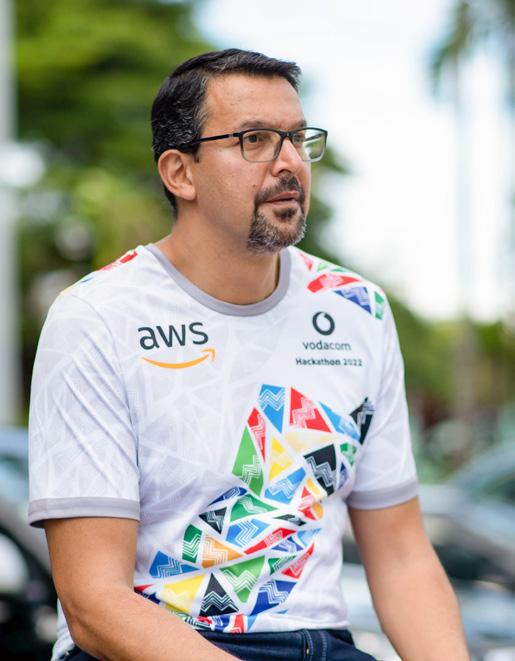 Writer: Marcus Kääpä | Project Manager: Josh Hyland
Writer: Marcus Kääpä | Project Manager: Josh Hyland
The digital age has revolutionised the way that we communicate and carry out business. E-commerce, mobile banking and video calls are just three examples of the widespread digital tools that are now necessary for modern living.
As African nations grow in population, economy, business and urban centres, the paramount requirement of accessibility to modern technology and reliable digital connection becomes increasingly clear.
In the Democratic Republic of the Congo (DRC), the need for digital infrastructure and related services has never been more apparent. While the DRC is a country of rapid development in the telecommunications (telecoms) and digital communication space, there remains a lot of potential in the sphere.
“The DRC has a very exciting business environment for the telecoms industry. We haven’t yet reached all potential consumers and there is definitely room for growth,” begins Khalil Al Americani, CEO of Vodacom DRC.
“The nation has not yet rolled out 5G and is still developing its 3G/4G network. The low internet penetration rate leaves plenty of potential for the development of higher-speed networks and linking the DRC to fibre.”
According to Al Americani, mobile telecoms penetration sits just above 50 percent, with SIM cards being widely used and integrated into society, while internet penetration is at 27 percent of the total population, followed by banking penetration at less than 15 percent.
On top of this, there are multiple challenges in the way of network development, where barriers emerge as a result of the DRC’s governmental systems, geographical terrain, as well as the recent and worldwide impact of the COVID19 pandemic. The business environment in the DRC faces numerous challenges in terms of last-mile infrastructure, combined with the national taxation system and heavily
active bureaucracy. The COVID-19 pandemic set a negative growth trend, however, the economy bounced back from this with an increase in demand for telecoms and digital financial services like Vodacom DRC’s M-Pesa App (M-Pesa).
“While laws protecting investors are in effect, we look to the government for more responsiveness to the needs of investors in improving the business climate and regulatory framework to create a level playing field,” Al Americani states. “We have witnessed a great deal of responsiveness for the past few months from the business climate unit within the government of the DRC that has been proactively working with the private sector for the improvement of the business climate in the country.
“We are hoping for better and we are seeing some good directional movements in that sense,” he affirms.
Vodacom DRC is one of the national branches of the internationally recognised Vodacom Group, a company with network operations across the globe. Vodacom Group aims to connect people for a better future, and through its three pillars of purpose – promoting a digital society, inclusion for all, and limiting the impact on the planet - the company aims to positively transform lives, drive a better digital future, and be mindful of sustainability objectives along the way.
Operating across the DRC, Vodacom DRC is the leading telecoms operator (telco) in the nation’s market with an average of 34 percent market share for global systems for mobile communication (GSM) and 40 percent for M-Pesa. Vodacom DRC relies on its advanced technology, products, and services to connect individuals, communities and businesses in a world that has become highly digitalised.
The company stands above competitors in the industry by providing voice, data, messaging, money transfer solutions and m-commerce (commercial transactions via apps and mobile sites). With 2G, 3G and internet access coverage, Vodacom DRC has made it possible to connect people from the deepest remote locations to the upmarket suburbs of the country.

“Our purpose is to connect everyone in the DRC for a better future through our technology, and our three company pillars help us achieve this,” Al Americani tells us.
“We believe in a connected digital society, where the opportunities and
one-size-fits-all approach. Rather, the company engages with its customers to ensure they receive tailor-made solutions that meet their operational demands, thus providing Vodacom DRC with the greatest growth potential in the country.
“Currently, we are transitioning from telco to TechCo, a major shift in our business from product to solution provider,” Al Americani explains. “Indeed, we want to be known for our technological expertise and capacity to respond to people’s needs, all with a seamless customer experience. In this vein, we are now setting the pace for TechCos in the country.”
Exemplifying purpose materialisa-
comes to its customer-focused offers and services, and operational efforts establishing sites across the country to facilitate connectivity to those who need it, whether they are in rural, remote or bustling urban areas.
On top of this, Vodacom DRC is internally focused, a thread that runs through the wider company globally, ensuring that all staff efforts are recognised, rewarded and supported. Equal opportunity exists throughout the business, as an aspect that stems from the highest executive levels.
“With a population coverage of 56 percent, we connect communities and individuals in even the most remote areas through state of the art
3G coverage
percent, and 4G coverage accounts for
34 percent, the latter of which we plan to accelerate.
“Since operating in the region, we have spread our footprint across the DRC, a country whose size sits around seven times that of Germany, with representation in all 26 provinces. In terms of employment, we are proud to have been awarded Best Employer seven times in a row.”

For Vodacom Group, there exists a central company mission and set of values that echoes through the entire business structure, held up by its multiple branches. Part of this is the commitment to equal opportunity through recruitment services; applications received for all Vodacom DRC vacancies are screened on a oneto-one basis to make sure the best applicants are given opportunities to be listened to. Through its diversity programme, Vodacom DRC reaches out to the best talent around the globe and from all backgrounds (telecoms, IT, finance, fast-moving consumer goods (FMCG), legal, commerce, oil and gas, management
and more) to bring their expertise to innovate the telecoms sphere in the DRC while remaining compliant to the laws and regulations enforced in the country.
When it comes to gender equality, Vodacom DRC is currently nearing a 25 percent female management team (11 percent on the board of directors), and the company’s gradual objective is to reach 30 percent in executive
management in the future.
It’s not hard to see how Vodacom DRC’s people focus has impacted the company’s growth. Indeed, with customers and employees at the fore of the business’ thoughts, trust, dedication and commitment have led the company to build its capacity. This is reflected by its continued investment in its primary asset – people.
To build trust with customers through simplified and transparent pricing, customer orientated solutions and reducing planetary impact.
To ensure fairness and promote digital inclusivity through enhanced access to digital products, services and infrastructure.
To demonstrate responsible leadership through innovation in internet of things (IoT) and mobile financial services, convergence and solutions that benefit society.
n the face of the challenging and varied terrain of the DRC, PROCO & Cie (PROCO) is the solution to the country’s needs when it comes to facilitating digital connectivity. The company operates as Vodacom DRC’s premium local supplier of telecoms infrastructure and hybrid power systems, bringing bespoke products and services to the DRC’s critical urban hubs, and traversing the vast country to establish remote rural sites.
Supported by international partnerships with renowned companies, PROCO has been committed to providing game-changing products and integrated solutions since 2015. These partnerships allow PROCO to access industry-leading technology and expertise and apply them to the local market in the DRC, opening up PROCO as an essential subcontractor in the telecoms and mining sectors within the country and Africa. From delivery to installation and everything in between, PROCO’s innovative products help Vodacom DRC earn added revenues while incorporating the latest technology designed with the future in mind.
PROCO’s own highly trained and experienced teams boast the technical ability to bring the best results and support projects from start to finish, which has helped make PROCO an invaluable partner for network operators across the DRC. The company’s level of professionalism can be seen in its portfolio of worldclass products and service offerings, including the deployment, installation and commissioning of towers, data centres, RF planning and optimisation, technical site surveys and site acquisitions, zoning, authorisation, commercial and value-added services, as well as building reliable fibre optic networks. This is exemplified
by the company’s competence and ability to establish Rural Coverage Sites (RCS) across the DRC, which involves negotiating the challenges that the country’s unique geography poses, and ensuring the productivity and profitability of such sites for customers in the nation.

PROCO recently delivered its 100 RCS Towers Turnkey Project and hybrid power systems to Vodacom DRC’s main warehouses in Kinshasa, Lubumbashi and Goma, that saw the company aid in the design, building, supply, and installation of the towers ready for operation. PROCO completed all stages of the project, from detailed engineering requiring industry-leading expertise, to the timely construction and installation on-site, adding towards Vodacom DRC’s 2030 carbon reduction aims, and Vodafone’s overall ‘Net Zero’ target by 2040.
Vodacom DRC chose PROCO for this task for “green sites” due to the company’s competence and passion in the field, and the myriad benefits that are synonymous with PROCO’s bespoke offerings.
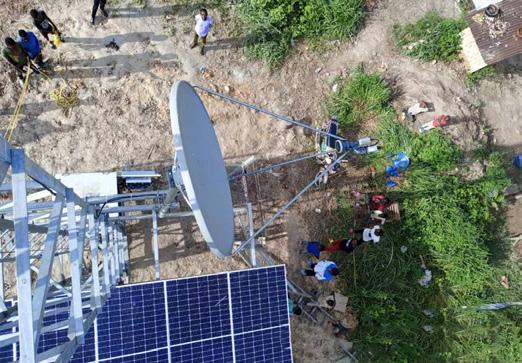
Quality and robustness are at the core of PROCO’s unique equipment design with every component of the hybrid power systems, cabinets and tower structures being pre-tested prior to shipment under various conditions to ensure lasting and effective function, and it was no different for the company’s work with Vodacom DRC. It was PROCO’s application of innovative drive to answer industry issues that saw it chosen as a key partner. One of the impactful aspects of the solar operation in the DRC is that of shading on solar panels, with rainy days seeing up to a 30 percent lower yield of energy, and it was one of Vodacom DRC’s requirements to answer this problem.
In response, PROCO applied its expertise to achieve a level of productivity that sees such RCS sites able
to operate 100 percent on solar power for up to four days consecutively, while efficiently harvesting solar energy in the high-capacity batteries. This answer was above and beyond what Vodacom DRC had requested for “green energy”, and added significant benefits in uptime, profitability and overall savings, proving PROCO’s offers the most efficient tower and solar panel design in the market.
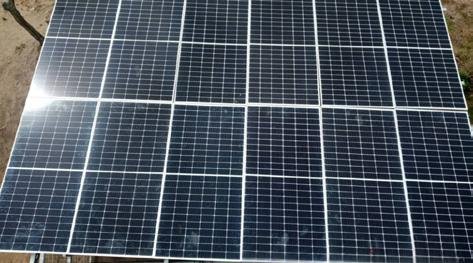
This is one of the many reasons PROCO is chosen as a premium supplier to Vodacom DRC. Given the challenging terrain and remoteness of the rural sites, it was also imperative that several technical enhancements were undertaken to ensure site uptime, autonomous reliability, safety for workers and site security. High site performance, the longevity of lifespan and autonomy were critical, especially as the remote nature of the sites made them more difficult, expensive and time-consuming for technicians to reach and for maintenance to be undertaken.
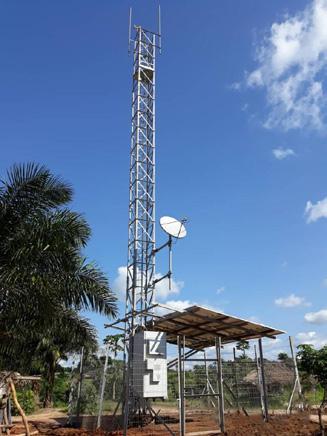
Additionally, by using industry-leading equipment such as LiFePo batteries, PROCO ensured that energy storage at the site has the potential to be increased to
for all across the DRC, keeping people linked through reliable communication, services, information, banking and entertainment. Alongside this, accessibility to rural locations across the country is a priority for both PROCO and Vodacom DRC.
The drive towards facilitating and increasing connection for all communities across the country is front and centre for PROCO. 4G connectivity has been proven to reduce poverty and grow prosperity, and PROCO recognises this critical fact in the improvement of lives within the DRC through education, information, finance and communication. People around the globe, especially after COVID-19, have become so dependent on the internet and information to exercise their socioeconomic human rights such as education, healthcare, work and housing, that online access and digital connectivity is now being debated as a basic human right.
1,000Ah (a 40 percent increase on its current design) through minimum modifications, if required, as well as spare space for additional controllers and MPTs to develop potential for future expansion. This consistency in productivity, reliability and foresight proves the quality of PROCO’s offerings by providing maximimum site autonomy specifically catered to Vodacom DRC’s requests, and achieving a successful and long-lasting project that will operate into the future and answer the growing consumer demand in the DRC. With such a future in mind, PROCO is helping Vodacom DRC achieve a great contribution to people, as well as the planet. In an increasingly digital age, connectivity is critical. PROCO is paving the way for digital accessibility
As such, PROCO’s focus on people is reflected in its customer service. The company recognises customer demands and acts to meet them swiftly, priding itself on achieving customer objectives within the boundaries of deadlines and budgets. When it comes to delivering such objectives, PROCO has the ability to mobilise efficiently and maintain the best possible industry standards, ensuring a consistent high level of service, no matter the customer project. Together with our strategic partners, the next step in the evolution of the business is to offer network as a service (NaaS) to telcos across the continent as a cloud service model in which customers can rent networking services from cloud providers.
KHALIL AL AMERICANI, CEO:
“I have been the CEO of Vodacom DRC since August 2021. I’m also the Chairman of the Board of Directors of Voda-Cash, the subsidiary of Vodacom DRC that specialises in financial services accessible to all in the country known as M-Pesa, a pan-African payment platform.
“I’m from a civil engineering background, and have always had a burning passion for inclusion, innovation and disruption. I built the majority of my career primarily in operations and general management before expanding to strategy and business development.
“I’ve worked across Africa and the Middle East, having amounted more than 20 years of experience in the telecoms sector, and this has enabled me to develop essential skills for the growth of global markets in the fields of commercial, technical, operational, strategic, and consulting.”
To attract the best talent to its operations, Vodacom DRC’s internship programme is open to every student in the fields of engineering, computer sciences, marketing, commercial, legal, finance, and supply chain to enrol in a month of training free of charge in any department of their choice.
“We offer online training to our staff, both when they first join the company and for existing employees to grow their skills and potential,” says Al Americani. “For example, we have a trainee programme for the integration of new university graduates in our organisation, granting them their first professional experience and later with an opportunity for full-time positions as managers after two years.”
This promising talent strategic approach is achieved through a variety of programmes: Elite, a two-year graduate excellence programme; Columbus, a two-year exchange programme; and Moto Molo, a scholarship for furthering studies abroad.
Vodacom DRC prides itself on contributing to building the nation’s digital ecosystem through strategic partnerships in digital literacy. The company launched digital labs in collaboration with Kinshasa Digital Academy (KADEA), which falls in line with Vodacom DRC’s strategy to support employment and develop digital skills in the country.
The need for digital tools and technology in the DRC cannot be overstated. It is because of the necessity of connectivity, excellent offers and dedicated people that Vodacom DRC is seeing such growth in the country, and the company is
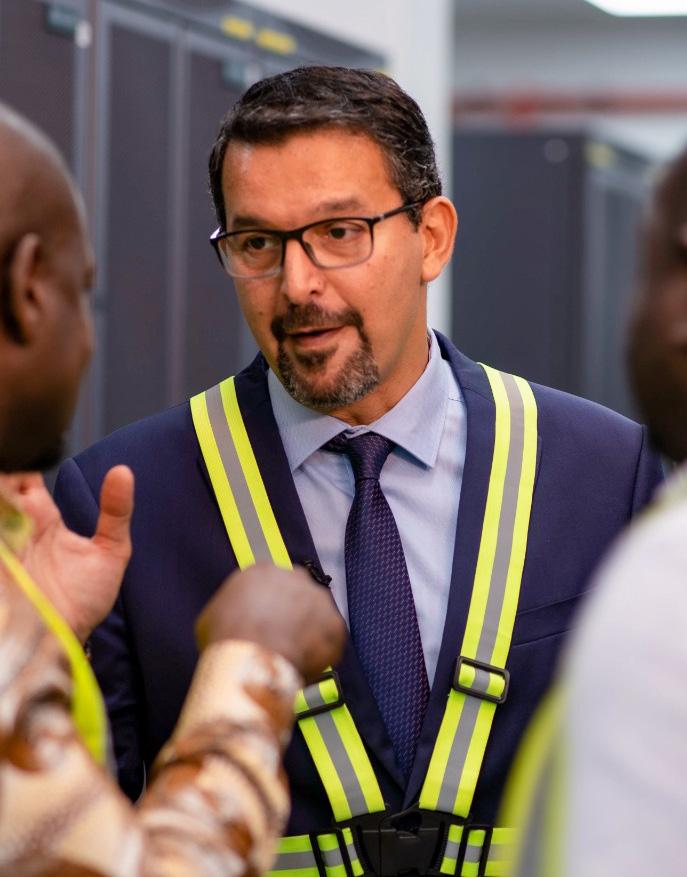
rising to meet the increasing demand across the nation.
“In our modern expansion journey, we are now looking at technology not just as a product but mostly as an enabler for our innovative developments,” Al Americani tells us. “In this regard, we are accelerating 4G deployment to develop the IoT and encourage the usage of artificial intelligence (AI). Furthermore, we provide open application programming interfaces (API) to fast-track integrations with local developers. This way, they can use our APIs including the payment methodologies through M-Pesa.”
Vodacom DRC is improving its 4G coverage in main cities and large towns for greater network availability through power upgrades and battery swaps to reduce carbon footprint. According to Al Americani, 5G will provide the infrastructure needed to roll out the entirety of the company’s innovations, boost capacity enormously, and open up a whole world of new possibilities for its consumers in the DRC.
“As we progress in our coverage, we are able to circumvent the challenge of infrastructure through RCS deployment,” he adds. “The 100 percent solar-powered sites allow us to bridge the coverage gap at lower costs in various remote areas.”
This use of solar-powered sites also highlights Vodacom DRC’s sustainability commitment, and that of achieving net zero by 2030. To achieve this, the company has implemented energy management plans in its operations, and integrating solar in its remote sites is a key part of this. Such sites are needed in remote locations where grid power is unavailable or unreliable.
“INNOVATION IS IN OUR DNA AND THIS WILL CONTINUE TO BE TRANSLATED INTO OUR PRODUCTS AND SERVICES”
– KHALIL AL AMERICANI, CEO, VODACOM DRC
Most of the world’s largest MNOs rely on Intelsat to deliver cell services. Consider how you can use Intelsat CellBackhaul to:


• Economically extend services regardless of location or terrain
• Build out your footprint in less time than with fiber or microwave
• Rely on guaranteed SLAs to support 4G and 5G service







• Address short-term seasonal and disaster recovery demand
Learn more at intelsat.com/cellbackhaul
“We intend to make renewable energy a standard component in power solutions for years to come. Meanwhile, we are driving efficiency in rectifiers, generators, and associated equipment. We are working towards our ISO50001 certification,” Al Americani continues.
“These are in our plans to improve energy efficiency both for environmental purposes and the efficiency of our operations.”
By nature of the industry in which it
operates, Vodacom DRC is driven towards innovation and is very agile in the way it develops its services portfolio to offer more value to its customers and create an improved customer experience. As just one example, developments like the ConnectU platform, a web portal that allows free access to vital information, play an essential role in connecting the unconnected.
Customer experience is at the centre of Vodacom DRC. The Vodacom App offers the convenience and efficiency of accessing all

M-PESA
M-Pesa is a simple, easy and secure way of allowing customers to keep money in an account via their phones, withdraw or transfer money, purchase airtime, goods and services, renew bouquets of cable channels, pay for air tickets and much more.
Customer satisfaction is Vodacom Group’s duty. The company’s teams work tirelessly to offer assistance that meets customer needs and concerns.
Thanks to its wide network coverage, customers can be connected everywhere in the DRC and benefit from the fastest internet connection.

company services in a single place. In addition, Vodacom DRC digitalises its customer journey through interactive voice response (IVR), reducing the need to contact call centres by 60 percent, a further representation of the company’s technological development moving forward. Yet, being people-centric does not just encompass convenience and offers; Vodacom DRC is also driven to help deliver security to its customer base.
“As a consequence of increasing digitalisation, consumers are more vulnerable to privacy infringement. That is why we are pioneering general data protection regulation (GDPR) with an innovative service that allows consumers to protect their identity and stay anonymous when it comes to simple transactions like airtime purchase,” Al Americani explains. “We are also developing our M-Pesa open API, a framework that will allow for the digital market to evolve in the DRC, where merchants can host mini apps and integrate them to the M-Pesa ecosystem.
“These are just some examples of our diverse digital offers, and we also provide a lot of digital content, such as sports, music, and video streaming that we have developed across our line of products.”
Sodeico Holding (Sodeico) was established in 1987 to meet a growing demand for experienced and qualified personnel in the Congolese employment market.
A pan-African multi-sector solutions provider, Sodeico offers its customer business services within human resources (HR) management, business development and consulting, procurement and supply chain, facility management, remote catering and camp management, and FinTech solutions.
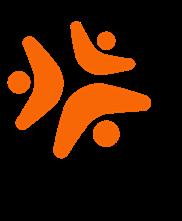

Sodeico Manpower, one of the company’s three biggest branches, specialises in providing high-level HR management services including recruitment, outsourcing (local and expatriate), HR consultancy, training, and payroll.
Human capital development is an influential component in enhancing competitive advantages within the telecommunications sector in the DRC.
“Intellectual capital is generally assumed to be an important aspect of the telecoms sector and one of the most conducive to innovative activity and unrestrained competition,” says Djo Moupondo, Executive Director at Sodeico.
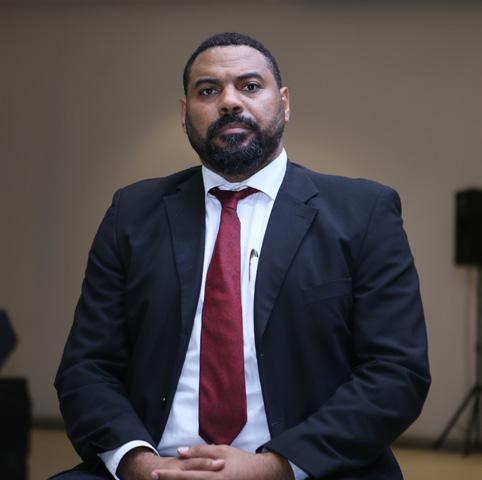
“It has mainly three key components: human capital, structural capital, and relational capital. Competitive advantages within this sector will not be sustainable unless an organisation uses these assets effectively and efficiently.”
Among these three dimensions, human capital is a combination of skills, competences, talents and know-how, ethics, values, and attitudes of both employees and managers.
Now, telecommunications operators such as Vodacom DRC and others are reviewing their strategies to deal with a volatile operating environment, expanding the scope and ambition of their digital transformation initiatives and refocusing on sustainable development by seeking to improve the diversity and integration of human capital and to attract new talents.
“According to a study conducted by Ernest & Young in late 2022, amongst the top 10 main obstacles faced by telecommunications operators, we can cite the inability to improve the corporate culture
and working methods,” Moupondo states.
“Employees feel empowered by working at distance and believe that the company culture has improved since the beginning of the COVID-19 pandemic.”

The report found that 91 percent of employees in the technology, media and telecommunications (TMT) sector want to work remotely at least twice a week; however, 25 percent of TMT employers think everyone should come back five days a week.
“Telecommunications operators must listen and respond to their employees or risk losing key talent,” emphasises Moupondo.
The lack of human capital development affects the telecoms sector in developing countries, as a lasting obstacle to success and a hinderance to enabled growth.
Now, developing countries are experiencing a boost in human capital development within the sector, with most major operators actively contributing to their intellectual capital growth as a leverage point.
“Improved education is not a necessary condition for telecommunications alone; it is a fundamental imperative for achieving most development goals, and governments must continue to encourage the integration of ICT into their educational strategies,” Moupondo outlines.
From a practical point of view, Sodeico Manpower has over 35 years of expertise in emphasising the vital role of exploiting intellectual resources with a specific focus on human capital development, from investing in human resources management with competences in recruitment technology, skills and talents search and placements, training and capacity building to successfully becoming a key HR partner within the telecommunications sector in the DRC, and throughout sub-Saharan Africa.
Djo Moupondo –Executive Director at Sodeico HoldingVodacom DRC continues to stand as a pioneer in rural coverage, having done so since 2012. A full decade of the company’s operations and services has seen it launch a new generation of RCSs that provide 3G data connectivity.

“Vodacom DRC has a social contract and commitment to accelerate development in the DRC through connectivity, and this commitment has been translated into practice by a range of projects and platforms,” AI Americani states.
One example of this is VodaEduc, part of the Instant Schools for Africa Foundation programme which is an effective response to global challenges, related to access for all and without discrimination to quality education. It has therefore been considered the largest philanthropic programme of the Vodafone Foundation for more than 25 years. Within this, VodaEduc provides free access to the national education curriculum alongside supplementary international education, to those who need it. This allows millions across the country to access quality educational content anywhere at any time, a
true offer of unrivalled value to the nationwide community.
Another platform is Mum & Baby, an informative tool for mothers and soon-to-be parents that helps to keep users informed regarding the health and well-being of both their children and themselves. Mum & Baby provides a range of media, including articles and videos, with advice when it comes to fertility, pregnancy, health centres, medicine, immunisations, infant developmental stages and
more, to give new families as much help as possible.
Overall, through its foundation, Vodacom DRC has launched digital classrooms across the country to promote digital literacy, contributed to poverty reduction through M-Pesa micro loans and micro savings services, disbursed approximately USD$2 million in loans through its M-Pesa platform, and promoted multiple programmes regarding diversity and inclusion.
KHALIL AL AMERICANI, CEO: “We are focusing more and more on an efficient way to increase the impact on the communities in which we operate, in terms of health, education inclusion, rural inclusion, and youth inclusion. Those are the driving forces behind what we do, and we make sure that we can be a role model for people and companies throughout the country. From an innovation perspective, we look to remain the primary employer of choice in the DRC.
“Additionally, we make sure to drive more meaning for our brand through our purpose of connecting for good, digital inclusion and the planet. These are very exciting times to be in the technology industry, and we believe that we can provide a vast contribution to our communities and society in general.”
“WE ARE CONSTANTLY ADAPTING, LEARNING FAST AND CHANGING THE FUTURE AS WE MOVE FORWARD”
– KHALIL AL AMERICANI, CEO, VODACOM DRC
Collab is thrilled to celebrate 14 years of partnership with Vodacom group. Our partnership has been strong and fruitful, with Collab's contact center solutions elevating customer experiences to new heights.

As we look forward to the future, we are excited to continue pushing the boundaries of what's possible in digital transformation, including a seamless transition to the cloud.
Join us on this journey toward innovation and success

Find the right balance between AI and human interactions
Make engagement simple and easy


info@collab.com | www.collab.com

“These kinds of platforms are incredibly important to people all over the DRC, and so it is equally important to make these accessible to everyone, no matter their location in the country,” Al Americani elaborates. “Today, and with help from partners in the industry, we have rolled out more than 855 RCSs, and we’re planning to roll out another 100 throughout the financial year.”
Moving ahead through 2023 and beyond, Vodacom DRC will continue to be a purpose-led company transforming lives in the DRC through technology, all the while adapting to the changes that present themselves in the industry and throughout the nation.


“In the future, we will be a fullyfledged technology company offering more content when it comes to education, agriculture, and health to drive further inclusion and well-being,” Al Americani assures us.
“Innovation is in our DNA, and this will continue to be translated into our products and services that meet the needs of our customers based on their requirements and enterprise. Our ambition, aside from innovating in technology, is to be a partner of choice – from assisting new tech entrepreneurs, through flexing our approach to customers’ needs, to supporting government and society. We are constantly adapting, learning fast and changing the future as we move forward.”
Regardless of the external challenges presented to the company, Vodacom DRC’s ambition, purpose, strategy and spirit, combined with its employees’ commitment and passion, will ensure the long-term success of the business because, in the words of Al Americani, “Together we can”. VODACOM
vodacom@vodacom.cd
www.vodacom.cd



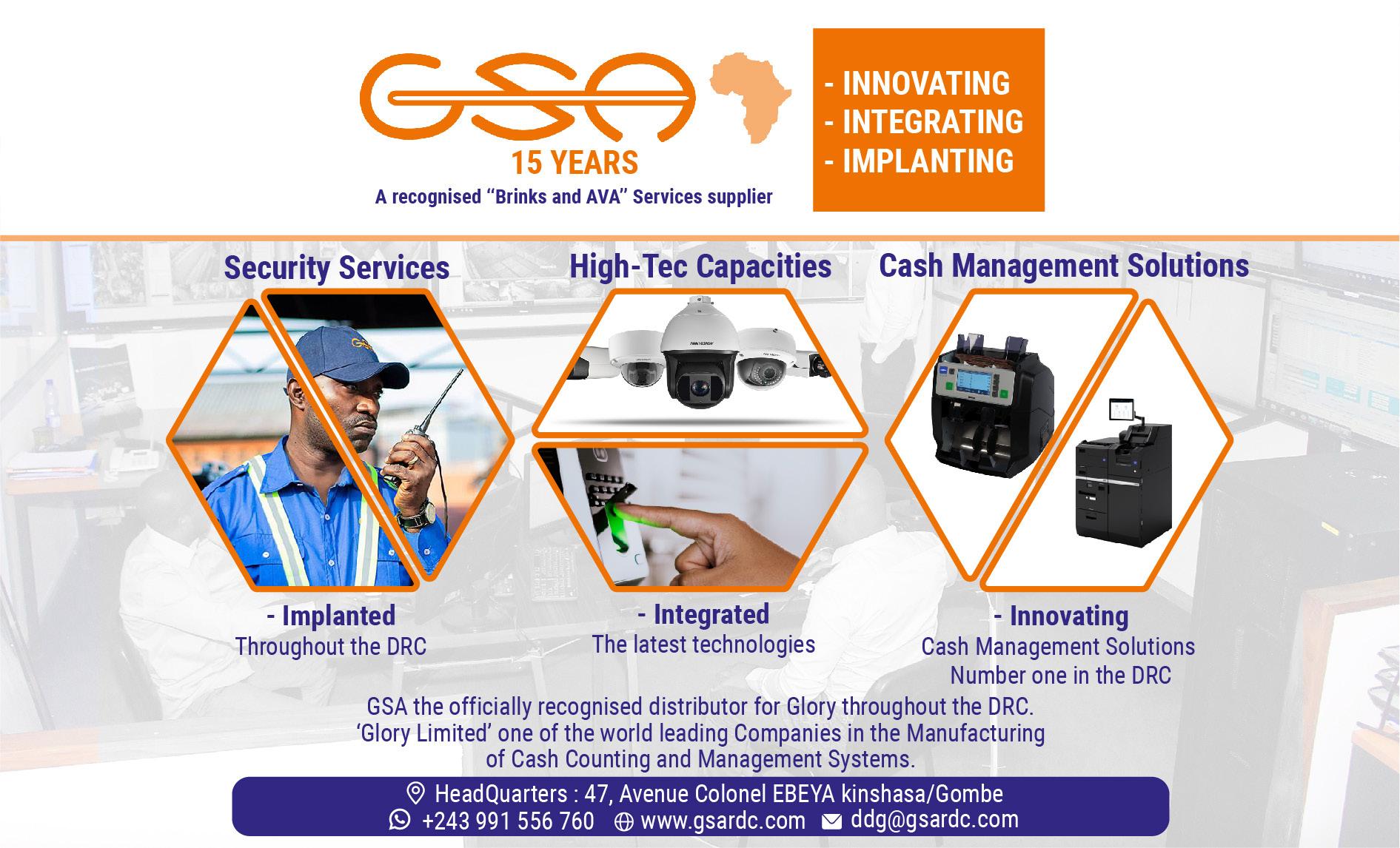
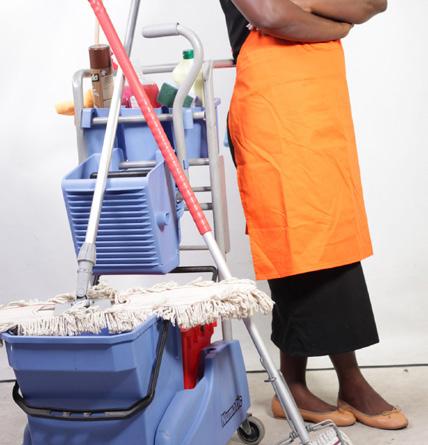
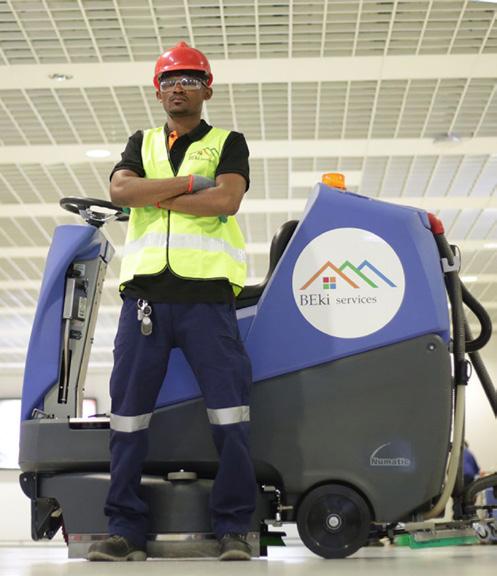
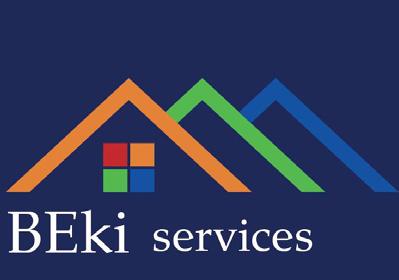
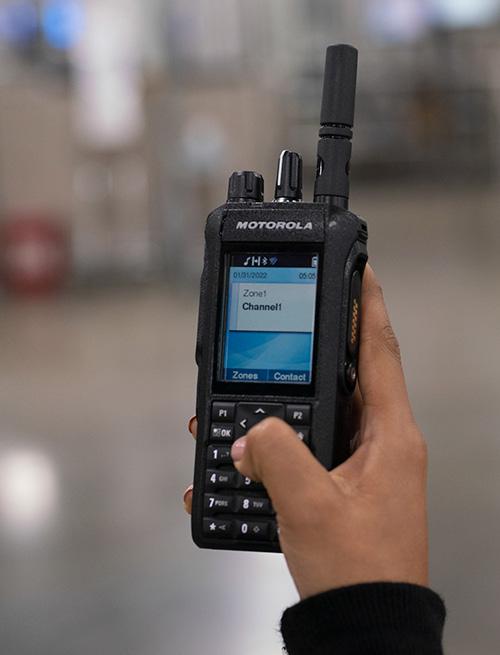

 Writer: Lucy Pilgrim | Project Manager: Josh Hyland
Writer: Lucy Pilgrim | Project Manager: Josh Hyland
Currently, the African telecommunications (telecoms) industry is evolving tremendously, as it becomes a significant contributor to the continent’s economy. Having recently undergone a rebrand, ATCOMM has a deep understanding of this dynamic field, and how it can benefit both rural and urban areas of Mauritius - where the company is based.

Accordingly, as the CEO of ATCOMM, Sebastien Dalais seeks to build on the movement and flexibility that can be found in the African telecoms industry, especially within the B2B space.
By recognising that the telecoms sector remains under the control of a few, ATCOMM took a leap of faith
and subsequently accelerated its development programme to match the advancements of other parts of the developed world, such as Europe and the US, where operators herald the advantages of internet connectivity, mobile solutions, electronic wallets (e-wallets) and more.
“In Mauritius, we have found it to be a space that is being democratised a lot, especially where there’s more room for clients to benchmark with the increasing number of operators and services. As a result, there is a healthy choice for the people of Mauritius, and we find that we are a big part of that,” introduces Dalais.
Even though the company was first established in 1996, it underwent

We speak to CEO of ATCOMM, Sebastien Dalais, as he discusses the changing landscape of African telecommunications and the company’s position at the forefront of this transformation
a rebranding in 2019, which saw a change of name and company focus. Currently, ATCOMM’s 40 members of staff are spread across three offices, two of which are in Mauritius with the third located in neighbouring Madagascar.
For ATCOMM, the customer experience comes first. As such, its product lines and services are built around the client base, with a business footprint spanning the Indian Ocean and the wider continent, with activity in Rwanda and Sierra Leone.
“I would qualify ATCOMM as a niche B2B Connectivity Provider with an emphasis on mission critical communications. We provide
Sebastien Dalais, CEO: “Through daily integration, we strive to make everyone feel part of one vision. The world faced a lot of disruption due to COVID-19. Consequently, we did not adopt a work from home policy, in order to keep the company identity growing. So, by staying in the office we kept
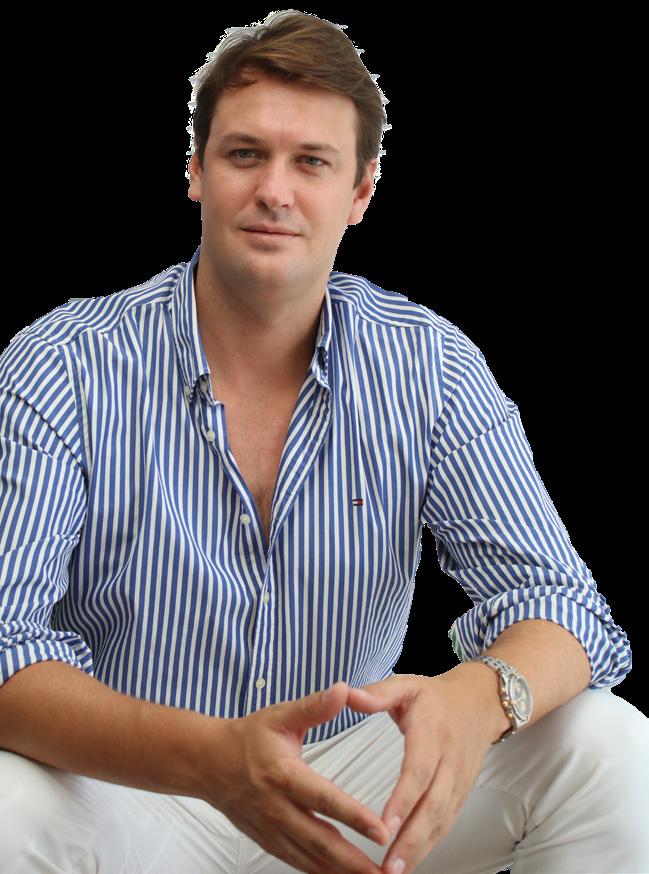

connectivity to clients in difficult environments, which differentiates us from the competition,” Dalais tells us.
ATCOMM’s operations can be divided into four clusters, which showcase both the established pillars of telecoms and the latest transformations in the sector.
Firstly, as one of the biggest parts of the company, the push-to-talk (PTT) operation means ATCOMM can offer radio communication via ultra high frequency (UHF), very high frequency (VHF) and through cellular 3G/4G. PTT is utilised across the mining sector, government entities, public safety, hospitality and logistics, amongst more. Thus, each client can enjoy instant group communication via private channels, which increases the speed of transmission.
“As a business tool, PTT has a certain operational structure where you can talk to many people at the same time in separate groups, making it the most efficient way to get the message across. It allows you to operate quickly and efficiently, particularly when you’re dealing with hazardous environments where the device is compromised,” Dalais explains.
Due to the company’s PTT capabilities, ATCOMM is a platinum partner for Motorola, catering to countries across Africa and the Indian Ocean. With end-to-end operations, the company will not only design the system for its clients, but it will also supply the equipment and ensure connectivity between the sites. Additionally, ATCOMM provides support and maintenance on an ongoing basis, which is a big differentiating factor for the company.
The accessibility of internet connectivity is at the heart of the company’s mission. ATCOMM BROADBAND SERVICES facilitates an internet connectivity backbone and has become an established licensed internet service provider (ISP). The company diligently
provides dedicated and best effort connections from point-to-point and point-to-multipoint over fibre and wireless to the B2B segment.
Furthermore, the company provides network redundancy, and on top of this, ATCOMM has access to three international cables that connect with Mauritius. This means that ATCOMM BROADBAND SERVICES has a redundant source that goes into its network operations centre (NOC), based in the Ebene Cybercity, to which it can then distribute to end clients.
“This an important area that is growing quite a lot for us. Our approach is based on quality over quantity at this stage, so we tend to go for particular segments that allow us to deliver a certain quality of service.”
The foundation for ATCOMM’s broadband division is customer satisfaction. As a result, the company abides by a comprehensive Service Level Agreement (SLA). As a contract between the company and the customer, it builds a further link and allows ATCOMM to provide 24-hour service.
The integral security cluster of the company (ATCOMM SECURITY) allows for the connection of CCTV to PTT devices via the Motorola Orchestrate platform.
If an issue occurs on client premises, ATCOMM’s CCTV cameras can detect an incident using a highly sophisticated artificial intelligence (AI) platform, that sends an alert to the closest PTT or mobile device, with reduced need for human intervention and supplementing increased efficiency.
ATCOMM security cameras are created through the partnership with Avigilon Cameras, a brand recently acquired by Motorola that has a great emphasis on AI.
“The objective is to have fewer cameras covering a larger scope with more intelligence behind it, in order to help reduce risks related to human intervention.”
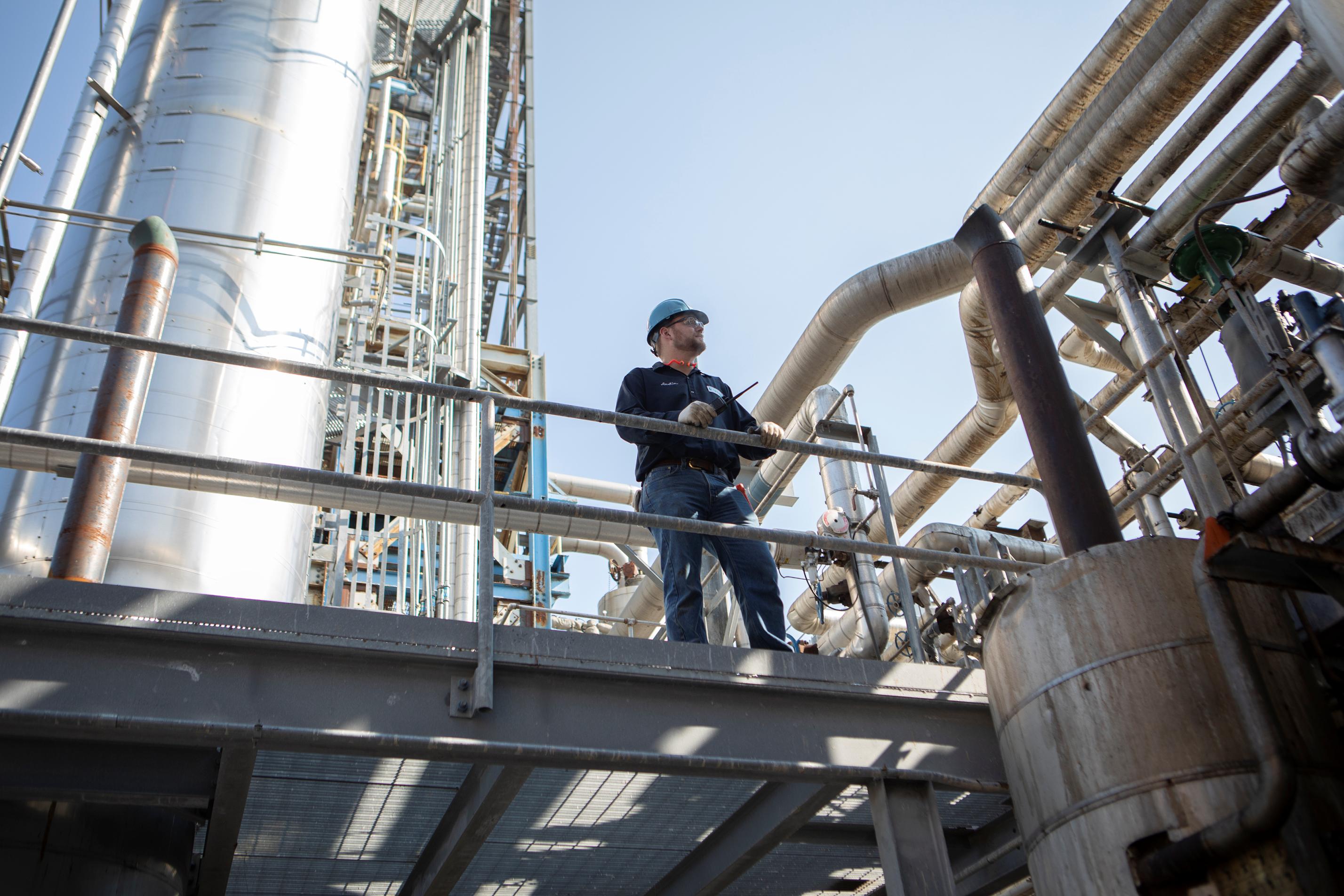





Occasionally, the company takes the opportunity to commercialise other security equipment such as body scanners, luggage scanners, anti-drug detectors, phone jammers and more.


ATCOMM possesses a commitment to its customers that is unmatched, as it is willing to go to places other providers will not go. Due to the flexible and mobile structuring of the company, the team can be on-site with a client, regardless of the challenges in time or location. The process flow within the company’s organisational structure facilitates a 24/7 rotation of staff subject to the needs of the client, whether in Mauritius or abroad.
Furthermore, ATCOMM is one of the few telecommunication companies (telcos) that has a dual function, with both a radio and ISP branch.
By revitalising the many synergies between the sectors, ATCOMM can provide a particular type of product to its customers that is seldom seen elsewhere.

“We’re a young and dynamic team emerging in the connectivity sector. The business is going through a state of change, and so we are able to grasp these changes that Motorola and Avigilon are quickly bringing to the game,” Dalais emphasises.
“A lot of players in Africa are being left behind, so we are trying to stay ahead of the curve.”
Evidently, ATCOMM is set apart from others by its tenacious striving
for innovation, most notably presented by ATCOMM Space. This otherworldly project demonstrates the cutting-edge capabilities of the telecommunications industry, as the company aims to host a low earth orbit (LEO) ground station aggregator in Mauritius.
The project will be completed in partnership with Leaf Space, an LEO ground station aggregator based in Italy. Leaf Space has collaborated with ATCOMM as its partner for Mauritius and the Indian Ocean Region. The exciting project will be used to connect and collect data from LEO satellites. Subsequently, the data is
“WE PROVIDE CONNECTIVITY TO CLIENTS IN DIFFICULT ENVIRONMENTS, WHICH DIFFERENTIATES US FROM THE COMPETITION”
– SEBASTIEN DALAIS, CEO, ATCOMM
commercialised to companies across Europe, America and Asia.
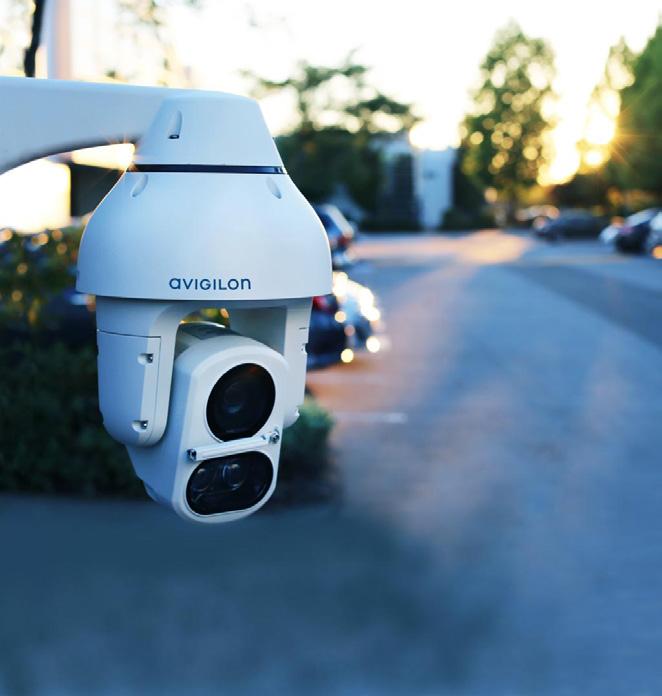
ATCOMM is going live with the first station in the next two months, before striving to install three more by the end of 2024. “This is good innovation for not only the company but the country,” Dalais expresses.
In the future, ATCOMM plans to develop each sector of the business. In the PTT portion of the company, there are hopes to expand further in the mining and public safety industry, particularly when branching out across borders in Madagascar and beyond.
Additionally, accelerating the potential expansion of broadband is also a primary focus, as ATCOMM endeavours to connect businesses from Mauritius to South Africa and beyond.
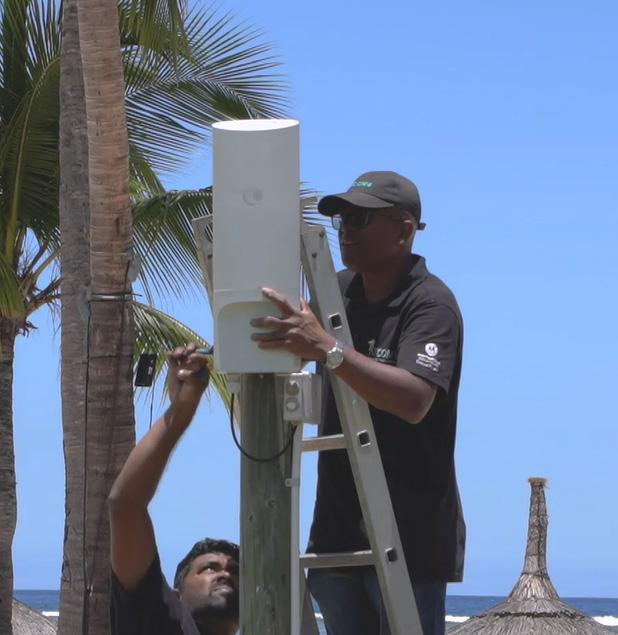
Sector wise, ATCOMM plans to take hold of the opportunities in hospitality and banking, where there is an increasing number of clients who have diversifying business needs. Subsequently, as the broadband reach progresses, there is a growing requirement for muliple lines and redundant network operations.
“If one site goes down and they

can’t communicate right away, they can’t operate. That’s where we come in with a diversification strategy in terms of source, so there is still great room for growth,” Dalais closes optimistically.
At the forefront of telecoms expansion in Africa, ATCOMM brings a fresh and innovative perspective to the industry, as it is willing to travel where others won’t, rising as a challenger to Africa’s connectivity divide.
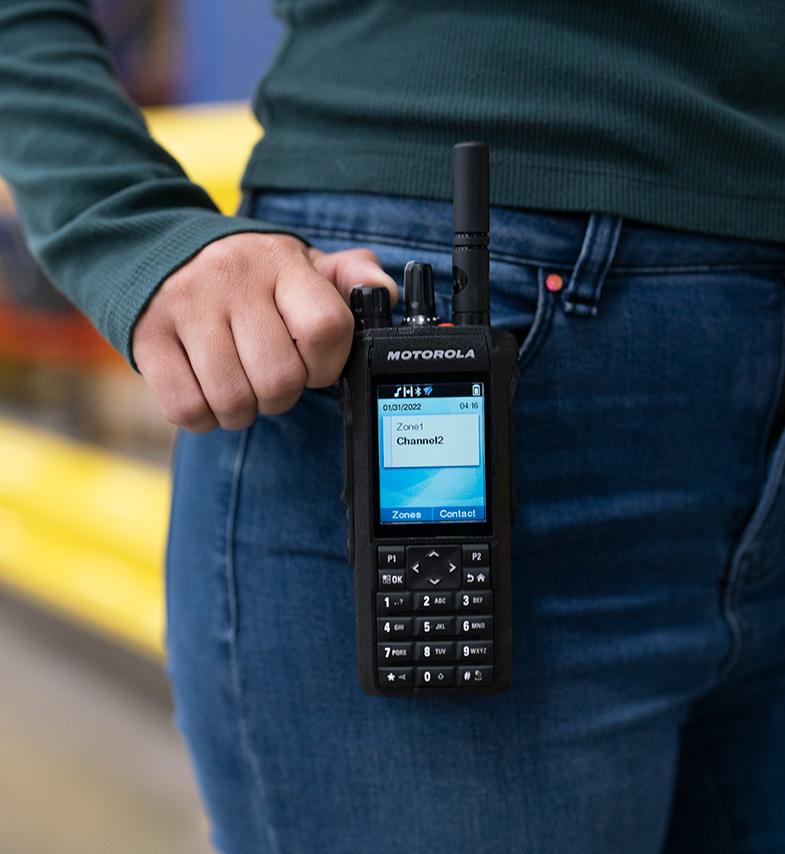
“ALTHOUGH WE’RE 27 YEARS OF AGE FROM A COMPANY PERSPECTIVE, WE WENT THROUGH A FULL REFRESH, WITH INNOVATIVE DNA”
– SEBASTIEN DALAIS, CEO, ATCOMM

Across the world, television networks are an integral pillar of the everyday entertainment for each country’s population. MultiChoice Zambia (MultiChoice) is no different, delivering an enriching customer experience as the nation’s leading entertainment company.
With a customer-driven focus, the easy accessibility of the entertainment provided by MultiChoice is felt across the country and neighbouring Southern African regions, through the digitalisation of its television platform. Furthermore, the company is proud to champion local creatives and entertainers, via a variety of initiatives that aim to encourage the younger generation of Zambia to progress in their careers in broadcasting, by
Writer: Lucy Pilgrim | Project Manager: Josh Hyland
helping develop skills and bolster a creative outlook. Thus, MultiChoice is positioned as a titan of the entertainment realm, highlighting the burgeoning capabilities of a changing entertainment industry.

Africa Outlook (AO): Firstly, could you provide us with some insight into your career to date and explain how you became interested in the broadcasting industry?
Leah Kooma, Managing Director (LK): I am a seasoned business leader with experience in various roles and organisations. I started my career at Barclays Bank (now ABSA) in 2002 and later joined Celtel (now Airtel) in 2004, where I worked in various roles
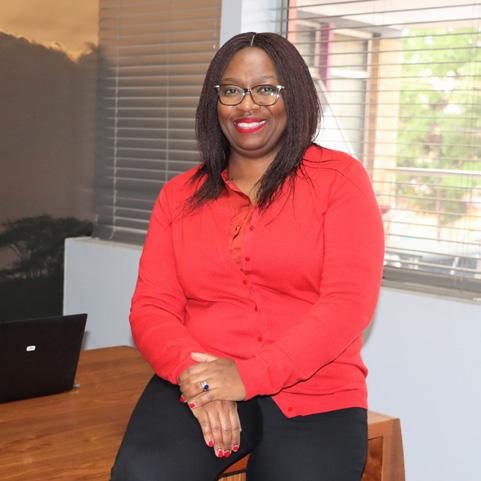
in Marketing, Sales, and Distribution. Then, in December 2015 I joined a team to start up Vodafone Zambia.
I worked for Vodafone Zambia as Chief Sales and Distribution Officer, where I was instrumental in setting up the company as a mobile broadband service provider, which was launched in June 2016 and offered a 4G long-term evolution (LTE) network. Vodafone Zambia offered customers high-speed 4G data services with market-leading customer services over a high-quality network.
I then joined MultiChoice Zambia in July 2017 as GOtv Commercial General Manager and was later appointed Chief Customer Officer, a position I held before my promotion to Managing Director in 2021.
We speak to Managing Director Leah Kooma, to discuss how MultiChoice Zambia is forging a path of accessible entertainment and supporting local creatives

AO: Could you introduce us to MultiChoice, including an overview of your main products and services, locations and client base?
LK: MultiChoice is a subscriber management business which has been operating in Zambia since 1994, enriching lives for 29 years. The company is a public private partnership with the Zambian government through a Zambian National Broadcasting Corporation (ZNBC) shareholding joint venture, operating with the MultiChoice Group.
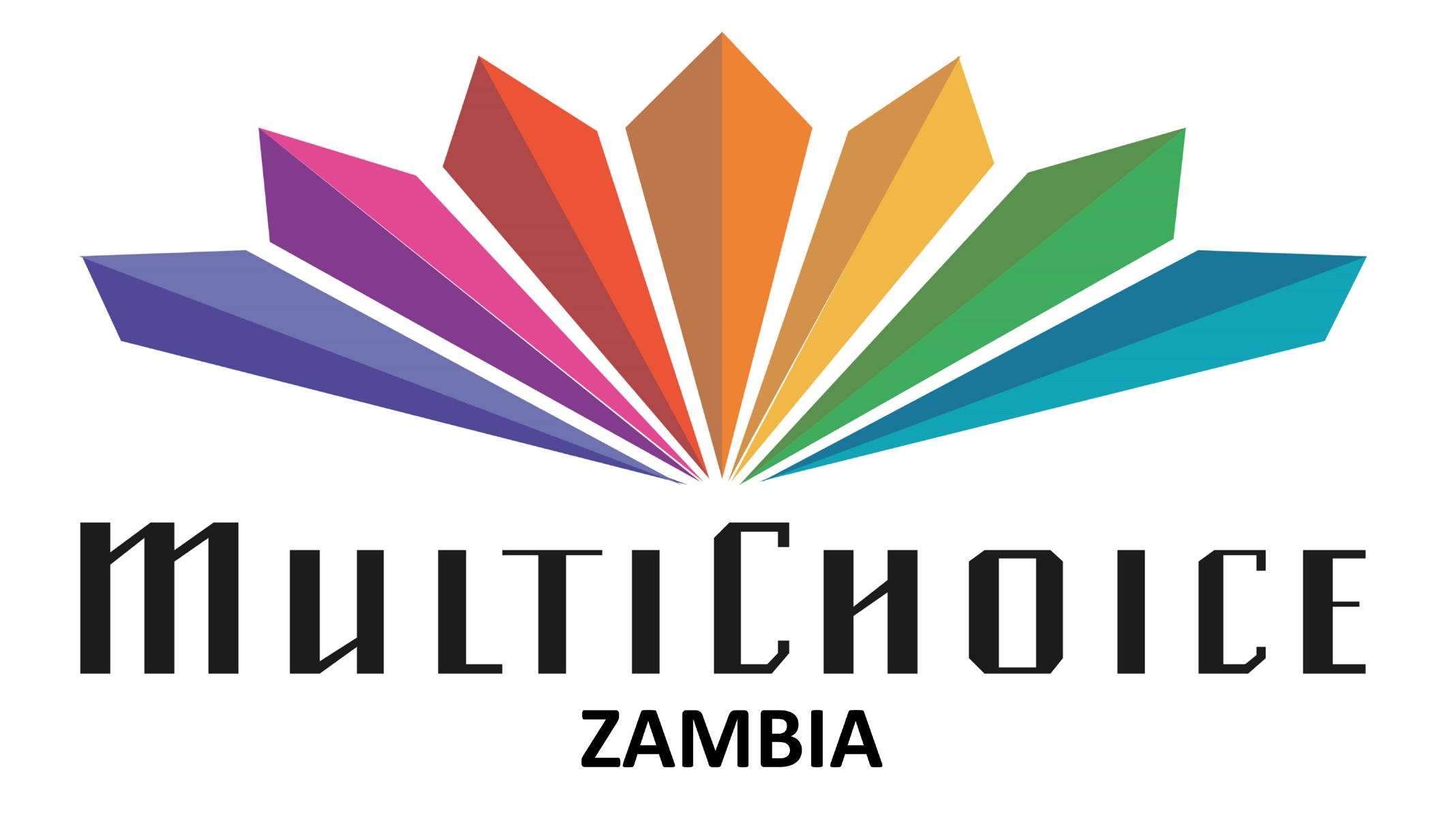
Our company provides subscriber management services for the DStv brand, GOtv broadcasting and GOtv Zambia Limited, including a joint venture between ZNBC and MultiChoice Africa Holdings to provide Digital Terrestrial Television (DTT) services under the GOtv brand.
MultiChoice provides video content on DStv and GOtv services through satellite and digital terrestrial capabilities, which are both available
in Zambia. Its mission is to deliver value to customers by making great entertainment more accessible using cutting edge technology. MultiChoice’s product offering also includes the DStv for Business offering for our commercial customers.




In continuing to deliver great customer experience using state of the art technology, we launched online digital apps known as MyDStv and MyGOtv allowing customers to manage their accounts in the comfort of their homes. Completed during the COVID-19 pandemic, it was meant to ensure customers continued to
access their accounts anywhere and at any time and give users the power to control their payments and viewing options.
The DStv App is another innovation that allows customers to watch live television on the go and this service is available to all DStv viewers.
Absa Group Limited (‘Absa Group’) is Absa Bank Zambia PLC’s parent company and is listed on the Johannesburg Stock Exchange in South Africa.

We’re one of Africa’s largest diversified financial services groups, offering an integrated set of products and services across personal and business banking, corporate and investment banking, and wealth, investment management and insurance.
The Group has a presence in 12 African countries, and an international representative office in London and New York. We have approximately 40,000 employees, more than 1,000 branches, and approximately 10,000 ATMs.

Transactional solution

Finance solutions
Merchant services
Women in business
absa.co.zm
The business has four branches across the country with a vibrant workforce of 206. MultiChoice is managed by a 100 percent Zambian team, with an 80 percent female led management team. It has two branches in the capital City Lusaka and two branches in the Copperbelt Province in northern Zambia. To ensure that its products and services reach its customers, MultiChoice has partnered with local entrepreneurs across the country to supply its hardware, as well as excellent service to customers.
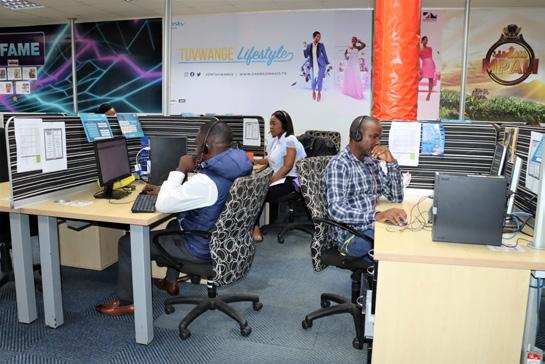

Our company boasts over 60 agencies or shops that are run by local businessmen and women whom MultiChoice trains, ensuring they provide the same quality and excellent service that our customers are used to. Additionally, we have over 350 trained accredited installers across the country whom we upskill to assist customers with dish installations once they purchase our decoders.
AO: What, for you, differentiates MultiChoice from the competition?
LK: MultiChoice is Zambia’s most loved storyteller and is committed to enriching lives by providing content that resonates with the Zambian audience. Our number one differentiator is our customer first approach and our ability to provide content for every member of the family. We pride ourselves on being the best in sport, international content as well as news channels. Local content also remains a core part of our differentiation strategy.
With the launch of Zambezi Magic and OneZed, which are unique to MultiChoice, we deliver homegrown Zambian content to our customers across the country. The two channels are already providing a significant boost to the country’s production industry. Both feature high-quality local content and showcase desirable and compelling local entertainment,
Leah Kooma, Managing Director: MultiChoice has a very vibrant, hardworking, and creative team that I am proud to lead. They all understand that they have a duty to ensure that we deliver on our business goals and objectives. As a company, we have implemented initiatives that recognise and reward hard work. These initiatives include the HR rewards system where we nominate and reward outstanding performers monthly, at a nationwide and regional level, as well as the Innovation Hub where innovative ideas are highly rewarded.
We invest in employee development programmes, inspiring employees as they imagine a future with the business. In the last financial year, we have invested over 25,395 working hours in training, denoting the value that we have placed on employee development. We have also invested in a Learning Management System (LMS) that we call MultiChoice Academy which is well versed with world-class training content from reputable institutions such as Harvard University.
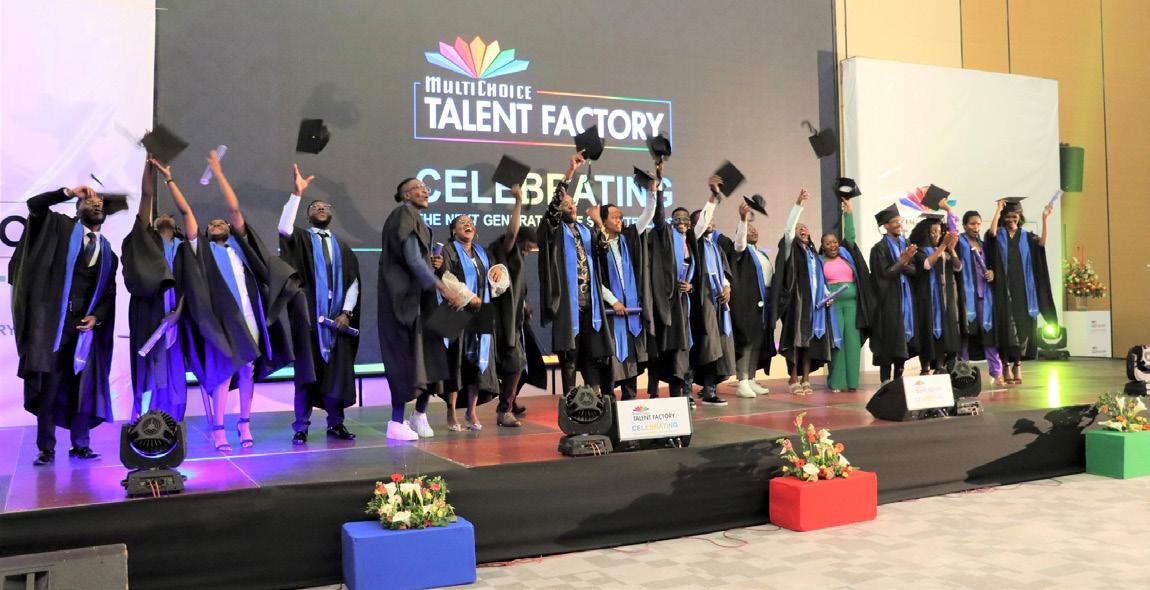
looking to inspire Zambians by adopting a bold approach to storytelling that reflects their real-life experiences and stories through shows that they resonate with.
AO: Why is the broadcasting of sport, particularly football, so important to the company?
LK: MultiChoice has a partnership with the Football Association of Zambia (FAZ), which is the official administrator of football in the country. MultiChoice, through SuperSport, has invested in license fees to the FAZ since 2012, sponsoring and covering Super League matches live on SuperSport. Playing a
As the Zambian economy and population has grown, so have we.
Our driving force has been to bring convenience to the out-of-home food and beverage consumer as well as providing outstanding customer service.
We are a Beverage Service Partner for Nestle Professional.
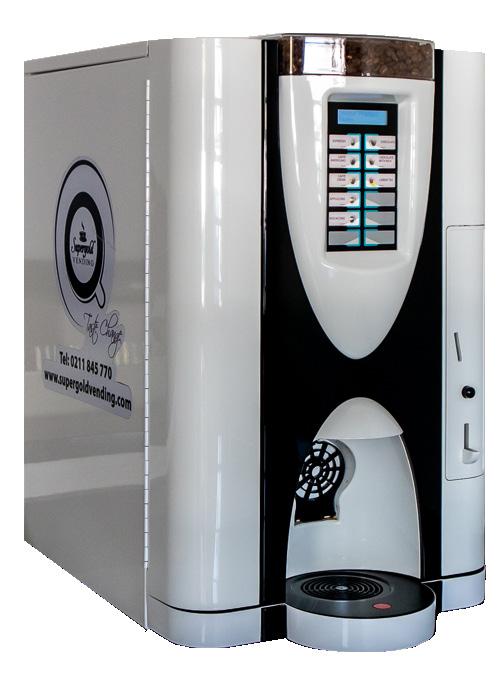

Dash Couriers is a Zambian company established in June 1990, with operations commencing in December 1997.

We currently service the corporate sector in Zambia, with a presence in Lusaka.
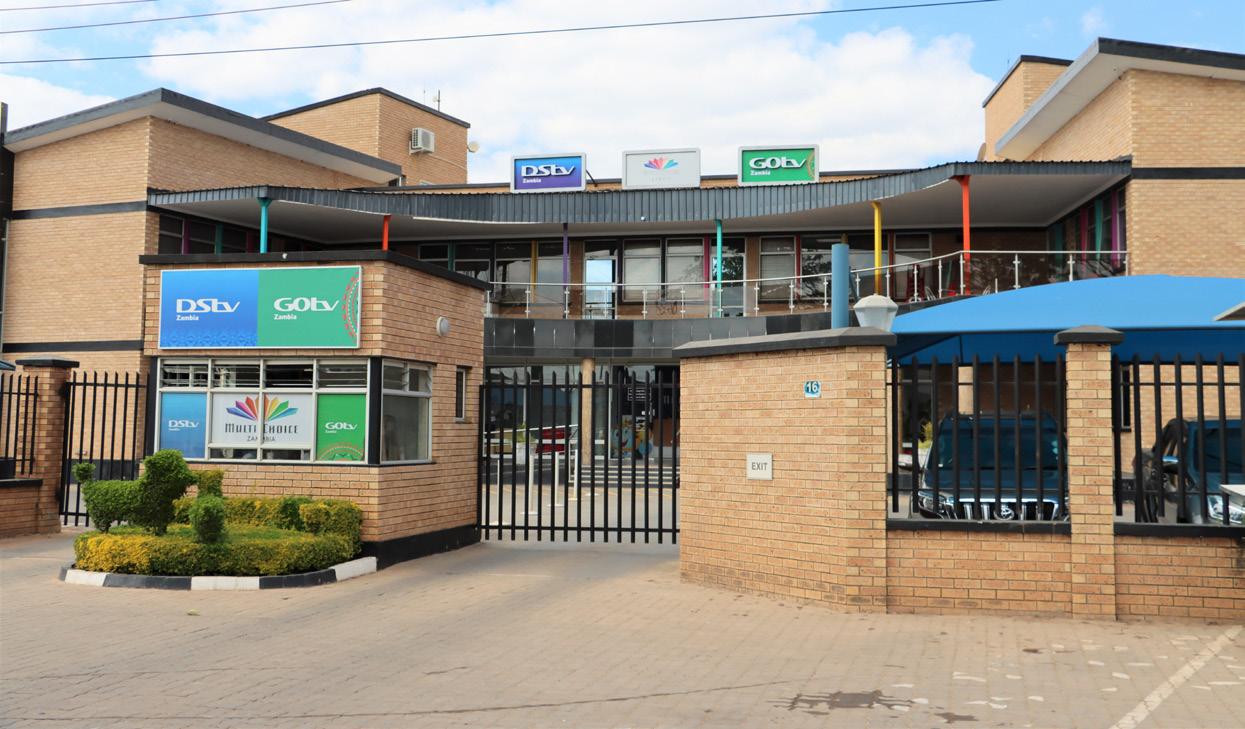
Our area of expertise lies in providing dedicated and tailor-made service solutions to our clients, with whom we have built ever growing business partnerships over the years.

Our high-calibre staff are trained to provide services to clients, meeting standards of integrity, efficiency and reliability.
We have been an outsource service partner to MultiChoice Zambia for over three years, providing onboarding services and Personnel to the Call Centre/ Customer Value Management/Social Digital Hub departments, ensuring that our outsourced resources meet the stringent KPIs embedded within the customer service standards with the aim of achieving optimum customer satisfaction.
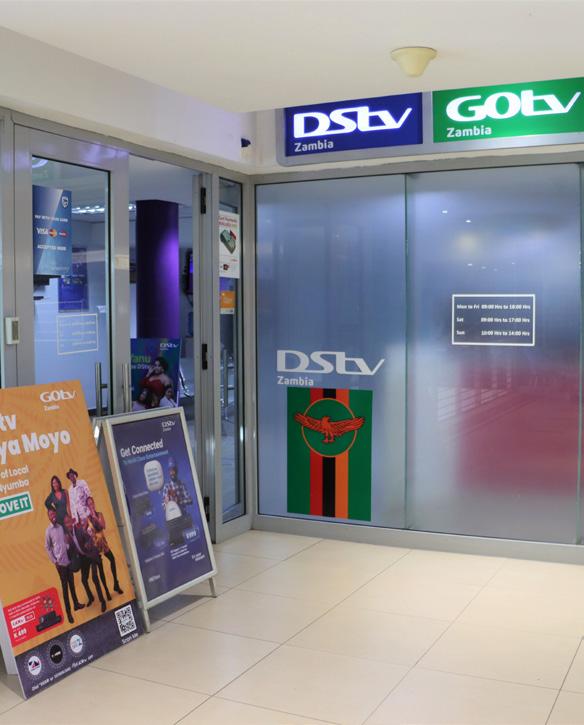
We wish to give a BIG THANK YOU to MultiChoice Zambia and MultiChoice Southern Support Services for having faith and confidence in us!
fundamental role in helping to build Zambia’s football community, these broadcasts enable clubs to generate sponsorships and ticket sales while supporting careers in the sports field and creating funding for sports development.
As you may know, football like many other sporting activities is a unifying
sport and as a business, we are proud of bringing this joy to Zambia while simultaneously enriching lives. Beaming the games live on SuperSport has exposed the game, the players and the local production talent in Zambia, thereby creating opportunities for the local stars not only in Africa but also the rest of the world.
AO: Are there any projects in the pipeline that the company is excited about?
LK: We look forward to continuing to deliver the best video entertainment to our customers. We are excited about what the future has in store for us, such as the New Football Season
(NFS), and looking forward to the start of the FIFA Women’s World Cup where our “Copper Queens”, the Zambia women’s football team, is participating for the very first time.
AO: Could you elaborate on the importance of localised production of entertainment and business operations?
LK: Our primary focus is to provide content that resonates with our audience. We must lead in ensuring Zambian stories are told and we do so not only by providing a platform to tell these stories but also by teaching people how to write stories through our various initiatives.
Enriching lives remains the core aim of our business and our localisation strategy speaks directly to this. Through local productions, we contribute to creating opportunities and job creation. The business estimates that it commissions 95 percent of Zambian productions
which has had an enormous impact on the local creative industry, as well as adjacent industries such as fashion, hospitality, and others. It has also had a positive impact from a consumer perspective as most of the content resonates and appeals to the local audiences.
AO: Following on from this, could you tell us about any localised based missions the company has?
LK: The business is deliberately focusing on its localisation strategy which aims to build and increase the local content on our platform.
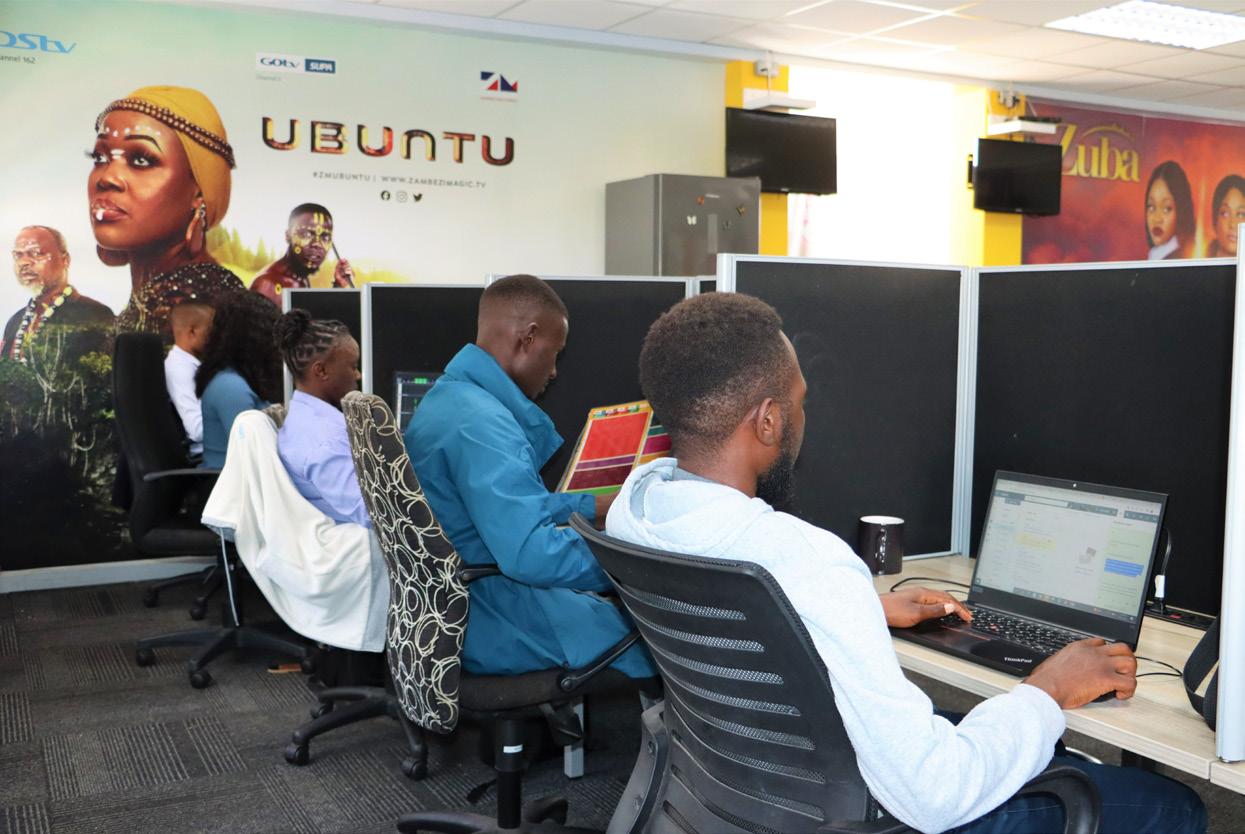
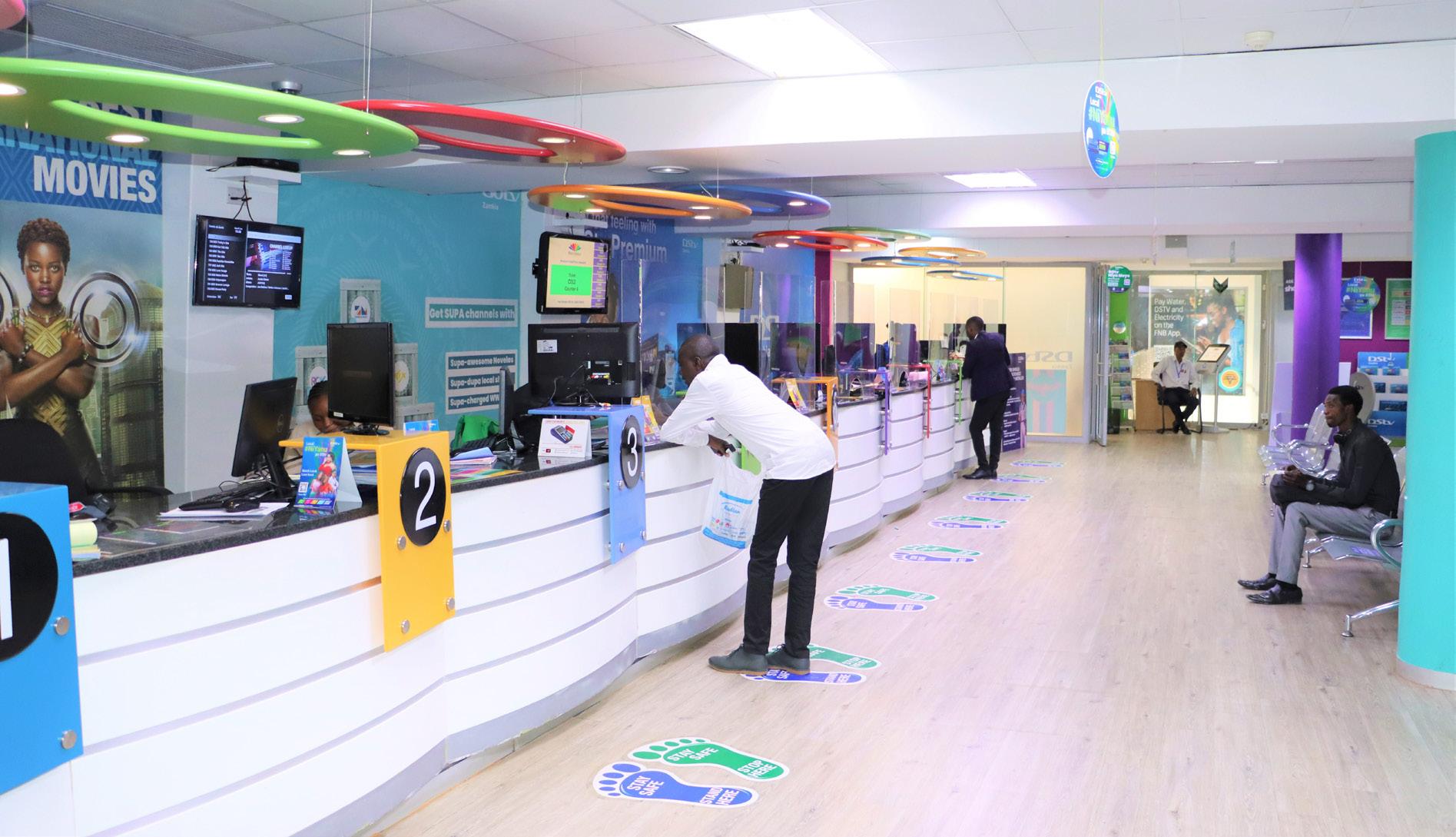 Social Develeopment Hub (SDH)
Social Develeopment Hub (SDH)
This is why Zambezi Magic is currently the topmost sought after channel in Zambia. One other way we are achieving this is through the MultiChoice Talent Factory (MTF). MTF, now in its fourth cohort, was designed to develop the skills and talents of young creatives in Africa thereby creating a constant pull of talent which in turn secures the growth of African filmmakers.
Since its inception in 2018, the academy has had a team of alumni who have gone on to work on their own productions or with various local production houses, creating value and enhancing the lives of young people in the process. Through the MTF Academy, a subsector of MTF, young creatives are gaining exposure to different cultures and perspectives,
which is broadening their horizons whilst expanding their worldview and storytelling skills.
This exposure is invaluable, as it is helping create a generation of filmmakers who are not only skilled but also culturally aware and empathetic. Moreover, the MTF Academy is creating job opportunities for young people and enhancing the socio-economic growth of the country. By equipping young creatives with the skills they need to produce high-quality content, the MTF Academy is creating a pipeline of talent that can contribute to the growth of the film industry in Zambia and across Southern Africa.
The Hyper Local Strategy approach by MultiChoice involves personalising programming and marketing to
Zambian communities, with the aim of providing a more personalised viewing experience for customers. Under this strategy, DStv and GOtv have created local interest channels like Zambezi Magic, One Zed and more, alongside programming that caters to the specific needs and interests of viewers in Zambia.



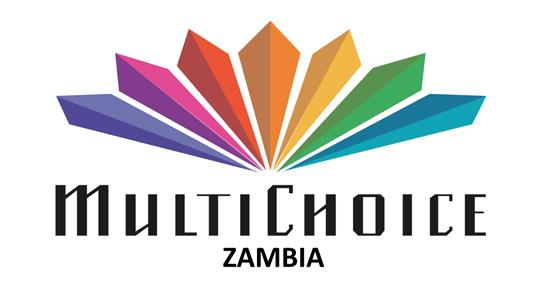
“WE LOOK FORWARD TO CONTINUING TO DELIVER THE BEST VIDEO ENTERTAINMENT TO OUR CUSTOMERS. WE ARE EXCITED ABOUT WHAT THE FUTURE HAS IN STORE FOR US”
– LEAH KOOMA, MANAGING DIRECTOR, MULTICHOICE ZAMBIA

The burgeoning African mobile communications market has ushered in rapid and innovative development in recent years.

The design of exclusive handsets twinned with the ever-increasing popularity of built-in services such as mobile money, has led to the increased adoption of mobile technology across the continent. While conditions vary across the disparate array of countries and regional economic communities, recent evidence points to mobile technologies facilitating an increasingly connected and sophisticated continent.
At the forefront of this development is Airtel Seychelles (Airtel), which was launched in 1998 and is Seychelles’
most innovative mobile phone operator, subsequently introducing many firsts in the telecommunications (telecoms) sector such as pre-paid plans, dedicated customer care, call ring-back tunes, video calling, mobile top-up, missed call alerts, MMS, and 4G data services.
Since its inception, Airtel has strived to meet customers’ needs, and continuously improve its service delivery through innovative technology with successful global partnerships.
Airtel holds the vision that connected people are inspired people.
Further to this vision, Airtel connects Africa’s people to each
Airtel Seychelles offers its customers the unmatched freedom to send, receive, and communicate from the palm of their hands, as it has grown impressively to become the nation’s primary mobile network to depend on


other, effectively empowering them to create opportunities, dream big and live well.
Additionally, this mindset represents a key part of the company’s overarching mission to provide globally admired technologies and services as Airtel is tasked with giving Africa an easy and dependable way to connect to the world.
Crucial to achieving this mission and vision is a core collection of company values which continue to facilitate ongoing success for Airtel.
Helping to tether all elements of the business together under one collective cultural umbrella is the defining trifecta of values which ask its staff to remain inclusive, respectful, and constantly alive to each new situation.
Airtel acts with unrivalled passion, energy, and a can-do attitude, whilst innovation and an entrepreneurial
Airtel Money is a mobile commerce service that allows users to:
• Send and receive money instantly
• Buy airtime for yourself or another person (Airtel customers)
• Make payments using Airtel money (utility bills, goods, and services)
Airtel Money is accessible 24 hours, seven days a week from your phone menu and is secure, fast, and easy to use.
spirit continue to act as the driving force of the company.
Aiming to always remain as inclusive as possible, Airtel champions diversity alongside a promise to deliver a level of respect and to act with humility whilst always remaining open and honest.
Qualities such as these enable the company to anticipate, adapt, and deliver solutions that enrich the lives of the communities Airtel serves.
Airtel has a strong commitment to ensuring information security.
To meet this high level of security standards as well as those of the legal bodies regulating the business sector, Airtel places a firm emphasis on making the platforms that its customers use safe and secure. However, even with these diligent efforts in place, customers must remain vigilant of what they can do
to maintain and increase the overall security of their system.
One effective method for increasing online security is through the implementation of regular employee training. This helps staff better understand how to protect themselves and their personal information, while also preparing them for the inevitable cyberattack that most people will encounter at some point.
The company has worked hard to develop a series of training courses which are designed to teach employees how to identify suspicious emails, recognise signs of phishing scams, avoid malware and other cyber threats, and report any errors or suspicious activity that they may identify.
Elsewhere, Airtel employs sophisticated encryption methods to maximise security, which involves the process of changing data so that it is unreadable or unusable without a key.

Last year, seven lucky singing talents from Seychelles battled against each other and competitors from 13 other African countries in Nigeria, to become the voice of Africa.

This incredible opportunity of a lifetime came through the launch of The Voice Africa singing competition, officially launched by the company along with Airtel Africa.
The Voice is a vastly popular music and entertainment show globally, which currently airs in more than 180 countries. The ultimate winner earns USD$100,000, as well as a music contract.
Brand and Market Communications Manager for Airtel, Jude Valmont, noted that it is important that applicants hoping to have a chance for the title must have a registered
Airtel SIM card, as they will be notified by SMS of their selection.
Airtel is Seychelles’ first telecoms provider to sell SIM card services to inbound tourists visiting the island. Airtel and Travizory announced last year that visitors to Seychelles will now be offered Airtel SIM card services when they complete their travel authorisation via the Seychelles Electronic Border System platform. This service allows visitors to purchase these pre-activated cards ahead of time, therefore saving them time in obtaining a SIM card upon arrival.
The ground-breaking initiative is the first of its kind in Seychelles. By scanning the required QR code from

the travel authorisation, Airtel easily collects all the required information from the traveller, such as name and passport number, in a purely digital format, enabling fast identity verification before the SIM card is handed over.
It is anticipated that the service will further enhance the travel experience for tourists, giving them on-the-go access to essential products and services via an easy-to-use platform. By partnering with Travizory to make the service available via the Seychelles Electronic Border System, tourists can confidently make use of the government-sanctioned service and connect to the internet as soon as they land. This is yet another example of how Airtel is transforming and enhancing the African mobile network industry on a daily basis.

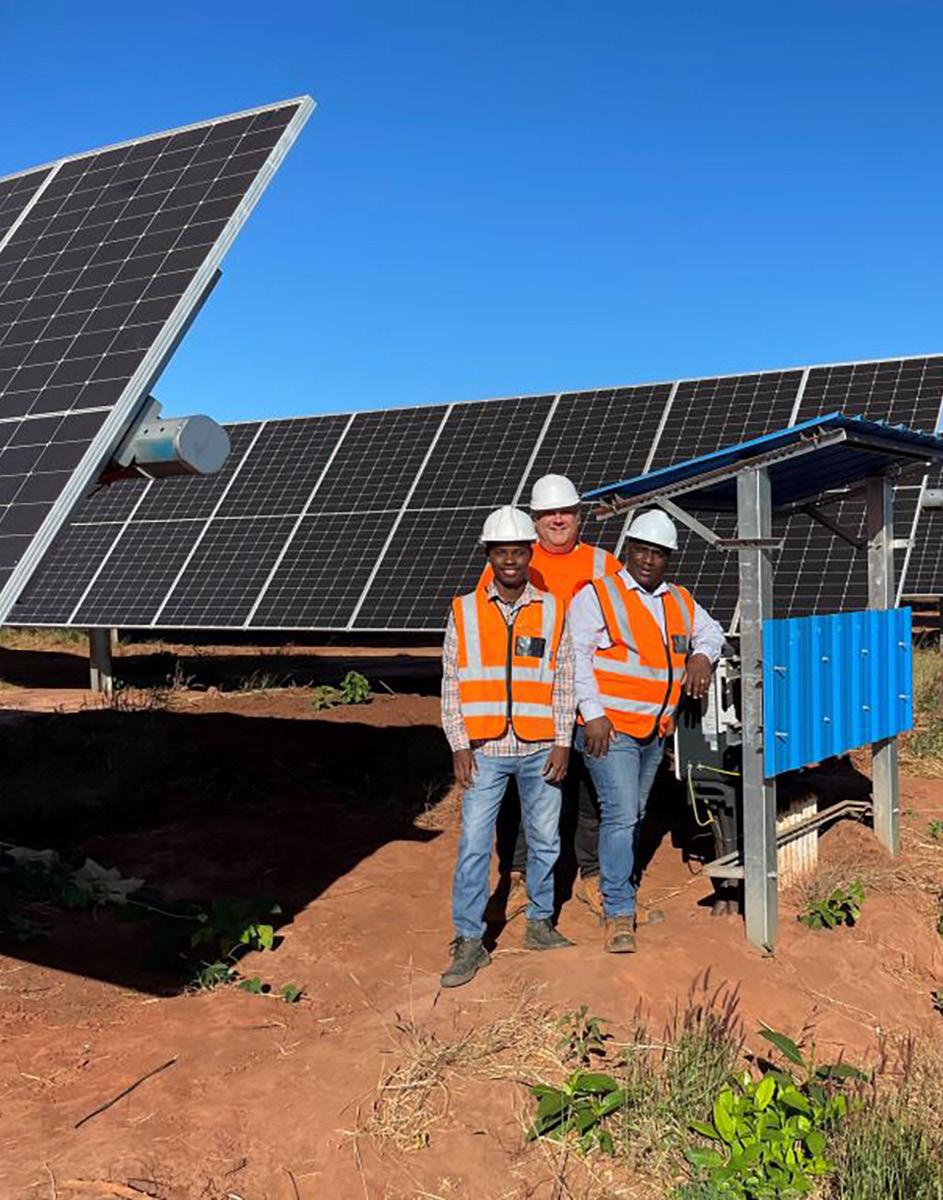
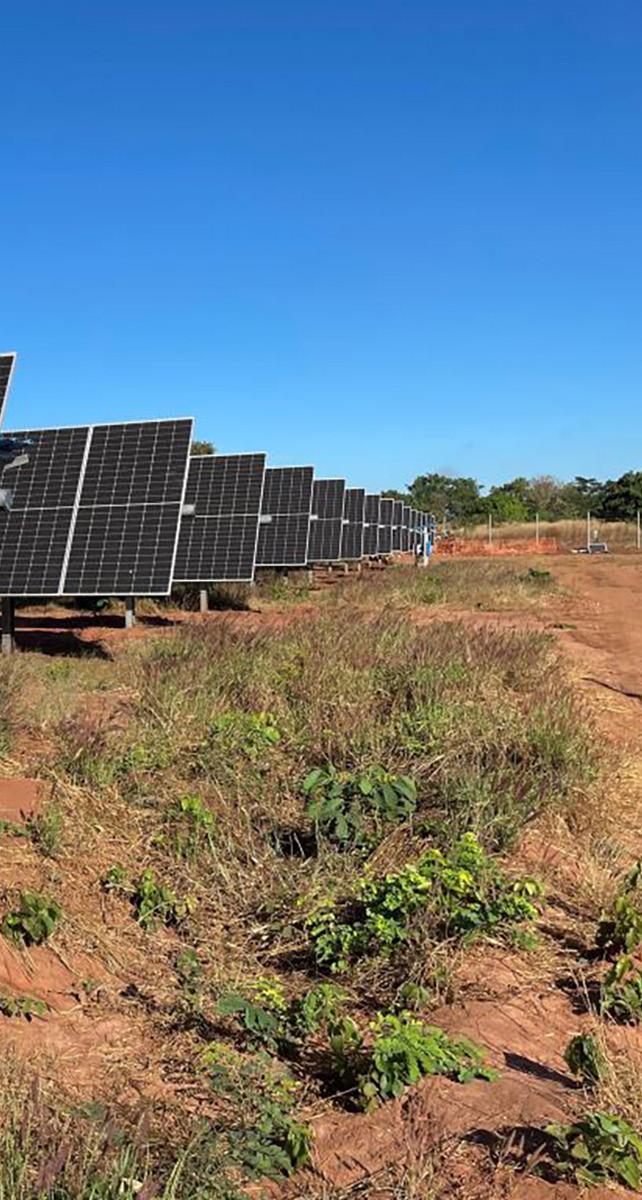
Writer: Rachel Carr
Project Manager: Kyle Livingstone
Solar power in Africa has become increasingly popular as a renewable energy source. Consequently, it is a rapidly growing industry that provides the world with an opportunity to reduce its carbon footprint and revolutionise how homes, businesses, and even transportation is powered.
Established in 1998, Solarcentury has been around since solar energy’s development, and over a decade ago, Solarcentury Africa (SCA) championed Africa’s adoption of the renewable resource which has seen the company pioneer its way across the continent.
Throughout SCA’s longstanding presence in the solar industry, it has remained committed to addressing unique opportunities in Africa.
“We have completed more hybrid projects than any other company in Africa. However, our current endeavours concentrate on delivering utility-scale projects and captive solar power solutions for prominent customers such as mines,” introduces Jason De Carteret, Head of SCA.
SCA is thriving under the ownership of BBE Energy, and as a renewable energy specialist it possesses the capability to handle the entirety of the
Africa Outlook (AO): Please introduce us to RECOM Technologies (RECOM).
RECOM: RECOM, which stands for ‘renewable energy (RE) company’, was established in 2007. The company is both Europe’s leading and sole Bloomberg Tier 1 PV module manufacturer with over 2.1 gigawatts (GW) annual production capacity and sales of 3GW solar modules in more than 100 countries.
Integrating R&D, manufacturing, and distribution, RECOM is a manufacturer of modules, inverters, hybrid storage systems, batteries and electric vehicle (EV) chargers with cell production facility in Padua, Italy acquired In 2015, and a module facility in Lannion, France acquired in 2017.
RECOM has been awarded by the EUPD research institute with the ‘TOP PV Brand ’distinction in France, the US, MENA, Vietnam, Hungary, and Greece.
RECOM is also an independent power producer (IPP), providing fully integrated solutions, from conception to development and securing power purchase agreements (PPA), to financing and asset management.
RECOM has developed, supplied modules and built solar projects around the globe, and currently owns and operates projects in the US and Europe, including a new development of 1.1GW in Greece.
AO: What differentiates RECOM from your market competitors?
RECOM: RECOM’s dual experience in manufacturing and project development combined with its Tier 1 bankability distinction positions the company with the advantage of providing a durable footprint in the global RE market.
RECOM’s longevity and success are predicated on its agility, adaptability, and ability to innovate, its commitment to providing high-quality services and products to its customers, and its attentiveness and responsiveness to the social, economic, and environmental needs of the general public.
We offer a wide array of products and technologies (Halfcut, Shingled, HJT, N-type Topcon, BackContact, monofacial, bifacial, double- glass) to cover all types of photovoltaic installations, all certified by leading independent testing institutes, offering up to 30 years product warranty.
RECOM’s five different PV module technologies are unique for a company in the RE industry:

• Panther Series | Half-cut
• Puma Series| Shingled
• Lion Series | Heterojunction
• Lynx Series | N-Type Top-Con
• Black Tiger Series | BackContent technology
Meanwhile, RECOM’s diverse range of inverters showcases the depth and breadth of our portfolio and its ability to cater to a wide spectrum of customer requirements, including the Single phase, Three phase, and Hybrid series.
Our supply reliability, readiness to deliver, high product quality, pre and after sales support and financial solidity are our strengths, and we are always ahead of the curve with the latest technology. We like to say that if the technology exists, it’s available at RECOM.
AO: Tell us about your partnership with Solarcentury Africa.
RECOM: As a dedicated proponent of RE, RECOM stands firmly behind Solarcentury Africa’s vision for a sustainable future. We are proud to have collaborated with Bonatti Group to participate in the completion of an impressive 11.25 megawatt (MW) solar PV installation in Balama Mine, Mozambique. This achievement exemplifies our unwavering commitment to driving the transition towards clean and renewable energy sources. Our cooperation with Solarcentury Africa and the successful completion of this project mark a significant milestone in our collective journey towards a greener and more sustainable world.

AO: What are RECOM’s priorities for the near future?
RECOM: Europe’s clean energy transition is stronger than ever, now that deployment of RE is being accelerated. Soon, RECOM will complete its second technology upgrade at the Lannion facility, with plans to expand in Europe and launch another cell and module manufacturing facility in the US. RECOM also targets to develop 20GW of solar projects worldwide in the next five years.
Balama Mine, Mozambique
SCA prioritises understanding and addressing the specific needs of its clients and partners in order to provide tailored solutions that align with their objectives. This client-centric approach is what sets SCA apart and forms the core commitment of adding significant value to every project the company undertakes.
• The SCA business model centres around four core areas: utility-scale projects, captive power solutions, merchant ventures, and decentralised off-grid initiatives.
• An integrated approach enables SCA to handle every aspect of a project in-house, from inception to completion, taking care of EPC selection, contractual structuring and arranging funding, which allows the company to deliver projects at a better standard for a fraction of the cost and removes a huge amount of complication for the end client.
• SCA pays attention to detail, focuses on quality, and is willing to embrace innovation and risk-taking. For example, SCA’s merchant strategy demonstrates an eagerness to explore new models and deliver solutions that most appropriately serve the needs of its clients.
project cycle in-house. Its specialist divisions empower the company to undertake projects from inception to commissioning with minimal external support.
“What sets SCA apart is our approach as an energy partner rather than merely a consultant to our clients,” observes De Carteret. “It is an advantage for mines who often

rely on an advisor for these services without the same level of commercial risk to expedite projects to financial closure.”
Additionally, SCA places importance on maintaining its relationships with landowners, co-developers, off-takers, and suppliers.
“Without the support of landowners who embrace the advantages of renewable energy, our projects would not be possible. We prioritise sustaining the highest international standards for environmental and social requirements across all our projects, which includes adhering to due processes in relation to land arrangements,” he details.
SCA frequently collaborates with co-developers who bring their own expertise and value to its projects.
“Our perspective is one of openness to partnerships, as long as both parties can contribute additional value to the project.”
Equally important are SCA’s suppliers, as it strives to deliver highquality, cost-effective projects, and its stakeholders, since addressing their unique needs and motivations ultimately increases the likelihood of achieving successful project outcomes.
Despite being a relatively small team of just 30 individuals, SCA operates from offices in London, Namibia, Malawi, South Africa, Kenya, and Mozambique.
Currently boasting an impressive development pipeline encompassing 101 projects, SCA represents a significant power generation capacity exceeding four gigawatts (GW). Furthermore, it has a growing pipeline of secured projects, with the aim of commissioning nearly 500 megawatts (MW) of capacity within the next two to four years.
Moreover, SCA has two new
projects to add to its ever-expanding enterprises. The company is pleased to announce the imminent commissioning of a flagship solar and storage hybrid project at the Balama Graphite Mine for Syrah Resources.
The project, located in the Cabo Delgado region of Northern Mozambique, comprises 11.2MW of photovoltaic (PV) capacity and an 8.5MW Battery Energy Storage System (BESS) which connects to the mine’s existing diesel genset system.

“The hybrid system is near completion, with final testing commissioning and energising due to be completed by the end of Q2 2023,” De Carteret confirms.
Once operational, the solar plant will significantly reduce the mine’s dependency on expensive and polluting diesel power with an overall renewable penetration of 36 percent.
“The mine’s full energy demand will often be met completely by the hybrid system during daytime hours,
which will significantly improve its environmental credentials.
“We are extremely proud to help deliver this project, which will make the Balama Graphite Mine one of the greenest off-grid mines in Africa,” he exults.
In addition to Balama, SCA is edging towards financial close on the 20MW Gerus project in Namibia in partnership with Sino Energy (Pty) Ltd.
The Gerus solar PV plant will be one of the first in the region to be developed and run as a full merchant plant selling its power directly to large customers within Namibia, as well as on the Southern African Power Pool (SAPP).
“The project is in its advanced stages with final licences, financing documentation and the engineering, procurement and construction (EPC) company selected. The second phase of the project will consist of an additional 100MW of solar PV, which
will be connected at the same Gerus substation owned and operated by NamPower,” De Carteret informs us.

Alongside the ongoing Balama and Gerus projects, SCA is currently making significant progress in the development of other projects across Zimbabwe, Namibia, Mozambique,
Zambia, South Africa, Botswana, and Malawi.
“We are actively working towards achieving financial close on many of these projects within the next 12 months, thereby adding another 400MW of additional capacity to our portfolio.”
The renewable energy transition in Africa has faced some well-known challenges including limitations in transmission and distribution infrastructure, the absence of clear and supportive regulations, lengthy development timelines, restricted
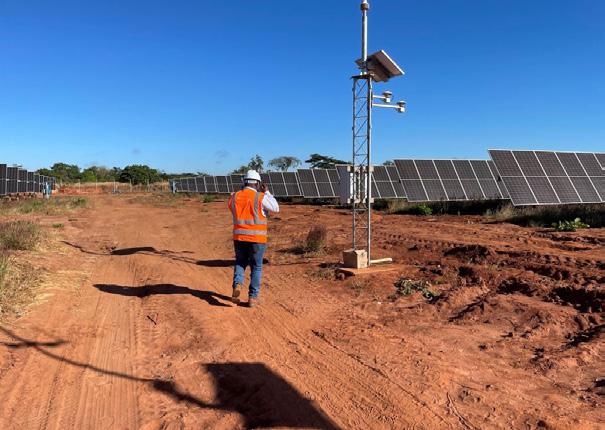
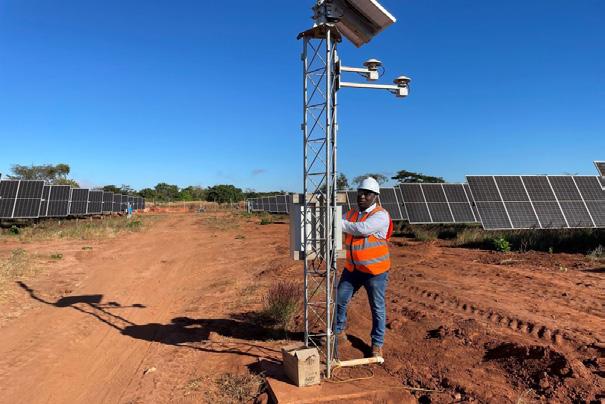
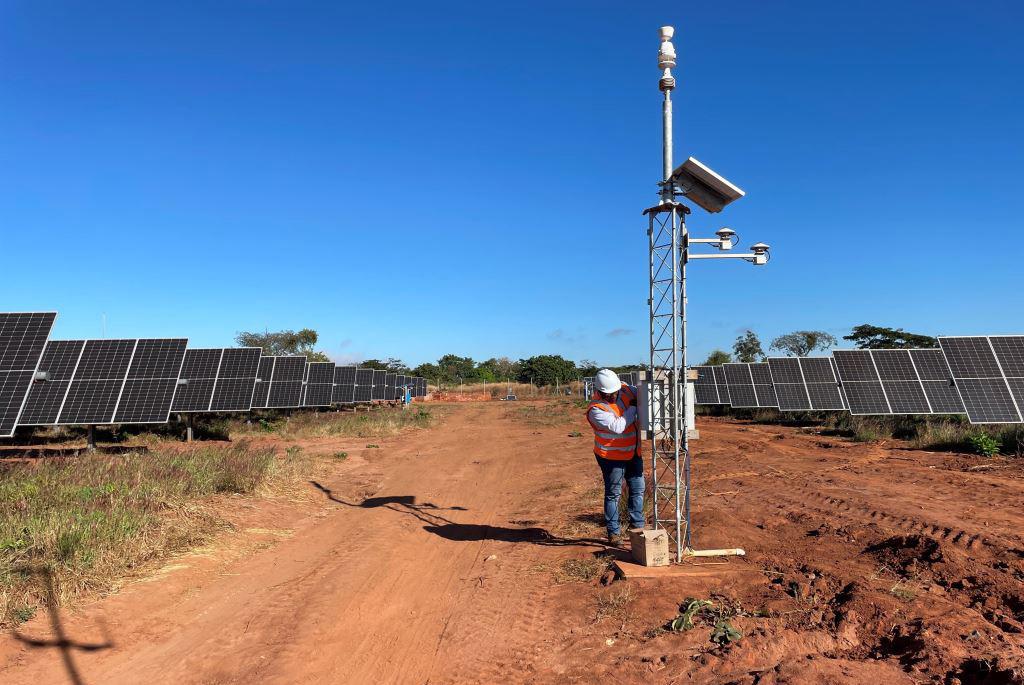
Jason De Carteret, Head of SCA: “In response to the expanding number of projects in our portfolio, we have trebled the size of our team within the past six months. Anticipating a continued inflow of secured projects in the coming years, we have strategic plans to further expand our workforce.

“We recognise the importance of increasing our local presence in the countries where we operate, and we intend to uphold this strategy in the foreseeable future. Furthermore, we strongly value diversity within our workforce. Our industry faces a wide range of challenges, and we believe that by fostering a collection of perspectives, we can effectively overcome these obstacles.
“With a dedicated team of employees, SCA can maintain expertise in design and development, engineering, financing, project management, operations, and legal matters.”
access to finance, balancing intermittent power supply with demand, and socio-economic factors.
Consequently, many countries are experiencing severe loadshedding or power cuts, and the uptake of installed renewable power plants has been slow-moving.
“Few utilities on the continent are running at a profit, meaning they are increasingly turning to the private sector to install the additional power capacity they need,” states De Carteret.
Despite these challenges, SCA has shown it can successfully navigate its way through the difficult landscape. Its focus lies in identifying viable and bankable projects where it can apply its expertise to add value to the market.
“We often turn down projects we do not believe in, and instead focus our resources on getting the projects we are committed to.”
Breakthroughs in technology mean that solar energy is constantly evolving. Solar cells and batteries are becoming more efficient than ever before, thereby revolutionising the industry.
“We are seeing advances in technology all the time. The declining cost of BESS has made it a favourable option for load fluctuations, balancing transmission systems and avoiding power outages.
“Our engineering team possesses extensive knowledge of renewables and stays up to date with the latest technological advancements. This ensures that our solutions prioritise quality and provide a multitude of benefits to our clients,” De Carteret notes.
Furthermore, the ability to trade power and assume market risk on merchant plants offers added flexibility through options such as take and pay and shorter tenures.
SCA’s dedication to innovation and pushing boundaries has greatly contributed to its achievements in Africa so far.
The International Energy Agency (IEA) estimates that approximately 770 million people worldwide, with a significant concentration in Africa, lack access to reliable, affordable, and clean electricity. After recognising
the urgency, the United Nations has established a universal energy access target to be achieved by 2030 as part of Sustainable Development Goal (SDG) 7, while SDG 13 emphasises the need for climate action.
De Carteret expresses that SCA is fully committed to contributing to these crucial objectives. “The company is deeply passionate about renewable energy and is dedicated to accelerating Africa’s transition to clean power sources,” he affirms.
By committing to these goals, SCA aims to establish itself as one of the leading Independent Power Producers (IPPs) operating in Africa.
“In the near future, our focus is on connecting the 500MW of power capacity already secured through agreements in place, while simultaneously advancing a substantial project pipeline for future development,” he explains.
Combined with reliability and sustainability advantages, as well as being cost-effective, it is no wonder that there is an accelerated growth in solar installment in Africa, and as De Carteret insists, “SCA wants to be at the forefront of growth.”
SCA’s priorities for the coming year involve keeping five years ahead of Africa’s renewable energy industry through meaningful strategies.
“The Balama mine will be in operation this year, which will be great to see, but we are also planning to enter the construction phase of at least three other projects, which will also expand the company’s footprint and countries that it operates in,” De Carteret enthuses.
Western Power Company’s Executive Chairman, Sipho Phiri, tells us about its plans for an environmentally friendly run-ofriver hydroelectric solution, driven by local developers and with significant funding from InfraCo Africa (part of the PIDG group) and the Development Bank of Southern Africa (DBSA)
 Writer: Rachel Carr | Project Manager: Kyle Livingstone
Writer: Rachel Carr | Project Manager: Kyle Livingstone
The electricity sector is undergoing significant changes due to an increasing demand for power, caused by population growth and increasing urbanisation in Zambia including the massive need for copper and other metals required for the global green transition. The need to reduce global greenhouse gas (GHGs) emissions plays a part in the further development of Zambia’s renewable hydroelectric power as well as the need to power Zambia’s economic growth.
As the Zambian energy sector
is primarily state owned, Zambia is transitioning towards private sector renewable energy generation targets, and private sector investments in renewable sources surges, the goal is twofold: to meet the rising demand for electricity while leading the way for further private sector investments.
Zambia, as with most African countries, is in urgent need of electricity generation, and Western Power Company (WPC) is leading the private sector in taking up the challenge to develop renewable energy to fulfil the exceptional
demand. Specifically created to implement the Ngonye Falls project, the company is in the final stages of development having completed all technical environmental and permitting obligations for the 180MW Ngonye Falls run-of-river hydroelectricity power station on the Zambezi River. With a total project cost in excess of USD$650 million Western Power Company have commenced with an Engineering, Procurement and Construction
(EPC) tender to select a contractor to commence with construction in 2024.

“The Ngonye Falls project has a world-class Community Participation Agreement (CPA) and WPC believes that this will become a standard for all renewable generation projects in the region,” begins Executive Chairman at the company, Sipho Phiri.
The development of Ngonye Falls, and similar renewable energy projects, is imperative to improve the economic growth of Zambia. The planned operation will not only boost the generation of energy to combat power rationing caused by the power deficit, but it will also boost economic growth which is predicated on the availability of energy, thereby fostering increased employment and reducing rural poverty.
“Only 30 percent of Zambia’s population have access to grid electricity and GDP growth is now inextricably linked to the ability to expand electrical generation,” outlines Phiri.
• Additional 1,100MW generation by 2026
• Green, reliable, and costeffective baseload electricity for 1 million people – which amounts to 100,000 tonnes of copper production per annum
• Construction of a new 110 kilometre (km) National Grid transmission line in Western Province
• USD$680+ million private sector funding in Zambia’s Western Province – amounting to the largest ever investment in the Western Province of Zambia
Phiri is a banker by profession and has 20 years of experience in corporate finance. Today, however, his focus, with his fellow founders who have been friends from childhood, is the renewable energy sector. Not only is he Executive Chairman of WPC (with 180 mega-watts (MW) run-of-river hydro) with InfraCo Africa, but he also Chairs, the 350MW Mphepo Power wind project (a joint development with Total Eren), the 100MW Western Solar Power project (a joint with Buffalo Energy and Serengeti Energy), and a 4MW mini hydro Luano Valley Power Company.
Mphepo Power will be Zambia’s first wind project and one of the largest wind projects in sub-Saharan Africa and Western Solar will be one of the first projects in Africa with market offtake by the Southern African Power Pool through Africa GreenCo. This Western Solar offtake arrangement will change the way projects are done throughout Africa, as Africa is currently the only continent where developers cannot finance projects based on market offtake. The legacy methodology of finding state utilities to offtake, usually with a sovereign guarantee, is the primary reason for the shortage of private sector renewable generation projects in the region.
“Zambia requires baseload power to support intermittent renewables like solar and wind and although renewables are abundant, this intermittency makes it very difficult for the grid operators to manage
the introduction of intermittent generation on such a large scale as the vast national grid of Zambia. Currently, generation is focused in the central and southern parts of the country and the Ngonye Falls project will add both base load power and grid stability, allowing for a further increase in solar generation.” Phiri informs us.
WPC is a Zambian led Independent Power Producer (IPP), which has to date been financed by InfraCo Africa, Development Bank of Southern Africa (DBSA) and the founders through African Power Projects. The Ngonye Falls project will generate enough electricity for 900,000 people and is located in the Western Province of Zambia. The Western Province of Zambia is the largest province by landmass with a population of 1.5 million and is currently very underserved with the province being supplied less than 15MW of power. Whilst there is still a significant need to improve the transmission network in the province, the Ngonye Falls project will be a significant boost to the development of the province. “Currently, the whole of the Western Province consumes approximately –14MW of power supplied through an ancient 66kV line, which is unsuitable – to put it into context, a large shopping mall uses around 5-7MW of power.”
“The old model of state-run utilities monopolising generation activity is not viable for the growth needed in most African countries, and a combination of state utilities and a
“THE NGONYE FALLS PROJECT HAS A WORLD-CLASS COMMUNITY PARTICIPATION AGREEMENT AND WPC BELIEVES THAT THIS WILL BECOME A STANDARD FOR ALL HYDRO PROJECTS IN THE REGION”
– SIPHO PHIRI, EXECUTIVE CHAIRMAN, WESTERN POWER COMPANY
DH Engineering Consultants is a Zambian based engineering consultancy firm providing engineering design, supervision and project management services countrywide. The firm has over 20 years experience and all engineers are registered with the Zambian Engineers Registration Board.
The firm specialises in the design and supervision of mechanical, electrical and plumbing building services, fire fighting systems, and petroleum installations across all sectors of commerce, industry, agriculture and public infrastructure.

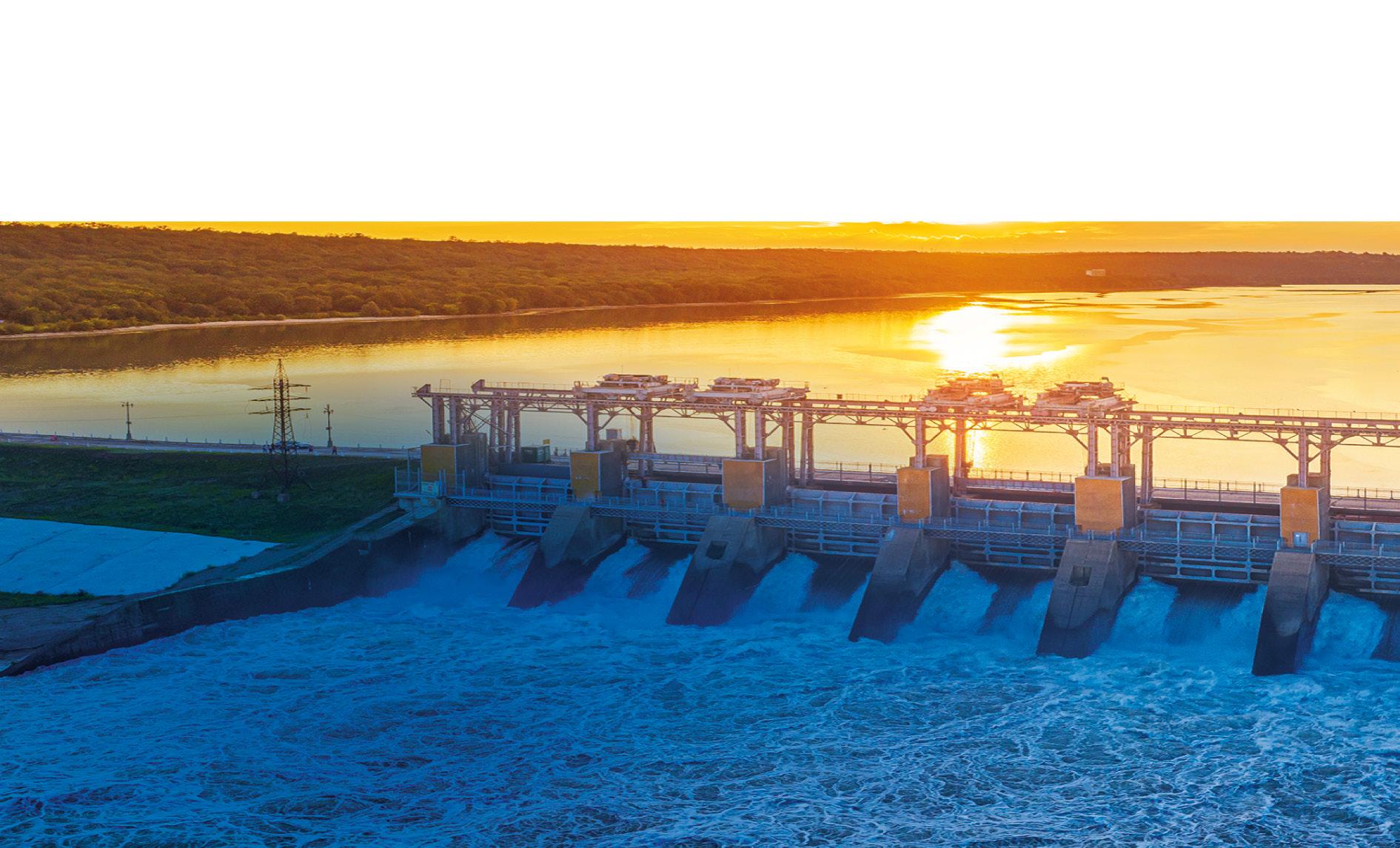
The firm also provides environmental consultancy services such as the preparation of environmental impact assessments and site health and safety audits.
KPMG is a global network of professional firms, providing audit, tax and advisory services.
Our business model enables deep industry experts to work shoulder-to-shoulder with business leaders to develop and deliver solutions, using highly specialised teams tailored to the specific business needs of clients.

vibrant private sector will hopefully lead to the electrification of the continent,” says Phiri.
Many countries have set ambitious renewable energy targets with investment in the sector increasing steadily in recent years. However, the transition to renewable energy is not without its issues, including inadequate infrastructure, and financing constraints, especially at the development stage, and although Zambia has a good policy environment, policy and regulatory barriers across the continent can be challenging.
“While challenges remain, there is potential for growth and development in the sector and IPPs will play a crucial role in achieving developmental and electrification goals. This will allow Africa to grow its economies and pull the world’s most deprived people out of poverty,” notes Phiri.
WPC will have close to zero carbon footprint as it has taken considerable strides to ensure minimum environmental impact. It is very unusual for a project of this scale to have such a small environmental impact and WPC take particular pride in this.
There are many advantages to a run-of-river hydroelectric strategy, such as providing significant amounts of reactive power and grid stability, thereby allowing the grid to take on more intermittent power sources, such as solar. Thus, not only are there long-term benefits for the overall system, but also allows for development at very little cost to the environment and is accompanied by a significant positive impact to the local communities.
“We are proud to be able to harness the power of the river for the development of Zambia, with such little environmental impact for such a large infrastructure,” Phiri states.
The hydroelectric project also has advantages for the ecosystems of the Zambezi River.
As he explains, “With no dams or water storage, and a weir structure to guide water into our canal and manage environmental flows, it is not harmful to aquatic life and is actually good for the aesthetics of the Ngonye Falls.”
Additionally, WPC realises the importance of sustainability across the company, and it has created a sustainable supply chain that is centred on maintaining a good relationship with suppliers.
“Creating a sustainable regional supply chain is important for many reasons: it can help to reduce carbon emissions, support local economies, enhance supply chain resilience and promote social and environmental sustainability.
“By sourcing as many materials, goods, and services locally, companies can reduce their carbon footprint and transportation costs, which can have a significant impact on the environment. It also promotes the development of local businesses, which creates skilled jobs and supports the local economy,” explains Phiri.
The introduction of significant power generation, that is projected to be part of a new gridline by WPC, will have a considerable economic impact in Western Province. Ngonye Falls will have the advantage of operating on one of Africa’s largest rivers, which is a great source for economic opportunity, and therefore, by partnering with the local community through the Barotse Royal Establishment, WPC is confident that immediate and long-term benefits will flow to the communities around the falls and the Province as a whole.
The Barotse Royal Establishment (BRE) is instrumental in supporting WPC with construction and has
a six percent golden share in the project. Returns from this will have a significant impact on the local community, and the CPA states that the BRE will represent all the communities in the Western Province. Too often Community Participations agreements are in the form of Corporate Social Responsibility programmes which takes control of development away from the communities affected. The Barotse Royal Establishment have established a development trust to utilise the significant inflows from the project into projects that they and the local communities feel are important to them.
“The BRE represents the Kingdom of Barotseland headed by His Majesty the Litunga, who is the traditional leader of the Lozi people. The CPA will bring significant inflows into the community for development projects,” Phiri informs us.
The company and the project will boost the local economy by providing 3,000 direct employment opportunities, plus significant indirect and multiplier positions, in addition to many highly skilled operations and maintenance jobs spread over decades of operations. Although WPC generally has a small workforce, it is motivated by the need to develop Zambia and to demonstrate that Zambian developers can lead large infrastructure, alongside their international partners.
“The President of Zambia, His Excellency Mr. Hakainde Hichilema, has publicly committed to massive growth in the electricity generation sector and has committed to private sector participation in achieving these aims.”
Alongside local economic gains, the sustainable project will provide significant support to the national transmission grid through voltage support and frequency control. By increasing national capacity, WPC will help Zambia meet the rapidly
increasing demand for power, therefore stimulating socio-economic development. Thus, potential customers will not have to wait much longer as the project progresses.
“WPC is an extremely welldeveloped project, technically and environmentally, and has finalised a Power Purchase Agreement with

ZESCO, the state utility. WPC is now proceeding to Financial Close and intends to commence with construction by the middle of next year,” outlines Phiri.
As WPC founders operate on an SPV (Special Purposes Vehicle) basis with each standalone project, it will continue to develop renewable
energy in Zambia, and look to pursue more regional opportunities in the future. WPC demonstrates that the African energy and utilities industry has a great future and with greater focus on renewable energy and smart grid technology will consequently carve a more sustainable future for the people of this great continent.
WESTERN POWER COMPANY
Tel: +260 211 262 773

info@westernpower.org
www.westernpower.org
“WE ARE PROUD TO BE ABLE TO HARNESS THE POWER OF THE RIVER FOR THE DEVELOPMENT OF ZAMBIA, WITH SUCH LITTLE ENVIRONMENTAL IMPACT FOR SUCH A LARGE INFRASTRUCTURE”
– SIPHO PHIRI, EXECUTIVE CHAIRMAN, WESTERN POWER COMPANY
 Writer: Ed Budds | Project Manager: Kyle Livingstone
Writer: Ed Budds | Project Manager: Kyle Livingstone
Following over a decade of violent conflict which destroyed the socio-economic fabric and vast portions of the nation’s infrastructure, Liberia began tentatively regaining a semblance of stability with the historic signing of the Accra Comprehensive Peace Agreement in 2003.
Owing to the widespread civil unrest and boundless uncertainty, the power supply situation in Liberia continued to spiral into disrepute and worsened to the point of near-total collapse if immediate actions were not taken to address the perilous national predicament.
Thankfully for Liberia, recognising the significance of the electric energy sector as a fundamental driver for copious additional service industries, many international partners including multilateral lending institutions swooped in to take action in supporting the required rehabilitation of the nation’s energy landscape.

Surviving this turmoil, and now battling to rebuild national infrastructure, is one of the country’s sturdiest pillars of utility provision, Liberia Electricity Corporation (LEC). A public utility provider created in 1973 by the Government of the Republic of Liberia, this entity has gradually developed through acts of legislation with the mandate of producing and supplying economic and reliable electric power to the entire nation, whilst simultaneously maintaining a steady level of financial viability for the corporation.
Intrinsic to this original and ongoing mission is the continual responsibility for improving and expanding the entire system in order to meet future growth.
To this day, LEC therefore obtains the responsibility of ensuring that
efficient, dependable and affordable electric power is constantly available across Liberia, not only to meet the increasing demand for electric energy consumption but also to serve as a catalyst for enhanced socio-economic development.
“Our ongoing mission is to increase reliable access to affordable electricity throughout the country, in the quickest, most prudent and sustainable manner possible,” the company recently declared.
This ambitious target is direct evidence of Liberia’s socio-economic growth and development of late, as between 1973 and 1989 the nation’s electricity service was largely limited to the capital of Monrovia and its surrounding area.
During this chaotic period, around 35,000 customers, translating to just 13 percent of the population, were being reached and served.
170,000 - customers connected
850,000 - people with access to electricity
846 - employees
11 - 66 kilovolt/medium-voltage substations
338 - kilometres of 66 kilovolt line
65 - megavolt-amperes demand
2,191 - kilometres of medium and low-voltage lines added
1,342 - transformers added

Petro Trade is a one-stop shop for all your petroleum product needs in Liberia! We are proud to offer a wide range of high-quality petroleum products, including gasoline, diesel, lubricants, and more.
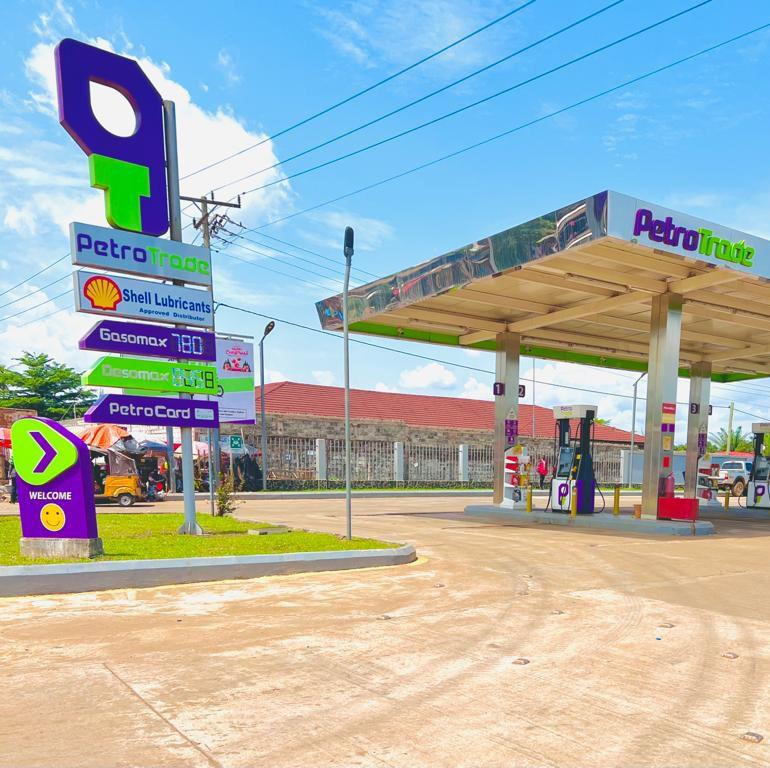
We understand that reliable, efficient fuel and lubricant solutions are essential to keep your business running smoothly. That’s why we are committed to providing you with the best products and services possible. Our petroleum products are formulated to deliver maximum performance and protection to your engines, ensuring that they run smoothly and efficiently.
At Petro Trade, we take pride in our commitment to excellence and customer satisfaction. We work closely with our customers to understand their needs and provide tailored solutions to meet those needs. Our team of experienced professionals are dedicated to providing you with the highest level of customer service.
We offer flexible and reliable supply options to ensure that you have access to the petroleum products you need when you need them. Our sales team is always available to help you with any questions or concerns you may have about our products or services.
Whether you need regular fuel deliveries, to fill up at our gas stations, procure lubricants for your equipment, or secure any other petroleum products, Petro Trade has you covered. We are your trusted partner for all your petroleum product needs.
Contact us today to learn more about our products and services and how we can help your business succeed.
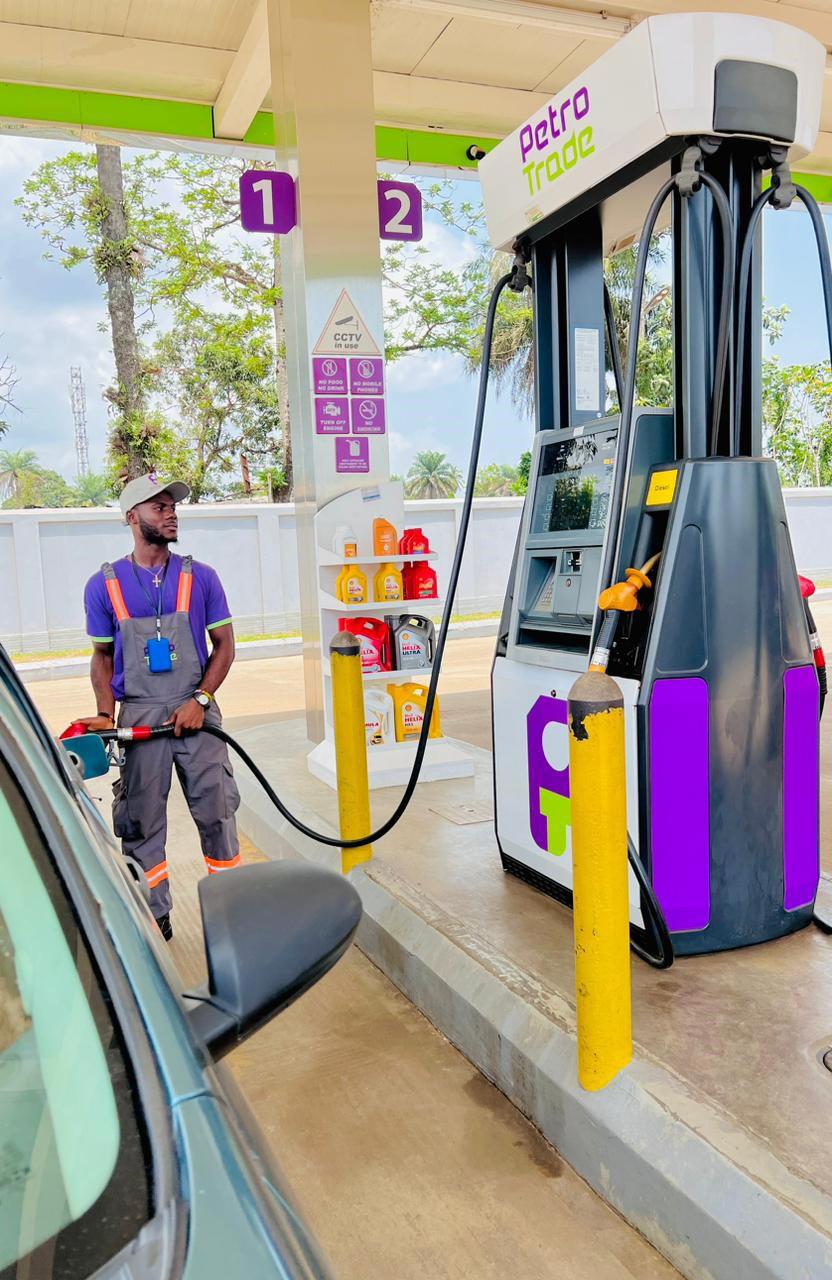
However, LEC later began to handle the electricity supply of rural areas outside Monrovia through 10 small, isolated power systems with a total installed capacity of 13 megawatts (MW).
Cataclysmically, the remainder of Liberia’s electricity infrastructure was almost entirely destroyed during the time of civil unrest across the nation. However, despite these tragic occurrences, valiant efforts have been underway since 2006 to restore the Monrovia grid, and expand both the mini-grid and stand-alone power systems.
The Liberia Electricity System Enhancement Project (LESEP) is currently being funded collectively by the World Bank in collaboration with other international donors,
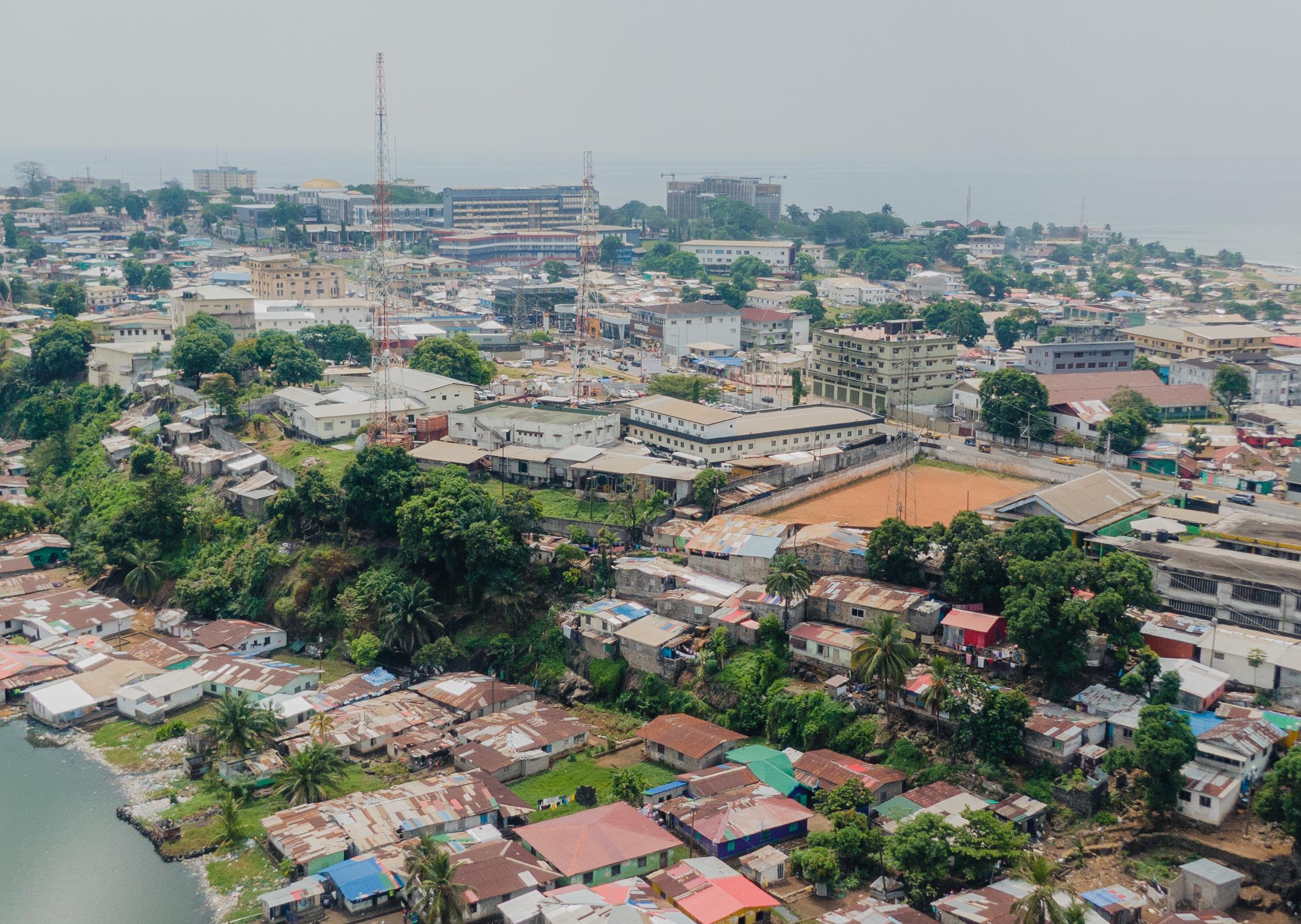
including the Government of Norway (GON), the Japanese International Cooperation Agency (JICA), the United States Agency for International Development (USAID), and the European Union (EU).
LESEP, an International Development Association (IDA), is also being supplemented by funding provided by the Global Partnership for Output-Based Aid (GPOBA) and the Africa Renewable Energy Access (AFREA) Trust Fund.
Given the critical nature of the Liberian power sector, an intricately prepared and thoroughly researched request for both the extension and expansion of LESEP was presented to the bank, which then began the process of directly supporting rehabilitation efforts to improve and increase access to electricity through the financing of distribution
services and enhancement of supply generation options, both on and off-grid.
However, the condition of the power sector remains highly volatile, alongside the continued absence of electricity, which possesses the propensity to completely derail the fragile security situation in the country.
This, parallel to other equally compelling and urgent reasons, including the desperate need to invest in the electricity sector as a key driver for the economic transformation of the country and a major component of Liberia’s Agenda for Transformation, gave rise to LESEP Additional Financing (LESEP-AF) and further extended financing under the Liberia Accelerated Electricity Expansion Project (LACEEP) and LACEEP Additional Financing (LACEEP-AF).

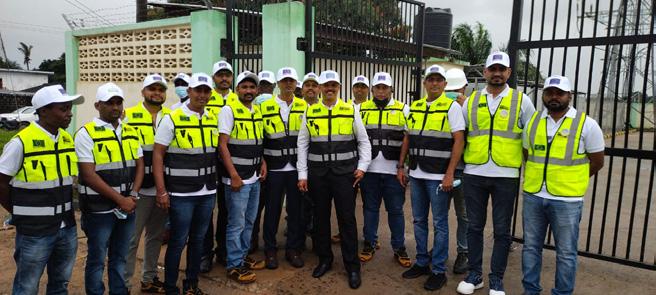


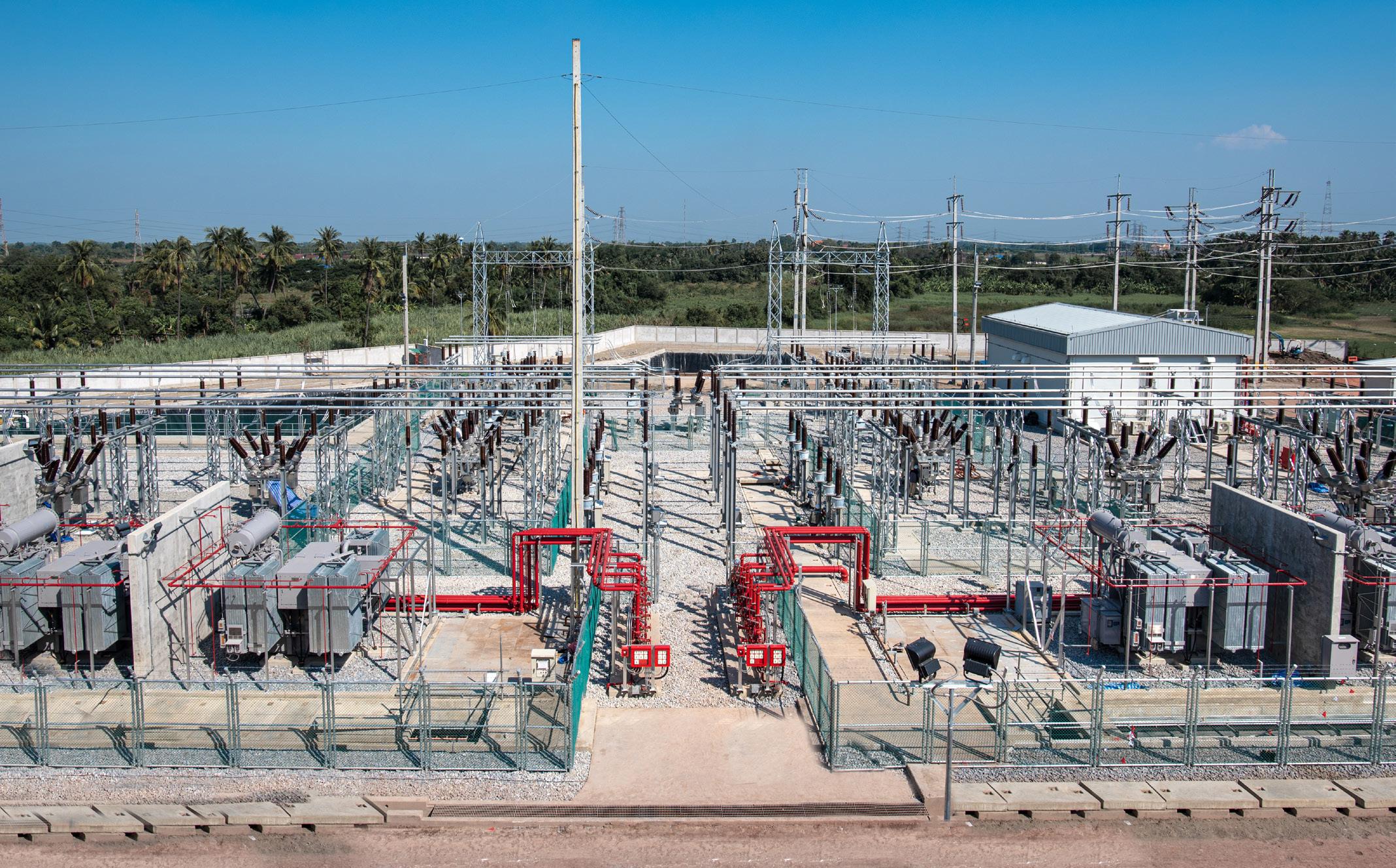
A crucial piece of the puzzle in rebuilding Liberia’s infrastructure is the Mount Coffee Hydropower Plant, which is located approximately 27 kilometres (km) northeast of Monrovia, in Montserrado County.
The plant was originally designed as a run-of-river scheme, consisting of a dam and 10-bay spillway structure with radial gates. Inflows to the reservoir are then diverted through a channel to the powerhouse situated at the bend in the river.
This arrangement, in combination with an excavated tailrace channel, allows the development of the maximum hydraulic head at the Mount Coffee site. The intake
structure includes provision for six units, although the powerhouse was only constructed for four, and aside from partial excavation for the extension of the powerhouse substructure, none of the other civil works for these units were ever completed upon original commission.
Now that there is peace across the nation, the original four units are being rehabilitated by LEC using a Francis turbine. For this project, the prestigious contract for the generating equipment which includes turbines, generators, and associated electro-mechanical equipment for the powerhouse, has been awarded to Voith Hydro. These modernised turbine units will be reconnected to the grid with a capacity of 22MW each, and will generate a far greater
output than the previous machines were capable of, with the power output capacity per turbine climbing by about one third.

Since the Mount Coffee facility will be the largest generating plant in Liberia for years to come, it will be heavily depended upon to maintain high reliability and to provide frequency and load control for LEC’s overall power system. It will also be required to operate as part of the Côte d’Ivoire-Liberia-Sierra Leone-Guinea (CSLG) Power Network, which will be used for the interchange of power with neighbouring countries.
With the vast benefits that this facility and ambitious initiative is creating, LEC looks primed to position itself front and centre of the gradual rebuild of Liberia.








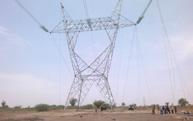






Africa Outlook, APAC Outlook, EME Outlook, North America Outlook and Mining Outlook are digital publications aimed at boardroom and hands-on decision-makers, reaching an audience of more than 800,000 people around the world; spanning the full range of industrial sectors.


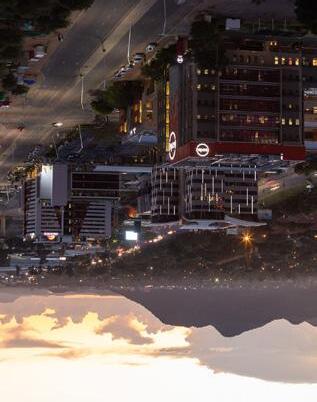
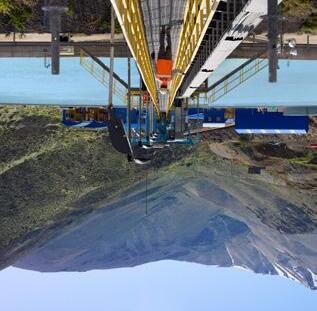



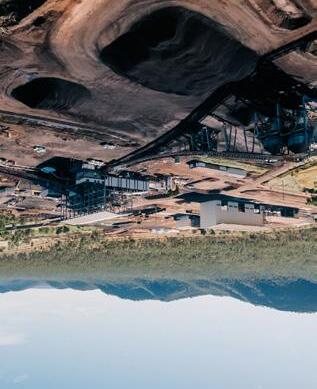
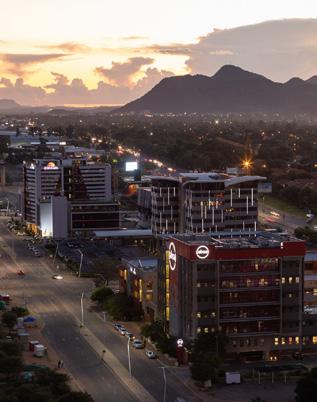

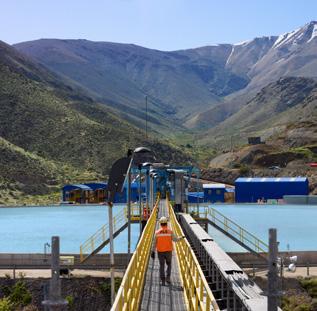





With original and exclusive content compiled by our experienced editorial team, we look to promote the latest in engaging news, industry trends and success stories from across the globe.


Your company can join the leading industry heavyweights enjoying the free exposure we provide across our platforms with a free marketing brochure, extensive social media saturation, enhanced B2B networking opportunities, and a readymade forum to attract new investment and to help you grow your business. Visit www.outlookpublishing.com/get-involved for details on how your company can feature for free in one of our upcoming editions.
www.outlookpublishing.com/get-involved








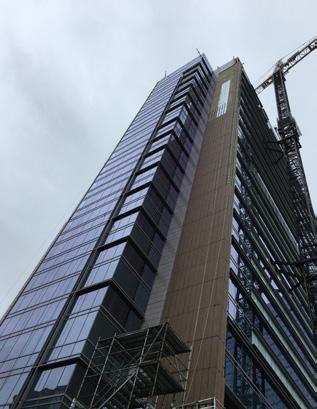


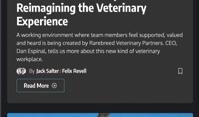








Adding to its growing family of regional titles – APAC Outlook, Africa Outlook, EME Outlook, North America Outlook, and its sister sector title, Mining Outlook – Outlook











Publishing is proud to announce the birth of a dedicated platform for the healthcare sector. As organisations worldwide must navigate a new healthcare landscape defined by technological innovation in the wake of the COVID-19 pandemic, now is the time to showcase the strides being taken in this critical sector.


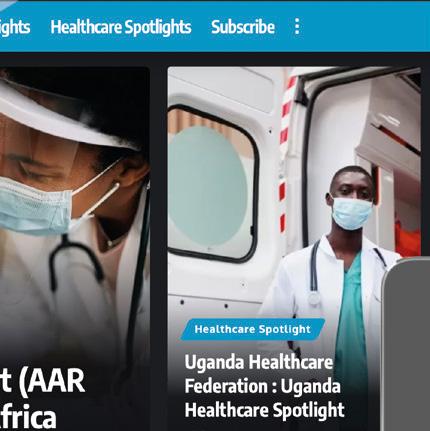






A multi-channel brand, Healthcare Outlook will bring you the positive developments driven by organisations across the healthcare industry through its various platforms. Discover exclusive content distributed through its website, online magazine, social media channels, and dispatches delivered straight to your inbox with a bi-weekly newsletter.



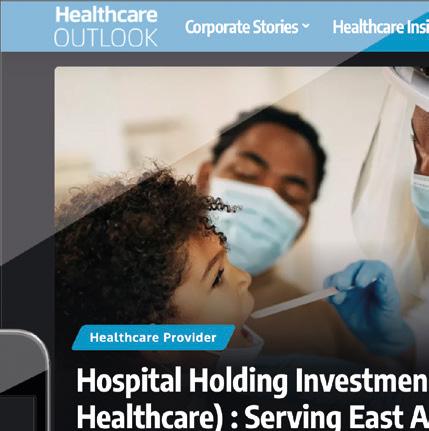
Through this compelling new venture, we intend to foreground the movers and shakers of the industry. To participate as a featured company and join us in this exciting endeavour, contact one of our Project Managers today.
www.healthcare-outlook.com



















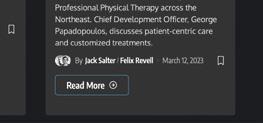

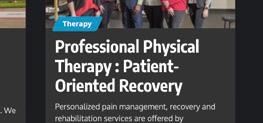

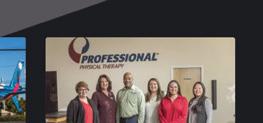




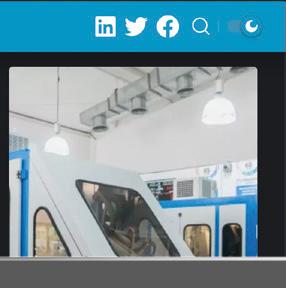


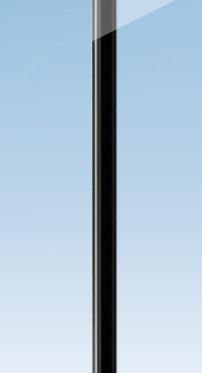

Bhavna Patel, CEO of the famed Groote Schuur Hospital, advocates strengthening the healthcare system and developing a renewed strategy to meet the needs of patients
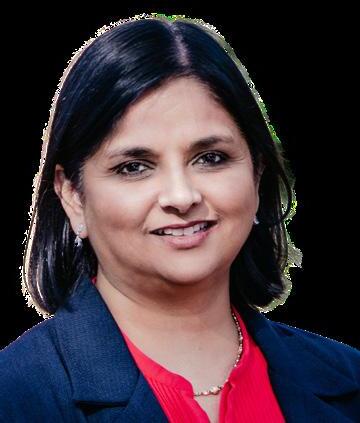
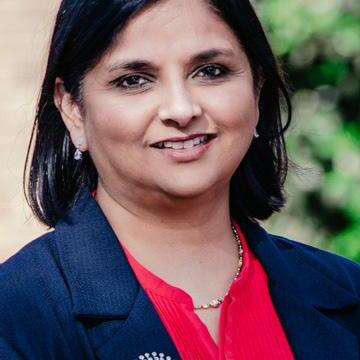
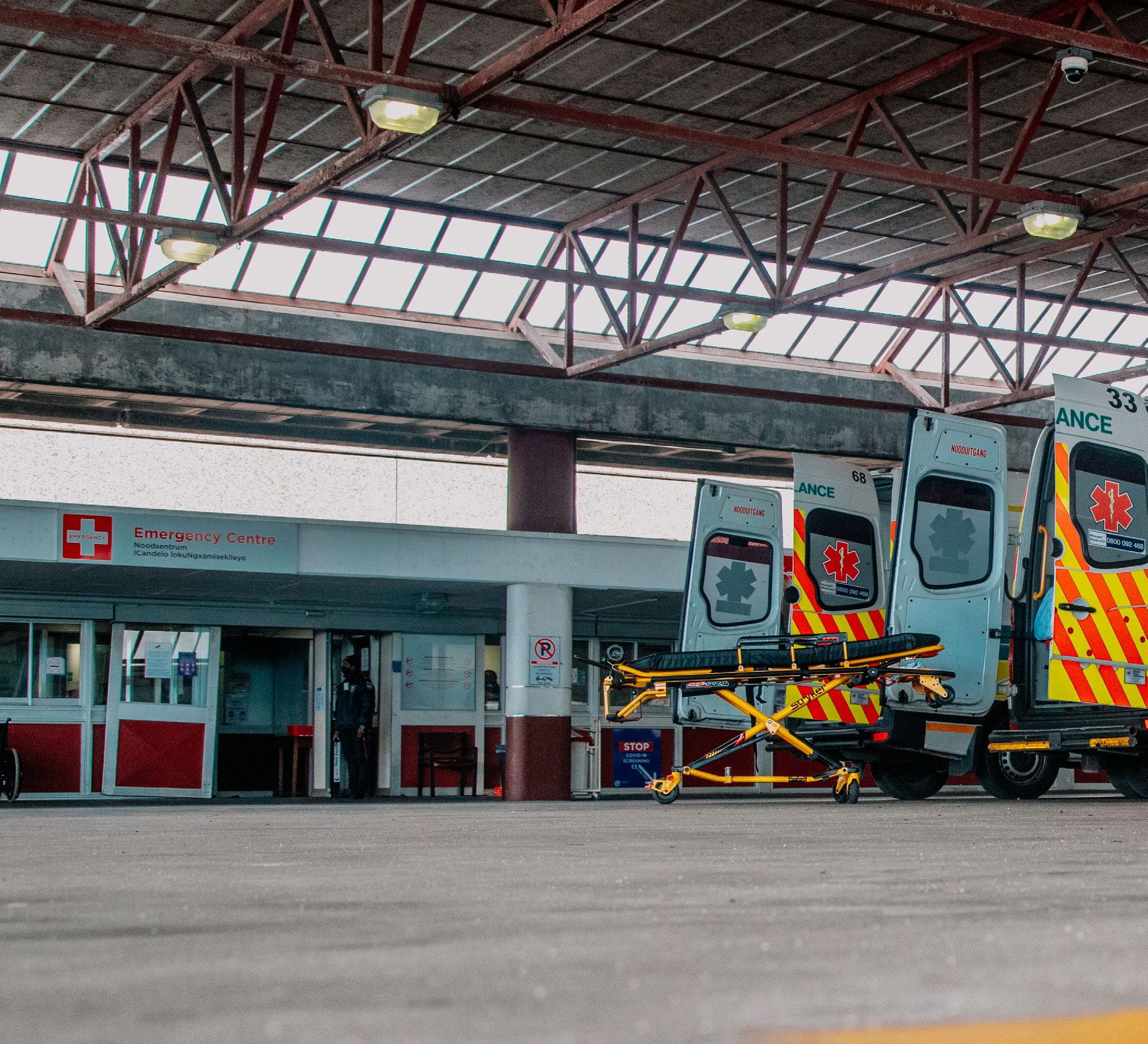 Writer: Jack Salter | Project Manager: Thomas Arnold
Writer: Jack Salter | Project Manager: Thomas Arnold
In December 1967, local South African cardiac surgeon Christiaan Barnard became an international superstar virtually overnight when he performed the world’s first successful human heart transplant.
It was a daring and ground-breaking operation in which Barnard transplanted the heart of a fatally injured 25-year-old, Denise Darvall, into Lewis Washkansky, 53, who was suffering from heart complications brought about primarily by his diabetes.
A landmark achievement that received immense public attention worldwide and remains the most publicised event in medical history, it was carried out by Barnard in the Charles Saint Theatre at Groote Schuur Hospital (GSH).
“GSH boasts a proud 85-year history of service
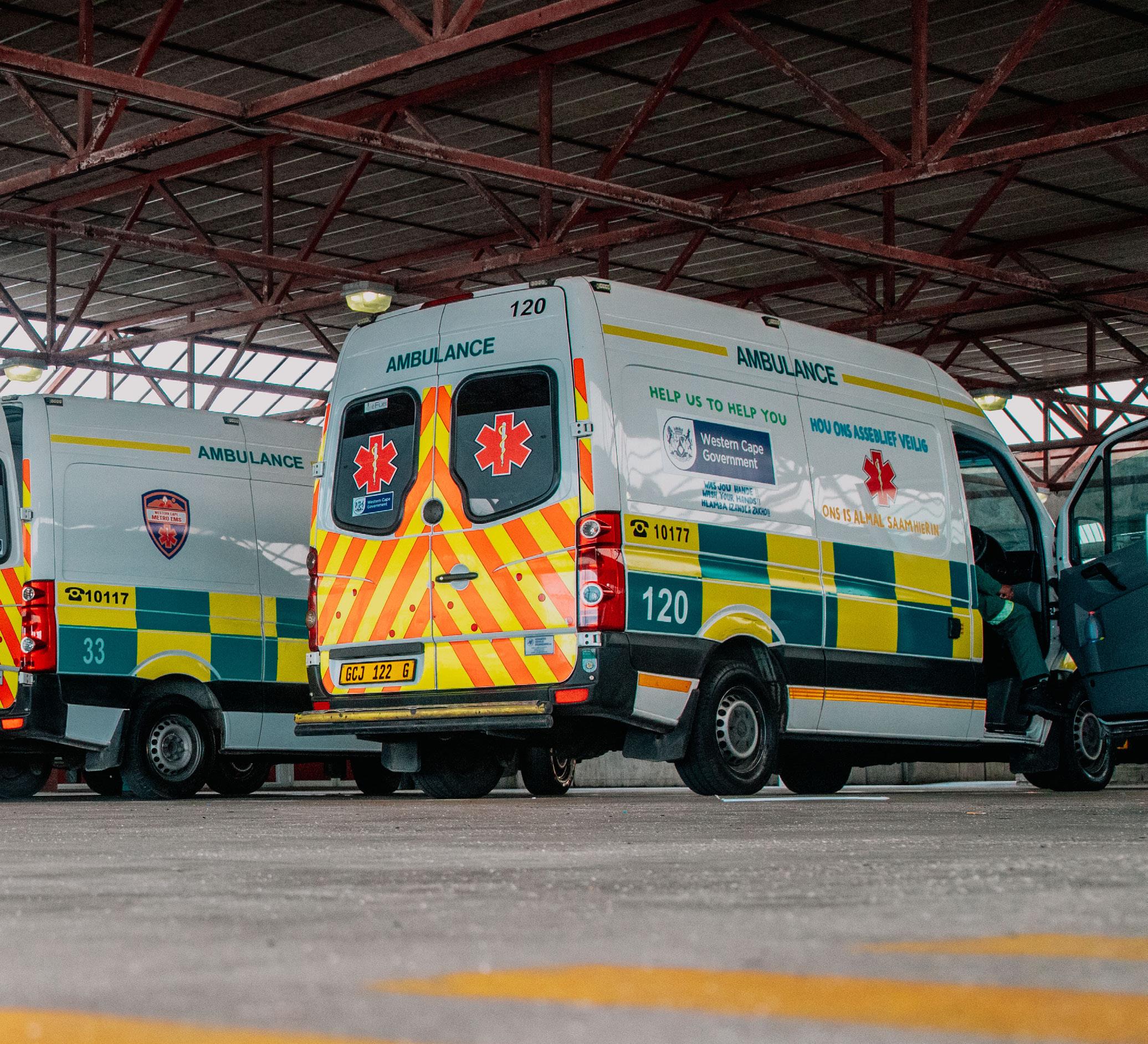
excellence, gaining global fame following the first successful human heart transplant by Christiaan Barnard,” begins Bhavna Patel, CEO of GSH since 2013.
Today, tens of thousands of grateful individuals have received this life-saving surgery; moreover, the majority of heart transplant patients have gone on to enjoy life for many years after the operation, including its subsequent medical treatment.
“The hospital continues to maintain such innovation, with many firsts both within South Africa (SA) and internationally.”
GSH is a tertiary and quaternary health service facility opened on 31st January 1938, whose mission is to provide outstanding public healthcare to the population of SA’s Western Cape province and beyond.
Makana Healthcare, commonly known as Makana, was founded in 1996 by CEO, Arthur Davids. First established as a technology company, Makana focuses on government inventory systems, payment systems and management data analysis, with the healthcare division later being added to the group. The infusion of technology and healthcare was a natural and appropriate synergy as it presented a platform to introduce the company’s experience, innovation, ideas, as well as leadership expertise and knowledge of client requirements.
Makana is a proudly Level-1 Broad-Based Black Economic Empowerment (B-BBEE) company. It is also committed to the supply and sale of high-quality medical equipment, consumables and strategic medical consulting services. Associated with Makana Technologies and Solutions, the
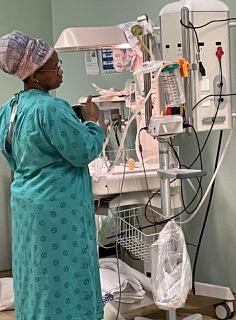
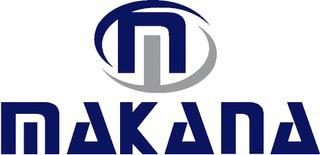
company subscribes to strong principles of quality, excellence and internationally recognised practices. To this end, it is, and has always been, Makana’s widely-held and succinct axiom that ‘going the extra mile’ and understanding client needs is the blueprint for success.

Makana is excited and optimistic about the future as new and groundbreaking technology is rapidly making great strides in the healthcare sector, contributing to more effective and efficient models in healthcare.

The importance of a hospital’s information analysis cannot be overlooked. It lies at the very core of any hospital’s efficient operation, and it speaks to spend analysis, procurement, patient information, and more. Therefore, in the future, information will become an asset on the company balance sheet, as it provides you with answers to questions you didn’t know you
had and contributes significantly to management decisions!
Current world events have amplified the disparity and critical importance of healthcare, professional medical advice, quality products and services. Almost everybody has formed their own definition of quality. Because quality means different things to different people, the topic has become confusing – even in business - and these multiple definitions often make quality difficult to achieve. However, quality, simply stated, is conforming to requirements.
Davids details that, “I am always thrilled to see the passion for innovation being embraced. It’s the hallmark of great leadership and allows people to contribute to new ideas.
“Whilst innovation deserves lauding, its true meaning lies not only in
the implementation thereof, but in assigning a cost-saving strategy to the implementation. An example includes a recent application which saw a client not only investing in a new product, but also saving an excess of ZAR720,000 per annum (taking into account repairs, price of non-conformance, quality, etc). Consequently, innovations in measurement and cost-saving strategy is the vehicle used to evaluate and plan management action.”
Whilst taking the initiative can sometimes lead to unwanted and misaligned outcomes, demonstrating initiative with sufficient knowledge of client needs is of critical importance, because it demonstrates a certain proactiveness. Understanding that there’s much to learn about the process, can at times be more important than the outcome itself. Thus, at Makana, there have been many situations where the team has
demonstrated initiative, and saved their clients valuable time and money.
Makana attaches great value to focus, as focus is believed to be at the core of excellence. The company has an ethos that when your product offering embraces excellence, then you’ve learnt how to focus. Makana subsequently focuses on the needs of its clients, as it shares their vision. With quality, innovation and excellence being central qualities and intrinsic to the DNA of Makana, it strives to always ensure the best. The company is committed to making a positive contribution to the healthcare discipline, economics and ecosystem – understanding the challenges faced. Such dedications provide the company with an environment to uphold high standards and to pursue an attitude of a continuous journey to discovery. Perfection, although
impossible, at best serves as an incubator of excellence and illustrates Makana’s determination to always deliver its sincerest intentions.
“Where excellence abounds, then effective leadership gives it the fortitude to do so,” says Davids. Humanity is the company’s currency, as it is perceived as the universal canvas of life to paint and co-author a chapter and lasting image to serve and lead. Makana’s mission is to convey its sincerest wishes to its suppliers, manufacturers, partners and clients.
It is comments and feedback like this that underscore Makana’s values.
From: Hanover Park Community Hospital:
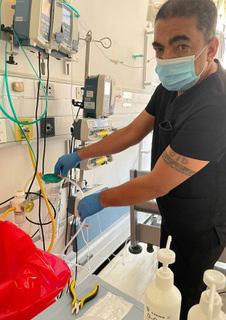
“Good day Arthur, I would like to commend you and your company, Makana Healthcare on assisting us at Hanover Park Community Health Centre (CHC) in our time of need. I appreciate the fact that you had gone the extra mile to access what we had needed on a weekend when everyone is closed. Even though your company was closed, you sourced what we needed and brought it to us personally, on a Sunday morning. It is good to know that there are people like yourself who would go the extra mile for our community and primary healthcare settings. Thanking you once again”

The healthcare division is led by CEO, Arthur Davids, with Dr Junaid Akoojee as the Medical Director. Makana enjoys award-winning and international accreditation in
Makana enjoys award-winning and international accreditation in leadership, quality and business excellence. The company was awarded the Gold and Platinum award in New York and Paris respectively. The International Quality
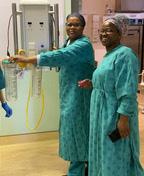
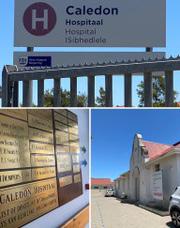
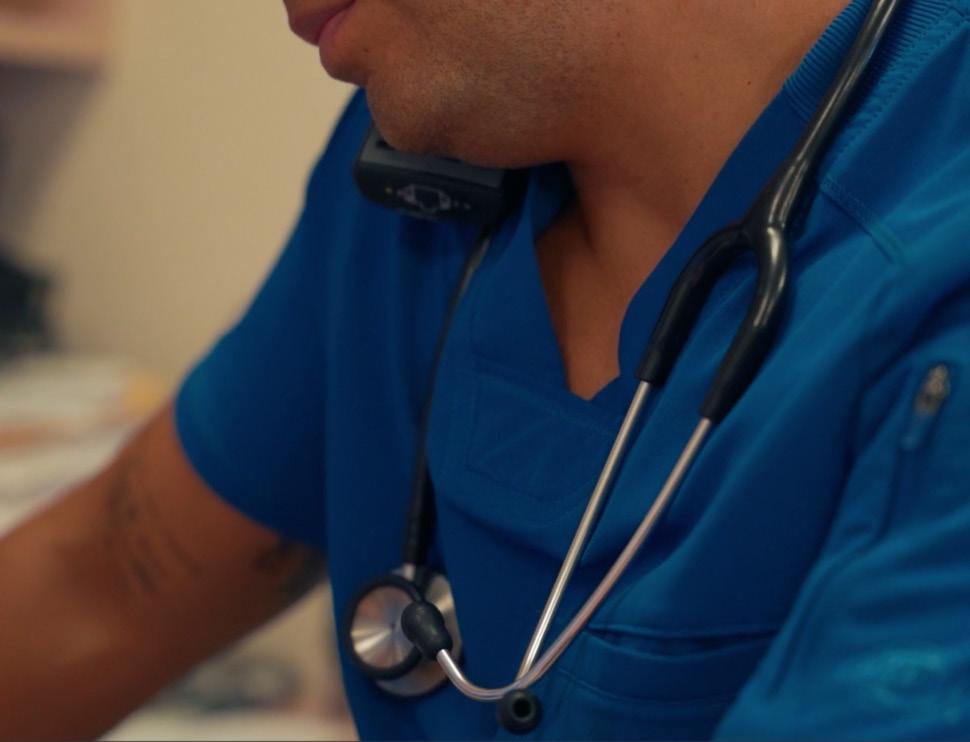
Summit Award is recognised as one of the most prestigious honours in business excellence. The company’s leadership also featured in South Africa’s top 47 leaders in previous years, showcasing the country’s leadership expertise – supported by the University of Cape Town’s (UCT) Graduate School of Business, The Afrikaanse Handelsinstituut, Businesswoman’s Association of S.A. (BWSA) and The Institute of Directors (IoD).
Davids further states: “We need to ensure, protect and grow the leadership DNA in our country. It’s important for us to continuously evolve the critical reservoir of leaders in order for us to pass on the baton. If we can sustain that growth of new leaders, then I believe we have fulfilled an important discipline of leadership. Every leader must have a vision, be able to articulate that vision
and then lead others to meet it. “Reach out to us. We will be glad to discuss your needs and who knows, you might even get inspired!”
Davids describes himself more of a hybrid between a visionary and situational leader. He adds, “It’s vital
to keep your vision in focus, bearing in mind that every situation, institution and client is different. I’m not a ‘celebrity’ leader concerned with ‘front page’ headlines or glitz and glamour. I prefer to lead from the front, getting my hands ‘dirty’ – old-fashioned hard work! My favourite position is in the trenches with my team. I’ve unashamedly loaded trailers, boxes and trucks. You cannot lead anybody further than you’ve gone yourself. More importantly, clients appreciate the fact that you are personally involved and lead from the front. One day I’m negotiating, the next day I’m in the trenches and next I take up my position in the boardroom. At
the end I know I can autograph work with excellence. Sadly, you have leaders that only wait for fame. I don’t promise, waffle or talk, I do!”
Dr. Akoojee, the Chief Medical Officer, is a leading Medical and Healthcare Professional with experience in primary healthcare, emergency procedures and protocols, managing healthcare centres, community health programmes, as well as promoting and improving health outcomes with the use of technology. Previously, Dr Akoojee has also worked with many community-based diabetic awareness programmes with leading pharmaceutical companies.
Makana’s views and role in the healthcare ecosystem:
Makana carefully evaluates its service experience and how to sell to its clients effectively – keeping the patient central. Preferring to see its offering as quality and affordable, rather than based on transactional value and the credit limit of its clients, Makana understands it is about achieving the best outcomes at the lowest costs. A starting point for this would be a shift from over-aggressive volume and profitability of services provided. ‘Profit greed’ ultimately has an adverse effect on your professional reputation – often to the detriment of the patient and healthcare budgetary constraints.
Hence why Makana believes that if it can contribute to improved patient outcomes and add valuedriven products, then it can sustain and grow market share. Similarly, if it can also improve the efficiency of providing excellent service and products, it can enter any contracting discussion from a position of strength. The providers adding the most value will be the most competitive.

makanahealthcare.co.za
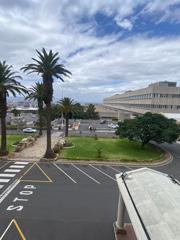
Kahlil Gibran in his poem titled “The river cannot go back”, describes the arduous flow of a river. Against the backdrop of this striking poem, the ‘Groote Schuur river’ started its path 85 years ago. Like the river, the hospital cannot flow back but only forge ahead, despite various fears and anxieties - even during the recent COVID-19 pandemic.
The hospital maintained its course – thanks to the resilient leadership of Dr Patel, her executive team, medical managers and staff. Walking the aisles of the hospital and meeting the various leaders makes you realise that the institution is an incubator of excellence and as a leading public hospital on the continent, it is a leading epicentre of innovation with many worldwide-and-continent first procedures. “I want to pass on warm and sincere congratulations to Dr Patel and her team for their remarkable achievements.”
Arthur Davids (CEO)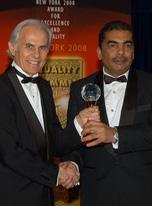
It also promotes excellence in teaching and research, as the primary teaching platform for both undergraduate and postgraduate students at the University of Cape Town (UCT), ranked according to several internationally compiled and authoritative indexes as the best university on the African continent and amongst the best 200 universities across the world.
Located in the Observatory, just a few minutes away from the main UCT campus, GSH has a symbiotic relationship with the university, where Barnard himself qualified in medicine in 1946 before establishing a successful open-heart surgery programme at the hospital, and lays claim to international renown beyond the historic feat he achieved in 1967.
This is to say that GSH is an internationally celebrated research institution, highly regarded for its trauma unit, anaesthesiology and internal medicine departments. It also draws many visiting medical students, residents and specialists every year, who come to the hospital to gain further experience in the various fields of endeavour in which it engages.
GSH and UCT are two highly prominent buildings in Cape Town, which is not only home to the friendly, fun-loving and laid-back people that inhabit it, but also some of the
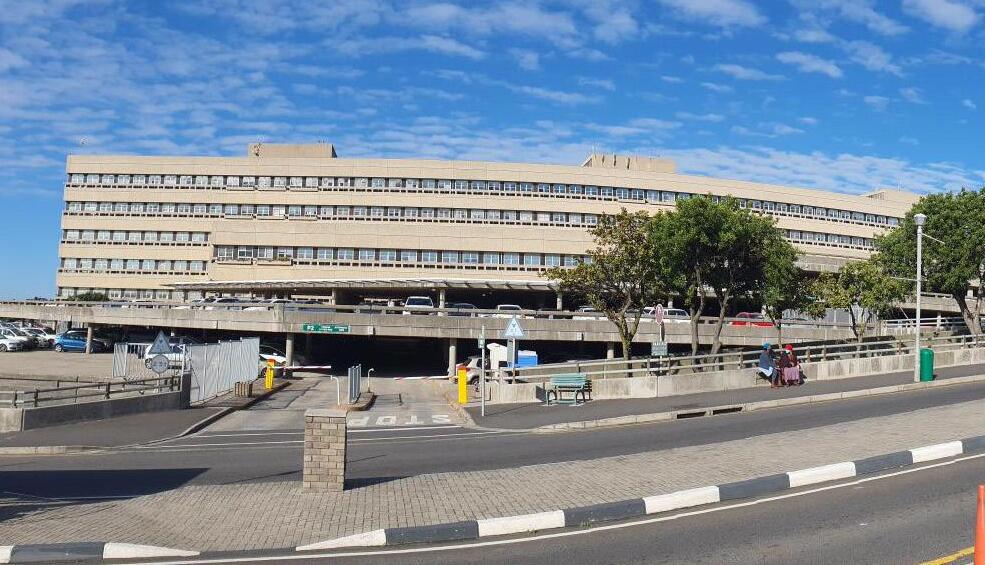
Barnard was born to a Dutch Reformed Church minister, and grew up in the Cape province of the Union of South Africa, as SA was then known.
At a young age Barnard lost one of his four brothers to heart disease, which could well have contributed to his choice to study medicine at UCT.
The famous surgeon obtained an MBChB in 1945 and completed his internship and residency at GSH. After his studies, he worked as a GP in the small, rural town of Ceres before returning to Cape Town in 1951. Barnard completed both a master’s degree and a doctorate in medicine, and by 1956 had proved himself enough to earn a two-year scholarship to study cardiothoracic surgery at the University of Minnesota.
Upon his return to SA, the burgeoning superstar was appointed the cardiothoracic surgeon at GSH, as well as becoming a full-time lecturer and the Director of Surgical Research at UCT. Barnard proved that South African skill and talent is among the best in the world, and that the country has the resources to be a world leader in the field of medicine.
world’s most beautiful scenery.
The hospital itself proudly sits on the picturesque slopes of Devil’s Peak at the foot of Table Mountain, an eminent landmark overlooking SA’s most famous city.

Groote Schuur, Dutch for “great barn”, is named after the settler farm on which the hospital and its neo-classically styled buildings now stand, against the backdrop of Cape Town’s iconic mountain range.
Clinical, teaching and research activities are provided on the estate of the hospital by GSH, who attends to around half a million outpatients every year.
There are also just over 1,000 inpatient beds to cope with around 75,000 admissions annually, with 25 theatres performing 23,000 operations on a yearly basis.
“We also have a Level 1 trauma centre attending to 1,200 major trauma cases per month, as well as a medical emergency centre treating 4,300 patients monthly,” adds Patel.
GSH’s patients are mainly from the Western Cape province of SA, but due to its specialised services, patients from other provinces are also referred to the hospital.
Many of these patients live in poor socio-economic conditions that fail to support the promotion of health, and are unable to afford healthcare, instead relying on the availability of public services.

Could you tell us a bit about Lithendo Projects (Lithendo), your team, services, history and evolution?
Lithendo is an electrical construction company established in 2011. Originally formed as Lithendo Consulting Pty Ltd, it evolved into Lithendo Projects in response to market demand. While the company started with only one employee in 2015 when fulltime operations began, it is now a substantial contributor towards the reduction of unemployment within the Western Cape and South Africa. Today, Lithendo employs 22 highly skilled and experienced employees with a passion for delivering unmatched service.
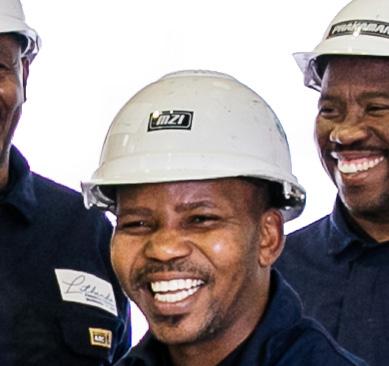
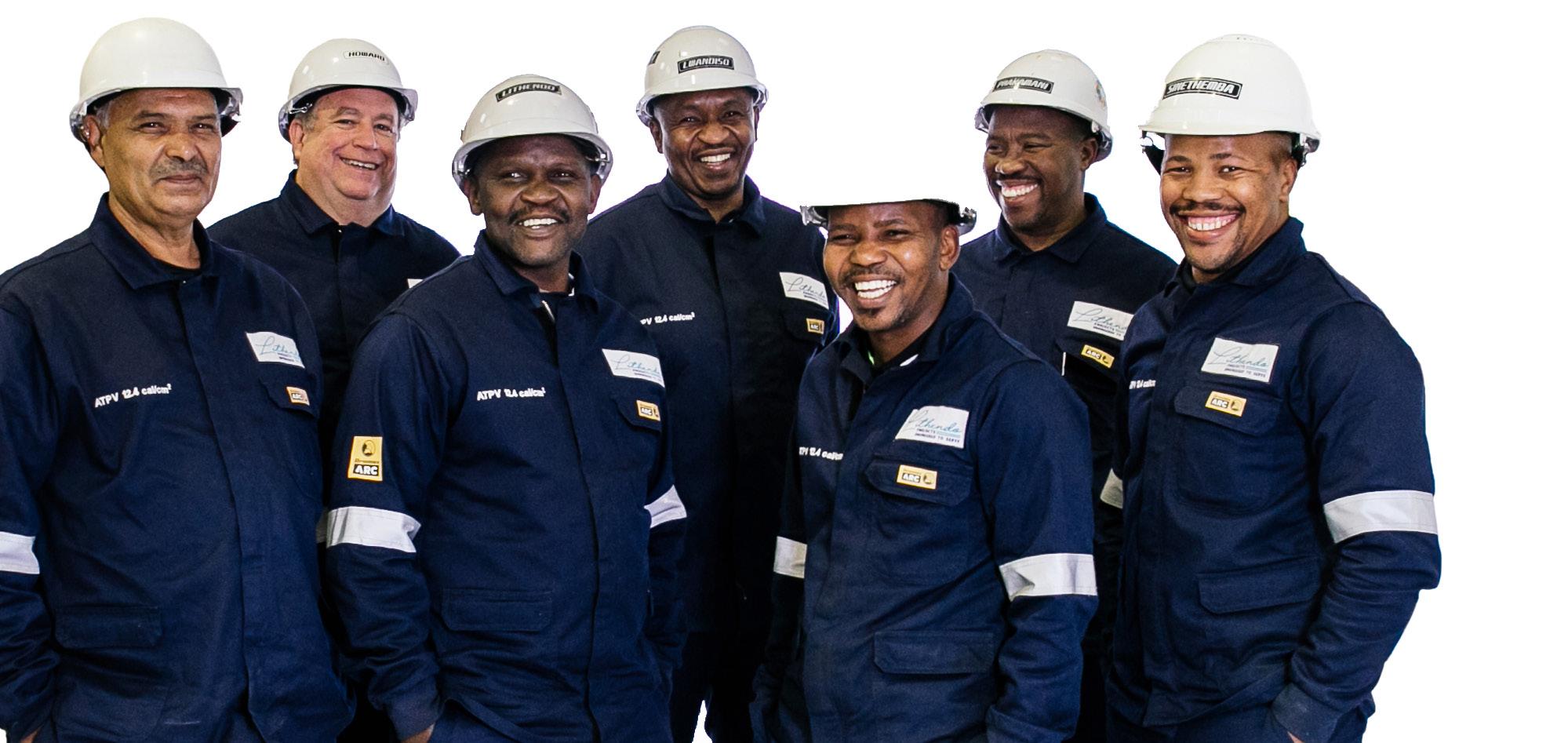
We support our customers by providing them with experienced technical skills to manage risks associated with various electrical equipment within

their infrastructure portfolio. Lithendo specialises mainly in medium-voltage systems, installation, and maintenance. We have experience and expertise in transformer maintenance and switchgear alongside medium-voltage cable installations and maintenance. Lithendo possesses skills in lowvoltage systems, such as installation, maintenance, and certification. We are experts in standby power systems which include expertise in Uninterruptible Power Systems (UPS), and Standby Generators. We also have expertise in hazardous installations maintenance and certification.
When did Lithendo’s journey with Groote Schuur Hospital begin and how has it developed?
Our journey with Groote Schuur Hospital began in June 2019 when we responded
to a medium-voltage cable failure. The team at Lithendo executed the work with diligence, and when we were ready to put the power through the cable, we went beyond our scope of service and inspected the switchgear that was to be used for switching and tested the transformer that was downstream of the damaged cable. We found faults with both pieces of equipment. The switchgear had last been serviced in 2006, hence, we advised the client that it was unsafe to operate the switch at that present time.
Similarly, because the transformer had been off for a long time due to the same cable fault when tested, it showed high levels of moisture content, which meant it was in an unsafe condition and needed immediate attention. After advising the customer of these findings and the implications of not addressing them, the
piece of advice, and going the extra mile appealed to the customer. Relations have therefore grown since, and Lithendo has continued to provide reliable service to Groote Schuur Hospital.
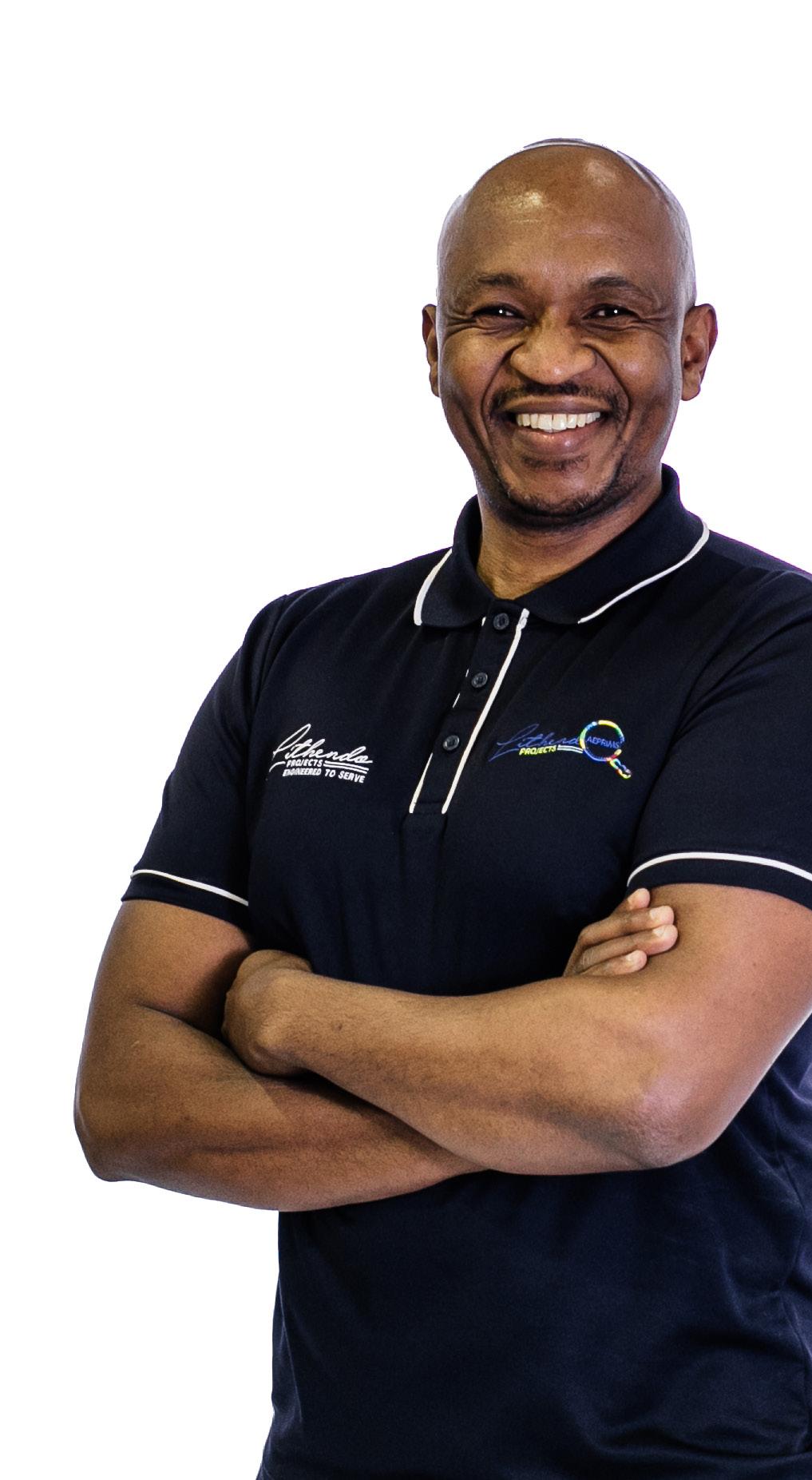
Could you explain how the company works with and benefits Groote Schuur Hospital and vice versa?

Lithendo offers the customer a dependable and reliable service backed by sound technical knowledge and experience in healthcare facilities and electrical infrastructure. In return, this is translated to consistent service to the public, exactly what is needed by the communities the hospital supports. One of our main value-adds is the ability to be dependable in every respect, coupled with an unmatched operational discipline which appeals to every individual we support at the hospital.
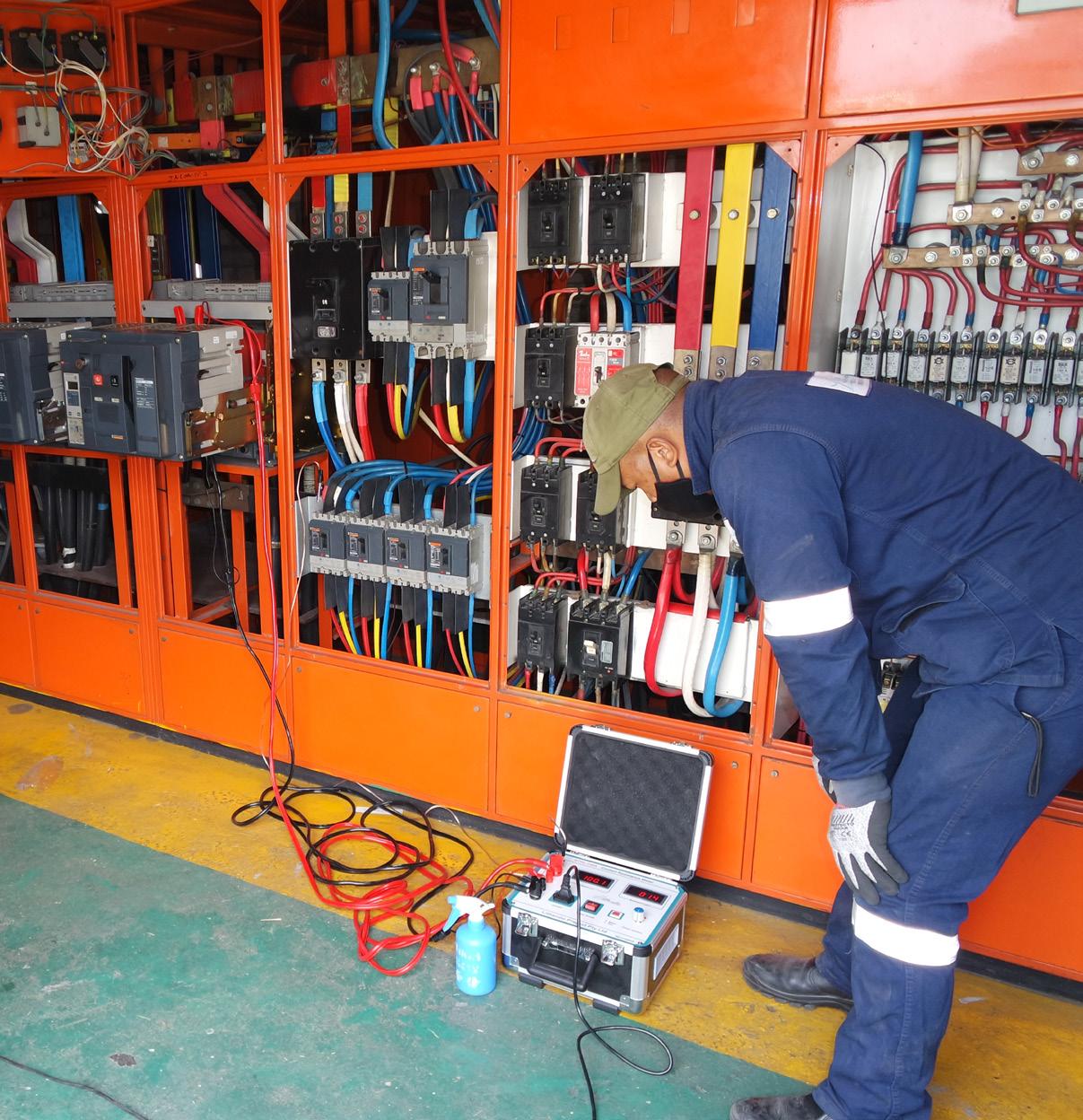
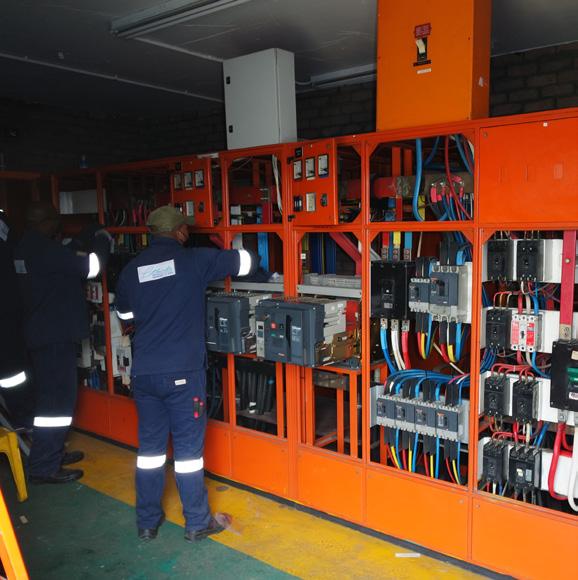
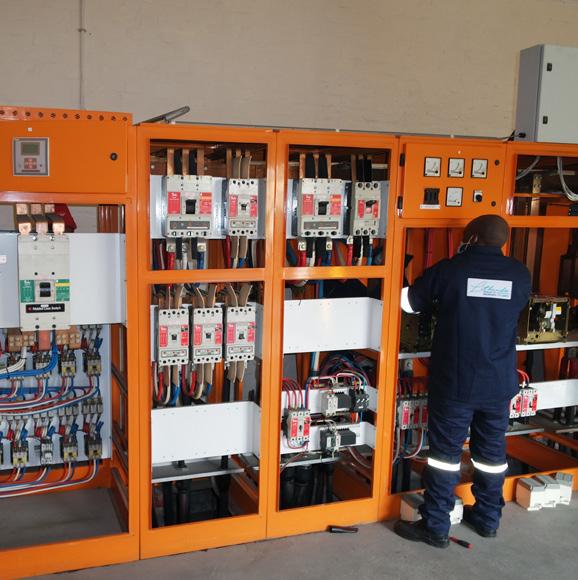

What are the company’s key priorities for the coming year - do you have any projects or plans in the pipeline?

One important priority close to our hearts is the need to strengthen our operational
systems and align those to international standards in healthcare, engineering and safety management. Groote Schuur Hospital is a complex facility, and Lithendo meets new challenges daily in the form of equipment, technology or operational requirements. Responding effectively to these requires standardisation of internal processes and matching with peer-reviewed international standards in healthcare. Going forward, this objective remains at the forefront of our operations.
This is one of a number of external challenges in the South African health industry, starting with the inequity between private and public health services and facilities, which respectively serve 20 and 80 percent of the population but use 80 and 20 percent of the resources.
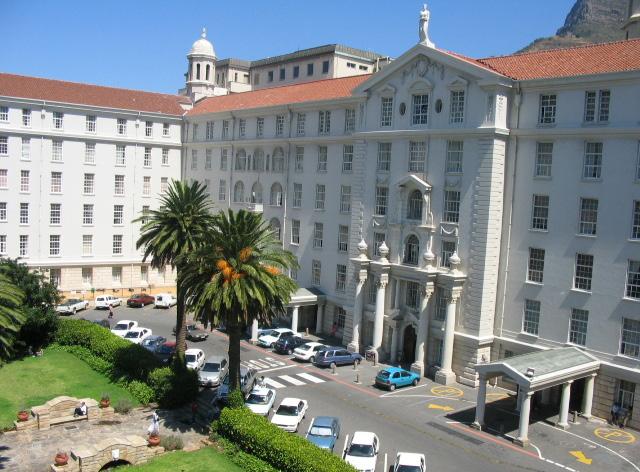
The COVID-19 pandemic and other environmental challenges have also left many South Africans without jobs and financial support, exacerbated by the ongoing cost of living crisis.
Internally, GSH is challenged by the increasing patient demands that the hospital is experiencing for its services, which have to be provided within reduced budgets by a small number of overworked staff.
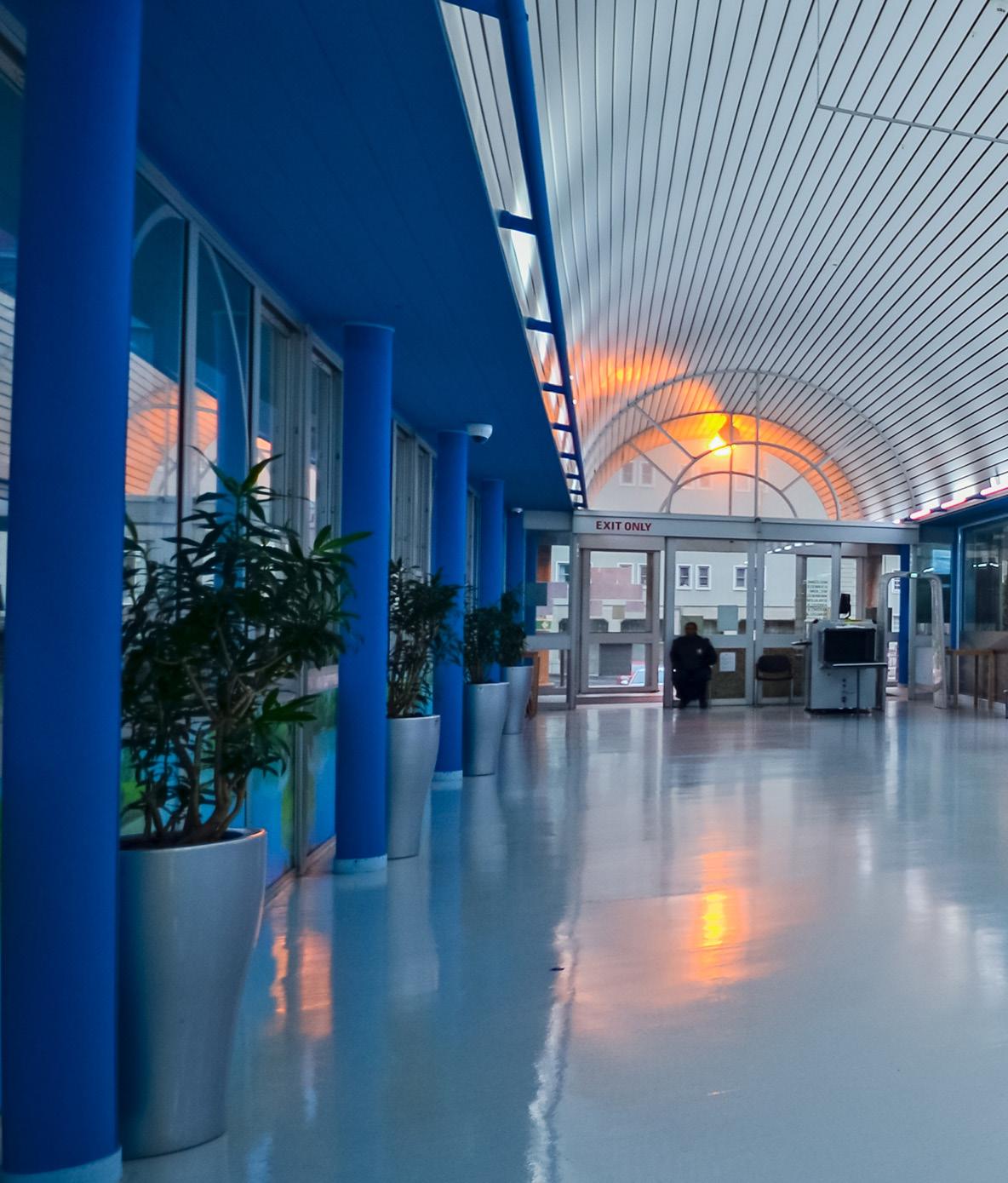
“The space at present is challenging internally, externally and societally, and requires a rethink for its future sustainability,” asserts Patel.
The effects of the COVID-19 pandemic significantly affected GSH with patient care curtailed to admit patients that tested positive for the virus, resulting in around 10,000 missed elective surgeries as well as many lost outpatient appointments and radiological investigations, among others.
This gave rise to an unparalleled healthcare system crisis not only in SA but throughout the world.
“Unfortunately, it is impossible to just pick up where we left off in March 2020,” Patel tells us.
“This period is challenging in that we are facing many patient pressures, and trying to plan in such a context becomes difficult.”
The many backlogs caused by the pandemic required a critical rethink and restructure of GSH’s health services, with an internal reorganisation of resources and a firmer relationship with its referral centres.
To be sustainable in the long term, a renewed strategy was therefore adopted by GSH to plan for resurging, recovering, and resetting its services.
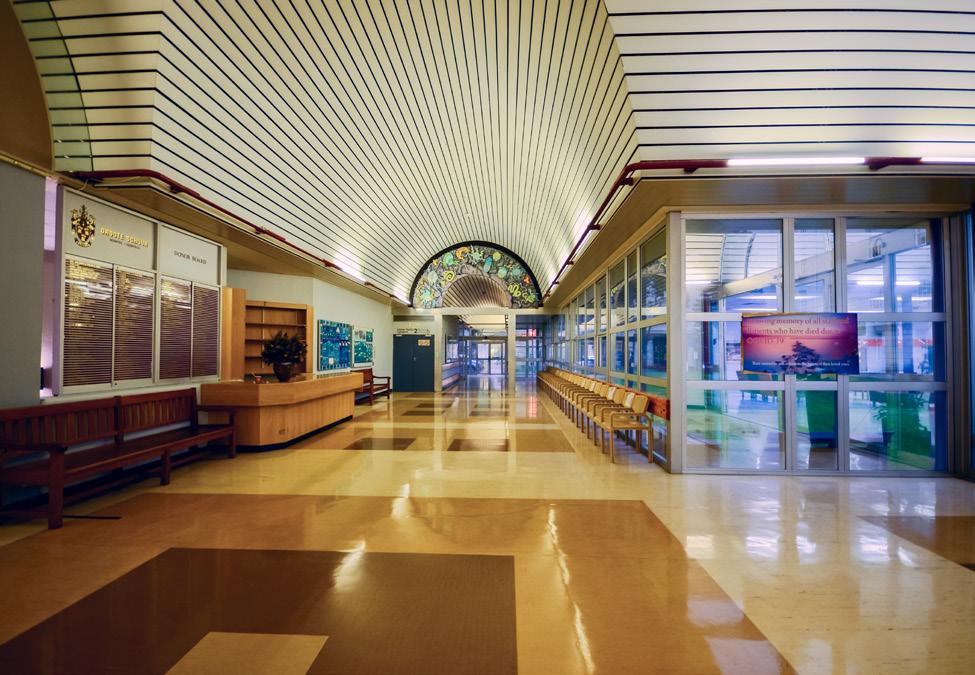
“We’ve got to be adaptable to things like COVID-19. The pandemic brought about an immediate need for change, and we have to be prepared and adaptive to such changes in the future, while at the same time trying to recover and stabilise our current services,” says Patel.
Planning for resurgence involved developing an implementation plan that was flexible to the change in the number of COVID-positive patients.
Recovery addressed some of the lost needs and reviewed how these could be prioritised, whilst resetting will require a rethink of the services and how to move forwards, as this is not just a hospital response but a health system response.
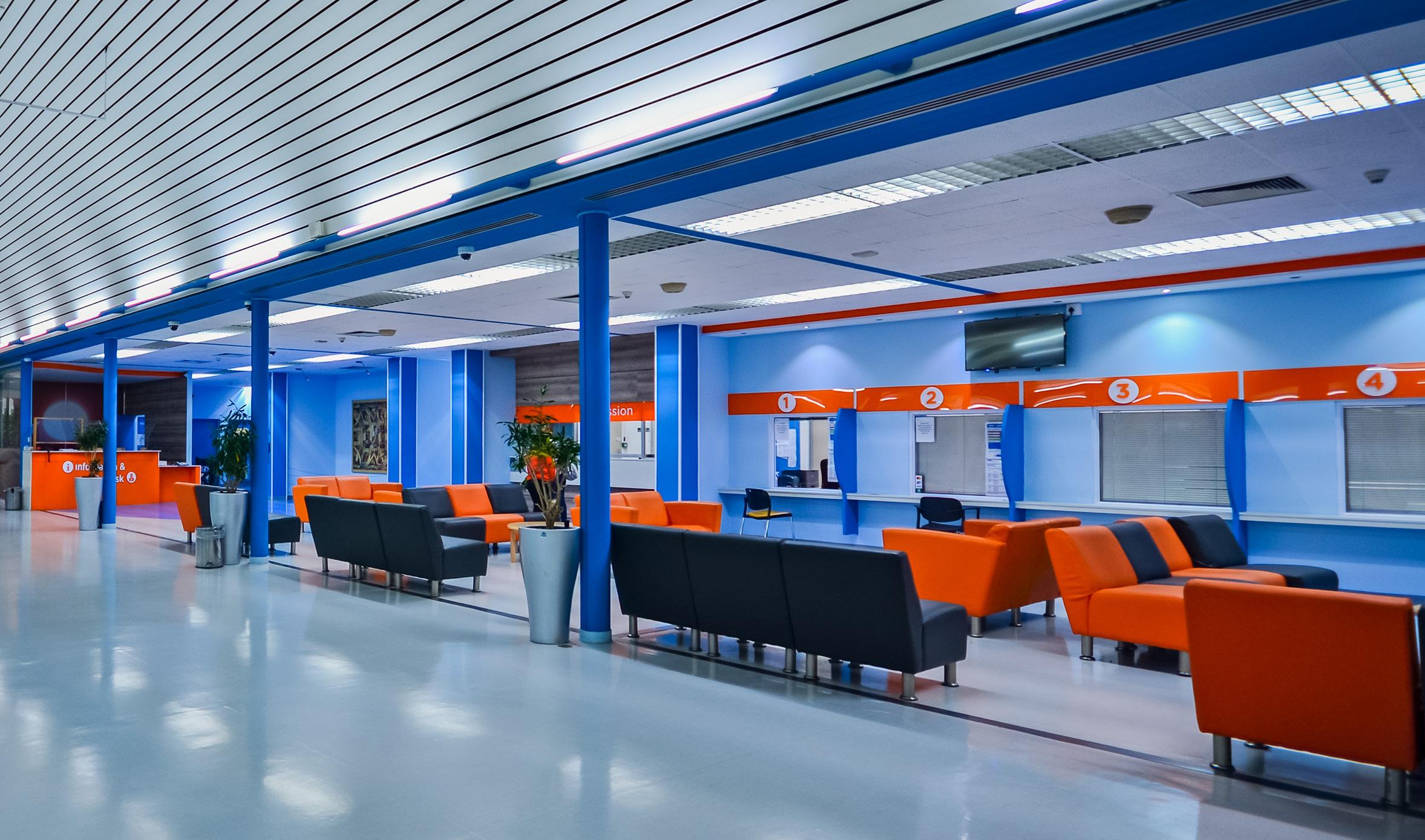
To this end, GSH has commissioned an additional two theatres along with 20 beds to create a Day Surgery facility and ease the backlog of cases.
“We raised funds to address some of the surgical cases, in addition to our normal theatre cases. Thus far, we have achieved our target of 1,500 cases over the past 10 months and will continue with the project over the next two years,” informs Patel.
“Over the next two to three years, we hope to operate on 3,000 more patients. After the project period, the facility will continue to function as a Day Surgery unit.”
One of the first fully compliant BEE Level 4 healthcare companies in South Africa, Akacia Medical and Healthcare group is part of a handful of true frontrunners when it comes to meaningful transformation.


Recognised as innovators, as a group we collectively work to diagnose, treat and monitor patients through our groundbreaking products, represented by our subsidiaries Akacia Medical, Clinisut, and MSQ Diagnostics.


We know that life without health is not easy. That’s why we’re invested in constantly improving the quality of our integrated solutions, to ensure we are meeting real healthcare needs with relevant products. Working together to transform people’s lives inspires us because at Akacia, we believe life matters.
As a group that’s recognised for innovation and excellence, it’s not surprising that the healthcare industry puts its trust in our products every day. With over 100 products in our stable, we are influencing and improving patient care and outcomes with our medical devices, surgical products, and diagnostic solutions. We are best known for our integrated solutions in general surgery, gynaecology, urology, respiratory, medical and surgical.



We develop and supply our customers with the latest in innovative medical technologies that protect patient safety and promote recovery. Our broad range of general medical products is segmented into our niche focus areas, including general medical, custom packs and trays, speciality products and equipment. From surgical gloves, suction devices, tubing, wound drains, to ICU breathing circuits, respiratory equipment, catheters, syringes, disposable textile, needles, and more – we have over 60 quality products available.
Our high quality absorbable and non-absorbable sutures are used in hospitals around the world and are manufactured using laserdrilled needles. This provides the best needle/suture combinations for easier passage through tissue, reducing tissue damage and ensuring a less traumatic patient experience. We manufacture 13 different material types, offering a wide selection of needle choices.


Our surgical division is well known for its globally renowned surgical sutures. We also specialise in procedure packs and trays, and surgical devices. Our device range covers a number of medical specialities, including respiratory, urology, gastroenterology, wound drainage, critical care, anaesthetics, gynaecology, general surgery and PPE.

Our diagnostic products help provide accurate medical information so that doctors can make faster, more informed treatment decisions, that are in the best interests of the patients we serve. Our niche diagnostic portfolio includes pioneering technology divided into the areas of POCT, quality, lab line and general. From diabetes, to cardiac, hematology, blood grouping, immunoassay, ESR, proficiency materials, software and more – with our quality products we have the power to shift the healthcare paradigm from reactive to proactive.


akaciamedical.co.za

 – BHAVNA PATEL, CEO,
– BHAVNA PATEL, CEO,
To relieve the amount of pressure being applied to the entire healthcare system, Patel acknowledges that GSH also needs to learn from the lessons of the pandemic and function as multidisciplinary teams across the various levels of care.
“Some hard decisions will have to be made. Primary care needs to be strengthened, current silos need to be broken down, and our teams need to work together to strengthen the health system,” she emphasises.
“The focus ahead has to be on strengthening the health system, and looking at it more holistically from a patient journey perspective, from the time the patient enters the system at a primary care level through to tertiary or
quaternary care.” Indeed, patients are only admitted to the facility if they have been directed to do so by a primary or secondary healthcare worker or facility.
This holistic view of the patient journey reflects GSH’s reputation since inception as “the hospital of the people”, with suppliers that are committed to ensuring its stock levels are never low and are responsive to patient needs, and staff that have embraced a sense of pride about being employed at the hospital.
Together with very active research opportunities and management support, GSH provides an environment where employees feel safe to explore and engage in seeking innovation and change, leading to excellence and a willingness to do better.

“GSH BOASTS A PROUD 85-YEAR HISTORY OF SERVICE EXCELLENCE, GAINING GLOBAL FAME FOLLOWING THE FIRST SUCCESSFUL HUMAN HEART TRANSPLANT BY CHRISTIAAN BARNARD”
GROOTE SCHUUR HOSPITAL
Enhancing healthcare by continuously improving quality with on time deliveries and exceeding customer expectations

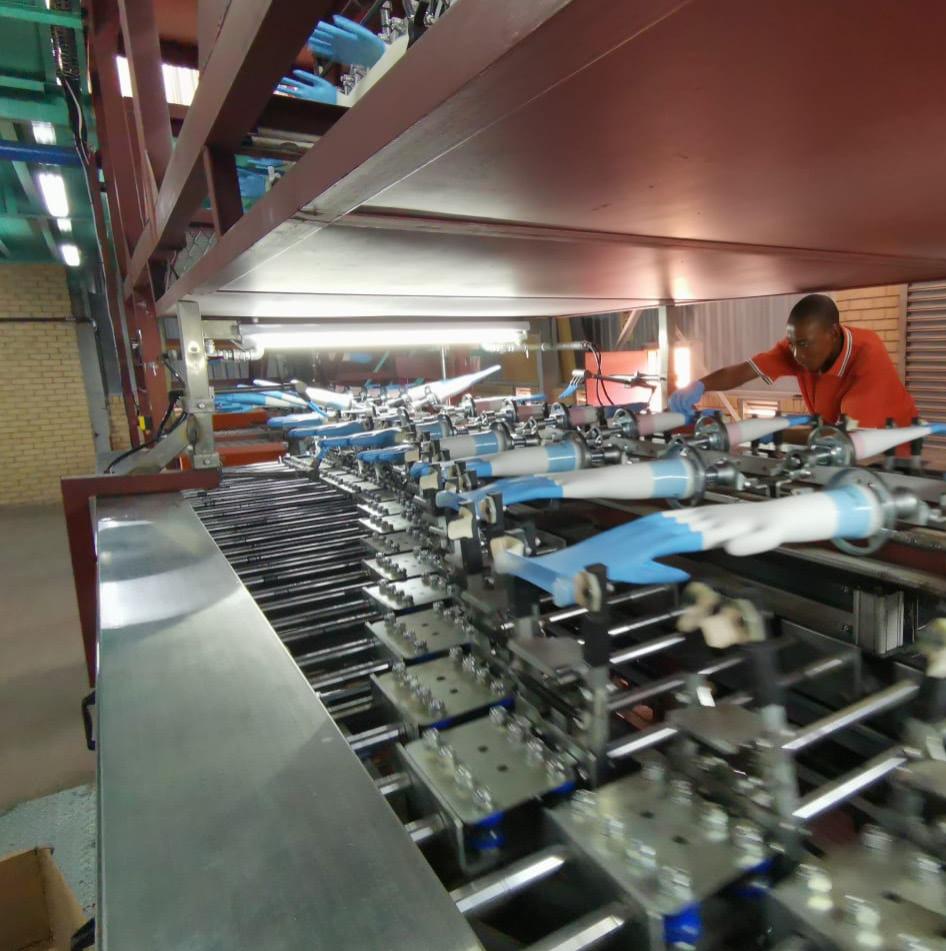
Medtex SA (Pty) Ltd is a South African-based BBBEE Level 1 disposable glove manufacturing company established in 1994. Over the years, the company has put a major emphasis on product quality control, continuous research and development, and a competitive pricing strategy. A wide product range is offered from non-sterile latex and latex free examination gloves to sterile latex and latex-free surgical gloves. Flexible services are offered from ready to use in-house brands to OEM manufacturing according to customer satisfaction. Products are manufactured according to stringent ISO13485, SANS, and CE standards.
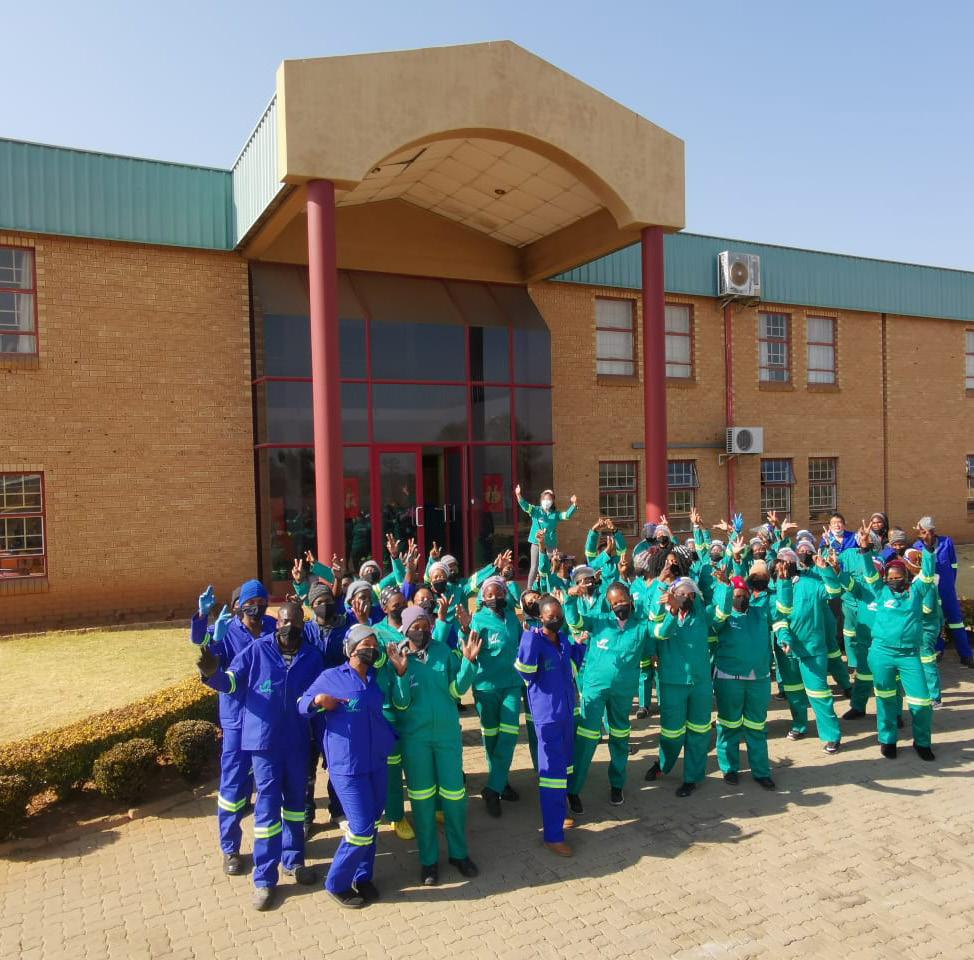

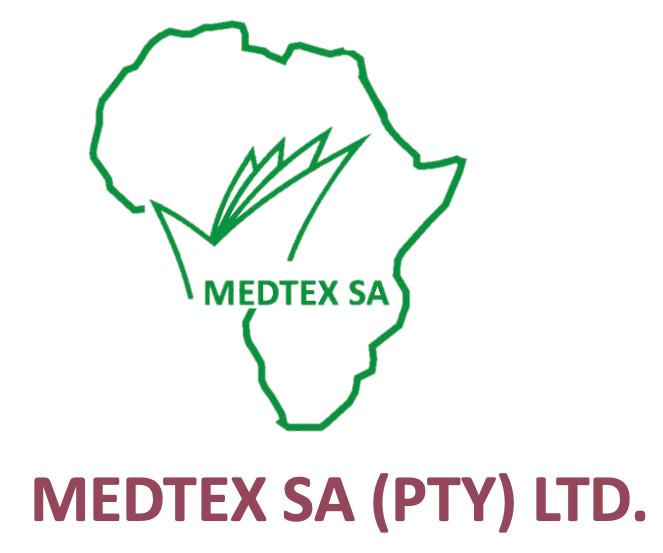


88/89 Lanham Street, Bronkhorstspruit, Gauteng, South Africa (RSA), 1020 info@medtexsa.com
+27 (13) 9324618 www.medtexsa.com
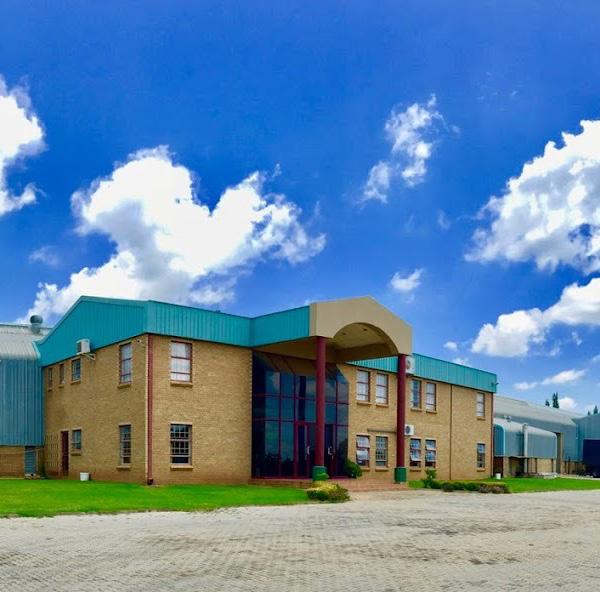
“We have a permanent staff complement of 3,750, but also appoint contract staff for certain services such as security, cleaning and laundry. In addition, due to significant nursing shortages, locum staff are also appointed. Without our people, the hospital would not survive,” Patel affirms.
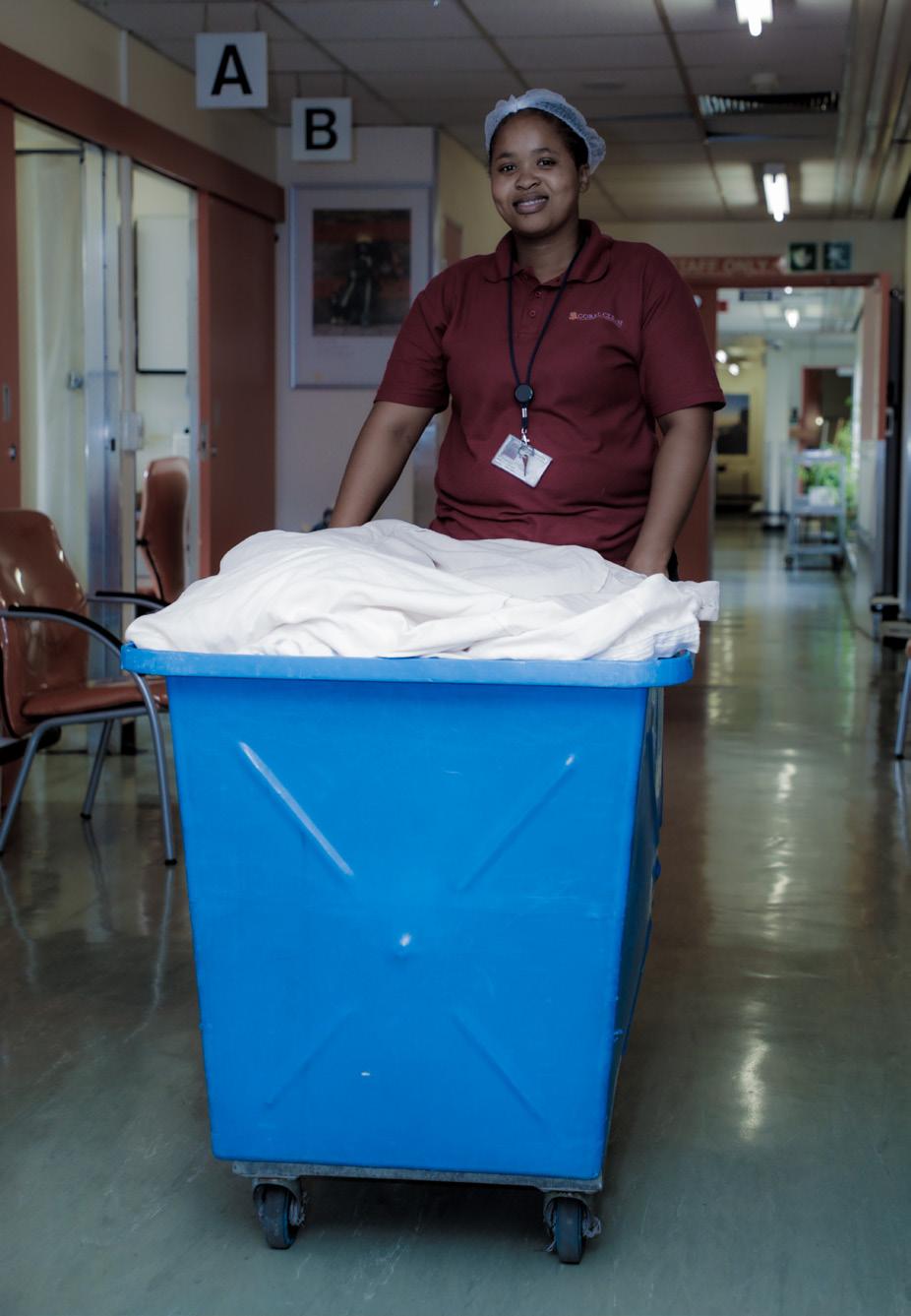
Staffed by highly experienced individuals, who can also be seen mentoring UCT medical school students that are completing the final period of their training, the standard of care is therefore extremely high at the hospital.
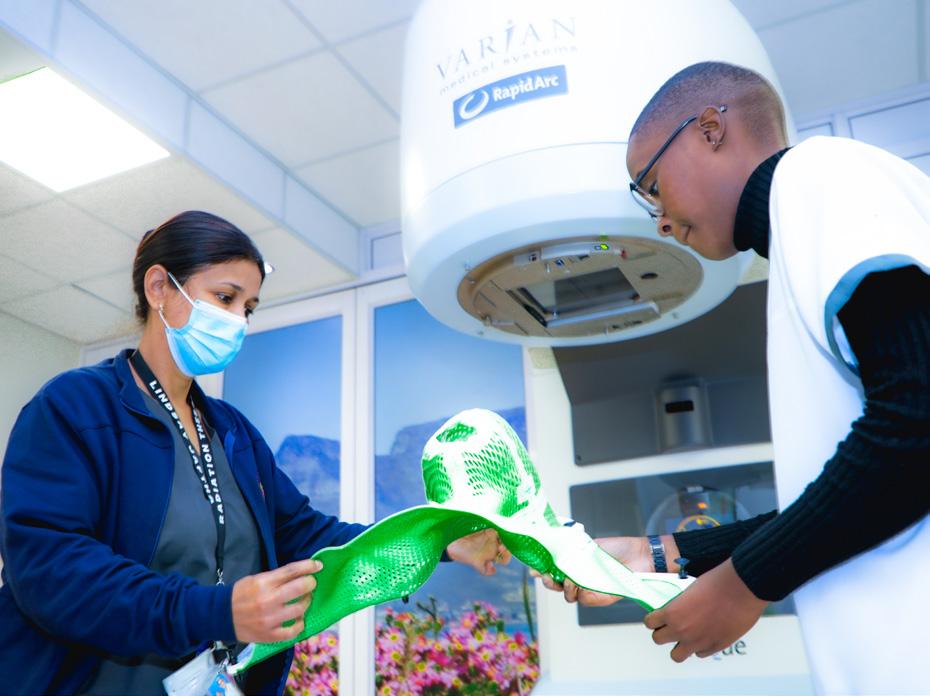
The pandemic placed significant pressures on GSH’s
employees, however, who had to attend to ill patients while at the same time dealing with their own illnesses, concerns about loved ones, and loss of life due to COVID-19.
Despite this, they remained a true credit to their profession and continued to treat patients, with GSH understanding these pressures.
As such, in recognition of the need for self-care and support, the hospital appointed a psychologist and an occupational therapist, who together with other counsellors and the psychiatric team spoke to staff members daily, both on an individual and a collective basis.
“This proved to be so beneficial that we opened a wellness centre for our staff that includes the psychological

“THE SPACE AT PRESENT IS CHALLENGING INTERNALLY, EXTERNALLY AND SOCIETALLY, AND REQUIRES A RETHINK FOR ITS FUTURE SUSTAINABILITY”
– BHAVNA PATEL, CEO, GROOTE SCHUUR HOSPITAL
Stefanutti Stocks is a listed, multidisciplinary construction group (a B-BBEE Level 1 contributor) with the capability to deliver a range of projects of any scale to a multitude of clients in diverse markets. As an ambitious and well-respected construction group we boast technical proficiency across all our disciplines.




Our strength as a contractor lies in our diversity, as we offer conventional and niche skills within the disciplines of Building, Civils, Renewable (focusing on balance of plant construction), Geotechnical, Roads & Earthworks (including bulk pipelines), Oil & Gas, Electrical & Instrumentation, Mechanical, and Mining Services (including Tailings Management and Materials Handling).

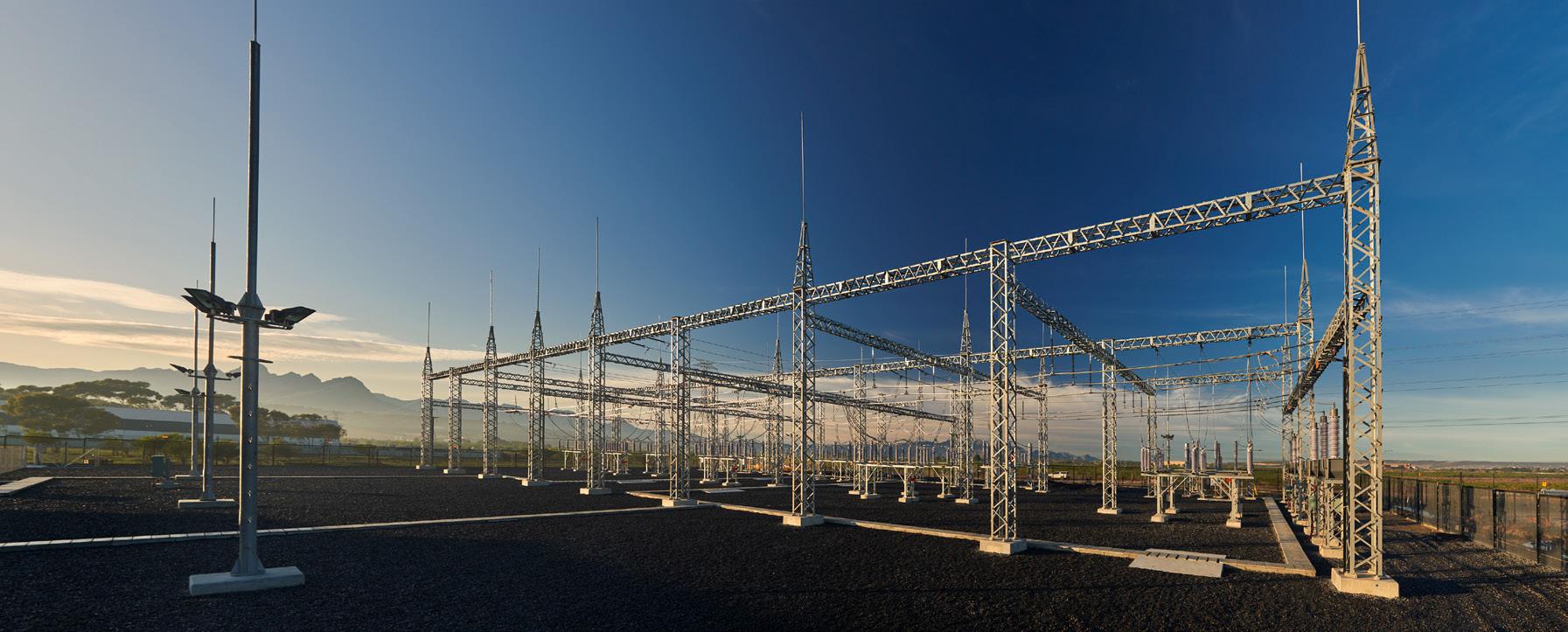
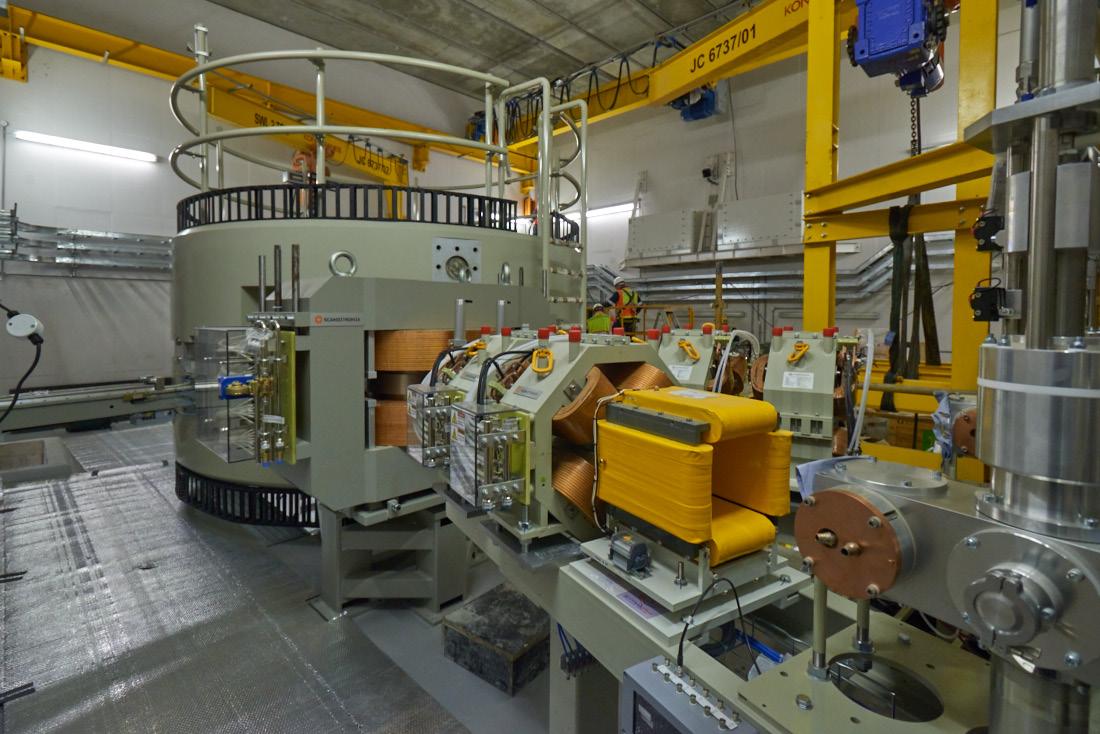

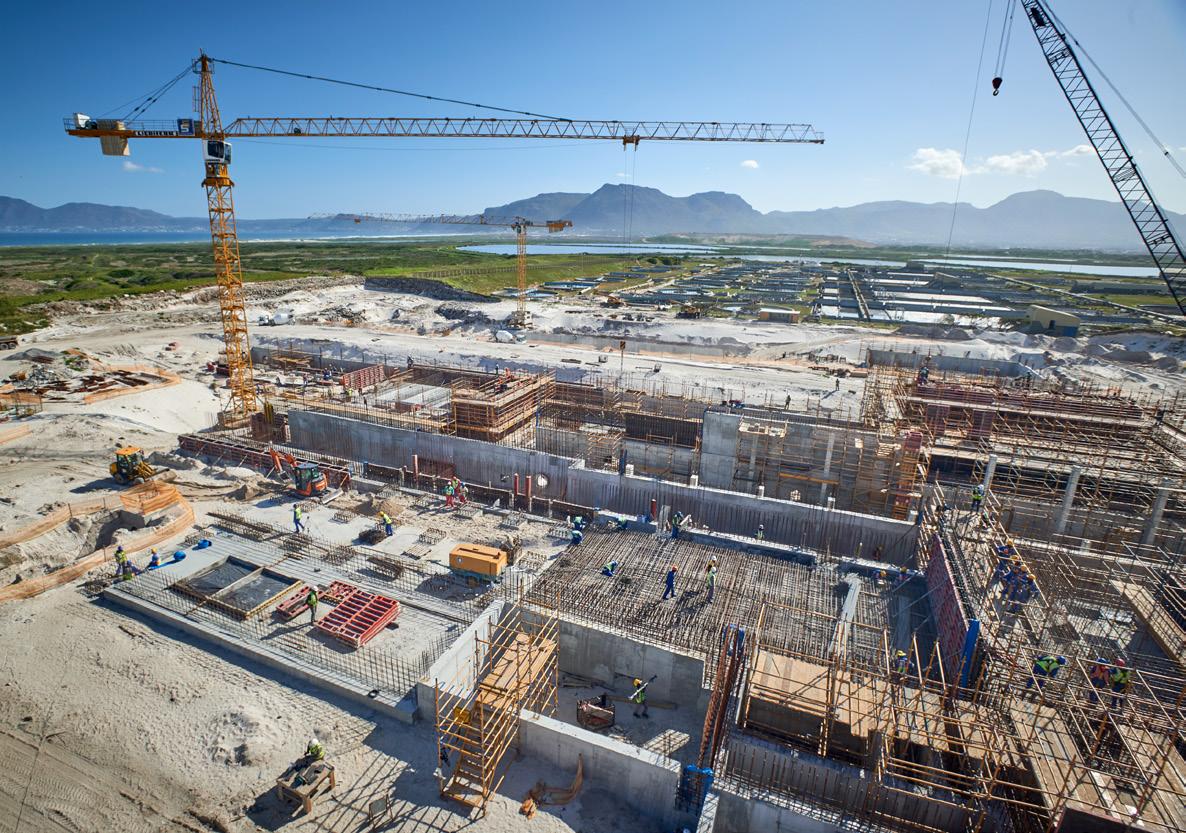
support aspects (both individual and teams), a small gym, yoga, self-defence and many other activities for their health,” reveals Patel.
“The centre has been well supported and has improved morale at the hospital.”
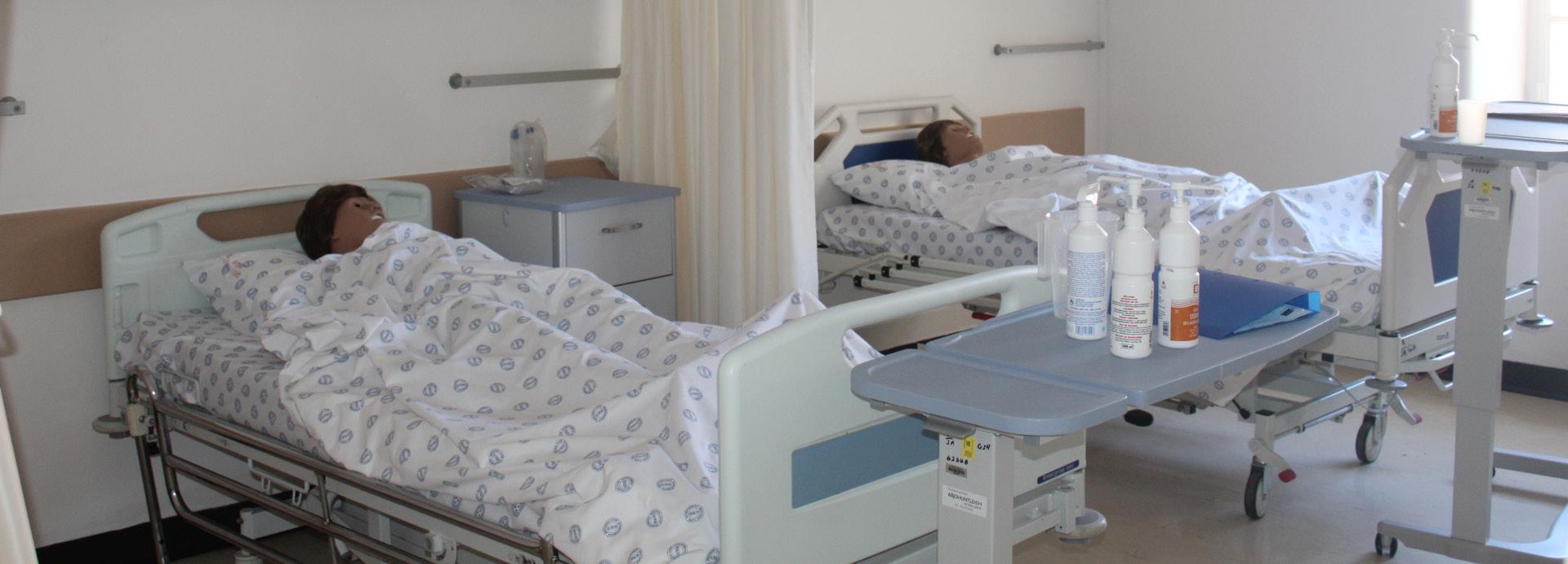
Given the huge shortage of nurses and the need to maintain competencies to function effectively, GSH also celebrated International Nurses Day in 2022 with the opening of a Nursing, Teaching and Learning Centre.
Various learning modules have been set up at the centre for nursing staff, who are educated and assessed on both the theoretical and practical components of these modules.
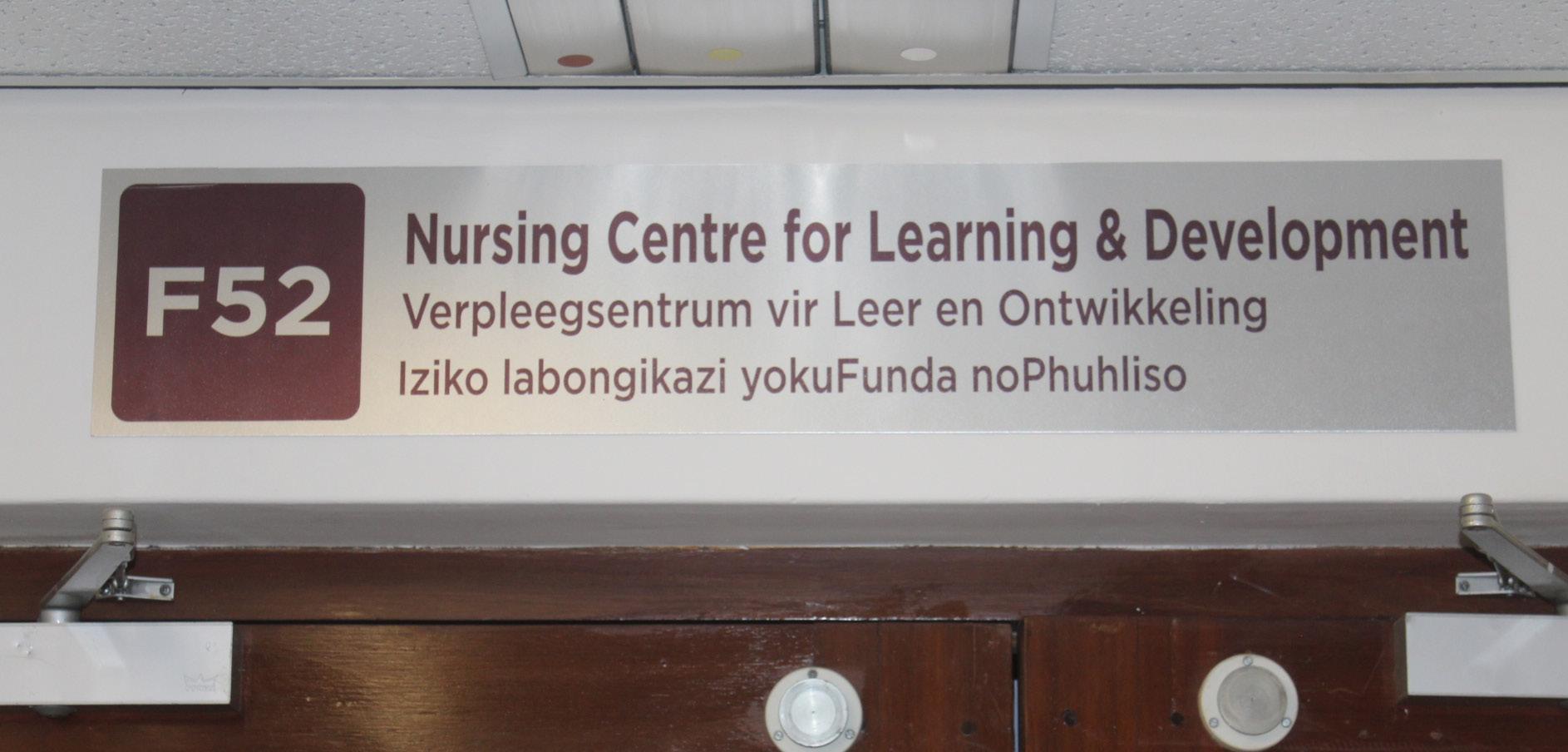
“This creates a culture of ongoing learning and teaching for the staff, and need not be restricted to nurses,” Patel
says, citing the hospital’s vision to be the leading academic hospital in Africa with international standing.
As a government-funded teaching hospital, GSH is renowned as the training ground for some of the best doctors, surgeons and nurses in SA.
GSH currently houses several clinical academic departments and plays host to the Heart of Cape Town Museum. After the hospital built new wings in the years following the ground-breaking operation, the theatres in which it took place were preserved for posterity in the form of the museum, which is dedicated to the achievements of Barnard and the world’s first successful human heart transplant.
The museum not only stands as a testament to the quality of South African medical practitioners, but also
The world of health never stands still. And neither have we. At every moment that counts, we will be there. From continuously devising and improving our existing tools and programs that help assess and optimise efficiencies, reduce cost and increase patient outcomes across healthcare organisations, to contributing to a more resilient and sustainable work environment to ensure all healthcare practitioners focus on what matters most to them: providing the best care for their patients.
At BD, our strategic partnerships across the patient journey, combined with our scale, and 125 years of experience have made us uniquely able to continually advance science and clinical outcomes, caring for patients and healthcare workers.
D
Up to 56% of all adverse events among hospitalized Patients are the result of preventable medication errors.1,2 38% of errors occur in the administration phase.3 90% of hospitalized patients receive IV medications.4
P C A
Implementing BD Guardrails™ Dose Error Reduction Systems has been shown to reduce harm and serious events at the point of care.5,6
BD CQI™ comprehensively audits IV-medication ‘good saves’ and compliance with your medication safety program.7
Rapid updating of DERS libraries to meet identified IVmedication safety gaps can be made via BD connected solutions.7

1. European Medicines Agency. Good Practice Guide on Recording, Coding, Reporting and Assessment of Medication Errors. 2014. Report No.: EMA/762563/2014. 2. National Coordinating Council for Medication Error Reporting and Prevention. Medical Errors. © 2016 National Coordinating Council for Medication Error Reporting and Prevention 2014 Available from: URL: http://www.nccmerp.org/about-medication-errors. 3. Von Laue NC, Schwappach DL, Koeck CM. The epidemiology of preventable adverse drug events: a review of the literature. Wien Klin Wochenschr 2003 Jul 15;115(12):407-15. 4. Husch M, Sullivan C, Rooney D, Barnard C, Fotis M, Clarke J, et al. Insights from the sharp end of intravenous medication errors: implications for infusion pump technology. Qual Saf Health Care 2005 Apr;14(2):80-6.
5. Sutherland A, Gerrard WS, Patel A, Randall M, Weston E. The impact of drug error reduction software on preventing harmful adverse drug events in England: a retrospective database study. BMJ Open Qual. 2022 Jul;11(3):e001708. doi: 10.1136/bmjoq-2021-001708. PMID: 35820711; PMCID: PMC9277403. 6. ManriqueRodríguez S, Sánchez-Galindo A, López-Herce J, Calleja-Hernández MÁ, Martínez-Martínez F, Iglesias-Peinado I, Carrillo-Álvarez A, Sanjurjo-Sáez M, FernándezLlamazares C. Implementing Smart Pump technology in a pediatric intensive care unit: a cost-effective approach. Int J Med Inform. 2014 Feb;83(2):99-105. doi: 10.1016/j.ijmedinf.2013.10.011. Epub 2013 Nov 13. PMID: 24296271. 7. Waterson J, Al-Jaber R, Kassab T, Al-Jazairi AS. Twelve-Month Review of Infusion Pump
Near-Miss Medication and Dose Selection Errors and User-Initiated “Good Save” Corrections: Retrospective Study. JMIR Hum Factors. 2020 Aug 11;7(3):e20364. doi: 10.2196/20364. PMID: 32667895; PMCID: PMC7448173.
serves as a reminder that organ donors are heroic in their selfless commitment to aiding others in their hour of need.
Another facility that GSH recently opened is the Adolescent Centre of Excellence (ACE), where adolescent outpatient services and psychological support are offered jointly by paediatric and adult clinicians.

This, together with the hospital’s existing adolescent inpatient ward, is the only such service of its kind in SA, recognising that many paediatric patients were being affected by chronic medical conditions and reaching adolescence without being transitioned into adult medical services.
The Diabetes Centre, meanwhile, was set up within the hospital to focus on multidisciplinary care for the increasing number of diabetic
SERVICES AND PSYCHOLOGICAL SUPPORT ARE OFFERED JOINTLY BY PAEDIATRIC AND ADULT CLINICIANS’
patients, offering a one-stop care facility.
As well as opening several facilities, GSH implemented a number of innovations in 2022 including a positron emission tomography-computed tomography (PET-CT) machine for the treatment of cancer patients, and the da Vinci Xi surgical robot, becoming the first public facility in Africa to provide assisted robotic surgery.
“Surgeons, nurses and technical staff have been trained to perform
not only urological procedures, but also gynaecological, colorectal, and cardiothoracic procedures,” Patel shares.
GSH also continues to be the only public hospital in SA that offers heart, liver, lung, and kidney transplant services, with a transplant unit headed by a transplant specialist set up to bring together all the physicians and surgeons to work collaboratively to increase the number of operations done.
‘ANOTHER FACILITY THAT GSH RECENTLY OPENED IS THE ADOLESCENT CENTRE OF EXCELLENCE (ACE), WHERE ADOLESCENT OUTPATIENT
At Phoenix Neomed we are committed to providing state of the art medical devices that are essential for saving lives. We are dedicated to delivering cutting edge technology and unparalleled quality to healthcare facilities, hospitals, and clinics.
Our products include a wide range of critical medical equipment, such as ventilators, incubators, aEEGs, infusion management, patient monitors and much more. We understand the importance of reliable and efficient equipment in critical care situations, and our products are designed to meet the highest standards of performance and safety.

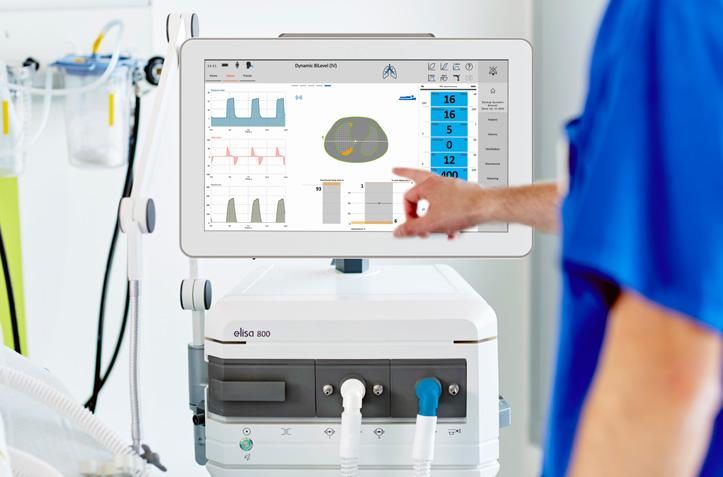
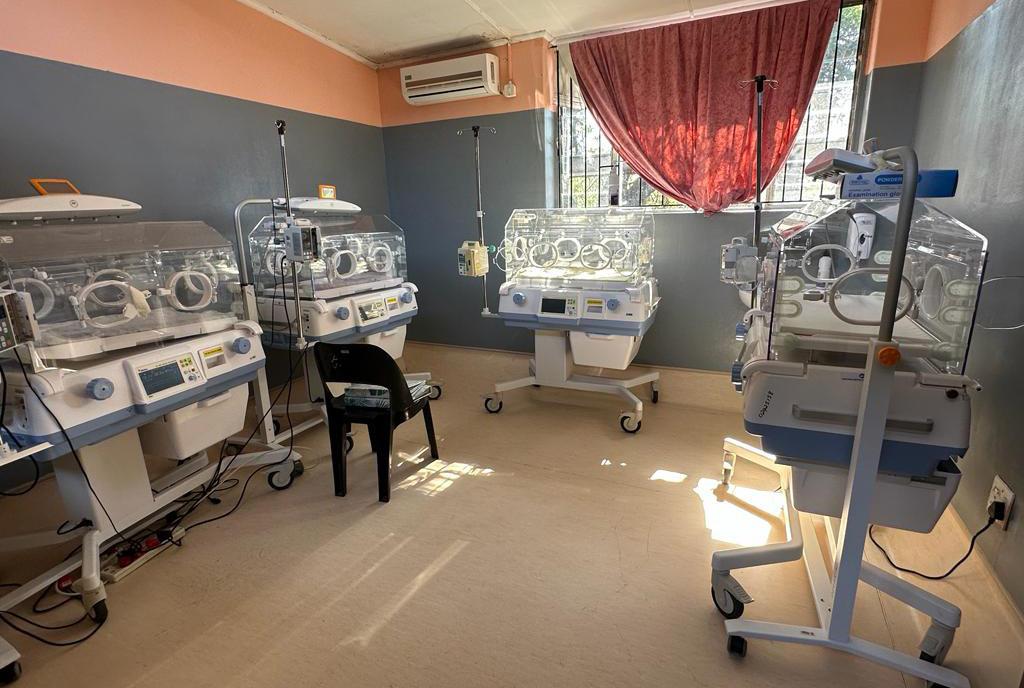
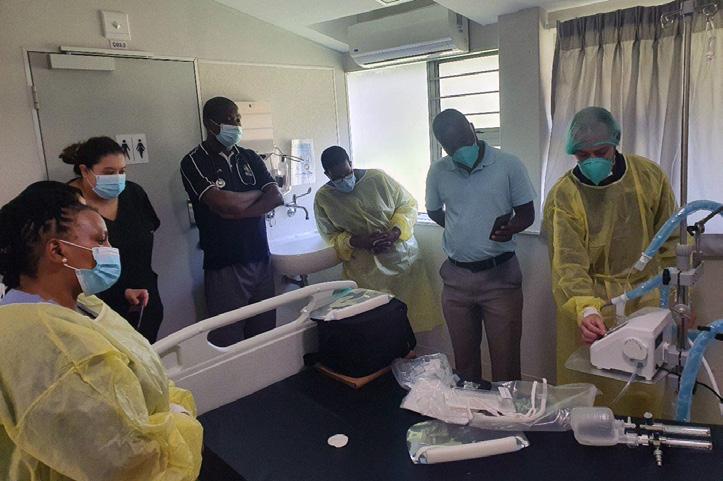

At Phoenix Neomed, we pride ourselves on providing exceptional customer service and support. Our team of experts is always available to answer your questions and provide guidance on the best products to meet your specific needs. We are committed to building lasting relationships with our customers, and our focus on quality and reliability ensures that you can count on us for years to come.
If you are looking for a reliable and innovative medical equipment company, look no further than us. Contact us today to learn more about our products and services and how we can help you to provide the best possible care for your patients.
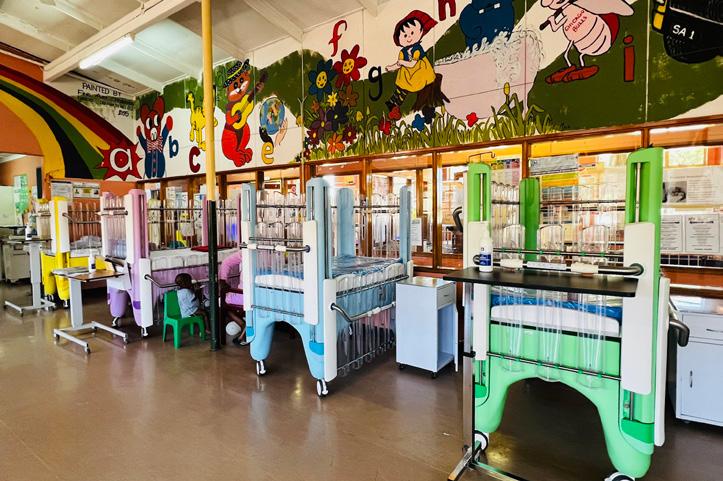
www.phoenixneomed.co.za

info@phoenixneomed.co.za

The focus on infection prevention and control (IPC) likewise energised the need to appoint a specialist to manage the IPC unit and focus on monitoring this part of the service.
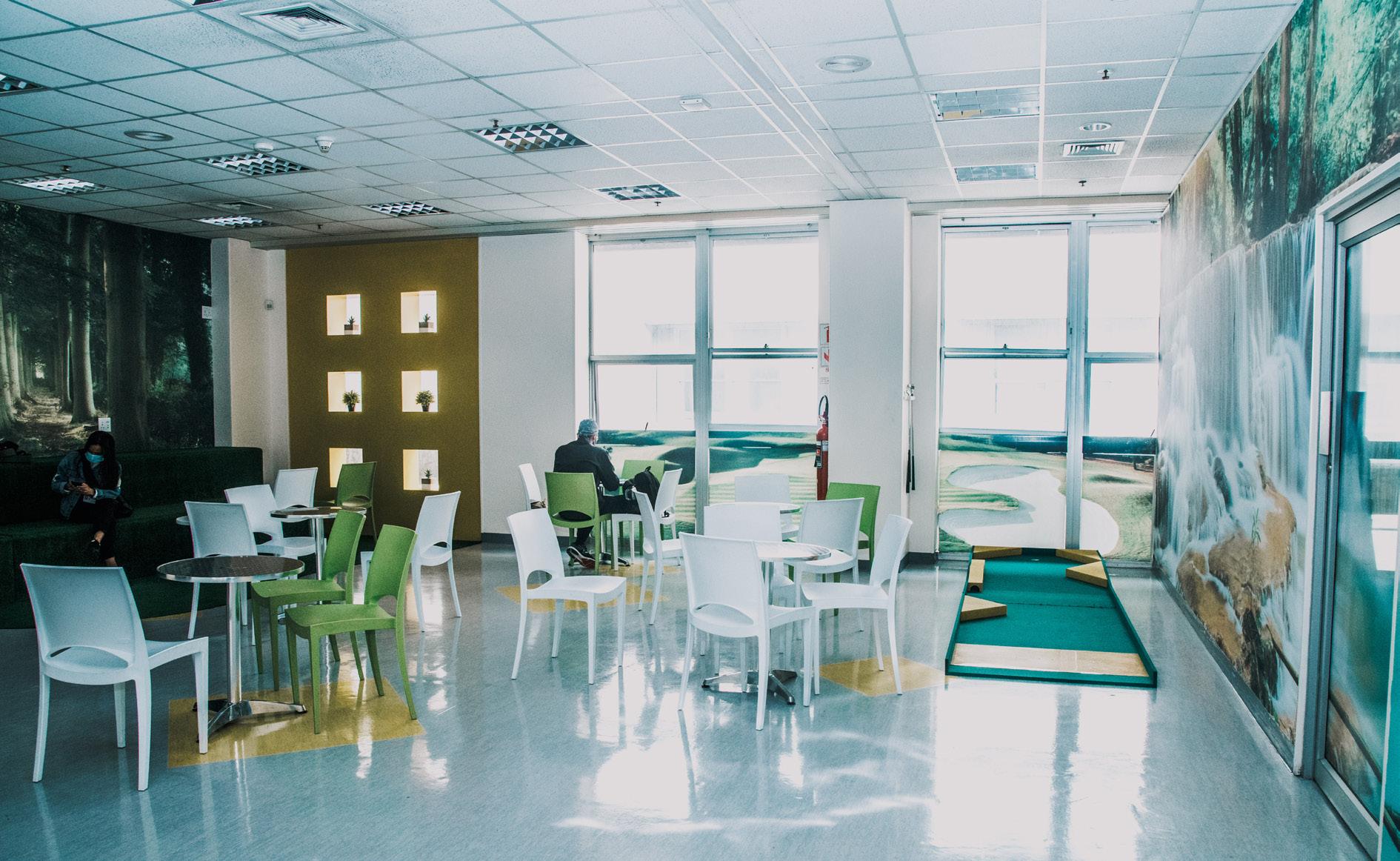
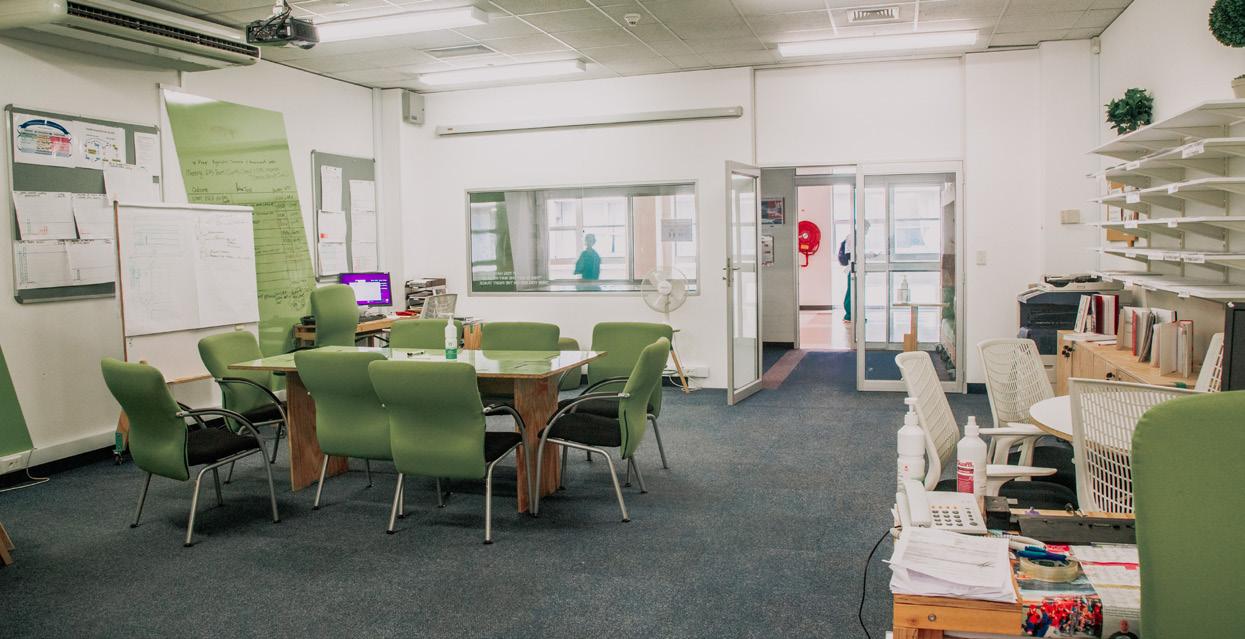
With all these additional innovations, facilities and units in place, GSH’s focus for the next three years is firmly on strengthening the health system and developing a renewed strategy to meet patient needs.
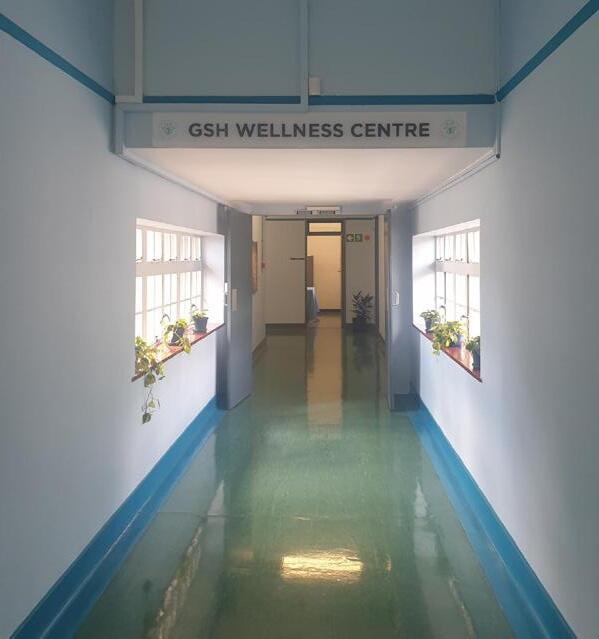
“For the coming year, plans will be put in place and teams will be set up to start exploring how this could function on a practical level,” concludes Patel, whose personal vision is to see GSH continue to be a leading innovative healthcare institution, and a centre of excellence where both staff and patients feel valued and cared for.
“This is something that I would really like us to sustain going forwards.”
Tel: +27 21 4043178
www.westerncape.gov.za

Schindler is a proud mobility partner for the Groote Schuur hospital, ensuring safe, no fuss and reliable transport for our Healthcare workers, Patients and Visitors.
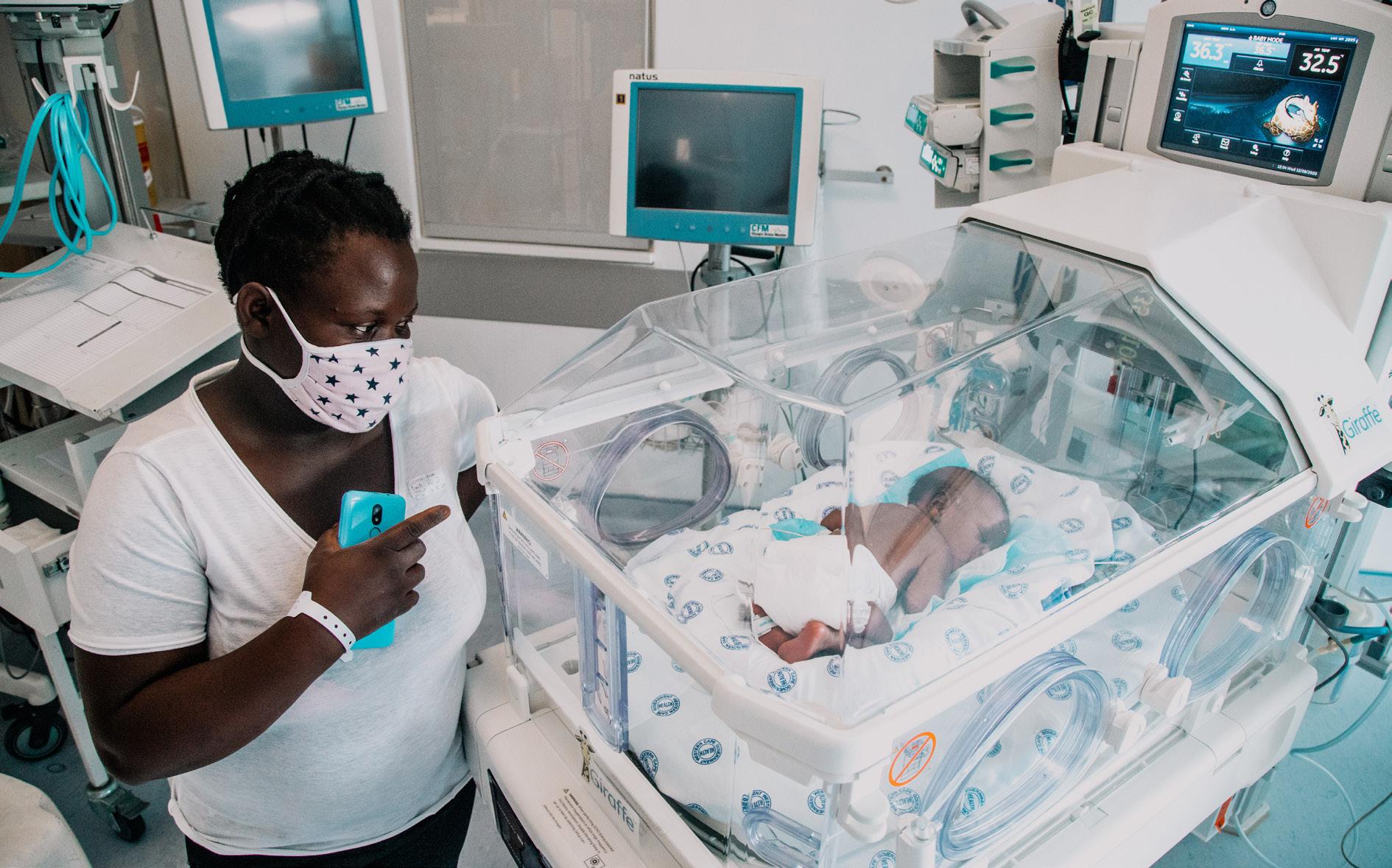

+ 27 87 087 6555 sales@za.schindler.com | www.schindler.co.za schindlergroup schindler | schindlergroup


We Elevate...Hospitals.

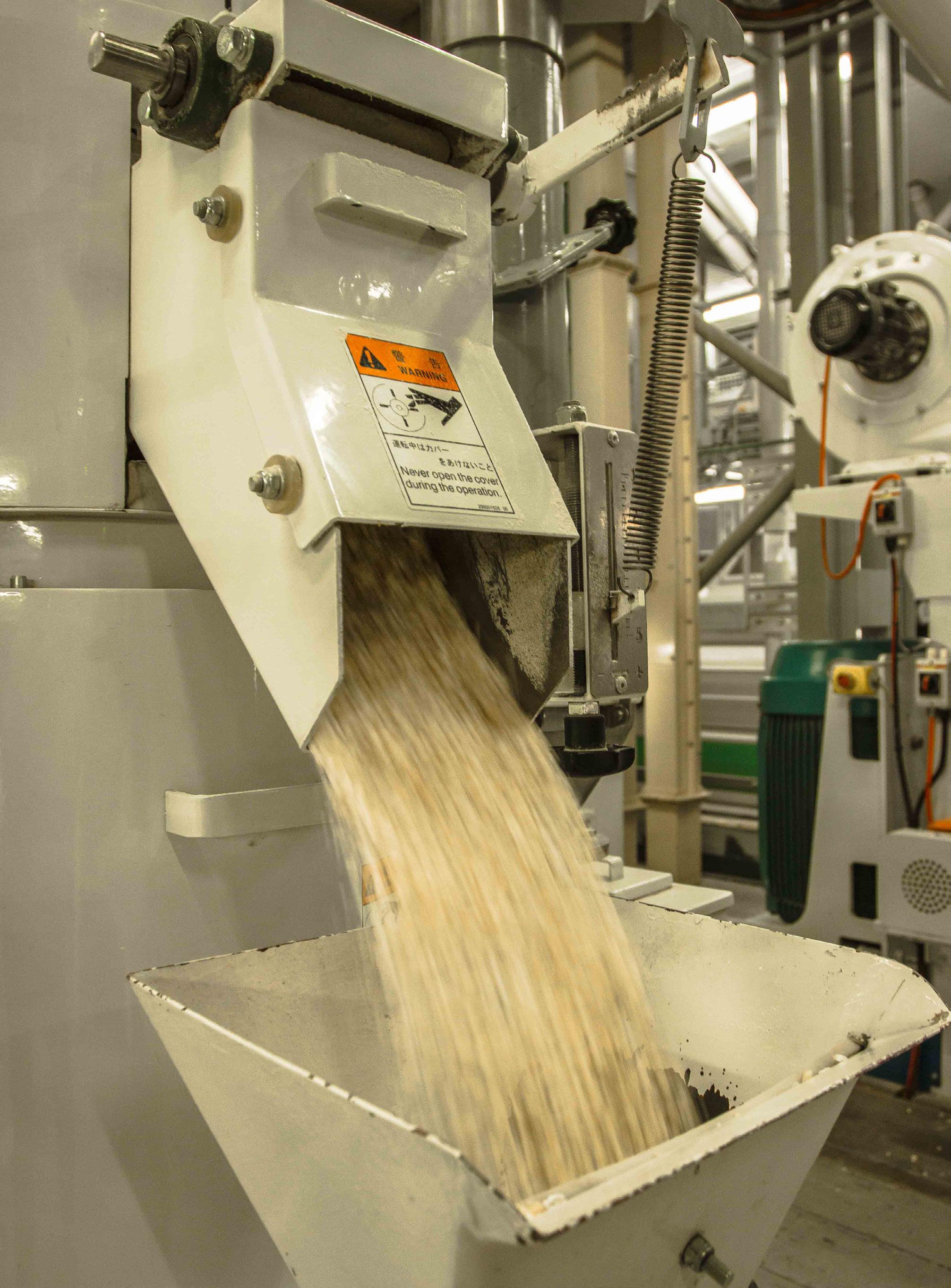
Since its establishment, Namib Mills has been sustaining national food security across Namibia and South Africa. We hear more from Operations Manager, Elfrieda Roos, about how the company’s bread and other products are on the rise
 Writer: Ed Budds | Project Manager: Bex Middleton
Writer: Ed Budds | Project Manager: Bex Middleton
Wheat farming and flour milling have historically led the way as two of South Africa (SA) and Namibia’s most prominent and profitable agricultural ventures.
In SA, the nation’s first flour mills were built in the Overberg region in the 1800s, starting out as small-scale, humble farming operations. Hard-working millers would cultivate and farm their own wheat before milling it and then selling their produce at the local markets. Many farmers would also use the flour to bake their own bread and pastries.
In this way, the grain milling sector has always played a vital role in stabilising food security, as its

and influential factor in the fluctuation of maize meal and bread prices.
Continuing to adhere to this proudly traditional lineage, Namib Mills was established in 1982 and has been feeding the African continent ever since.
“We are working in a really exciting space at present, mainly due to the volatility of soft commodities. The milling industry in Africa has been asked to play a crucial role in fulfilling the constant availability of basic foodstuffs at extremely low prices and therefore low margins,” opens Elfrieda Roos, Operations Manager for Namib Mills.
After the establishment of its first maize mill in Windhoek, the company has elegantly evolved into Namibia’s leading supplier of staple foods. This prominent position is reflected in Namib Mills’ well-established and diverse range of preferred wheat our, maize meal, bread, pasta, sugar, rice and Mahangu brands.
Today, Namib Mills has leveraged its four decades of industry experience and vast amounts of knowledge, to transition serenely into a major supplier of staple foods and animal feed in Namibia and SA.
Growing to employ over 2,000 members of staff across these two nations, Namib Mills utilises state of the art facilities and a highly skilled workforce which helps to guarantee a wide range of healthy, quality branded products that meet the requirements of its many customers.
“Our reputation is important to us and acts as a non-negotiable commitment to continuous quality improvement and superior service,” states Roos.
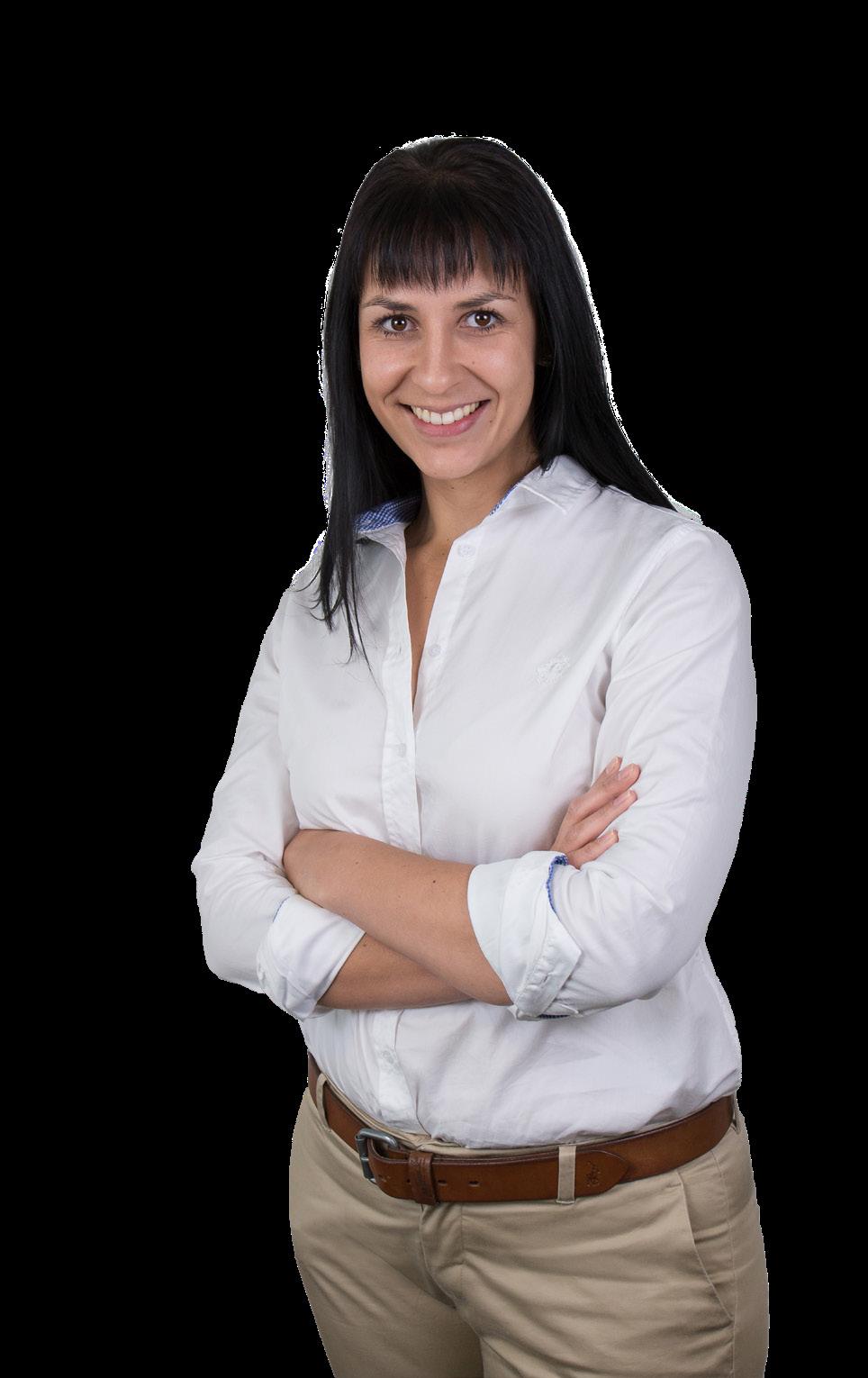





















“This reputation has also ensured that our products remain trusted leaders in their individual categories.” Along with this enviable reputation, comes great responsibility.
Endeavouring to rise to this challenge, Namib Mills embraces this immense undertaking of ensuring basic food security for Namibia and takes pride in consistently providing good quality products and premium service to the supply chain of basic foods.
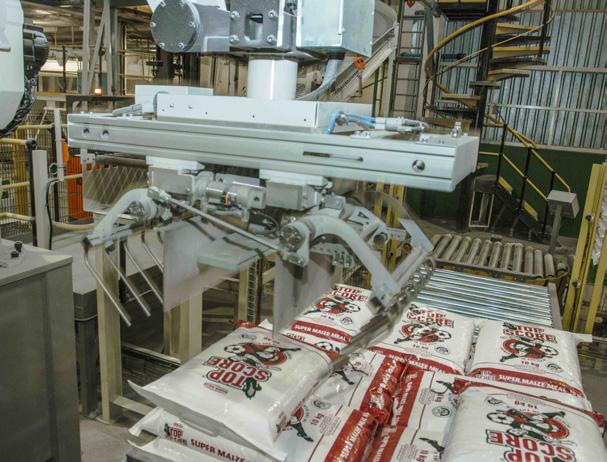
HONESTY
ETHICS
INNOVATION
RESPECT
PASSION FOR WORK
SOCIAL RESPONSIBILITY
“Our next step is to ensure continuous affordability of our products. This will be done by remaining extremely efficient and by creating income streams alongside our basket of products’ value chain,” Roos adds.
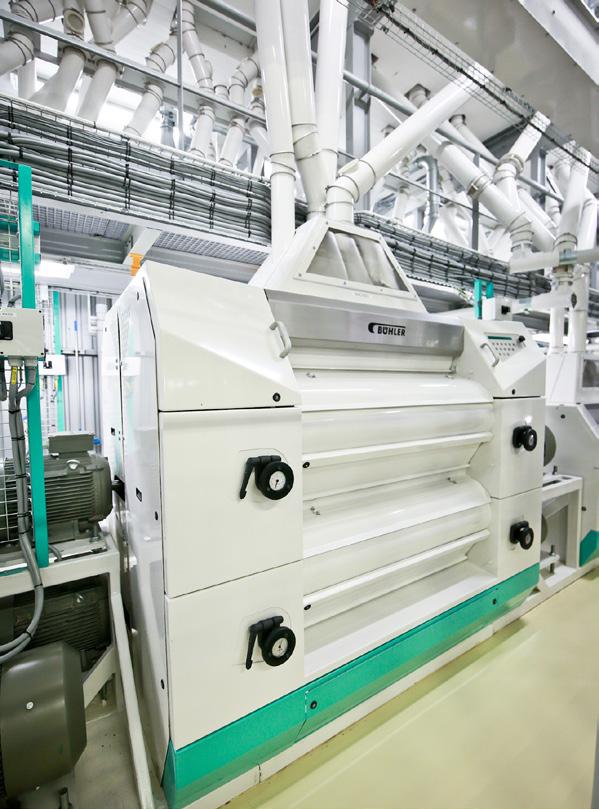
Bringing people together with creative, enjoyable, exciting and tasty experiences, Namib Mills is home to many famous and popular products. The company’s portfolio of household brands includes Bakpro, TopScore, Pasta Polana, Pasta la Vita, Rice King, and Meme Mahangu.

“Our maize brand, TopScore, has been voted the second most recognisable brand in Namibia, which is a particular company pride point, alongside the brand turning 40 years old in 2022.”
One of the best-selling sub-brands of Namib Mills is Pasta Polana, which is available in bags of spaghetti, macaroni, fusilli and elbows.
Namib Mills - maize productionEvery day, billions of people come into contact with Bühler technologies, ranging from smartphone parts to the food they eat. Bühler creates innovations for a better world with a focus on safe and sustainable solutions.
Founded in 1860, Bühler is still a family-owned business today headed by current CEO Stefan Scheiber. We operate in a global network of 140 countries with over 30 production sites and 100 service centres.
In South Africa, Bühler machines are part of various value chains, from grain to FMCG to material processing. The country is a regional hub, servicing the markets of Angola, Botswana, Lesotho, Madagascar, Mauritius, Malawi, Mozambique, Namibia, La Réunion, Solomon Islands, Seychelles, Eswatini, Zambia, and Zimbabwe. Equipment can be serviced and repaired by our service technicians at the
customer’s site or at our workshops across the Southern African region.

Bϋhler Johannesburg offers an apprenticeship programme that is merSETA accredited in boiler making and welding, aiming to equip and empower the future generation with measurable behavioural outcomes.
We partner with the biggest FMCG companies all over Southern Africa, and together we ensure food supply to more than 200 million people.
Bühler wants to contribute to a better and more sustainable world with collaborative innovation, new technologies, training, and services.
It is our aim to always remain relevant to the customers in our care and the society at large, allowing them to produce safe and healthy staple food to feed the people, as well as sustaining hope through what we do.
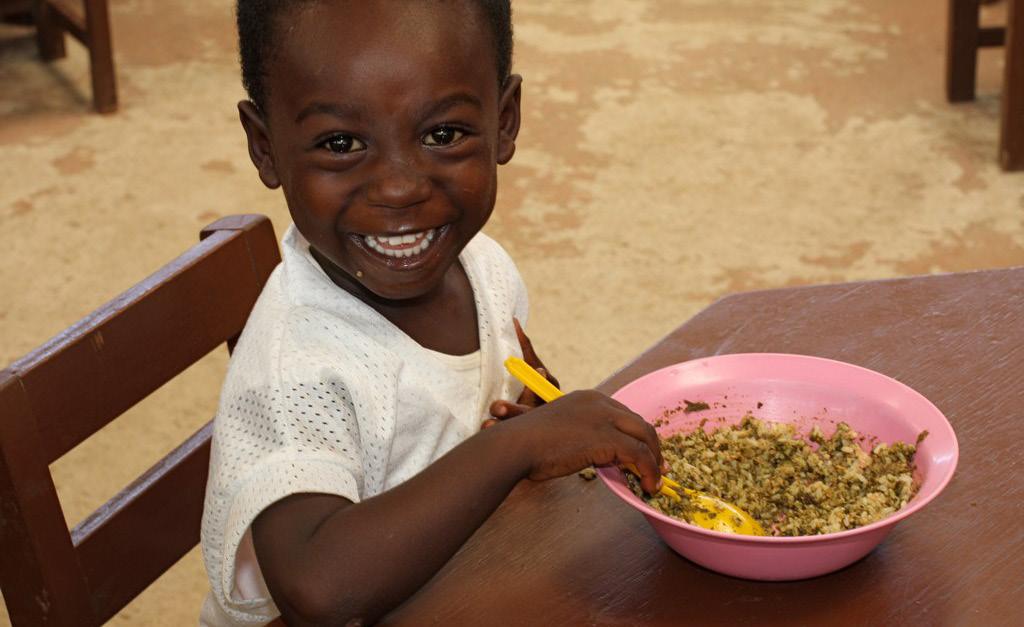
A solution for every one of your requirements.
Made by Bühler.
Safe and nutritious food for all.
world.
“To the household decision makers, Pasta Polana is an alternative, cheaper pasta that is value for your money, easily available and one which the family will still love to eat,” she enthuses.
Elsewhere in its vast portfolio is Sugar King, a proud household name and staple in nearly every home throughout Namibia.
Adding to its portfolio of dry goods is Namib Mills’ brand of RealGood chicken, the only industrial poultry
farm in Namibia. This brand is also distributed nationally to ensure a quality, affordable protein can accompany the people of Namibia’s TopScore or Pasta Polana every day.
Namib Mills also sells its milling by-products as feed ingredients to Feedmaster. Feedmaster is proudly Namibian and has two feed plants in Windhoek, in addition to the Veekos plant in Upington, SA.
“Our sister company, Feedmaster, manufactures animal feed from
Namib Mills’ waste products, which are mainly chop and bran. Namib Poultry Industries (NPI) then uses the chicken feed produced by Feedmaster for our commercial poultry farm,” details Roos.
By embracing this process, Namib Mills ensures that value is created throughout the entire food and feed value chain, as part of an efficient cycle of sustainability.
Namib Mills believes that its employees are the primary reason for the group’s success and that talent development is a key factor in maintaining its competitive edge. Talent enhancement is therefore integrated into the company’s forward-thinking strategy and business culture.
“OUR REPUTATION IS IMPORTANT TO US AND ACTS AS A NON-NEGOTIABLE COMMITMENT TO CONTINUOUS QUALITY IMPROVEMENT AND SUPERIOR SERVICE”

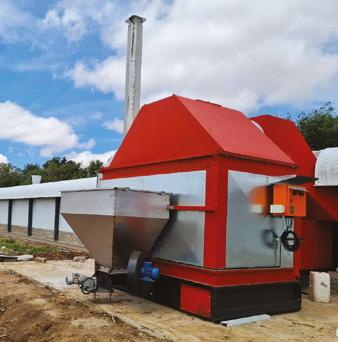



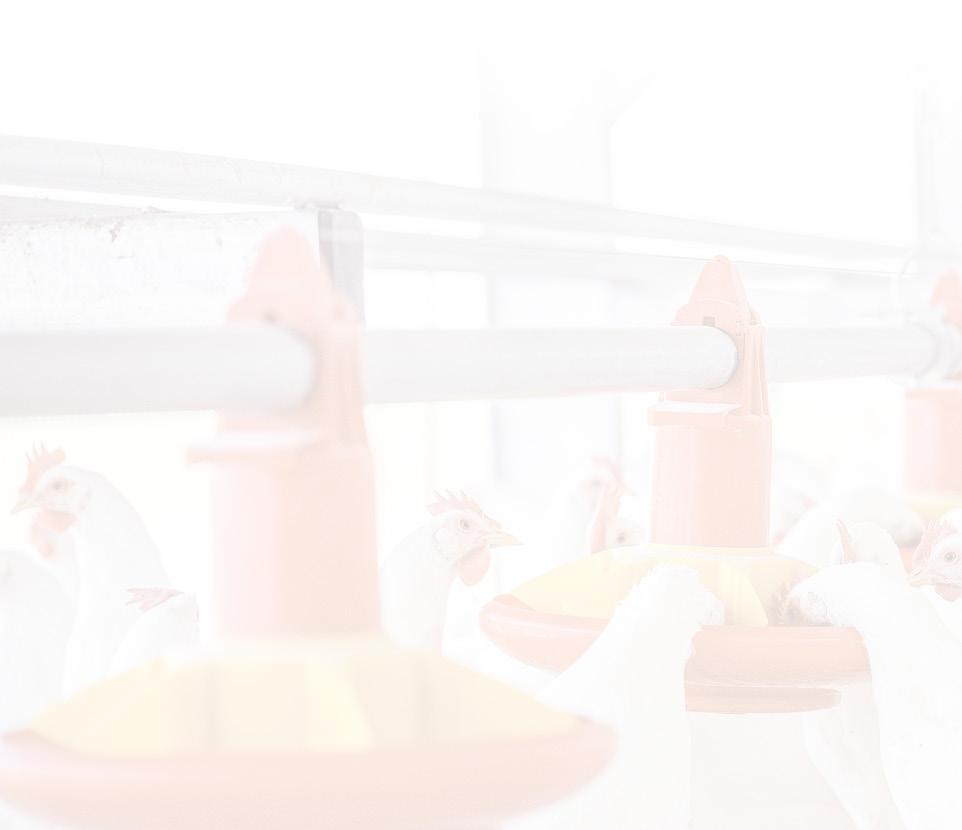

PLASSON was founded in 1964 and has grown to be a widely regarded market leader. Our innovative products and solutions are tailored for use in several sectors and offer unique advantages and specialised solutions.
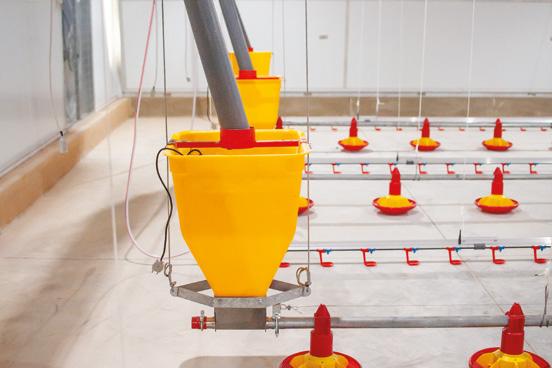

Our Livestock Division provides equipment for all livestock farming necessities, which include feeding and drinking solutions, integrated climate control systems and housing construction options. We further offer everything from small parts, to complete turnkey solutions, to enhance your production experience and performance.
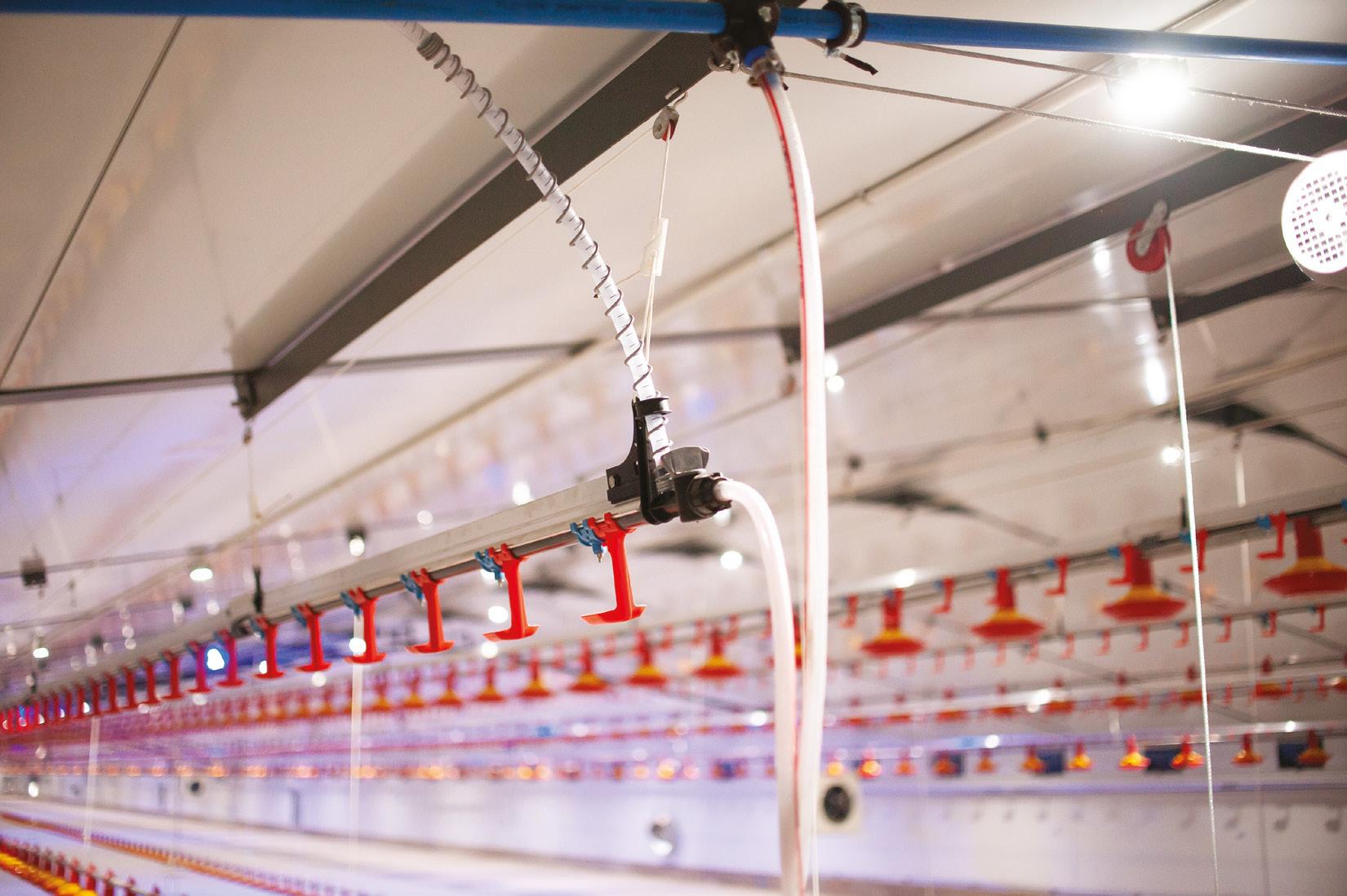
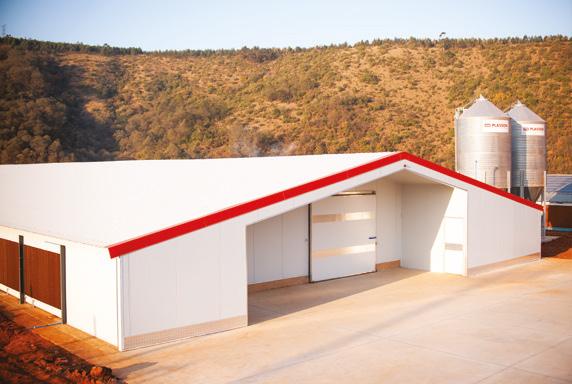
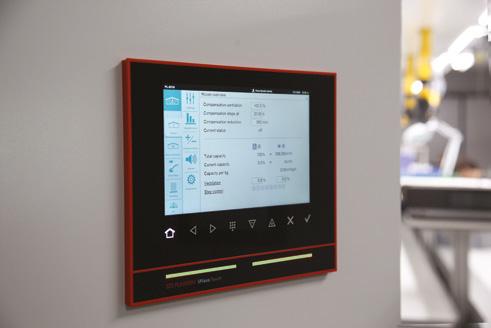


“I was impressed from the start at the level of excellence. Dealing with one big, professional team means the work was done fast and efficiently, and the service was great without breaking the bank.”
- Wynand RossouwOur Flow Solutions Division provides a wide variety of Mechanical and Electrofusion fittings for connecting PE pipes and caters for a broad range of sectors including mining, municipal water distribution, gas conveyance, transfer of industrial fluids, agricultural irrigation, and wastewater systems, which come with a 50-year to life guarantee.
“Plasson South Africa is more than just another supplier… I consider them a partner in my business. Their excellent service is vital to the continued success of what we do on a daily basis.”
 - Herman du Preez
- Herman du Preez
The group is also firmly committed to sound corporate governance and adheres to strict business ethics that foster integrity, respect, honesty and openness in its day-to-day business activities with stakeholders.
“We follow safe workplace practices to provide a healthy working environment for all our employees. The natural environment is also important to us and the group
conducts business in an ecologically responsible manner,” Roos tells us. Furthermore, ensuring maximal sustainability is a priority throughout Namib Mills, and the company therefore remains committed to environmentally friendly business practices, not only for the long-term benefit of its shareholders but all its stakeholders.

“We create socio-economic growth
through investment in local economies and develop people’s talent, both inside our group and through educational initiatives in the communities around us,” she elaborates.
A further element of the company’s socio-economical strategy involves the goal of creating additional livelihoods for fellow Namibians within the value chain. Going forward, Namib Mills is focusing on creating sustainable employment in the agricultural sector for Namibia and the wider African region, aiming to make a difference in the local economy and community.
Namib Mills also remains very proud of its vetkoek initiative and smalland medium-sized enterprise (SME) chicken development. The vetkoek initiative has created livelihoods for more than 7,000 women, that use the flour to bake and then sell vetkoek. The SME chicken development assists small-scale non-commercial farmers with training from small chicks to chickens, and this has also created livelihoods for over 750 farmers. Namib Mills invests heavily in the training and support of both these projects, believing it must help communities to thrive by empowering them with the necessary skills.
“WE CREATE SOCIO-ECONOMIC GROWTH THROUGH INVESTMENT IN LOCAL ECONOMIES AND DEVELOP PEOPLE’S TALENT, BOTH INSIDE OUR GROUP AND THROUGH EDUCATIONAL INITIATIVES”
– ELFRIEDA ROOS, OPERATIONS MANAGER, NAMIB MILLS
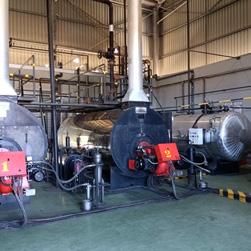
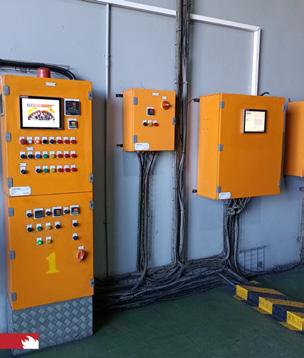
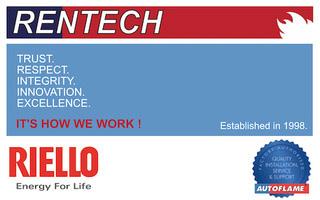
Our global footprint across the food and feed industries provides us with the ability to serve our customers with tailor-made procurement and risk management solutions.
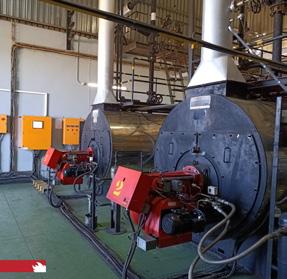




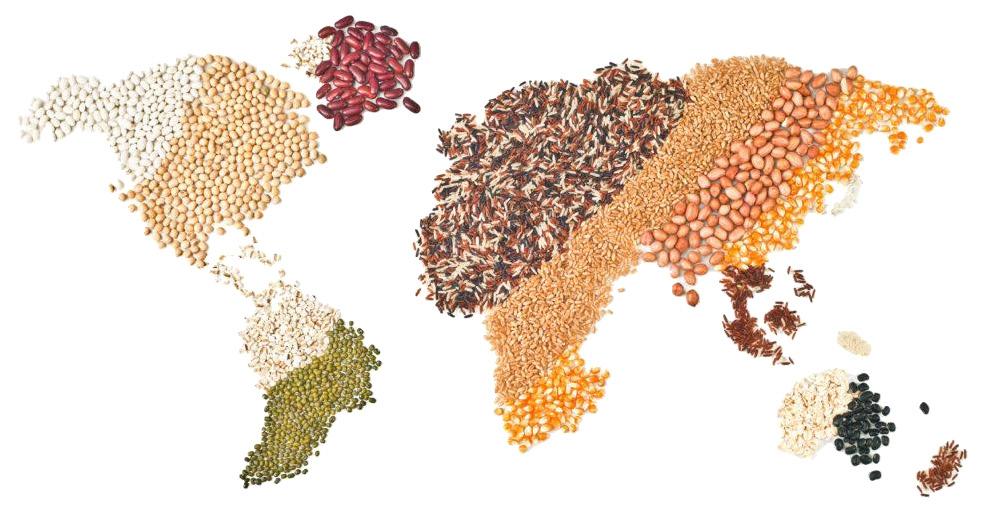
www.seaboardoverseas.com

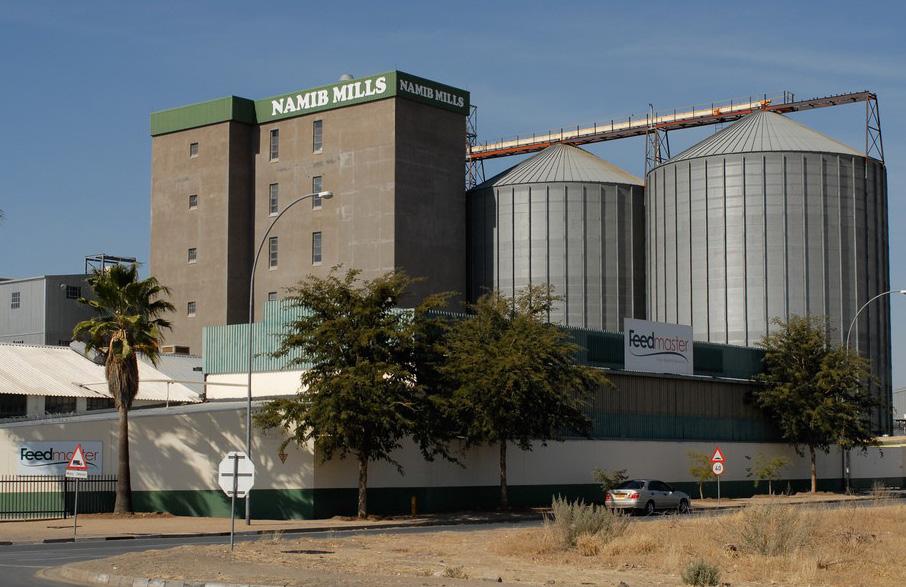
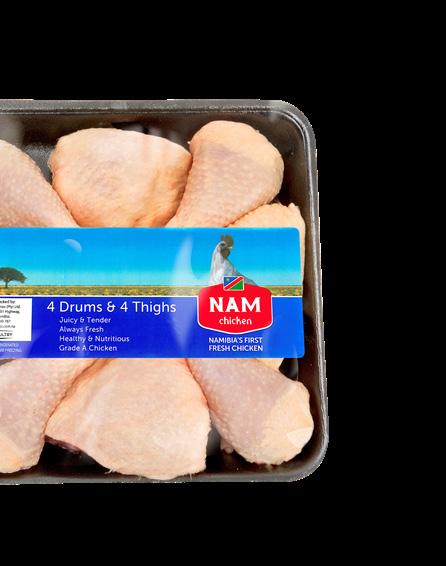







Namib Mills’ main production facility is situated in Windhoek, the capital of Namibia, with a complex that consists of wheat mills, a maize mill, a pasta plant, a complete mix plant, a rice packing plant, and a sugar packing plant. Elsewhere, in Otavi, the company operates a maize mill, a mahangu mill, a sugar packing plant, and an instant maize porridge plant.
Complementing this is an array of strategically positioned bulk storage and distribution points which the company utilises to enhance its supply capabilities.
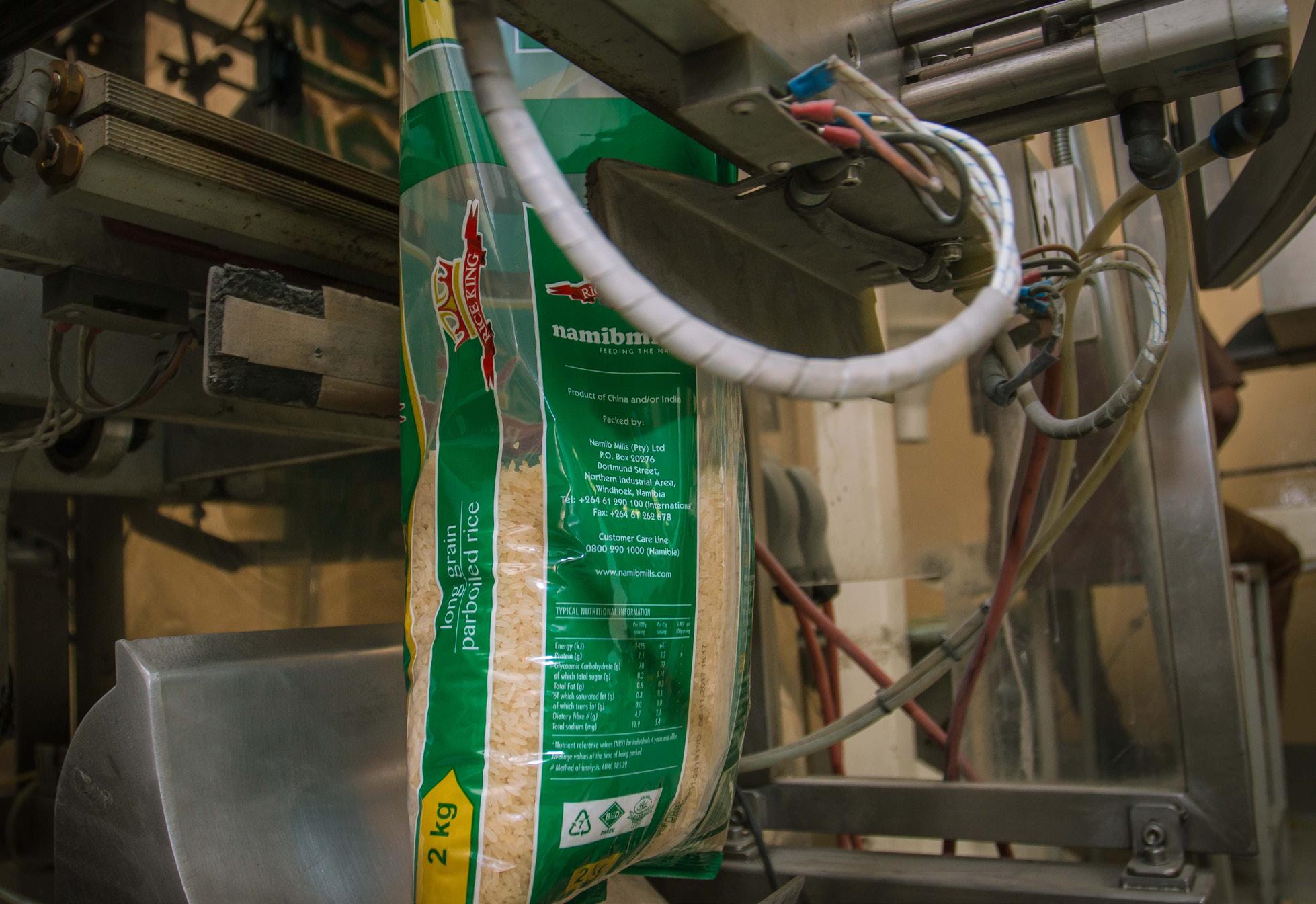


Now boasting nine
depots in Namibia, one in SA, one in Zambia and one in Perth, Australia, the Namib Mills operation possesses 211 trucks to facilitate its distribution operations.
This extensive service capability currently includes dry goods distribution, both long and short haul, cold and frozen distribution and bread and bulk grain transportation. This is in addition to the company’s 173 vehicles that are used by employees throughout the group.
At present, Namib Mills distributes bread to all the major customer hubs in Namibia and has expanded the distribution network accordingly. From the beginning, Namib Mills has also always aspired to be price competitive despite a lack of economies of scale.

“We invested a large amount of money in new ventures about three
years ago and are looking to get these projects on time and up to speed in the wake of recent challenges such as the COVID-19 pandemic, as well as the turbulent current economic climate,” Roos affirms.
Setting its sights firmly on an optimistic future as it strives towards a horizon of excellence and socioeconomic enhancement, Namib Mills will continue to expand its product table as it embraces the responsibility and pride that arrives with being Namibia and SA’s leading supplier of staple foods.

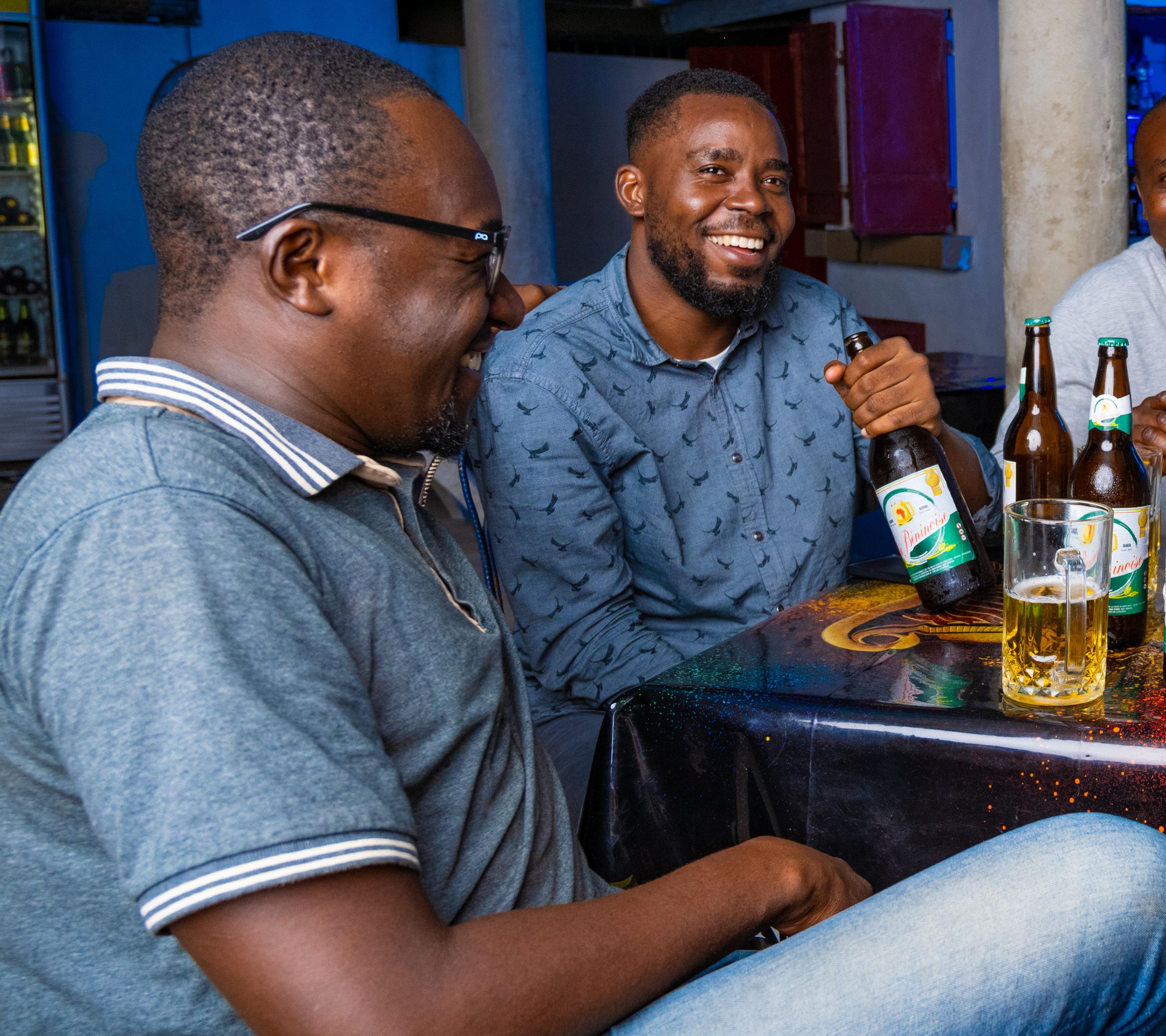
A sustainable approach is infused into SOBEBRA’s beverage products. General Director, Benjamin Bronne, lifts the lid on the company’s environmental commitments and corporate social responsibility strategy
 Writer: Jack Salter | Project Manager: Bex Middleton
Writer: Jack Salter | Project Manager: Bex Middleton
One of Africa’s most stable democracies, Benin is characterised by fertile land and long-established agricultural practices.
With over 70 percent of people relying on farming in the West African country, agriculture is the backbone of economic development in Benin, whose agriculture-first economy is now ready to reap the rewards of industrialisation.
The Glo-Djigbé Industrial Zone (GDIZ), located just 45 kilometres (km) from the Beninese capital of
Cotonou, is dedicated to the local transformation of agricultural goods and the increase of locally processed products.
“GDIZ offers the conditions for the emergence of a real industry for the processing of raw materials, spearheading Benin’s economy. This sets a very promising basis for Benin’s industrial development,” notes Benjamin Bronne, General Director of SOBEBRA.
Agriculture, as it relates to the commercial production of food and drink by farming, is the space
in which SOBEBRA operates, as a manufacturer and marketer of beers, soft drinks and mineral water under its various national and international brands.
A major player in the alcoholic and non-alcoholic beverages industry, SOBEBRA has distinguished itself with its know-how, dynamism, and commitment to the socioeconomic development of Benin since its establishment in 1960, today employing close to 1,000 people.
SOBEBRA is a subsidiary of the multinational beverage company,


BEER – The Beninese, Pils Benin, Flag Special, Castel Beer, Beaufort Lager, Doppel Munich, Doppel Munich Lager, EKU Bavaria, Guinness
SOFT DRINKS – Youki Cocktail, Youki Grapefruit, Youki Moka Café, Youki Candy, Youki Pompom, Youki Tonic, World-Cola, YouZou
WATER – Possotomé natural thermal mineral water, Possotomé carbonated thermal mineral water, Aqua Belle, Posso Citron
ENERGY DRINKS – XXL Energy
MALT DRINKS – Malta Tonic
PANACHES – Panach’ par La Beninoise
ALCOHOL MIXES – Tequila Booster, Root Booster
Castel Group (Castel), where Bronne has been working for the past two decades as part of a well-travelled career path across the continent.
“I started my career selling soft drinks and water at Castel’s Bracongo brewery in the Democratic Republic of the Congo (DRC),” he recalls.
“Since then, I have moved to different countries and positions in Chad, Niger, Mali, and now Benin. What I love is to be in contact with new people and cultures. It is a passionate job which requires me to constantly think outside the box, find new solutions and adapt to new realities.”
Though SOBEBRA has been at the heart of Benin’s agri-food landscape for more than six decades, its concerns go far beyond the success of the business.
Indeed, for several years, SOBEBRA has been committed to sustainable development in Benin and the wellbeing of the community.
The company’s vision is to remain the leader in the production and distribution of beverages in Benin within the framework of a modern, efficient eco-citizen, affirming its position as a responsible and
committed player that is in favour of sustainable development in the face of societal changes.
As such, SOBEBRA has voluntarily implemented and fully complies with its own corporate social responsibility (CSR) strategy, articulated around six pillars centred on investing in human capital, the environment, and stakeholder relations.
“SOBEBRA is a proudly Beninese, socially and environmentally committed company,” affirms Bronne.
“We make it a point of honour to produce and market high-quality products, meeting international
“WE MAKE IT A POINT OF HONOUR TO PRODUCE AND MARKET HIGH QUALITY PRODUCTS, MEETING INTERNATIONAL INDUSTRIAL STANDARDS WITH A SUSTAINABLE APPROACH”
– BENJAMIN BRONNE, GENERAL DIRECTOR, SOBEBRA





industrial standards with a sustainable approach.”
To this end, SOBEBRA has invested in recycling and wastewater management as part of its resolute commitment to a circular economy, with the aim of recycling 100 percent of its waste by 2025.

The company has also, amongst many other CSR actions, planted approximately 200,000 trees in Benin in the past five years, including 26,000 trees in the reforestation perimeter of Abomey in August 2022.

Operating a production site in Cotonou as well as a mineral water factory in the village of Possotomé, the former was the beneficiary of 352 rooftop solar panels installed in late 2020, covering an area of 760 square metres (sqm) and capable of producing up to 450 kilowatt hours (kWh) per day, equivalent to the energy needed to cover all lighting on the site.
The installation has reduced SOBEBRA’s carbon footprint by eliminating CO2 emissions, instead harnessing the clean, inexhaustible source of solar energy. This represents another step towards the company’s successful energy transition, as part of a global policy that combines performance with sustainable and responsible production methods.
In addition to investing in solar power at the company’s Cotonou site, SOBEBRA is expanding into different product lines and increasing its capacity for beer and soft drinks licensing.
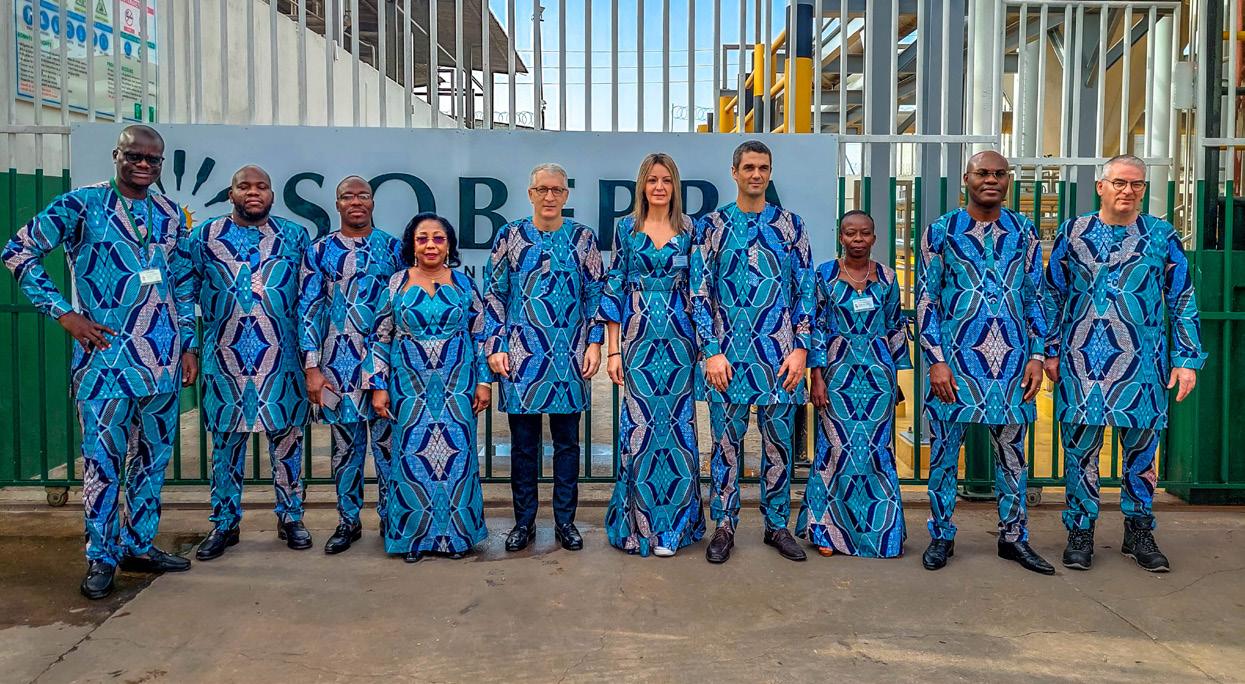
Currently, SOBEBRA is licensed to produce and market global products such as Guinness, as well as a variety of German beers including EKU

Bavaria and Doppel Munich Lager. The company also brews its own beer products such as the famous ‘La Béninoise’ and has even created its own versions of cola (World-Cola) and lemonade (YouZou).
“We are constantly investing to modernise our production facilities on the one hand, and to increase our production capacity on the other.
• Strengthen safety, improve working conditions and promote the upskilling of employees.
• Ensure the quality of products.
• Increase vigilance.
• Promote health and wellness in the community.
• Preserve the environment (water, energy, waste).
• Support entrepreneurship and promote local purchases.
The goal remains the satisfaction of our customers,” Bronne shares.
SOBEBRA, who delivered more than 400 million bottles in Benin in 2022, is investing in a new production line to substantially increase its capacity from 90,000 bottles per hour to 140,000.
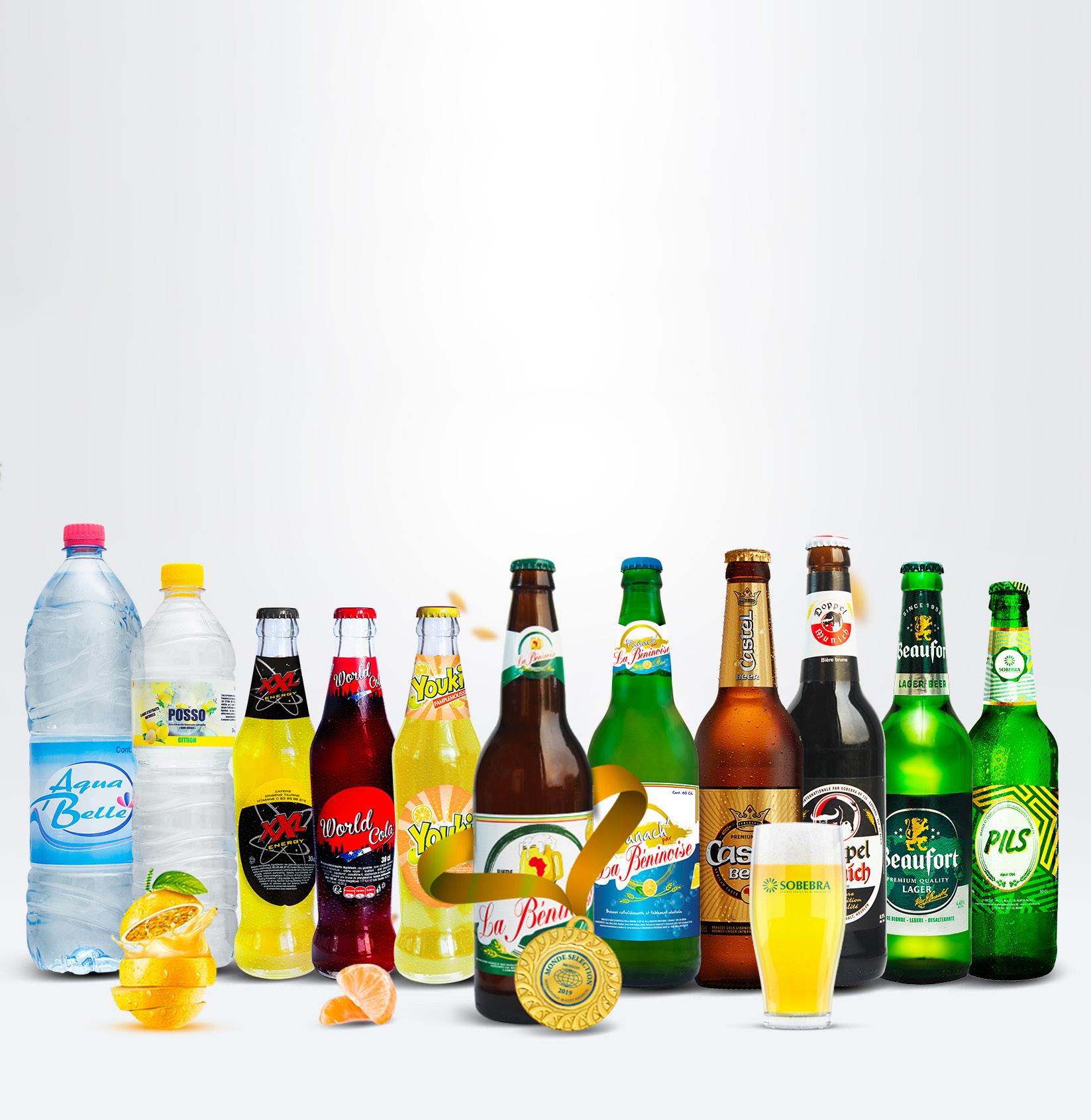
“This investment in a new line corresponds with our willingness to adapt to the changing dynamics of demand, and will be operational by 2024,” reveals Bronne.
SOBEBRA equally invests every year in the skills development of its staff members, more than 99 percent of whom are Beninese.
The highly qualified, professional people at SOBEBRA are truly committed to the success of the company,
who in turn provides employees with a significant amount of training.
“In 2022, we carried out 22,000 hours of training for staff,” Bronne informs us.
Employees at SOBEBRA not only benefit from an annual training plan, but have the acclaim of working for the leading beverage company in Benin.
This also comes with stability, job security, and social well-being, in an attractive environment where friendliness meets efficiency.
Empowering staff and offering them opportunities to be fulfilled in their job is one of three areas of motivation for Bronne, along with ensuring SOBEBRA’s products are continuously available at the required quality, and constantly developing and expanding the business.
“SOBEBRA IS A PROUDLY BENINESE, SOCIALLY AND ENVIRONMENTALLY COMMITTED COMPANY”
– BENJAMIN BRONNE, GENERAL DIRECTOR, SOBEBRA
Just as the employees at SOBEBRA are selected for their expertise, professionalism and geniality, there is likewise a selection and approval procedure that suppliers and service providers go through to be approved by the company.
A supplier evaluation and approval committee studies approval requests and selects new suppliers and service providers, who must demonstrate professionalism, service quality, the ability to meet business demands, and financial strength in order to be accredited.

SOBEBRA, whose key spends include raw materials, packaging, and distribution, has both national suppliers across Benin and Africa,

as well as international suppliers spanning Europe and Asia Pacific.
Complemented by an in-house procurement team, the promotion of local entrepreneurship and support for local businesses is one of the major pillars of the company’s CSR policy.
“Our purchasing policy therefore gives priority to local purchases,” elaborates Bronne.
“In 2022, we worked with more than 300 companies established in Benin, achieving more than CFA30 billion in turnover.”
The company’s authorised distributors, meanwhile, ensure the availability of SOBEBRA products

throughout its network.

“The delivery of our products is outsourced to distributors according to well-defined and precise specifications,” Bronne tells us.
This ties into SOBEBRA’s main priority for the remainder of 2023 and beyond, which is to offer customers quality products and make them available throughout the national territory on a daily basis.

Coffee is synonymous with specific countries around the world, such as Colombia, Brazil, Guatemala, and Ethiopia, but the one that stands out most is Kenya.
It is the mixture of the acidic soil of the Kenyan highlands, combined with the perfect level of rainfall and sunlight, that makes for such excellent growing conditions for coffee plants. Consequently, the country boasts beans that are some of the most sought-after across the globe.
Of course, Kenyans are able to enjoy the rich, aromatic and fullbodied flavour of the coffee locally
from national outlets, as it fuels the dawns of days for the national population. As a drink ingrained in the country’s identity, the retail coffee space is forever growing and evolving to suit the needs of coffee lovers in the region.
“Kenya has always been an exciting market. Kenyans are hardworking people, and the country really is an innovation hub in the region that boasts some of the best fresh produce and coffee in the world - what’s not to like?” begins Priscilla Gathungu, CEO of Java House (Java).
Java opened its first store in 1999 at
Adam’s Arcade in the Kenyan capital of Nairobi, with the original aim of introducing a gourmet coffee drinking culture in the nation. The company’s first outlet was a coffee shop, and the brand later evolved from an American-style diner restaurant to its present-day status as a threeday casual dining concept, which is partially coffee-led.
Now one of the leading coffee brands on the continent, Java has grown its presence to outlets in 14 cities across three countries in East Africa (Kenya, Uganda and Rwanda). This substantial growth has also
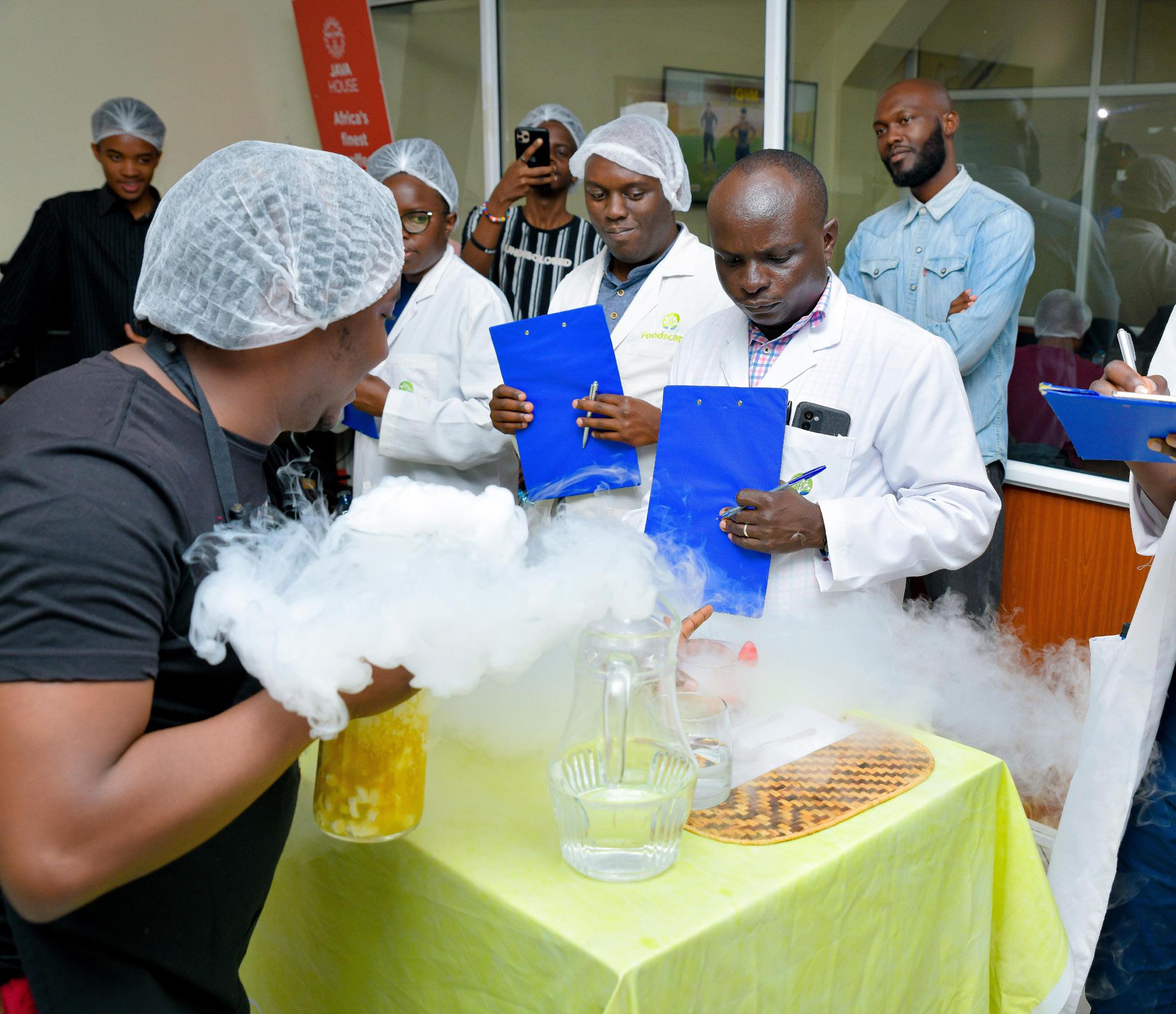

East Africa holds a rich coffee culture. We speak to Priscilla Gathungu, CEO of Java House, about the company at the forefront of the market, brewing better beans and social dining with customers in mind
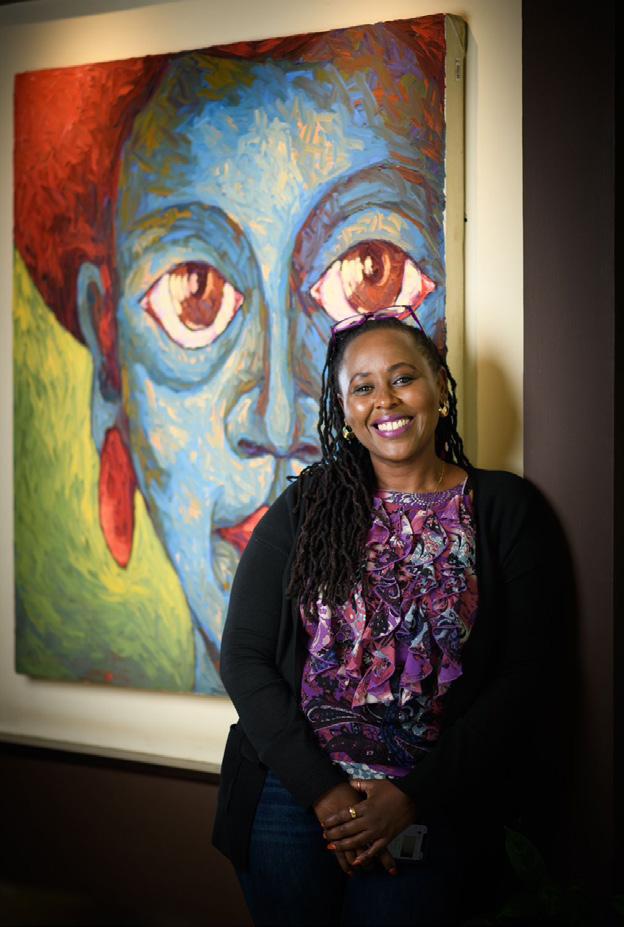

Writer: Marcus Kääpä | Project Manager: Bex Middleton
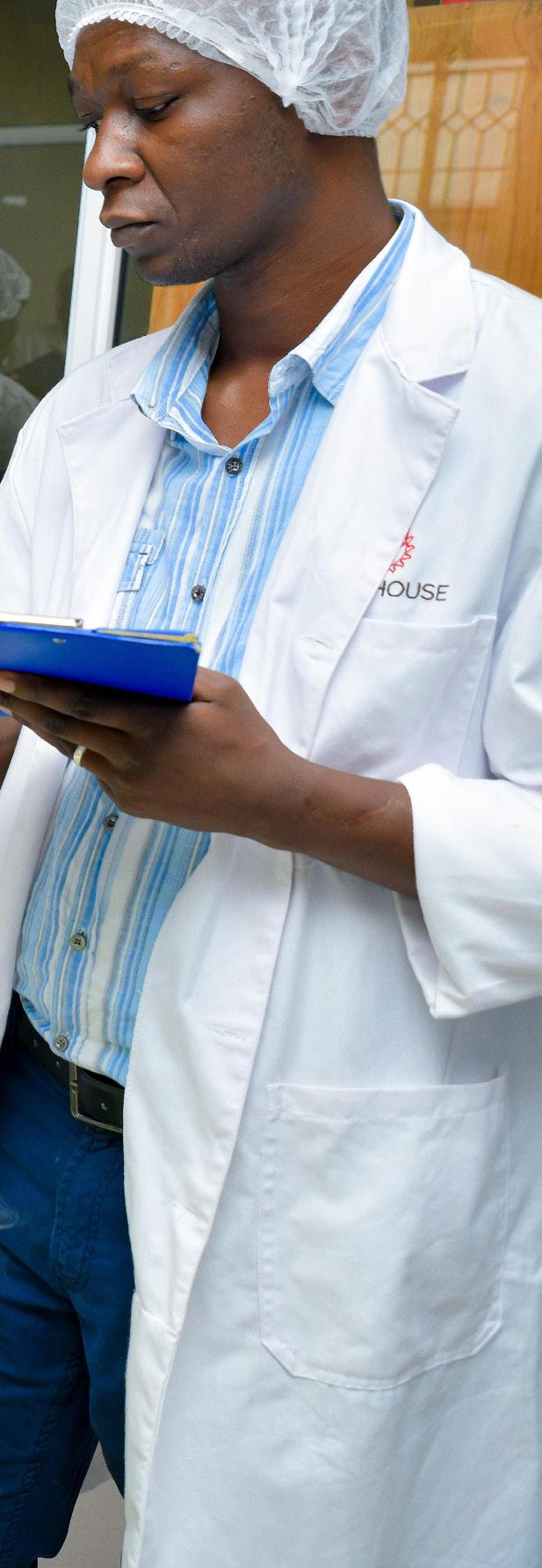
birthed three sister brands: Planet Yoghurt, a healthy, tasty and fun frozen yoghurt store; Kukito, which offers fast-food chicken and chips; and 360 Degrees Pizza, a casual dining restaurant.
“Java really is a home away from home,” Gathungu tells us proudly.

Nairobi Java House (NJH) has been a home away from home for Kenyans since it opened in 1999 with the aim of enabling guests to enjoy authentic export-quality coffee. The company’s humble beginnings laid the foundations of what is today, a home-grown coffee-led restaurant chain and far-reaching African experience. Currently, NJH has 84 restaurants in three countries and across 14 East African towns.
“We have a lot of passionate people working for our business who are constantly looking to meet consumer expectations in a competitive market. Granted we are facing a number of macro issues with climate problems affecting supply, input pressure on cost, suppressed spending power and increased competition. However, we continue to be nimble and agile, innovating and adapting to the changing needs of the consumer while also staying true to our brand to ensure we remain the market leader.”
Gathungu has worked at Java for almost 10 years, and in that time has had first-hand experience in the expansion and change in the company, as well as having worked in its various departments and helped the company maintain its peoplecentric mission.
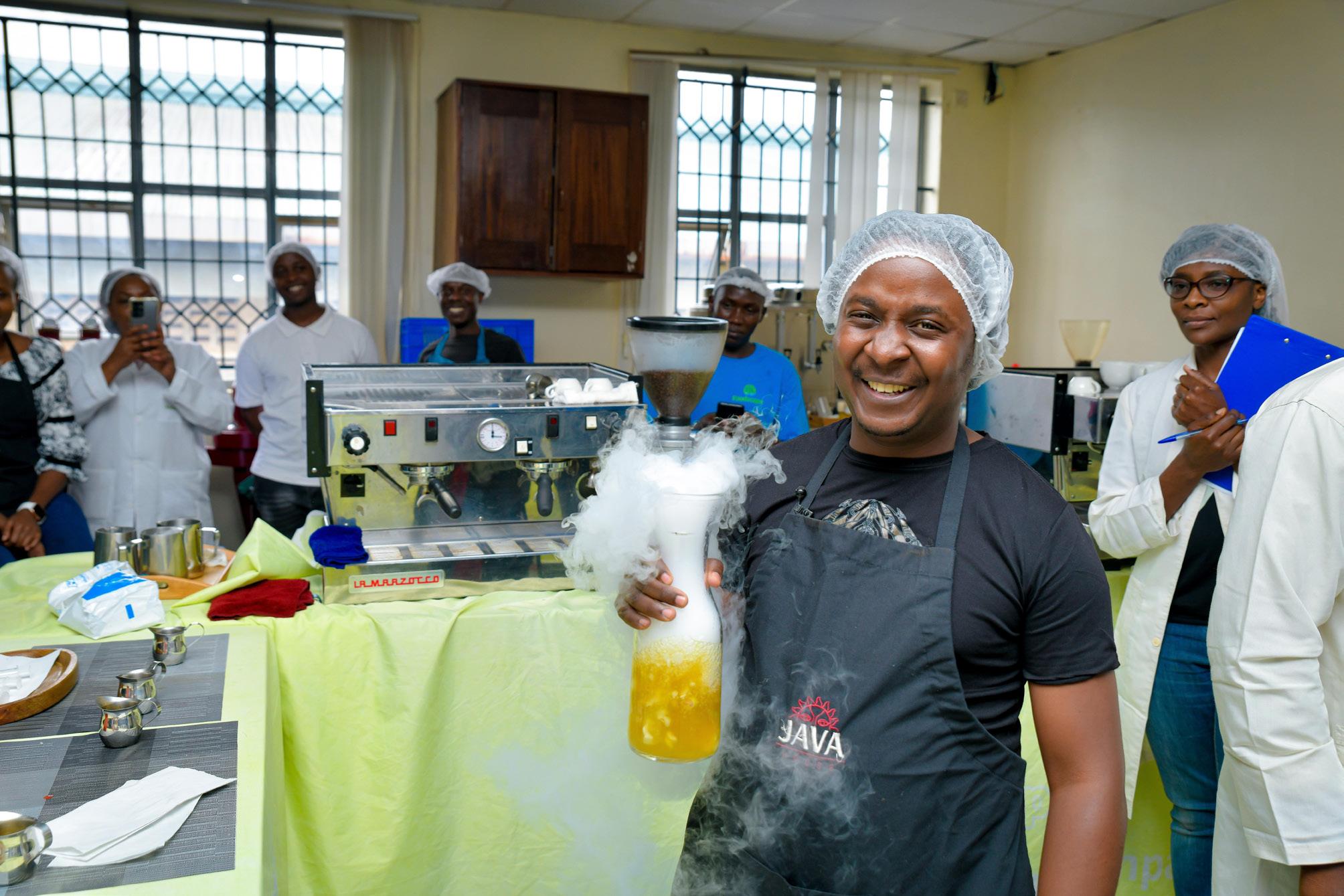
“The beauty of my career at Java is that I have worked in virtually all areas of the company during my
tenure,” she elaborates. “This has allowed me the privilege of not only understanding our business and brands, but also our people, the driving force behind Java.”
Born and raised in Kenya, Gathungu moved to the US to study at college and thereafter remained in America to begin her career. Upon returning home, her interest turned to contributing to a Kenyan home-grown business.
“When Java came calling, I answered,” she says. “In the restaurant business, Java was and remains the crown jewel of the industry. I enjoy this sector because in very few other businesses do you receive instant feedback - good or bad. When we do a good job or mess up, our guests are quick to be our biggest cheerleaders or our harshest critics. We love them!
“I am passionate about this space because no day is the same, and we drive the business with a very entrepreneurial spirit. We are fortunate to have supportive
We are a leading dairy and confectionery manufacturing company based in Kenya. We have built a reputation for delivering high-quality products and consistent innovation. The company has expanded into the wider African region, operating in Uganda and Tanzania while trading with Rwanda, Burundi, Somalia, Southern Sudan, and Congo.
Thisinnovationexpandsourcurrentofferingtoourcustomers, encouragingthemtoexploreadifferentkindofproduct.
Our focus has been around innovation, ensuring our products adhere strictly to the highest quality standards and producing a wide variety of products. This has propelled the company to generate demand in new markets where we have expanded our operations across East and central Africa.
dairyland.co.ke

We purposed to develop an alternative premium product for customers keen to enjoy a dairy free ice cream without compromising on quality, taste and product affordability.

Flavors available:

shareholders who essentially allow us to run the business unconstrained.” This level of passion and energy

Under the auspices of the Java Foundation, the company feeds 1,000 school children daily by partnering with the Food for Education programme.
Food for Education is a non-profit organisation (NGO) working for children in the public school system to ensure they are properly nourished and focused on their learning and development. Food for Education has served up six million meals to date. The NGO currently has central kitchens in Nairobi, Kiambu and Mombasa, serving 33,000 children each day.
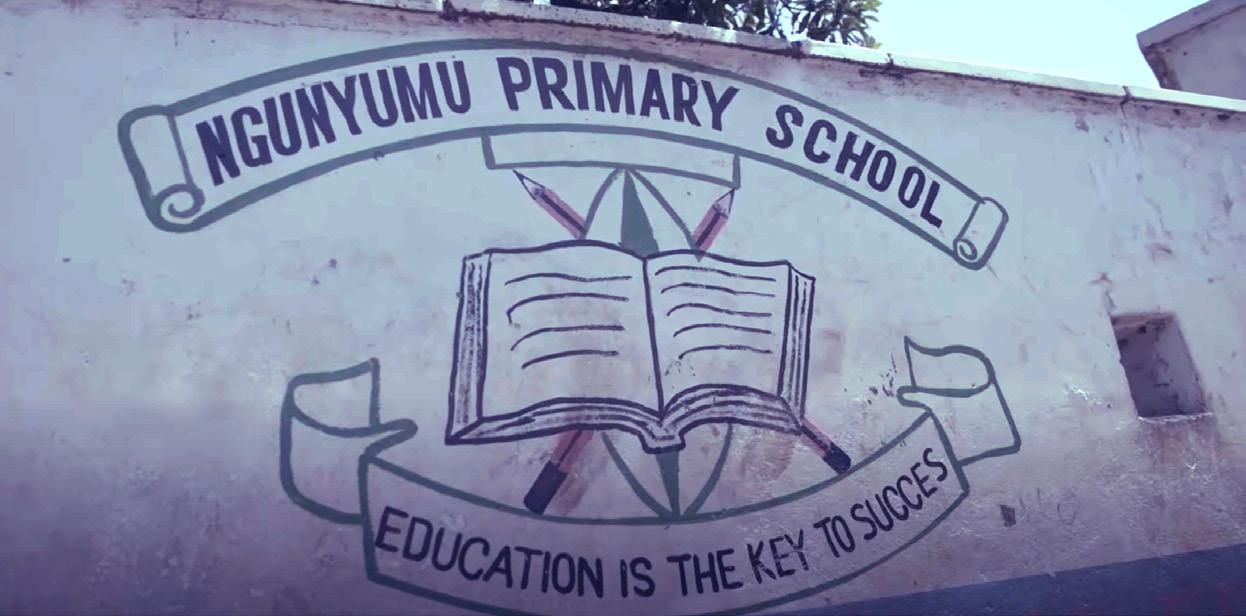
flows through Java and has been a significant contributor to the company’s expansive growth.
The Java restaurant brand is the flagship of the company and its most famous offering, with 72 restaurants across the East Africa region, yet with its alternative offerings such as Planet Yogurt, the company sees a total footprint of 85 sites.
Java’s retail focus has also made
a substantial impact in Kenya and beyond. The company’s coffee products are currently present in many homes, alongside other items such as cookies and breakfast granola. Subsequently, Java continues to innovate into new segments in the coffee and retail space with a desire to maintain its market leading position.
“You can’t talk about coffee in East Africa without talking about Java. We
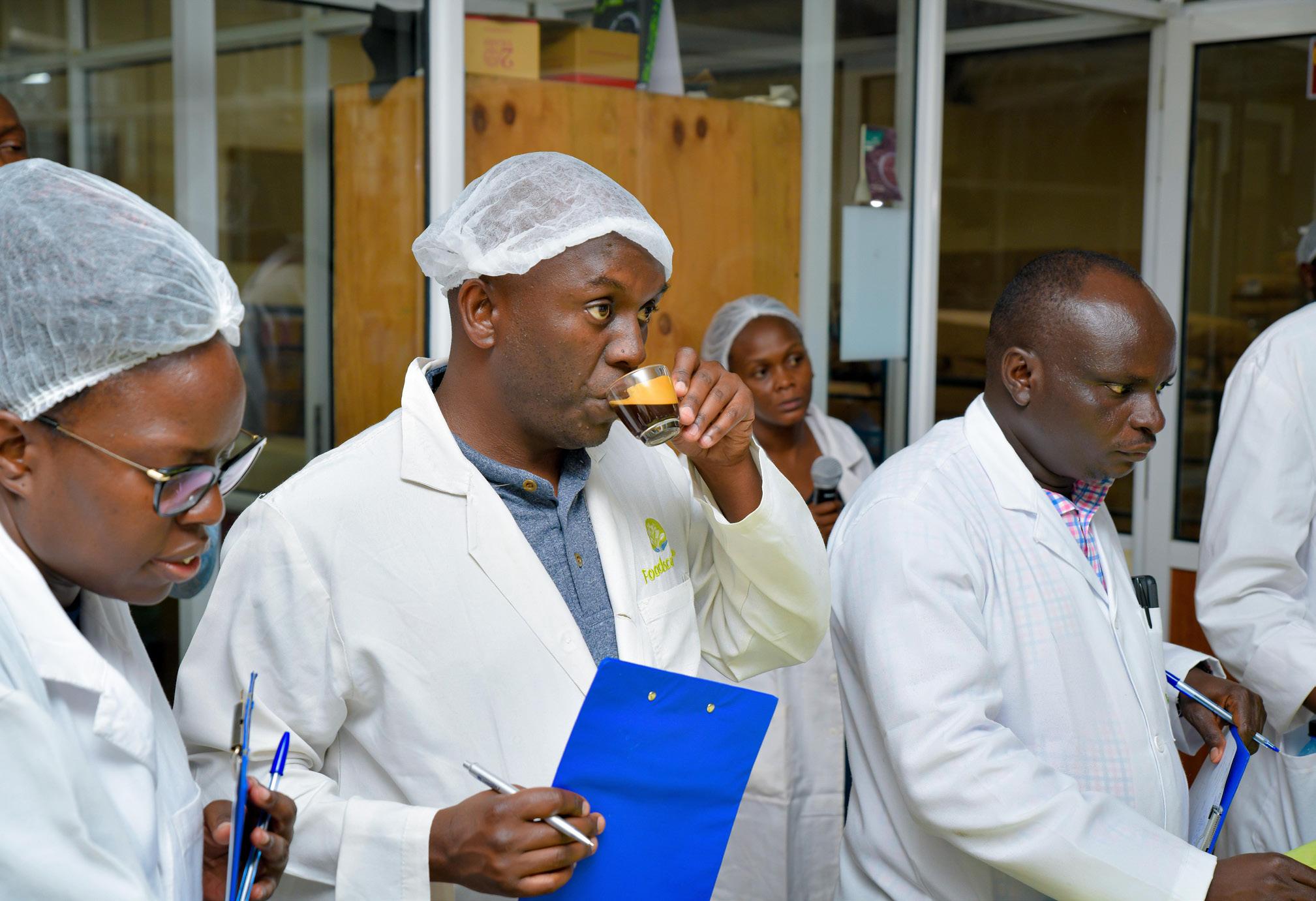
entered this market when drinking coffee wasn’t as much of a thing, and now coffee is part of many dating and connecting experiences across the region,” Gathungu explains.
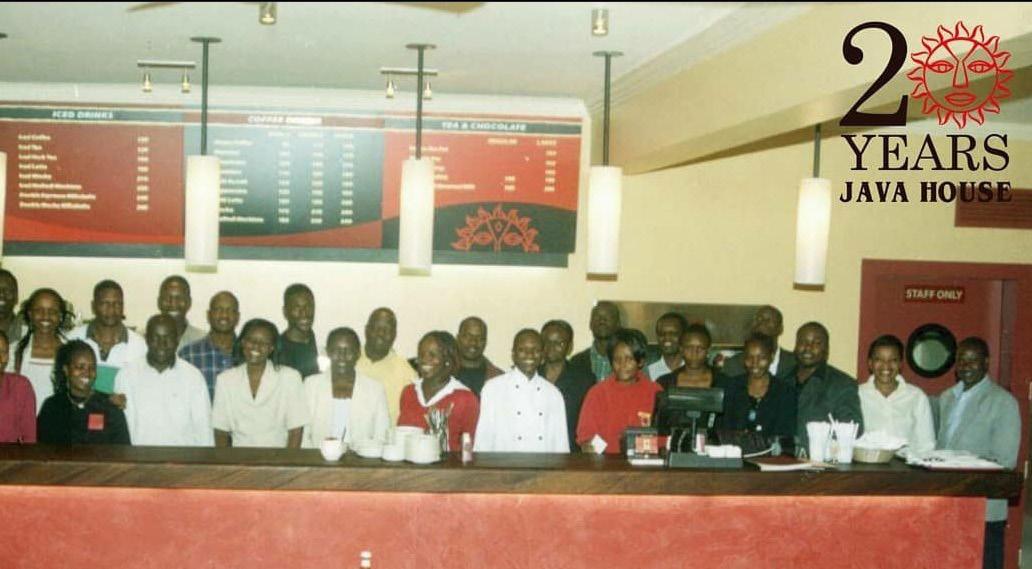
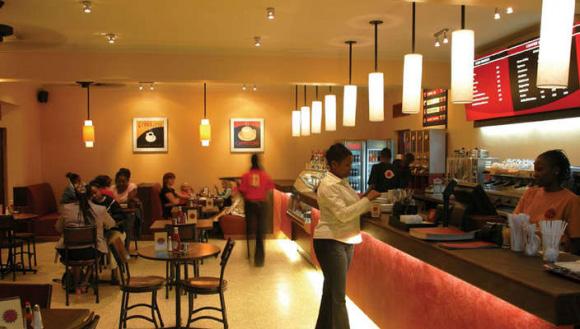
On top of this, Java operates Foodscape, the manufacturing arm of the business. Through Foodscape, the company roasts all its own coffee - approximately 25 tonnes each month – as well as baking all of its own bread and cakes, while also producing marinated meats and vegetable products. Foodscape acts as Java’s engine that, fuelled by its dedicated workforce, pushes the company and its many branches forwards.
In addition, Java boasts a B2B segment that serves a growing number of corporate spaces and events. Each of these offerings and markets continue to be an expression of the company’s mission ‘to share the Java experience with the rest of the world’ powered by an employee base of 2,100 people.




We, Printrite Displays Ltd, offer a wide range of signage, branding and advertising. Using our skilled personnel and state of the art machinery coupled with up to date technology, we ensure top quality to give your clients the best first impression of you.
Priscilla Gathungu, CEO: “Our staff are friendly, attentive to detail, hardworking, compassionate and well trained to ensure the best all rounded guest experience at any of our stores. We encourage internal growth amongst all our esteemed staff members with a key focus on internal training, promotions, and consistent feedback to ensure that our employees are able to handle issues on the go, all while having fun.
“Being a key performance indicator (KPI) based company, our staff are consistently incentivised, including rewards for meeting top targets, both quantitative and qualitative. We have a keen focus on African hospitality and likewise have great rewards. We take pride in being an employer of choice by ensuring we treat our staff fairly and provide them with holistic compensation that includes health insurance and pensions.”
Java continues to follow market trends and people’s preferences, continually evolving with the customer in mind. A part of this involves honing its focus on different formats regarding the easy and convenient coffee experience for customers.
“In light of this, we are innovating in areas such as express and grab-and-go products that fit our consumers’ need for good and convenient coffee on the go, and looking into areas such as Eastleigh, our newest location,” Gathungu continues. “We are also expanding into more locations outside of Nairobi, making this a truly Kenyan brand. We are constantly getting feedback about our menu! More variety, more sharing options, more innovation.
“The Java management are invested! Java Pizza is the result of one of those conversations around any opportunity areas we are missing, and we are continually acting on this feedback and conversation to keep the brand growing.”
According to Gathungu, with the devolution of public services in Kenya, there has been re-energised urbanisation efforts across the country involving more people moving to and investing in other towns and areas outside the major cities. This has seen an increased appetite for hospitality brands such as Java with increased travel, employment, the relocation of people across the country. This desire for quality and convenient coffee and dining experiences is no longer reserved for city dwellers, and
increased technological advancement means that consumers are connected to current food and beverage trends globally and want to experience it as well.
“Our consumer is also evolving,” she continues. “Physical meetings and connecting moments have changed. While in the past food was often had around the table, now it’s also enjoyed on the move. There is a demand for more convenience which means we’ve had to adapt and continue to evolve our traditional casual dining channels to fit into consumer lifestyles.”
Part of this adaptation is Java’s acknowledgement of the importance of technology and its continual advancement; keeping up with the latest technological and digital tools is paramount to securing growth into the future.
“The last couple of years have seen us evolve into a more data driven organisation,” Gathungu comments. “We’ve made significant investments in technology that will help us better understand our consumers and increase our internal efficiencies to help us cater to their needs, while making us more savvy and more profitable as a business in the long run.
“Currently, we run Microsoft Dynamics 365 for Finance and Operations with supply chain management regarding our enterprise resource planning (ERP), which covers the core financials, budgeting, asset management, inventory and production (manufacturing) and purchasing modules.”
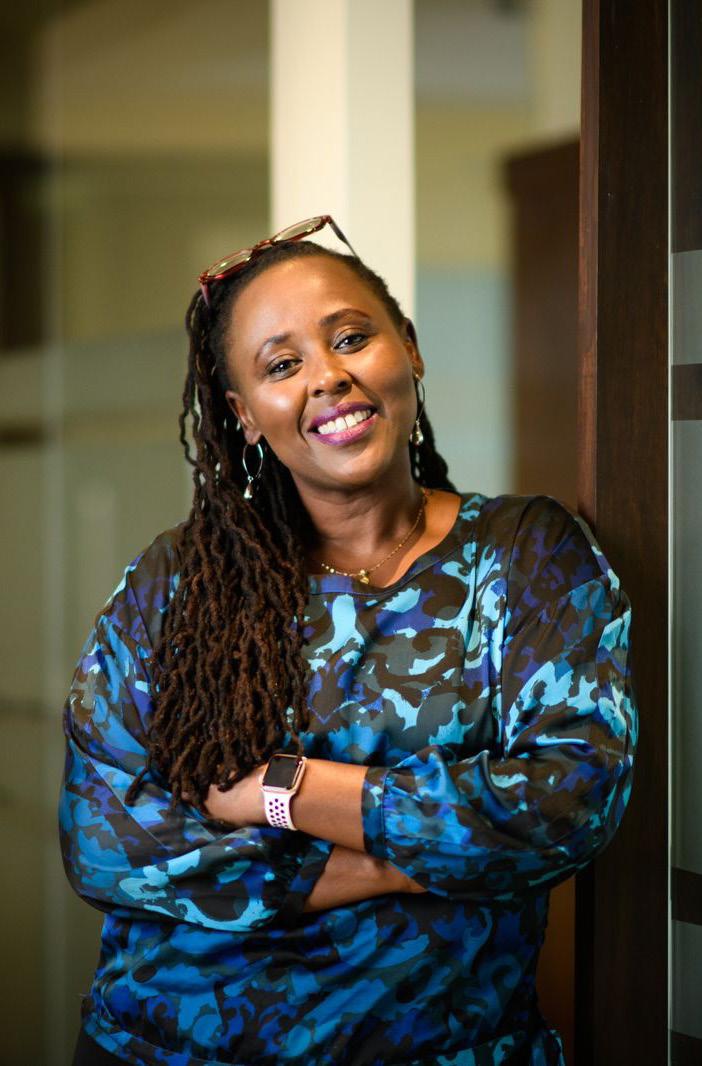
“I AM PASSIONATE ABOUT THIS SPACE BECAUSE NO DAY IS THE SAME, AND WE DRIVE THE BUSINESS WITH A VERY ENTREPRENEURIAL SPIRIT”
– PRISCILLA GATHUNGU, CEO, JAVA HOUSE
This system enables Java to wholly manage its business, with tight integration with its selling systems, such as the point of sale at the restaurant, B2B and external entities like revenue authorities. This system is a cloud based, software as a service (SaaS) tool that is highly optimised for Java’s fast-moving consumer goods (FMCG) and hospitality use while enabling complex functions required for the company’s operations.
Other systems Java uses for its digital transformation include data analytics tools, QR codes, net promoter score (NPS) surveys, digital media and its newly launched Loyalty App, the latter of which provides frequent customers with additional and accumulative benefits.
“I’d say our biggest aspiration is to build an agile, profitable business that engages responsibly with its community, is well known, respected
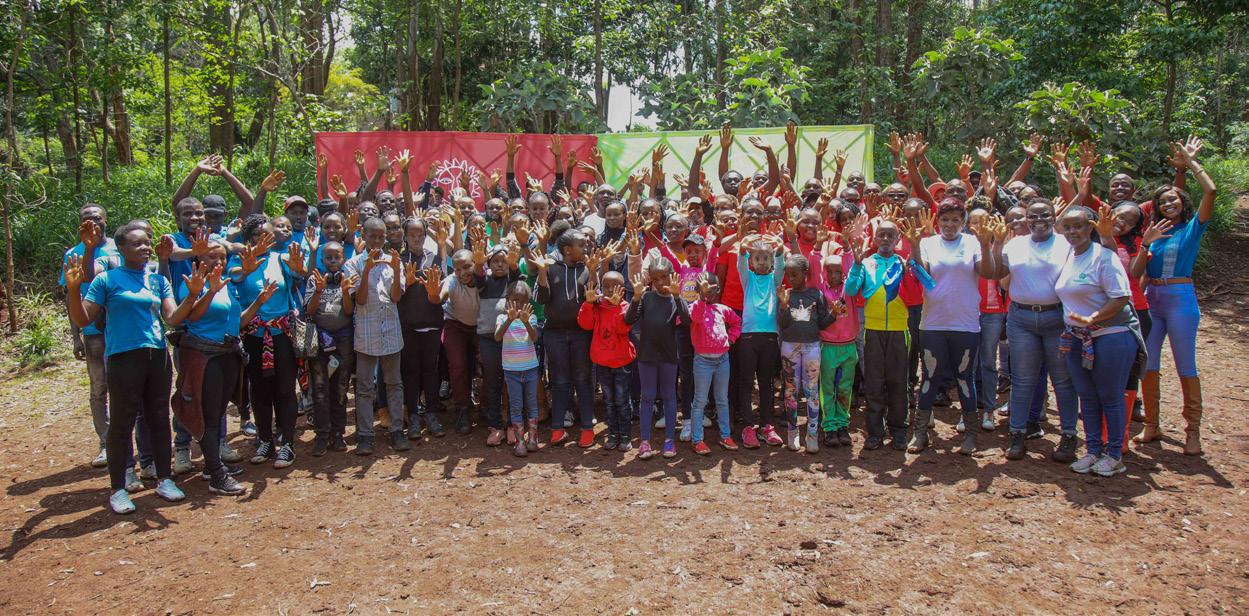
and loved for its hospitality, and provides good food and an unrivalled customer experience. In short, to be the undisputed market leader,” says Gathungu.
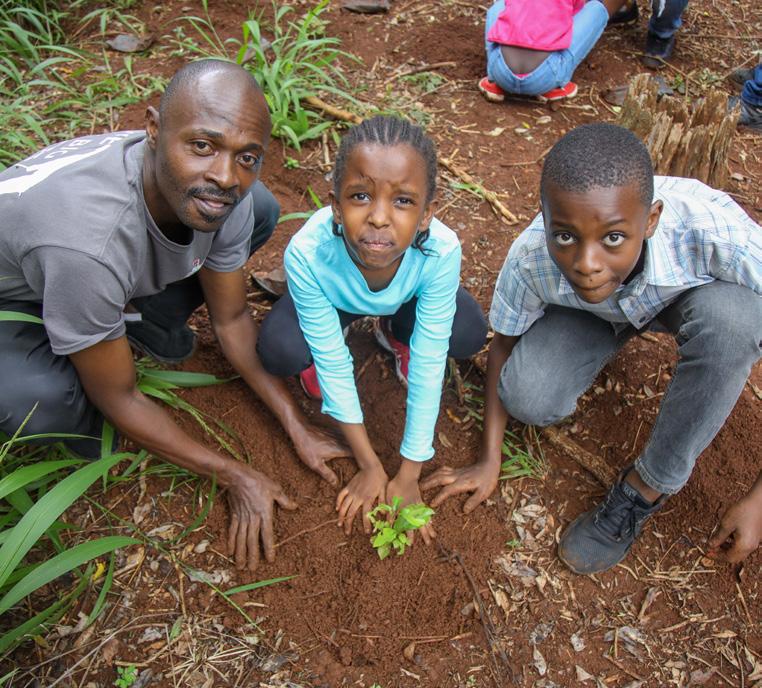
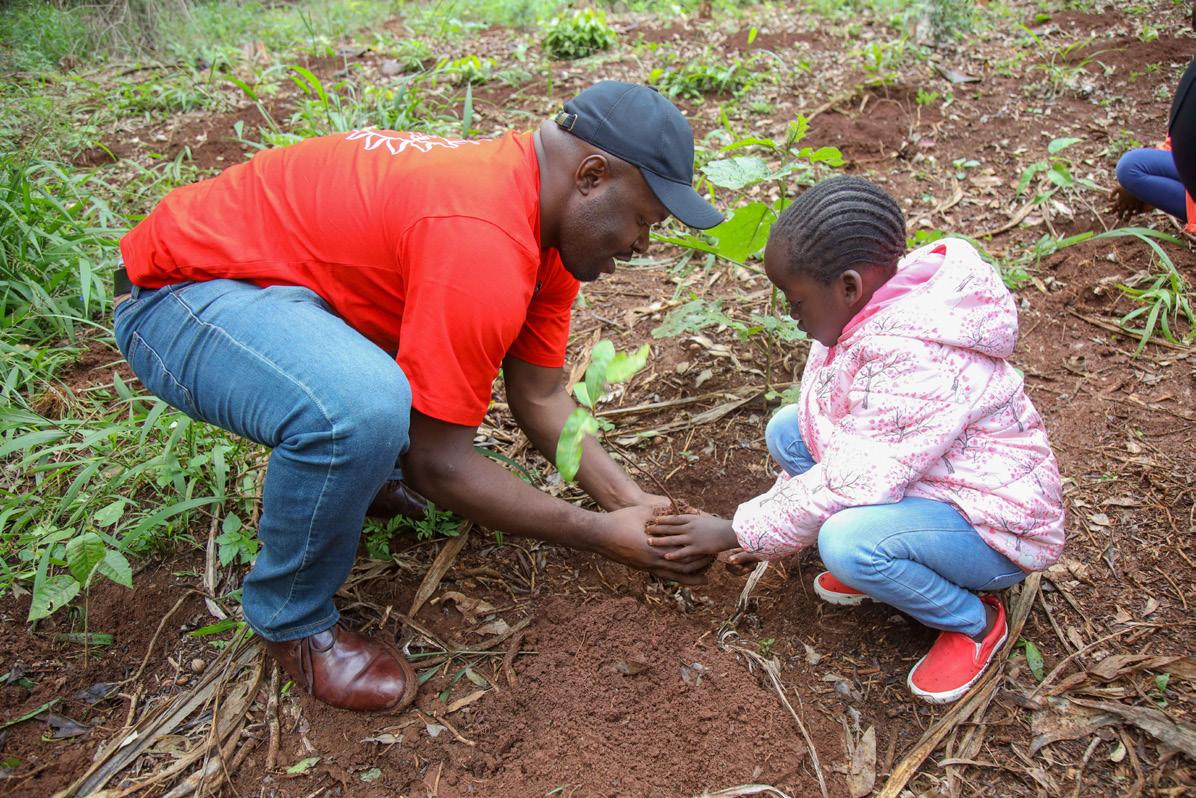
To this end, Java’s focus has always been and will always be people. Concentrating on individual needs, the company is able to make every customer feel at home when they visit a Java outlet, and ensure that each one leaves full, fuelled and feeling better to start or end their day.
“We want our consumers to know that when they come to Java, they can have it their way,” Gathungu adds. “Coffee with a little butter? That’s okay. A little extra chilli in your chicken curry? That’s fine too. We are in business to create a great experience for our customers, and we hope that this intention comes through in all that we are doing across all our brands.
“We want people to begin their day with us over a business breakfast with Java coffee, enjoy chicken and chips for lunch at Kukito, some frozen yoghurt at Planet Yogurt to give that extra kick in the afternoon, and to top it all off, a glass of wine with friends at the end of a long day at 360 Degrees Pizza.”
www.javahouseafrica.com

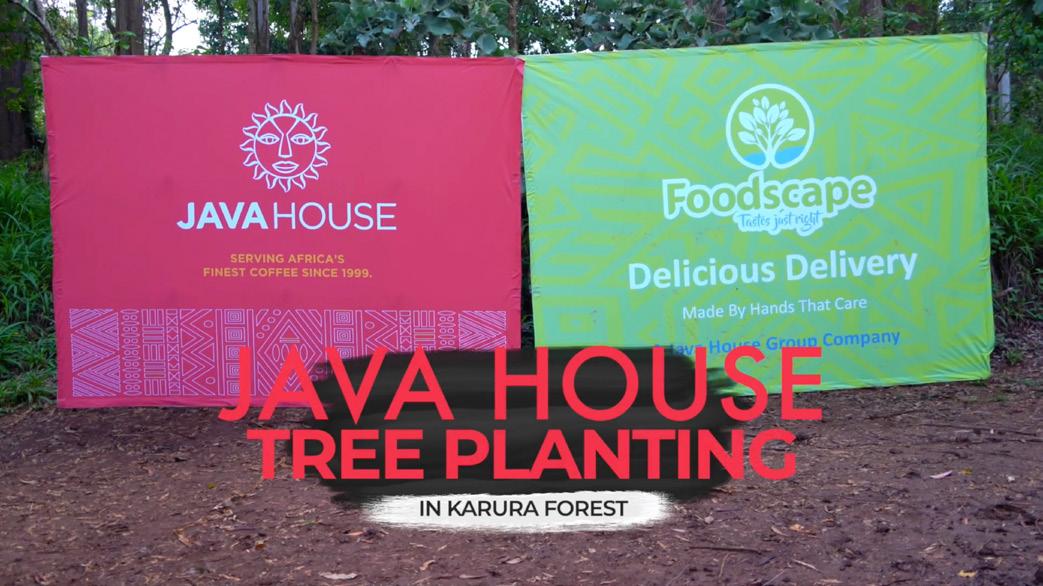



Promasidor is a food and beverage giant with operations spanning 30 countries across the African continent. We take a closer look at its East African footprint, with Promasidor Kenya
Writer: Phoebe Harper | Project Manager: Bex Middleton

Over the past 30 years, Promasidor has established itself as a leading provider of quality food and beverage products by delivering quality nourishment to over 850 million people. With an operational presence in over 30 African countries, the enterprise boasts an esteemed portfolio of brands encompassing a diverse range of products – from refreshing beverages, to powdered dairy products and culinary food enhancers.

QUALITY – Promasidor understands that its customers demand and deserve quality products, and it must fulfil its promise to provide products and services of consistently high quality.

VALUES – Promasidor recognises the need to demonstrate the highest standards of corporate governance and corporate and social responsibility (CSR) throughout the group. It has clear obligations to consumers, suppliers, its employees and to the communities in which it operates. These obligations are respect, integrity and openness.
PROFITABILITY – Promasidor will sell products where it can be profitable. If circumstances within the operating environment limit the potential to generate profits, the company cannot invest, grow, motivate, develop and reward its people and stakeholders.
Regardless of its offering, Promasidor upholds an unrelenting commitment to affordability, without compromising on quality. Since 1988, Promasidor Kenya has continued to operate as part of the wider group, delivering on the brand’s promise throughout East Africa.
Promasidor came into being as the brainchild of Robert Rose, who, in 1957, left the UK behind to pursue a new life in Africa. After 20 years of working as Chairman of Allied Lyons Africa, Rose developed a thorough knowledge of the unique conditions of the African food industry and soon identified a glaring gap in the market that he sought to fill. His dream was centred on the provision of a highly nutritious and essential product that many of us consume on a daily basis and often take for granted – milk.
Thankfully, due to the rapid advancement of technological developments at the time, manufactured milk powders had become a possibility, which Rose


sought to leverage and distribute to as many people across Africa as he could. And so, in 1979, Promasidor began selling the milk powder sachets produced by the Cowbell brand in the Democratic Republic of the Congo (DRC), which at the time was still known as Zaire.
Crucially, the product was both affordable and accessible, with a much longer shelf life than traditional milk. Its continued success has allowed Promasidor to further evolve and grow over the years, branching into other countries and accumulating more quality brands along the way.
Although Promasidor began by selling into the DRC, its headquarters and key market remain in Nigeria, where it occupies a position at the forefront of reactivating the country’s dairy industry.
As a company that is proud of its
African heritage, Promasidor is committed to contributing to the health and well-being of its regions of operation through its quality food and beverage products, acting as a shining example of what can be achieved on the continent.
Promasidor specialises in manufacturing, marketing and selling unique brands that bring joy to millions of African consumers every single day. This includes its flagship brand Cowbell, the powdered milk product that was the first item to be distributed by Promasidor throughout Africa. By providing an essentially nutritious product in an easily transportable format that guarantees prolonged freshness, Cowbell, and other such brands including Loya Milk, Miksi, and Mixwell, are instrumental in delivering accessible and affordable healthy products.
This dairy range is complemented by non-dairy products to accommodate a wider range of consumers, as well as an array of beverages that are divided into
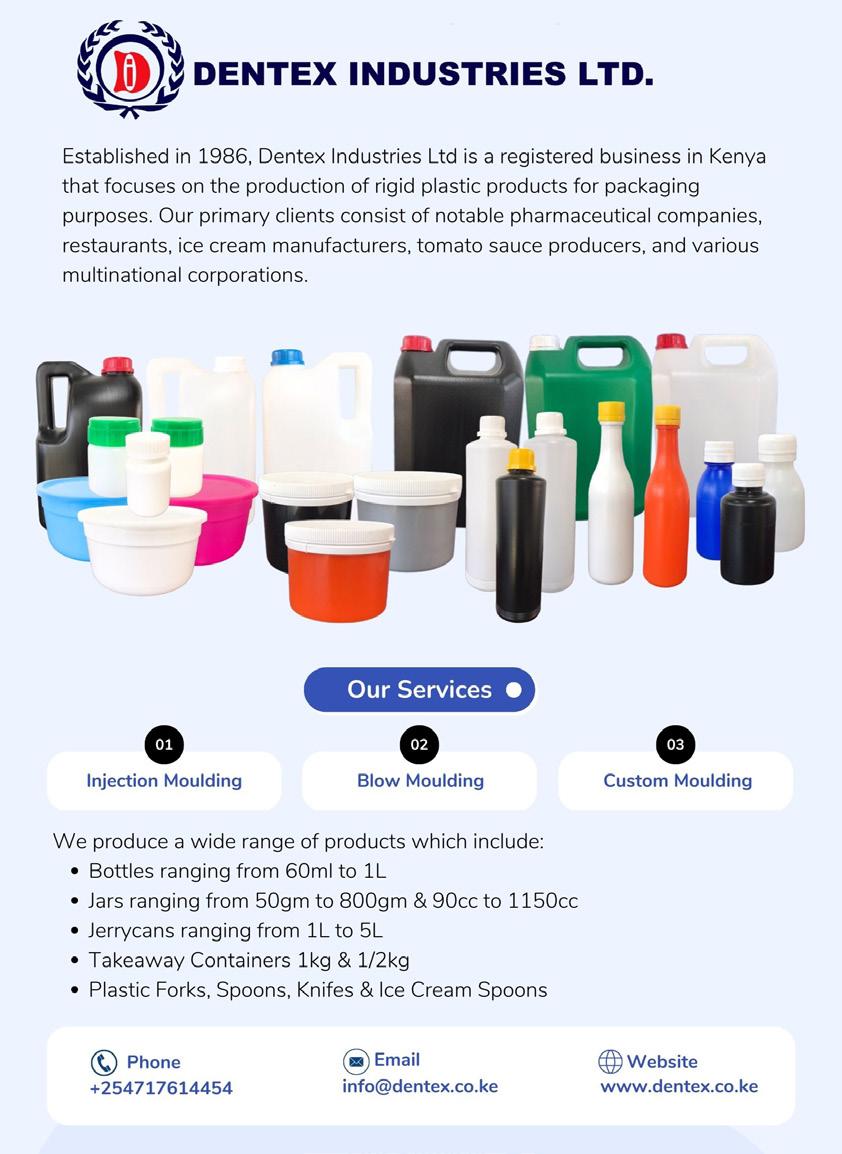

four main product segments; Drink-OPop, Amila soft drinks, Top Tea classic and flavoured tea, Proma Café coffee and Twisco chocolate drinks.
In the food realm, Promasidor’s range of cereals caters to infants and families alike, while its culinary range enriches meals with aroma, colour and taste – whether through the ONGA selection of savoury seasonings, or Sossi’s high-protein soybean chunks, plus many more.
The company’s people-centric stance applies not just to a range of products geared towards quality and affordability, but also Promasidor’s status as an employer that values its staff and recognises the contributions they make. This is best reflected by the company’s official recognition at the Nigerian Employers’ Consultative Association (NECA) Annual Employers Excellence in Awards in 2021.
Both internally, and externally, Promasidor adheres firmly to the belief that health, equals wealth.
‘WE ARE AN AFRICAN COMPANY, PROUD OF OUR HERITAGE AND TOTALLY COMMITTED TO THE CONTINENT’ - PROMASIDOR
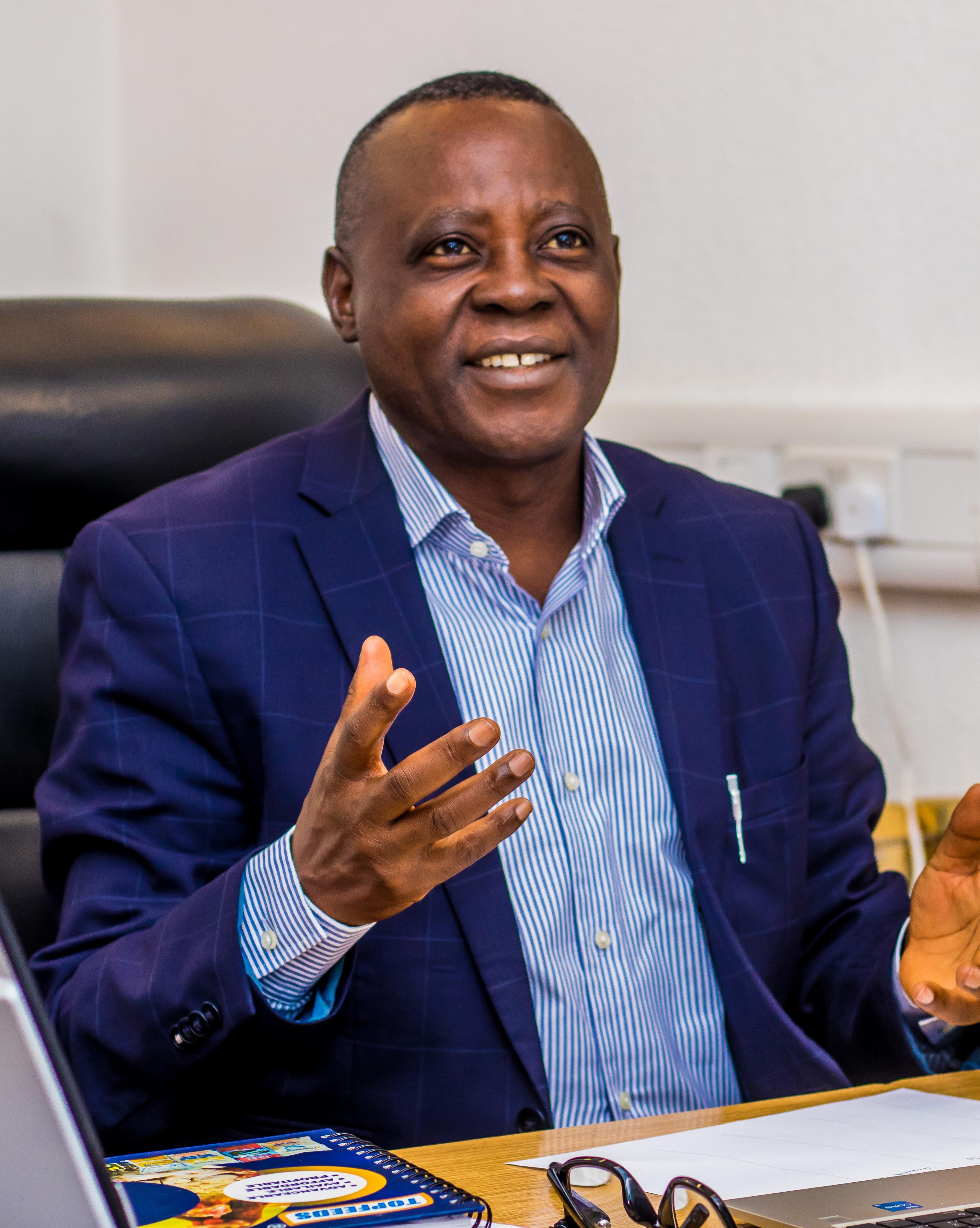

General Manager, Sales & Marketing, Austin Pam Dalyop, tells us how Premier Feed Mills has maintained its position as the market leader in the animal feed industry and overcome political and socio-economic challenges
Writer: Lucy Pilgrim | Project Manager: Bex Middleton
stablished in 1968, TOPFEEDS brands has been a mainstay of the Nigerian food and crop industry for over 50 years. Based in Nigeria’s Delta region since its inception, TOPFEEDS brands has become an industry leader in the poultry feed sector, as well as the overall African feed landscape.

“TOPFEEDS is one of the oldest brands in the country and it has withstood all the shocks the Nigerian economy has gone through in previous decades, still spreading and sustaining the industry as the farmers’ brand,” introduces Dalyop.
Premier Feed Mills (PFM) acquired TOPFEEDS in 2008 and moved the production sites to Ibadan, Oyo state and Calabar, and Cross River State in subsequent years thereafter. More recently, another plant has been built in Kaduna State, whilst a Kano plant is a leased facility which brings to its fold four production facilities across
Nigeria.
PFM’s influence spans across the country, as the company operates a fully automated feed factory with 260,000 tonnes of animal feed produced per year in its Ibadan facility. Meanwhile, the Calabar division has an impressive annual capacity of 240,000 tonnes, with the ability to bag three different types of feeds simultaneously.
PFM is continuously on the front foot of expansion, evidenced by the introduction of Aqua Feed as the counterpart to its poultry business. Currently, the implementation of the Aqua Feed line extends across two regions, including Calabar and Ibadan. Thus, PFM stands as one of the largest producers of Aqua Feed in sub-Saharan Africa. The expansion into Aqua Feed has been a successful venture, due to its ability to lessen the dependency on imports and strengthen exports to the wider West African region.

When quality is what you want,
is your reliable partner for:
• Amino acid
- Lysine
- Methionine
- Thrionine
- Tryptophan
- Valine
- Arginine
• Di Calcium Phosphate
• Mycotoxin binders

• Enzymes
- NSP and Phytase, Cock Tail
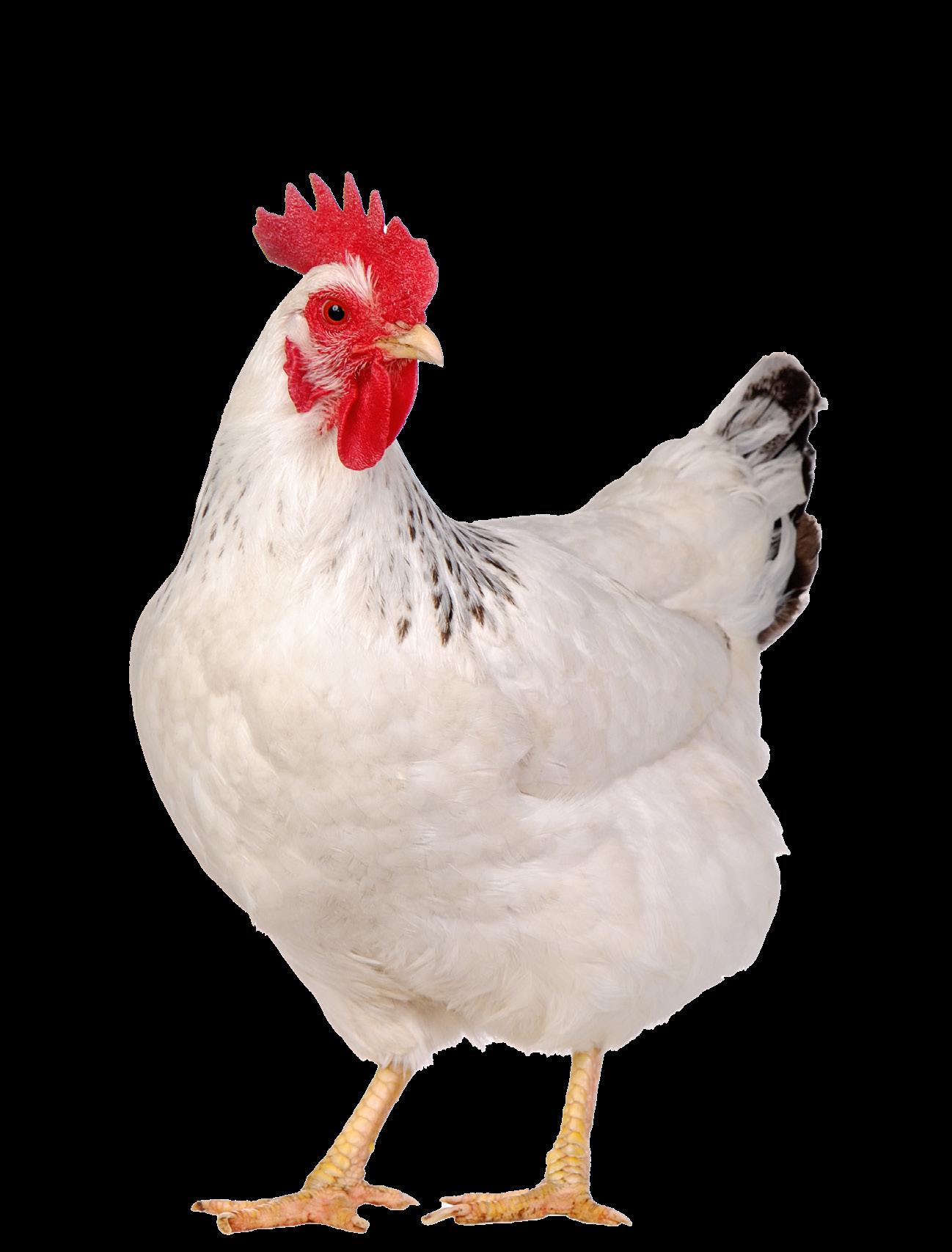
• Pellet binders
• Yolk colourant - red/yellow
• Salmonella killer
• Acidifier
• Single vitamins/minerals
• Mould Inhibitor
• Anticoccidials
Probiotics
A NUTRITIONAL
• ANIMAL PROTEINS





• GUT HEALTH OPTIMIZERS
• AMINO ACIDS (ALL ESSENTIAL AMINO ACID)
• SINGLE VITAMINS
• MINERALS AND THEIR SALTS
• TOXIN BINDERS
• ENZYMES - NSP/COCKTAILS
• MANAN OLIGOSACCHARIDES
• FAT EMULCIFIERS
• ACIDIFIERS
• ANTIOXIDANTS
• CAROTENOIDS (COLOURANTS)
• MOULD INHIBITORS
• FISHMEAL


• COCCIDIOSTATS
• MINERAL CHELATES
• PROBIOTICS
• PELET BINDERS
• ORGANIC ACIDS THEIR SALTS IN BLENDS
• MCP, DCP AND TCP
• BI-CARBONATES
• SWEETENERS
• FLAVOURANTS
• ATTRACTANTS
B HEALTH
• APIS
• LIVER TONIC
• GUT HEALTH STABILIZERS
• POWDERS AND LIQUID
C PUBLIC HEALTH
• ODOUR CONTROL
• RODENTICIDES
• DISINFECTANTS
ANTIBIOTIC-FREE PRODUCTS (NUTRITION BASED HEALTH)
• EW NUTRITION RANGE OF PRODUCTS
• PRO-BIOTICS
• PRE-BIOTICS
• PHYTOGENICS
...Adapting global nutritional solutions to local environment towards maximum efficiency and profit.
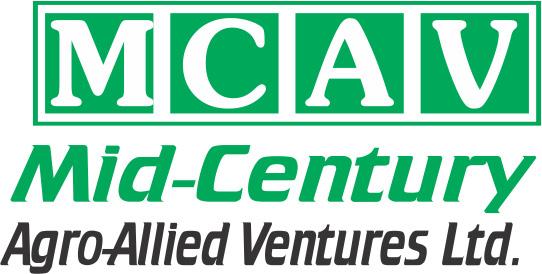

B.i.o. Tox®
TechnoZyme
Multi C
E.c.o.Trace®
TechnoSpore®
Hepatron®
TechnoMos®
Lipolyte
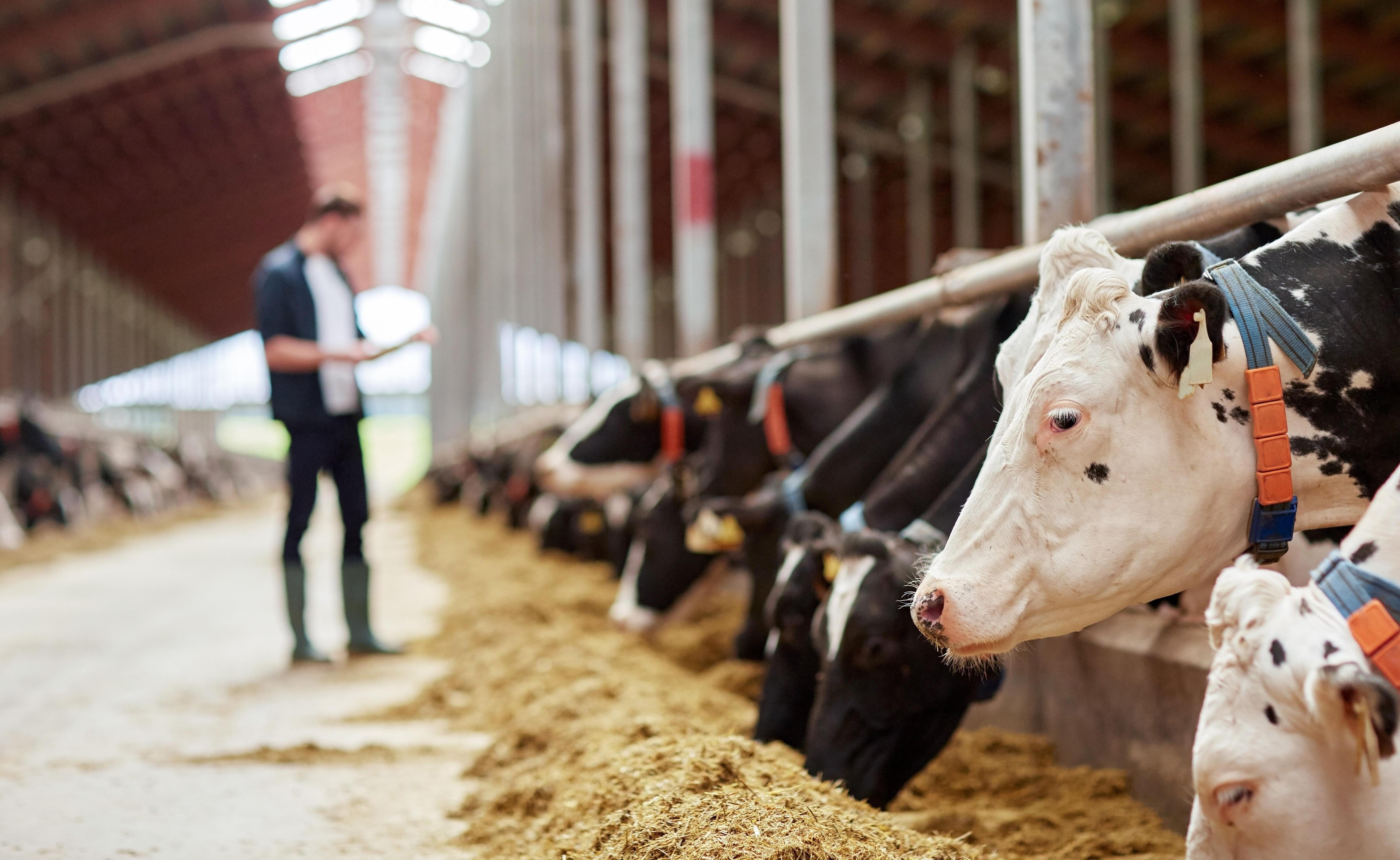
RumiPro®Chol
B.i.o. Tox®
TechnoZyme
Multi C
E.c.o.Trace®
TechnoSpore®
Hepatron®
TechnoMos®
Lipolyte


PLAN - Based on a budget and sales forecast, PFM makes demand planning based on the supply projections of the ingredient’s requirement.
PROCURE - As per production demand to keep raw material and packaging material available without running out of stock.
STORE - Receive the ingredients from the supplier and store in a safe facility without any loss and issue the same to production as per its requirement with inventory management.
MAKE - PFM will ask production to produce as per sales demand by telling them what to produce and the quantity required.
DELIVER - The sales order is processed by the supply chain and delivered to the customer as per their order within 24 hours.
Elsewhere, PFM also provides other large ruminant feeds that are specialised depending on the required animal. Consequently, the company can provide feed to a range of animals, including swine, cattle and horses, further diversifying its portfolio and growing its capabilities to produce all animal husbandry nutrition.
PFM is a subsidiary of Flour Mills of Nigeria (FMN Plc). As a leading manufacturer of animal feed in Africa, the company is a supportive pillar of FMN Plc’s brand portfolio.

“FMN is our parent company and it engages in, Wheat milling, oil milling, sugar refining, packaging (sacks) materials, fertilisers and the production of other complimentary products like Pasta, noodles etc. PFM sources some of its by-products like wheat bran and other materials, which are not considered as waste materials, but as food for production.”
With this synergy, TOPFEEDS brands’ quality is guaranteed to meet the farmers’ needs of world-class feeds and achieve their desired daily nutritional requirement to produce good body weight and daily egg production. As such, the brand’s mission is to be “best in class for cost per gain”.
“Through the support of FMN Plc, TOPFEEDS brands have remained strong and one of our strengths is the use of local materials in the feed recipe, which results in the delivery of
superior quality of service to farmers, whilst making the products available to them. Therefore, we make sure we deliver the right standard to our farmers,” Dalyop adds.
To engage with its growers, PFM has a strategic programme known as Go-to-Market (GTM) activities, which allows the company to liaise with farmers. “This engagement takes us into the farms in the local areas to communicate and share with farmers the best ways to use TOPFEEDS brands, basic farm management practice, bio-security management and ways to make their business more profitable,” explains Dalyop.
The company’s Technology, Innovation & Quality department handles the technical aspect of the GTM programme, and has differentiated PFM from other brands in the market.
“When it comes to farmers’ engagement, standard of quality ingredients, raw materials and more, TOPFEEDS brands pay more attention to detail.”
In conjunction with ingredients, a guarantee of the correct storage facility is essential as evidenced in the use of our silos that have a highly technical procedure to ensure only the right products are received and processed in the mill.
Furthermore, the PFM workforce is also an integral cog in the machine. The company has a staff strength of approximately 1,300 direct employees, and 1,000 indirect, who are expertly trained and dedicated to their responsibilities.
“PFM’S PATRONAGE OF LOCAL MAIZE FARMERS PROVIDES EMPLOYMENT FOR OVER 200,000 NIGERIAN SMALL FARMERS”
– AUSTIN DALYOP, GENERAL MANAGER SALES AND MARKETING, PREMIER FEED MILLS

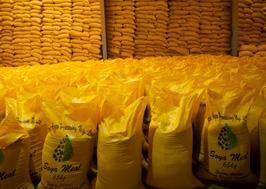

With its cutting-edge oil mill, solvent extraction, and oil refinery units, Ilera Agro Processing Nig. Ltd, is a premier Agro Processing company in Northern Nigeria. Shea nuts, soy beans, and other oil seeds are processed by the company to create products of export-quality. Ilera Agro is dedicated to offering top-notch goods and services, utilising top international standards, and continually meeting the needs of our clients both domestically and abroad.


The business continuously ensures a quality management system is put in place, demonstrating a highly capable and motivated workforce throughout all facets of our manufacturing and product delivery. We take great satisfaction in being adaptable and dependable, which makes us the ideal business partners for both domestic and foreign companies. Our objective is to establish a close bond with our clients and continuously exceed their expectations.
Website: ileraagro.com.ng
Email: ileraoilsandfat@gmail.com
Phone: +234 818 293 6660, +234 703 599 5662
Factory Address: Kirimbo, Coca Cola Road, Challawa Industrial Area, Kano State, Nigeria


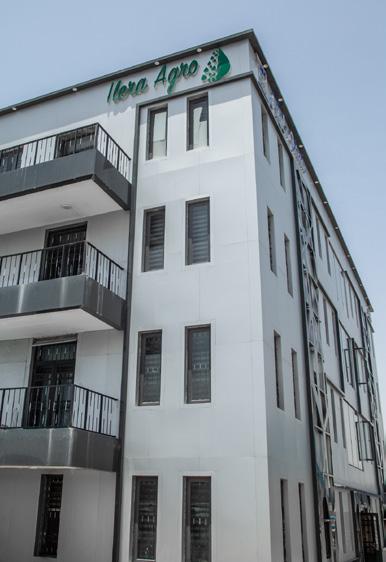
In recent years, the Nigerian agricultural sector has seen great turbulence, including currency devaluations leading to a sharp rise in import costs. To tackle this issue, PFM strives to keep the business local and in-house, shown through its commitment to the welfare and prosperity of smallholder farmers.
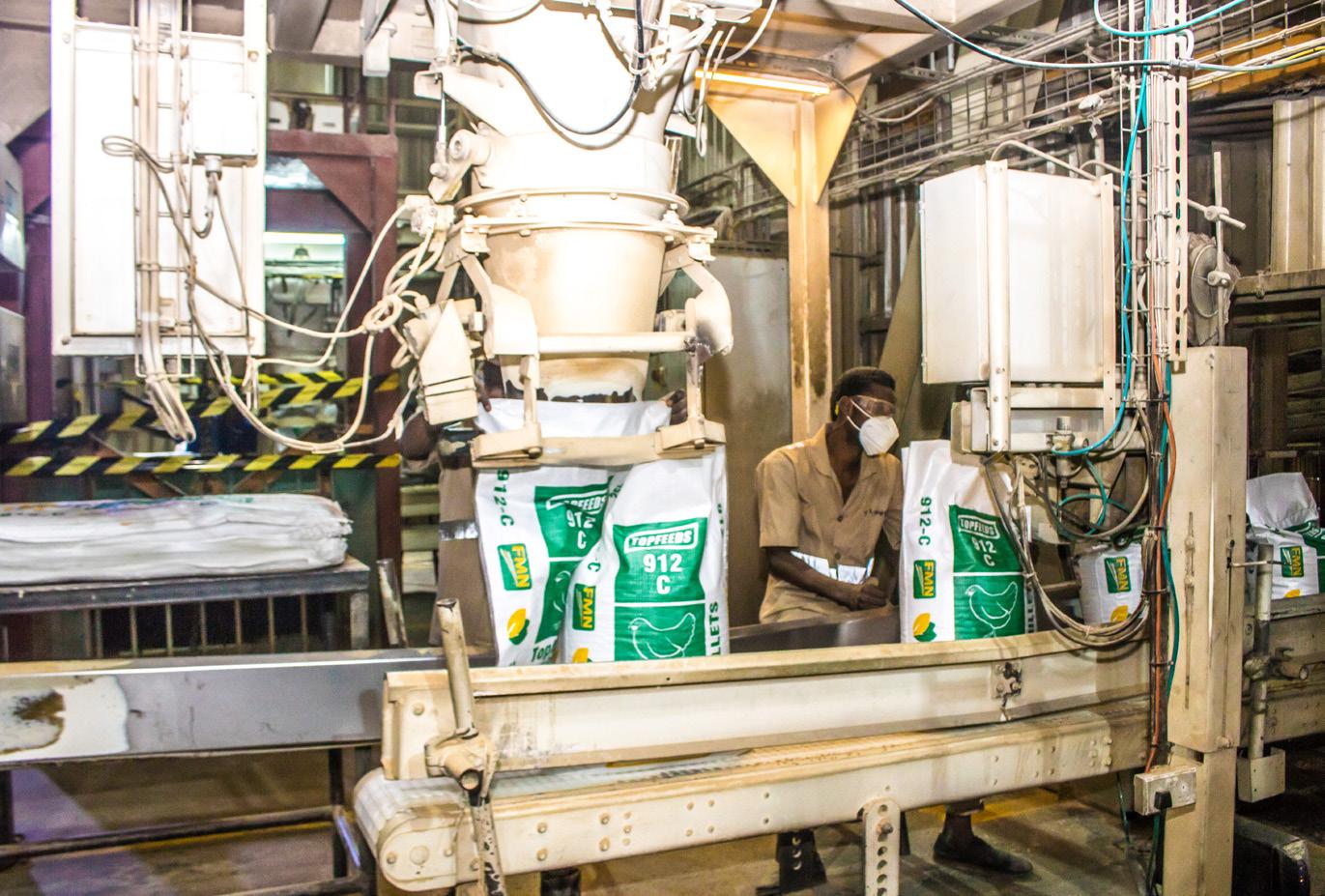
PFM sources local maize to provide employment for over 200,000 Nigerian small farmers. The company also utilises an open gate procurement strategy during the harvest period, which means that it buys directly from local growers to encourage the expansion of farms. This important tool follows a trend in the African agricultural industry as the sector endeavours to bolster local growers and produce. Thus, by creating a symbiotic relationship with its farmers, PFM nurtures the well-being of the animal feed sector.
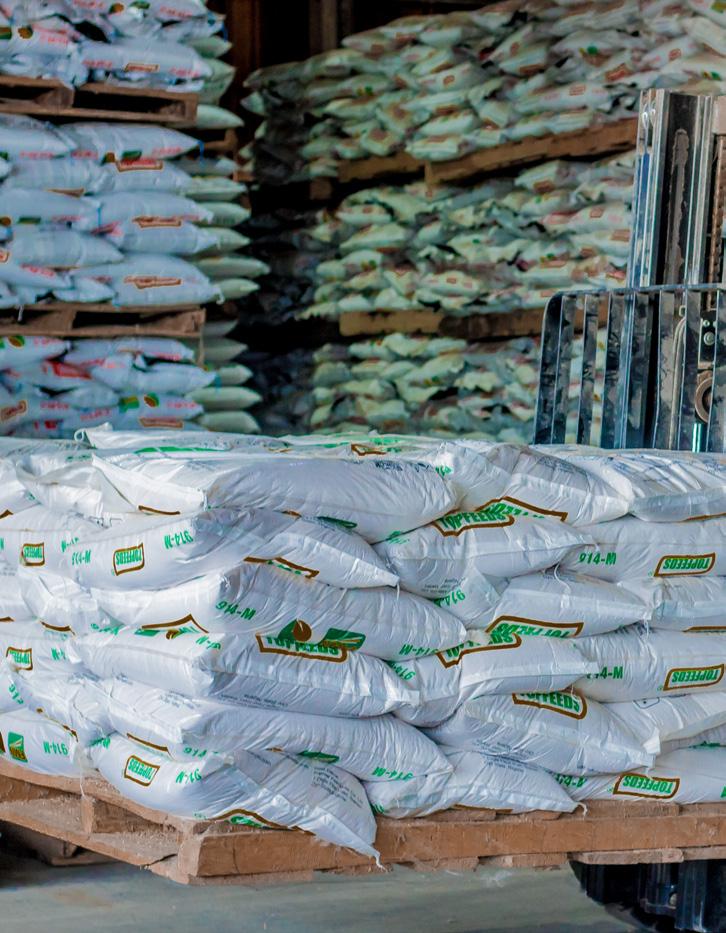
Excitingly, PFM has set up a fiveyear plan to consolidate its growth in Nigeria, as well as place a footprint in the West African market.
In the upcoming year, the company wishes to solidify its operations in Nigeria in terms of market expansion and increasing its volume. Following on from this, PFM hopes to broaden its horizons to neighbouring African nations.
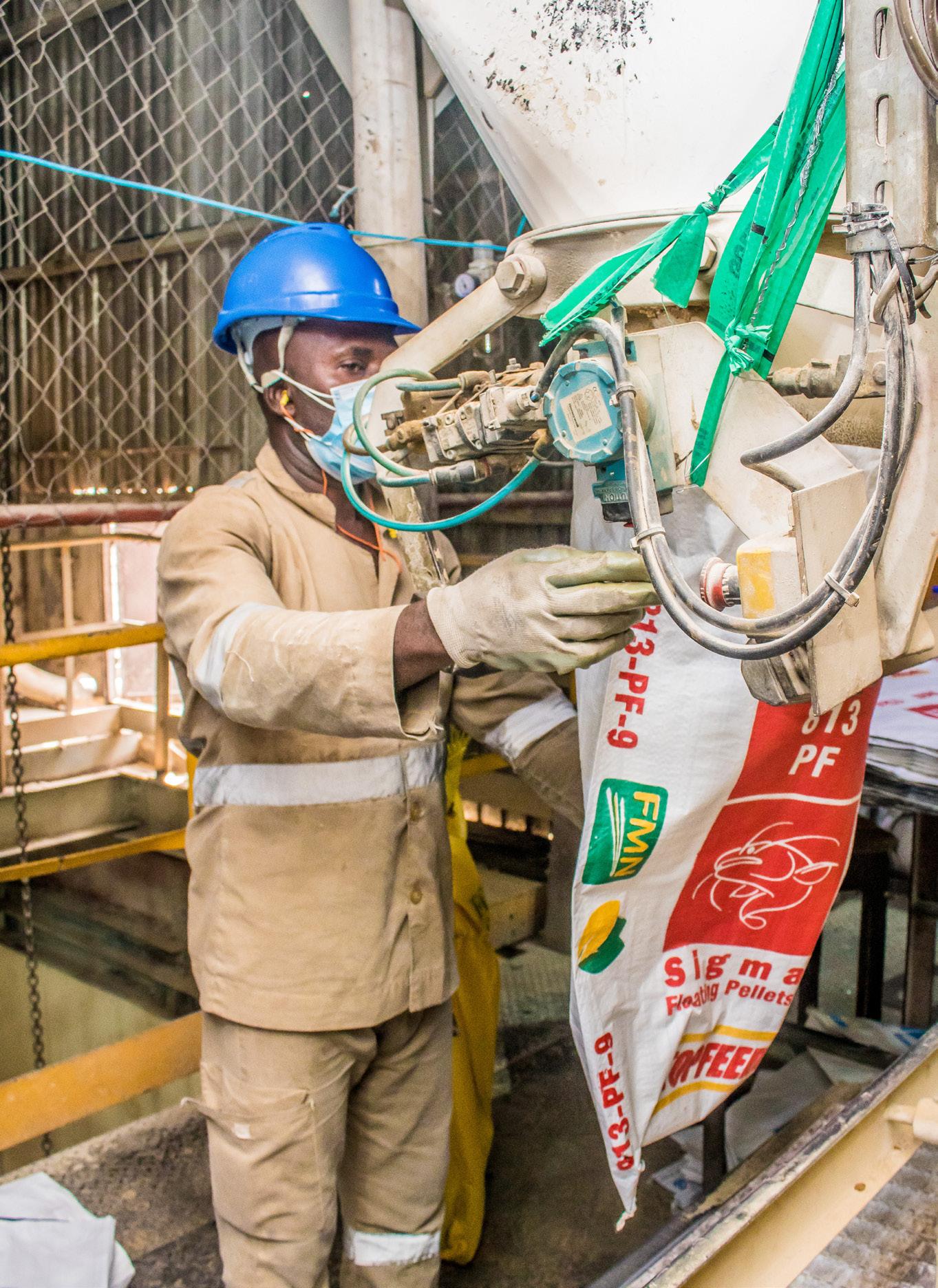
“The criteria for expansion is based on the country’s chicken consumption, the population of these countries and the disposable income available, as well as the ease of doing business,” Dalyop highlights.
To measure these set requirements, PFM has been conducting surveys and studying reports to deduce which countries’ markets it shall enter in the next few years.
Recently, PFM has overcome both local and international challenges. For example, the Russia-Ukraine conflict has permeated the Nigerian animal feed industry in more ways than expected.
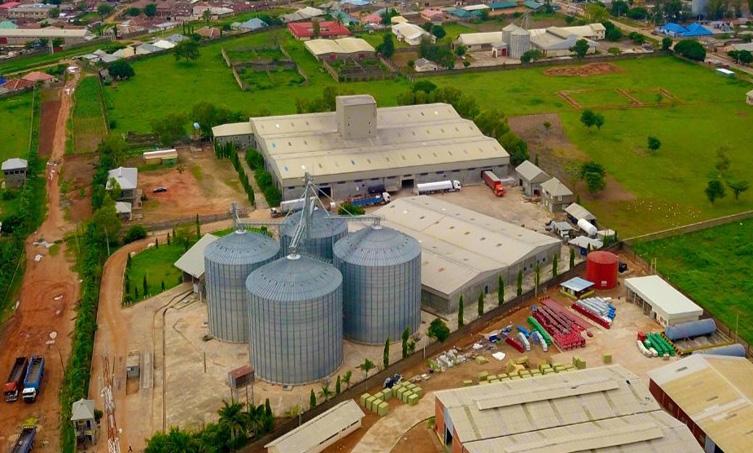
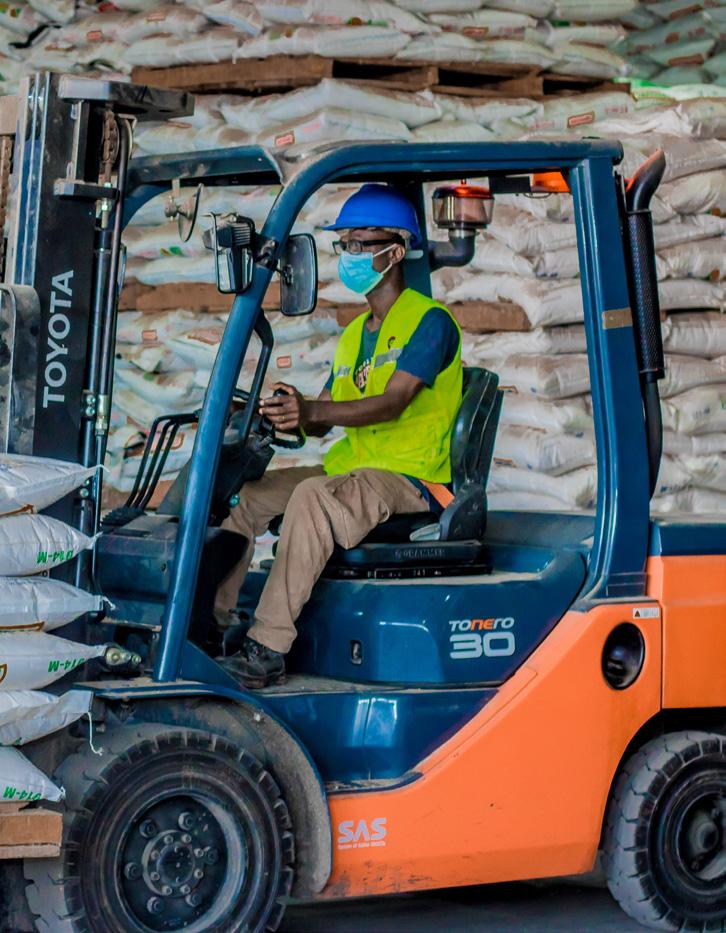
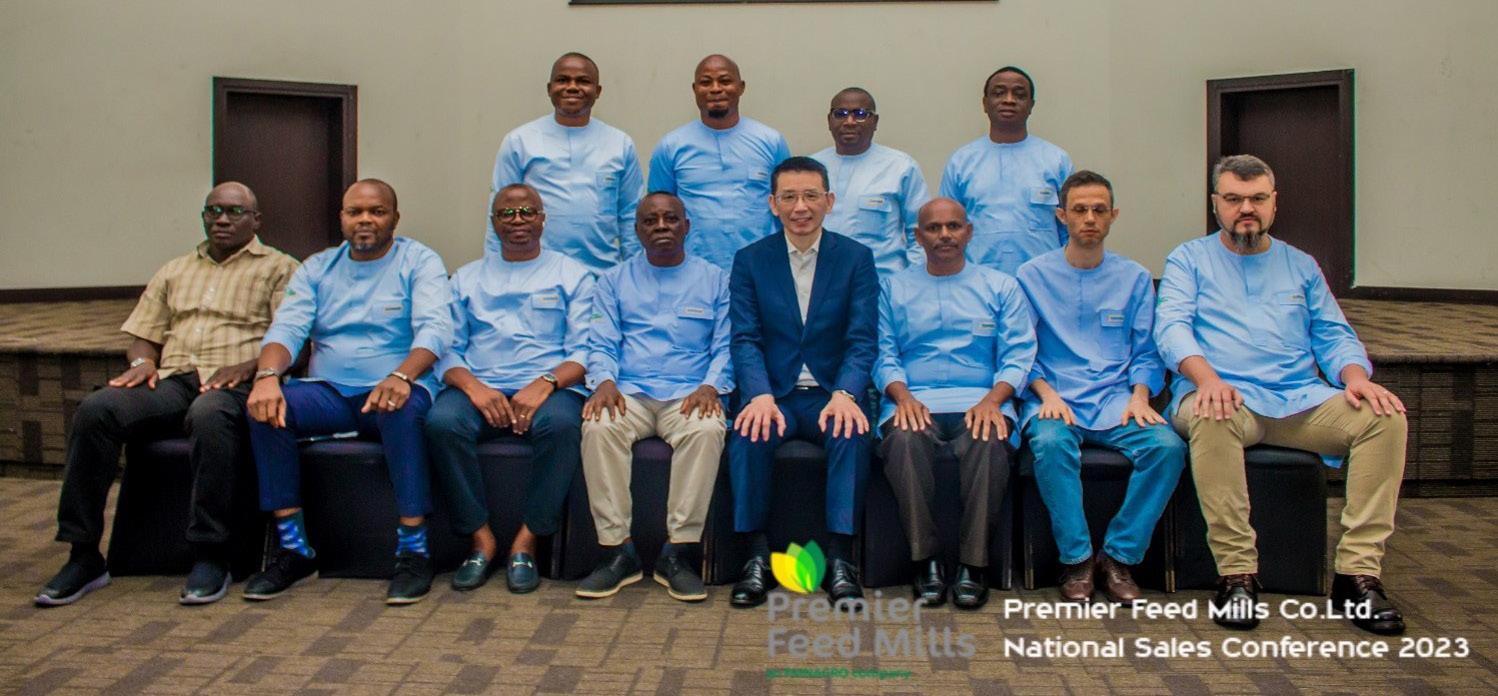
“Of course, about 25 to 30 percent of our ingredients for the feed are imported items. And with the crisis in Ukraine, we’ve seen how the global supply chain has been disrupted and affected by the war. We’ve also seen how the cost of energy and the prices of commodities have gone up exponentially, which has a trickle-down or ripple effect on the company,” observes Dalyop.
When this is compounded with recent droughts across some states in sub-Saharan Africa, challenges have arisen in currency devaluations and internal insecurity challenges that have impacted the rate of crop growth. In regard to the latter, farmers are not able to reach their farmlands for cultivation due to the herdsmenfarmers crisis, bandits and kidnappers, amongst other challenges.
“All these factors have been affecting business because if the farmers don’t grow crops, there’s no way we can grow feed using local grains materials. This means people don’t have enough disposable income to stimulate consumption of eggs and chicken,” Dalyop tells us.
Finally, the country’s political landscape has influenced the business trend, but it has had a surprisingly positive impact. “We just had an
election in Nigeria and the hope of the people is they want a change to happen very fast in the following areas: securing the country by restoration of peace across all divides, providing steady electricity, as well as upgrading and reviewing agricultural policies to guarantee food security for the nation by eating what we produce, and exporting the surplus,” recalls Dalyop.
If the three changes listed above are achieved, it will stabilise the country, create youth employment, improve the Naira exchange rate, and increase the export of finished goods. Thereafter, massive development will arise.
“We trust things will get better in our nation and that this will be enough to grow business and increase productivity,” Dalyop concludes.
Tel: +234 0908 750 4822
info@premierfeedsltd.com
https://premierfeedsltd.com/
“WE TRUST THINGS WILL GET BETTER IN OUR NATION AND THAT WILL BE ENOUGH TO GROW BUSINESS AND INCREASE PRODUCTIVITY”
– AUSTINDALYOP, GENERAL MANAGER SALES AND MARKETING, PREMIER FEED
MILLS
With a rich history spanning 41 years, Boogertman + Partners (B+P) has flourished into a prominent architectural firm renowned for its remarkable design capabilities, and creative presentation methods and process. Fostering its reputation further, the firm strategically recruited a team of partners who bring specialised knowledge in technical project delivery across the continent as well as contract administration. This deliberate approach has propelled B+P to be the go-to destination for aspiring young professionals and designers seeking architectural services.
At the core of B+P is a dynamic team of directors who share a vision for design that is both innovative and contextually responsible. With a dedicated commitment to the entire building process, from project inception to execution, the team is complemented by talented professionals in various disciplines including urban designers, interior
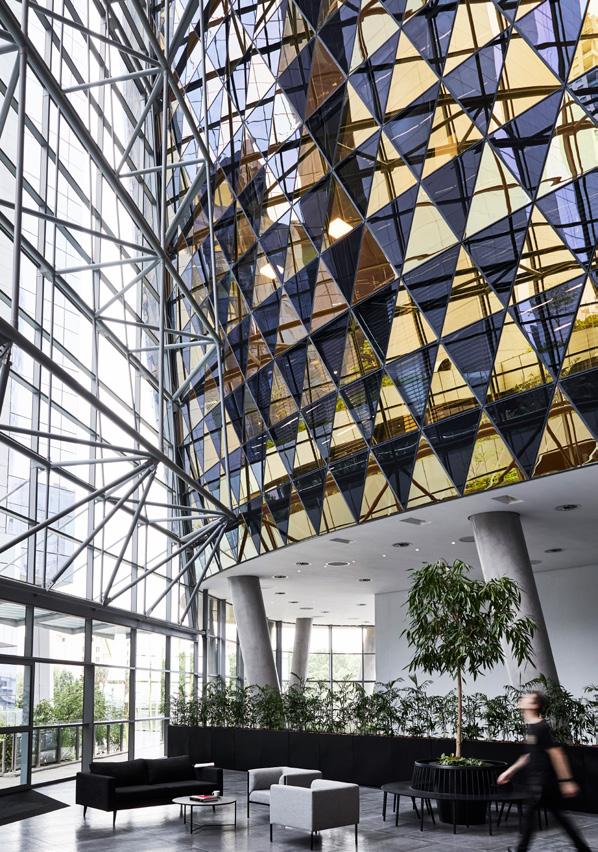
designers, architects and landscape architects. Boasting a total of 144 staff members and professionals, the firm also benefits from the expertise of in-house graphic design and marketing personnel, along with administrative staff, all of whom collaborate to make B+P what it is.

Boogertman + Partners is an ambitious and innovative player in Africa’s architectural scene. We take a look at the firm and its people-centric projects impacting lives for the better

B+P is a Gold Founding Member of the Green Building Council South Africa (GBCSA). With increasing concerns over global warming and the pressures of growing urbanism, the practice fully supports the sustainable transformation of the built environment. Through an integrated design approach, B+P’s project solutions create environments that are low in energy consumption, efficient and flexible, and encourage optimal healthy lifestyles.
Led by people-centric and green goals, B+P has garnered widespread acclaim for successfully delivering numerous iconic structures, such as RMB Merchant Place, Soccer City, Discovery Health Head Office, Department of Environmental Affairs, and many others. These architectural achievements have earned the firm significant recognition and accolades throughout Africa, cementing B+P’s position as the most awarded practice on the continent.

It’s certainly an exciting time for B+P; post-COVID-19, architecture in Africa
has undergone a transformative journey. The company has encountered challenges along the way, but now there is a renewed interest in revitalising sectors that experienced a lull during the two-year period. Surprisingly, B+P is witnessing a surge in industrial spaces, office designs, and retail projects, which were initially expected to decline following the pandemic. The emphasis has shifted towards developing versatile mixed-use spaces that
The practice makes a conscious effort to apply sustainable design principles as standard to all projects, even those that aren’t aiming for official green certification. LEED and Edge certification along with Green Star rating tools have provided a platform for everyone in the built environment to not only encourage sustainable design but also to measure the level of sustainability achieved.
As the leading African practice, working with green consultants and accredited team members on several projects has pioneered the introduction of new Green Star rating tools in partnership with GBCSA. Sandton Gate piloted one of the first Green Star Sustainable Precinct ratings, and Mon Tresor Business Gateway Office Park was the first Green Star rated building in Mauritius in 2019. Furthermore, in Nairobi, three of the ALP logistics warehouses in Tatu City received the first industrial Edge Green Certification awarded in Africa.
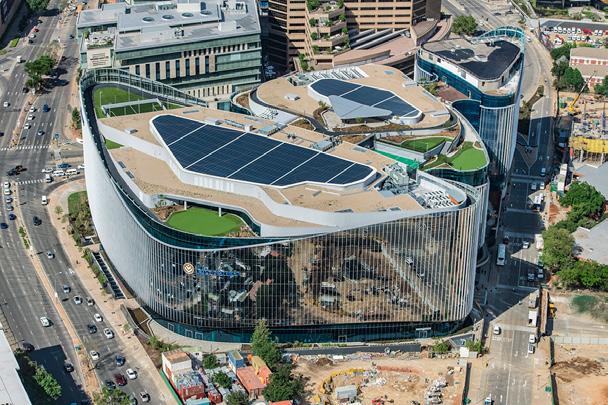
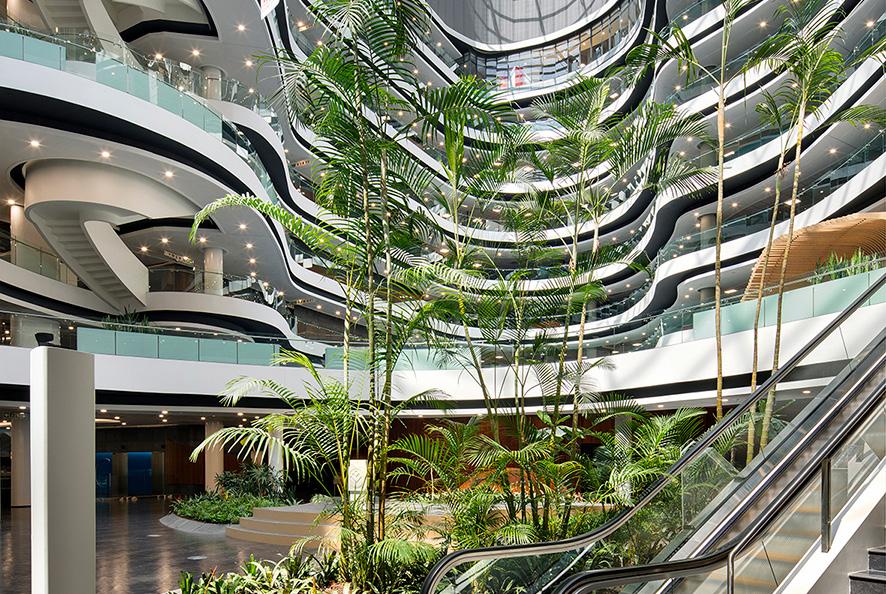
“Through these achievements, we are proud to contribute to the advancement of sustainable design in the built environment. Our dedication to sustainability remains unwavering as we continue to create buildings and spaces that prioritise the well-being of both people and the planet” - Boogertman + Partners
combine multiple functions within a single programme.
Designing for heavy industries like mining needs a distinct approach and a specialised skill set. Functionality, safety, robustness, affordability, and sustainability are all crucial factors that must be considered. In a recent project called The Village Masterplan, the design of the accommodation was primarily driven by construction methodology constraints and project timeline limitations.
The unit designs were determined by the housing categories specified by the client, which formed the foundation of the design brief and outlined the occupancy requirements and finishes for each unit. Due to the inaccessibility of the site, conventional construction techniques in the area, and project timeline constraints, the units featured simple forms and finishes, and the strategy involved arranging them in a way that prioritised the shared public space rather than emphasising architectural features.
One of the main design principles underlying The Village Masterplan was the creation of a “collective living environment” that harmoniously blended with the surrounding landscape. The housing buildings are grouped into clusters, arranged organically, and interconnected by winding walkways
YOU GIVE SHAPE AND SUBSTANCE TO YOUR VISION... WE CONCEIVE THE MEANS TO MAKE IT PERFORM.
From grand and iconic sports stadiums… to inspiring office buildings… to reassuringly practical and eye-pleasing hospitals, our principal engineers and team of associates have proven expertise in delivering elegant solutions that integrate structure and architecture most cost-effectively.
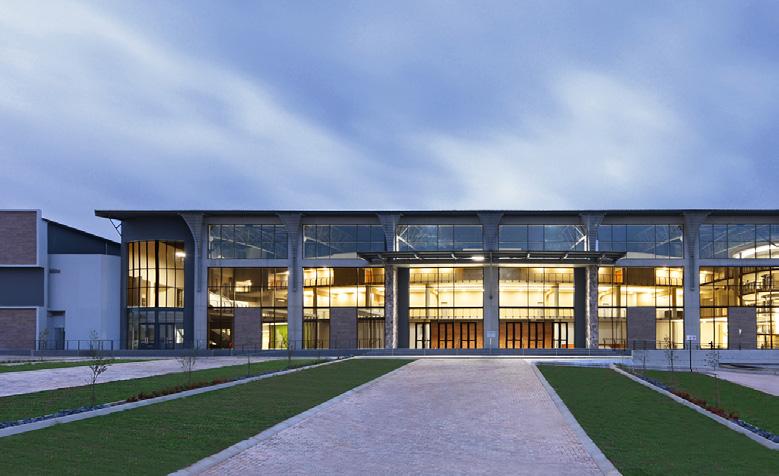
T: 27 82 555 3668
www.fortem.co.za
and communal entertainment areas. This configuration fosters a sense of collective social interaction, which holds significant importance for the client and the users.
Despite encountering limitations in B+P’s designs across different industries, the company’s primary
goal is to consistently create spaces that uphold dignity for those who will inhabit them.
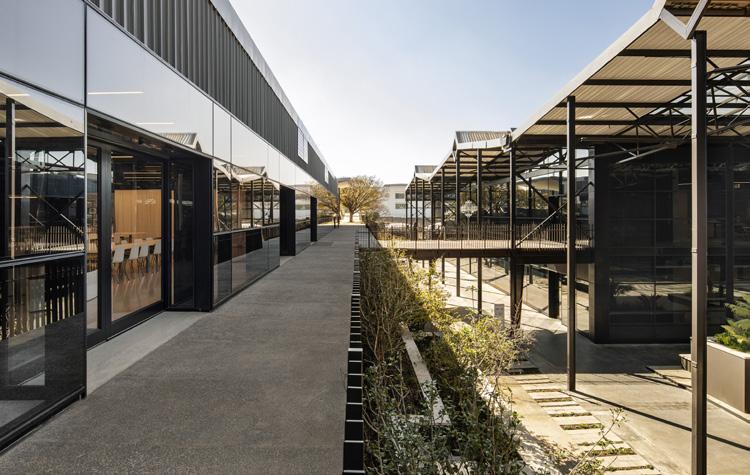
Throughout the years, B+P has had the privilege of participating in several noteworthy retail projects across

the continent, particularly in the last five to 10 years having successfully completed The Marc, Fourways Mall, Castle Gate, and The Neighbourhood Square. The firm has been at the forefront of introducing retail centres in small towns, recognising their significance as central meeting places

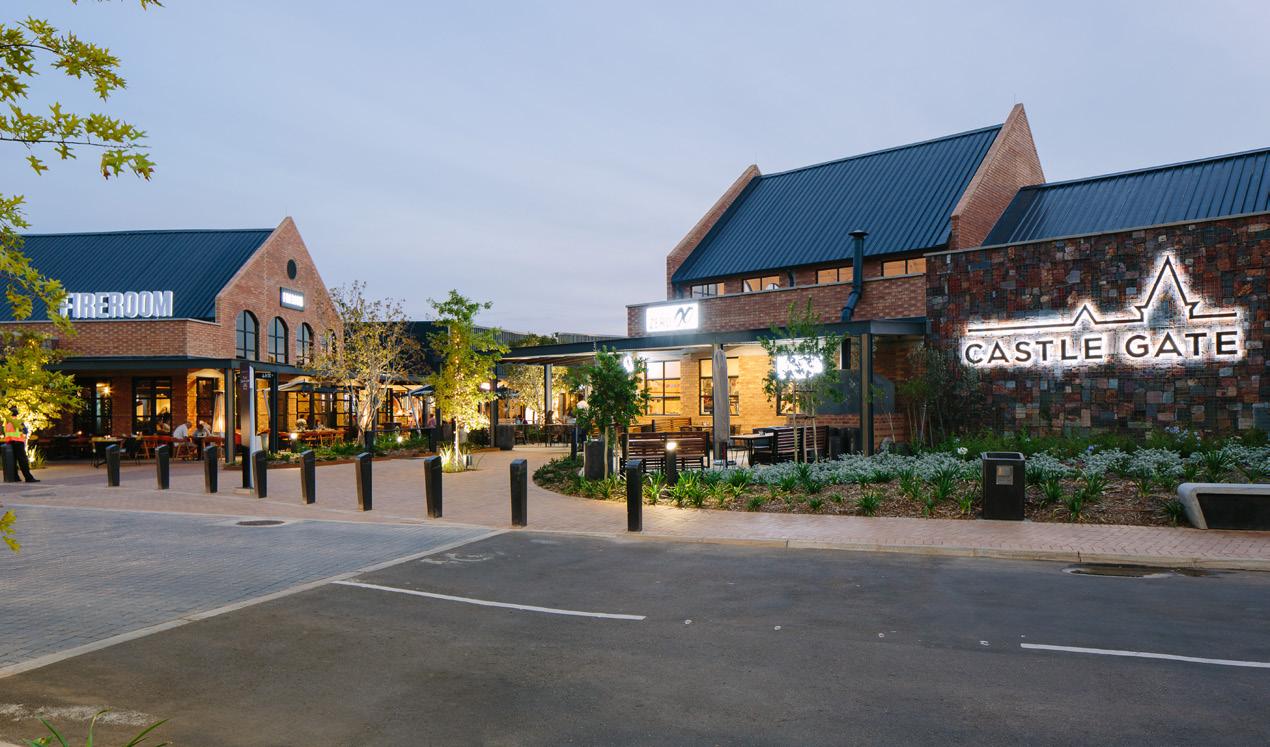
 Fourways Mall
Fourways Mall
for the communities they serve. Recently, the company concluded projects such as the Stimela Crossing Mall (Barberton) and Masingita Mall in SA, further exemplifying its commitment to local communities.
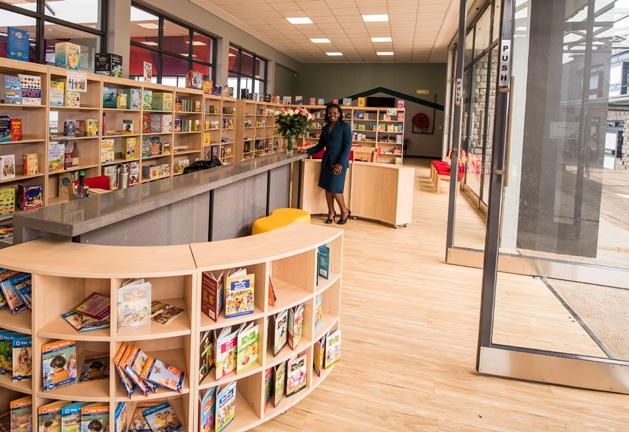
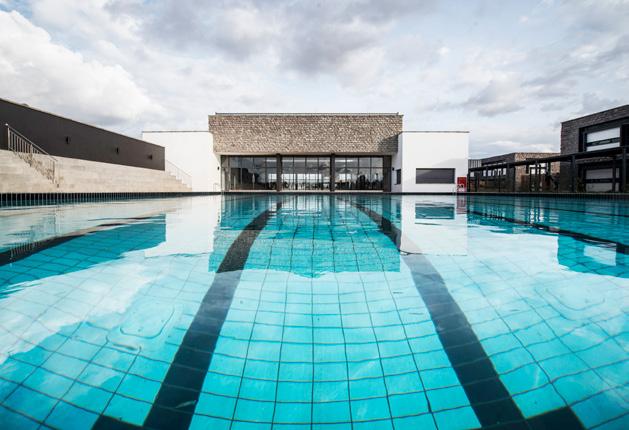
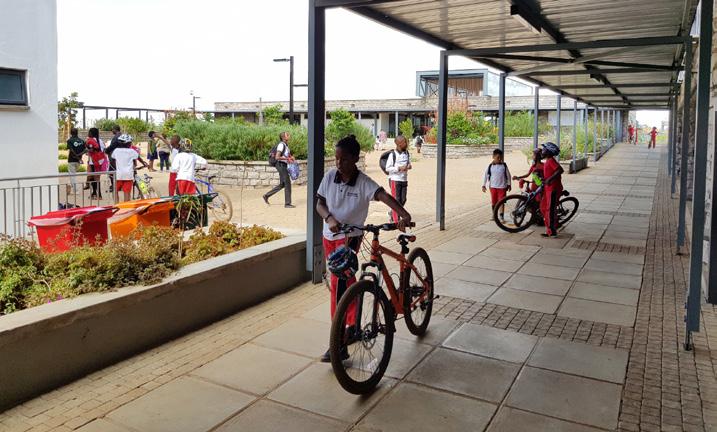
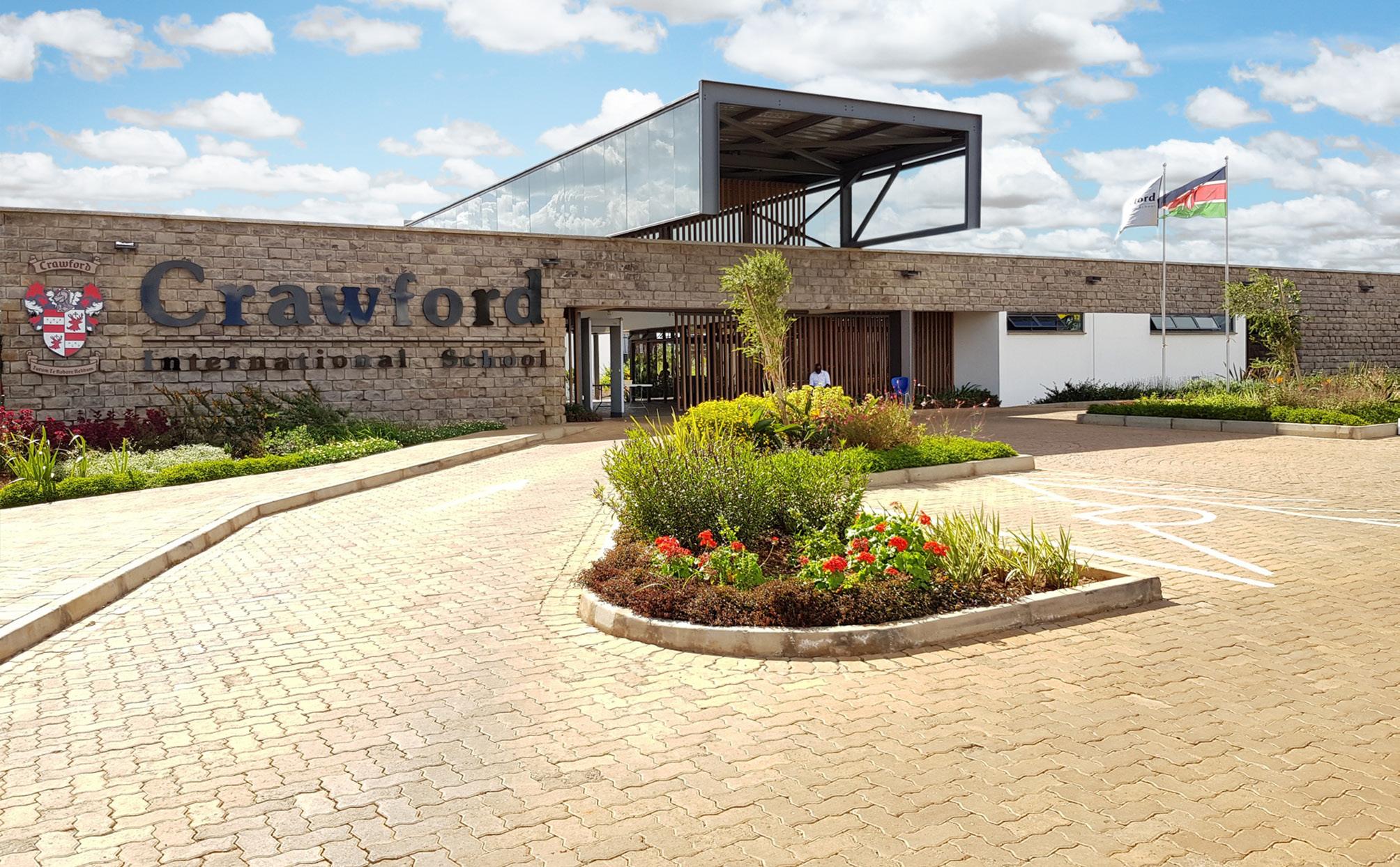
It is B+P’s mission to lead the way in redefining collaborative retail design in SA and beyond. The company strives to involve the client, residents, business owners, and community leaders in the process, as their input provides valuable insights into the community’s history.
Whether embarking on ground-up developments or engaging in exciting refurbishments, B+P’s unwavering dedication remains the same — to prioritise the community. This communal element of operation envelopes the company’s work in the education sector as well, driven by a deep focus on researching and designing spaces that facilitate learning and cater to various modalities of knowledge absorption. This approach is clearly demonstrated in projects like the Steyn City
School in Johannesburg, where B+P collaborated with SCAD in a joint venture and incorporated design methods tailored to various age groups. The project encompasses thoughtfully designed interactive play areas for pre-schoolers, a state of the art library equipped with cutting-edge technology, and a science laboratory for older students. Every aspect has been meticulously planned and executed, reflecting a commitment to excellence. Insights gained through the company’s research in education
are exemplified in the award-winning Crawford International School in Nairobi. This school embodies the concept of communal interaction, with a central square serving as a hub for connectivity and learning. Furthermore, its modular design structure allows for flexible adaptation based on the specific climatic conditions of each school’s location.


B+P recently concluded the construction of two notable educational centres, namely the crèche which is part of 8 Merchant Place and Thaba Eco Montessori. Situated on the second floor of a lifestyle centre within 8 Merchant Place, the creche provides a facility that opens up to a secure open-air playground exclusively accessible from the creche. This arrangement allows for the accommodation of babies, toddlers, and pre-schoolers, specifically catering to the employees of Rand Merchant Bank. As a result, parents benefit from the flexibility of being able to visit their children during lunch breaks and remain readily available in case of any emergencies.
Similarly, the Montessori school at Thaba Eco is conveniently located within the complex, making it easily accessible for the residents residing there. Such integration of educational institutions with other building programmes as an added service is becoming increasingly prevalent and advantageous.
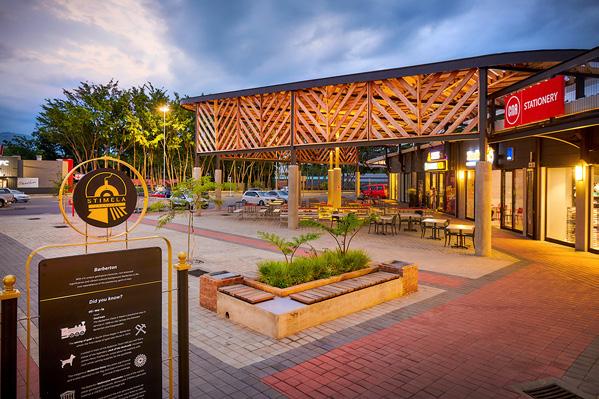
B+P has been recognised as the leading architectural firm operating in Africa for 2023, according to Building Design’s annual survey of World Architects. Presently, B+P has multiple offices in South Africa, an established office in Nairobi and is in the process of expanding its presence to other regions in East and West Africa.
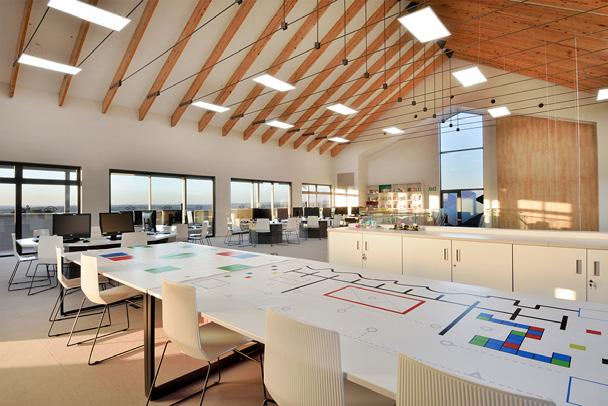


B+P has successfully delivered a wide range of projects in 10 countries beyond South Africa. Additionally, the company has provided design

and concept work in 24 countries, showcasing its understanding of the complexities and challenges within the architecture industry across Africa.
To effectively navigate diverse markets, B+P collaborates with local architects and maintains structured alliances with consulting professionals. This approach enables the company to drive projects from inception to completion in different countries. B+P acknowledges the obstacles it may encounter, such as limited infrastructure and technology, but as a firm born and operating in Africa, it possesses the necessary qualifications to overcome these challenges. If one thing is certain, the future holds exciting prospects for B+P as it looks ahead to the coming years.
‘OUR AMBITION IS TO LEAD THE WAY IN REDEFINING COLLABORATIVE RETAIL DESIGN IN AFRICA AND BEYOND’

Director of R+N Master Builders, Shay Nicholls, showcases the flourishing examples of innovation seen in its multitude of projects, whilst striving to go green
Writer: Lucy Pilgrim | Project Manager: Taylor GreenThe construction industry exists as the bread and butter of a functioning industrial age. In Cape Town, South Africa (SA), the industry works to serve its community, as a significant contributor to not just its physical infrastructure, but also its social livelihood.
R+N Master Builders (R+N) goes one step further, as its technical efficiency has heralded the company as one of the leading construction entities, thanks to its fine craftsmanship, unshakeable principles, and hard work. Such operational expertise is showcased
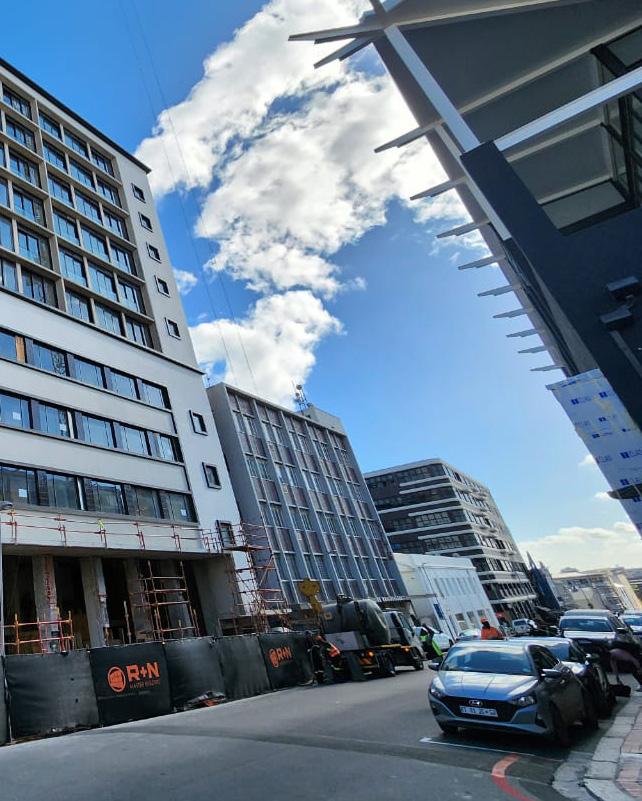
through a variety of building projects spanning many sectors, including luxury residential, hospitality, heritage, wine farm buildings, tenant fitouts, complex renovations, hospitals and specialised theatres, and shopping mall revamps, catering to any construction-related need.
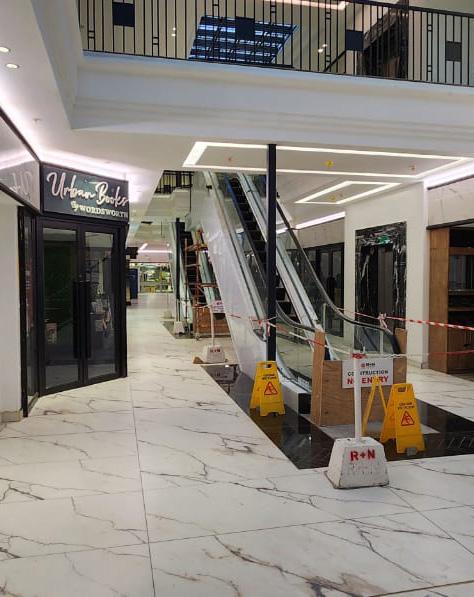
“We are a niche contractor who strives not to be the biggest, but rather the best,” introduces Shay Nicholls, Director of R+N.
“We ensure all our contracts are handled by a director, so there is a quick and direct link to be able to make quick decisions from a client level, and consultant level, as well as a site level.”
One of the defining characteristics of R+N is its dedication to each project and the unmatched guidance it provides to its clients. Through
diligent negotiation, the company is often involved in the design from the early stages, by way of its vast experience in construction methodologies, sequencing and programming of the project, as well
as invaluable detailing for long-term maintenance.
Furthermore, the company provides alternate ideas to enhance the project’s feasibility and goes as far as partnering with the developer. To add to this, R+N provides further assistance to the architectural side of the project, so the team can project manage the works on many contracts to ensure a smooth flow of information needed for construction.
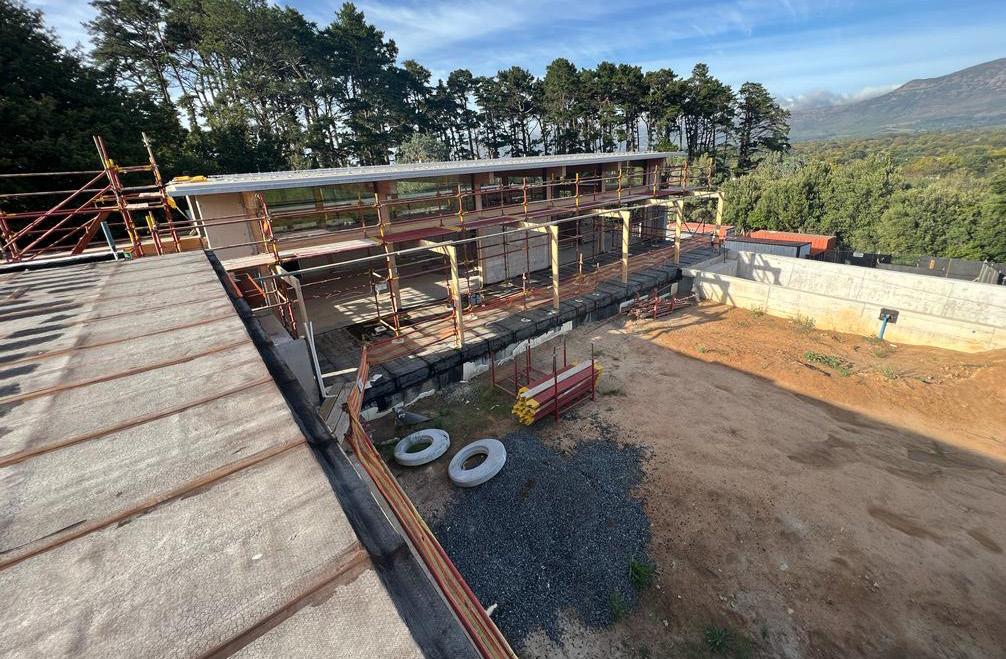
With the client as the primary focus, R+N believes that during negotiations, it is paramount that the client is aware of all the potential costs upfront and includes these items in its costings, so there are no hidden surprises during the project. This is further encouraged by the company’s experienced knowledge of project viability.
As such, R&N prefers to be involved in the project from beginning to end
and assist the professional team through the complex fire integration of a multitude of building life-saving systems and health and safety requirements to receive the official sign off from the municipality and fire chief.
“Our clients vary from many corporate clients, private clients and developers, looking for a reputable contractor to align with their business that has many years in the industry and stands by their work and the products they deliver. We have many repeat business partners as our interaction is professional and personal with our clients,” highlights Nicholls.
As a vital counterpart to its client base, R+N’s 159 permanent members of staff can be found continuously on site. Each site is supported by a dedicated plant yard, equipped with cranes, trucks, various plant and scaffolding equipment, as well as longstanding sub-contractors who can support R+N’s high-quality standards.
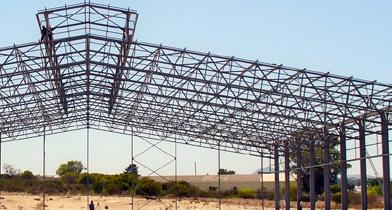
R+N is proud of the employee base that it has built since inception, and all four of its main partners hold a substantial tenure at the company. In total, R+N’s partners have a combined experience of almost 90 years. Such an extensive length of time has

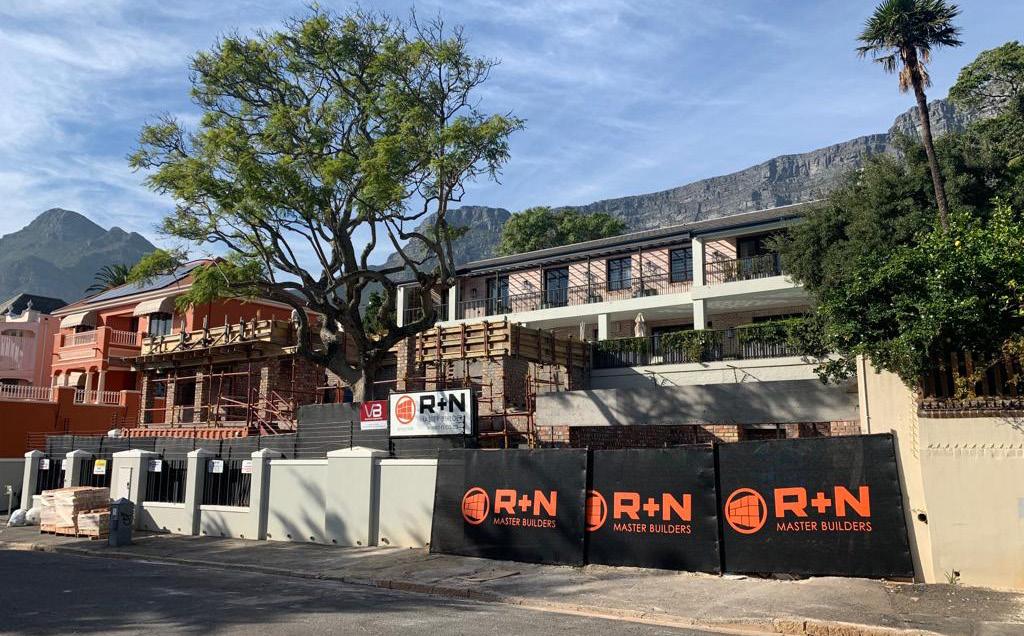
engraved an ethos of success and efficient delivery throughout the business.

The site management staff, several of whom have been with the company for almost 40 years, have subsequently amassed substantial knowledge to aid clients and partners.
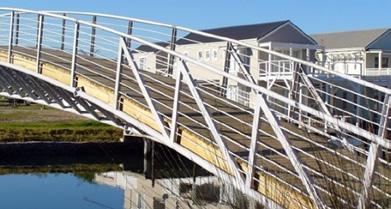
“Collectively, this construction experience and loyalty is a testimony to the manner in which we care for our people, and this translates into our high level of workmanship on our projects,” Nicholls tells us.
“R+N looks at its role in the project not as a builder, but as a team player collaborating with consultants and the client for a smooth project and to ensure delivery on time without sacrificing quality. The directors and site managers offer their expertise to the consultants to find better and more economical ways to complete the project and to foresee and find solutions to challenges that may arise ahead of time.”
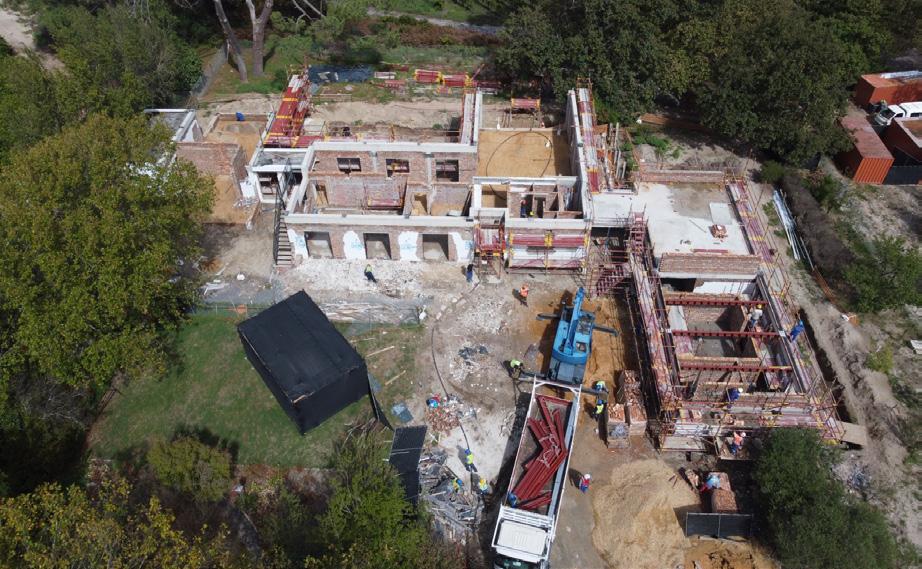
“WE ARE A NICHE CONTRACTOR WHO STRIVES NOT TO BE THE BIGGEST, BUT RATHER THE BEST”
– SHAY NICHOLLS, DIRECTOR, R+N MASTER BUILDERSProkon Services is a trusted name in the structural steel construction industry having serviced the Western Cape since 1996. From workshop detailing, fabrication, through to full site erection, we provide a thorough and complete personalised service for any sized job.
R+N possesses an impressive multitude of projects that are taking Cape Town’s infrastructure and commercial space to a new level.
One of the most exciting projects recently completed is the Station House Project. A marvel at the foot of Sea Point, the 200-unit apartment building was constructed in a mere 12 months and completed at the end of 2022. The world-class building includes many luxuries, such as a boutique hotel, two upmarket restaurants, a communal roof pool, as well as a comprehensive space which houses gyms, physiotherapists, various workspaces, and a yoga studio. The project symbolises the future of living where all you need is around you.

To add to the rich culture of Cape Town, the company is involved in converting a beautiful private wine farm to a high-end public wine entity. This will positively add to the city’s tourism appeal, as the public wine farm will include an ultra-modern wellness centre, along with an olive press, new guard houses, and much more as it enters phase two.
In regard to residential operations, R+N’s upcoming portfolio has lots to offer. The company is constructing a number of large luxury residential houses for both local and foreign clients. This type of construction is very particular and R+N has specific teams experienced in this sector of the market to ensure the visions of the creators are met.
“One of the houses is being built
while it is being designed, since the methods of construction are on the edge of green-building construction technology with most materials from renewable sources. This creates a need for team collaboration – the essence of our ethos and mantra,” explains Nicholls.
On the other luxury residential side, R+N is delving into two worldclass housing projects. One has a distinct off-shutter concrete shell, with the finishing phase currently in progress and due for completion early 2024, and the other has just started casting foundations. In the City Bowl of Cape Town, the company is completing another house at the foot of Table Mountain for a longstanding client, due for completion in late 2023.
- 1948: Post war, Civil Engineer Eric Resnekov joins forces with master builder Eric Nielsen, to overcome adversity in the slump of the building sector as they create Resnekov + Nielsen, founded on strict principles of integrity and perseverance.
- 1952: Resnekov emigrates to Israel and Gerald Kling takes over, injecting energy and professionalism into the company.
- 1965: The company moves away from civil works and turns towards construction and property development.
- 1988: R+N celebrates its 40th anniversary at South Africa’s oldest and best-known monument, The Castle of Good Hope.
- 1994: Gerald Kling retires. The ‘Masisebenzisane - let’s work together’ slogan is adopted.
- 2004: The succession planning and business development of the past 10 years pays off as new partners come on board and the business shows strong growth. Resnekov & Nielsen changes to R+N, heralding a new era.
- 2012: After only seven years of trading under the name R+N, the new management team celebrates the completion of 100 projects across a diverse spectrum and representing in excess of R1 billion worth of turnover (USD$51 million).
- 2018: R+N celebrates the a new partnership of Anton Mandelstam, Cala Bester, Rodger Buttress and Shay Nicholls taking the company into the future.
- 2023: R+N reaches a milestone of 75 years of continuous construction in Cape Town.
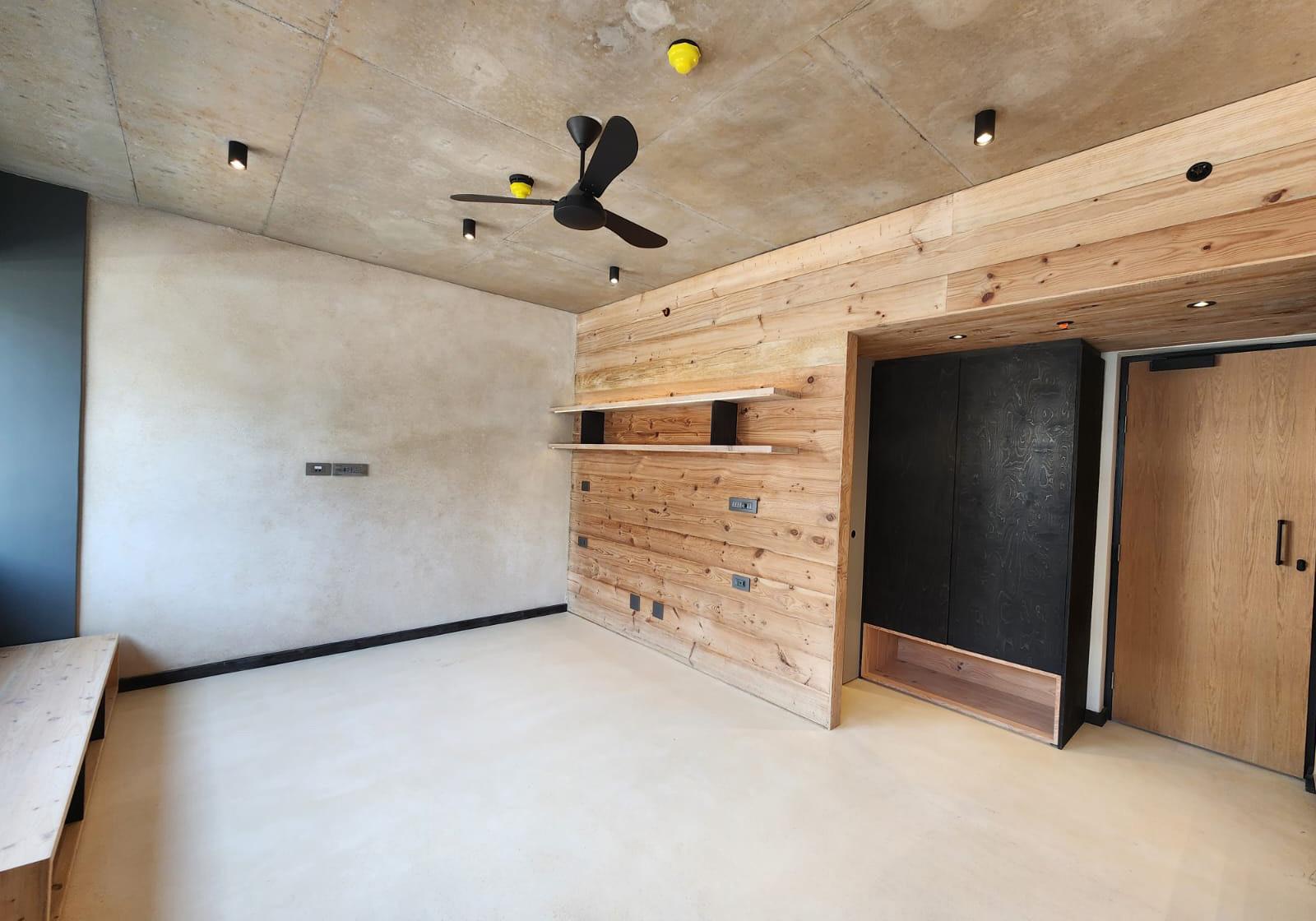
One of the biggest ambitions of R+N is to be a part of the ‘greenest building ever’. As such, the company has been heavily involved in Shiro Towers in Harrington Street, Zonnebloem, to make its client’s dream a reality, and take green to a new level in a multi-storey building.
“The architect and client are pushing the boundaries of renewable material exploration and are often building on the edge of design, and giving the building a warm environment, both thermally and aesthetically. We are extremely honoured to be part of this as green buildings are the future for us and
Shay Nicholls, Director: “Our suppliers and sub-contractors are key to our performance. Thus, it is vital for us to ensure that we work together as a team, and as such, we strive to look after them by offering advice on site, meeting regularly with their management teams, and ensuring they are paid on time. We also assist up-and-coming small and medium-sized enterprises (SMEs) with guidance in business and health and safety. The directors often discuss aspects of the projects directly with the suppliers and sub-contractors and if there are any issues needing resolutions, they know they have direct access to the directors. This ensures trust and integrity amongst our team, a cornerstone of our success.”
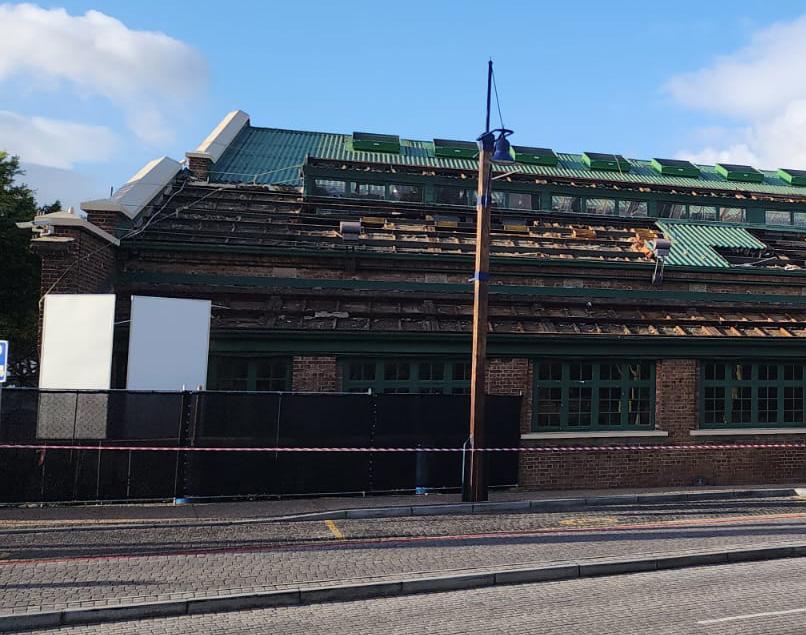
particularly our children,” Nicholls states.
“We hope that other developers follow suit and more of these modern building techniques find themselves onto other projects.”
Looking further ahead, R+N will continue to navigate the construction market in the face of recent fluctuation.
“The market is an interesting one at the moment as the tender results are very inconsistent, which could be due to a few reasons: some contractors are buying work to keep themselves

busy which is not a sustainable base for them or the industry, while other contractors are pricing risk and others are not,” comments Nicholls.
In response to this, the company aims to build on its existing relationships, whilst continuing to expand its reach to new clients. This will help alleviate the pressures when certain sectors experience a shortage of work. Internally, R+N plans to further the investment in its people and systems, by utilising technology to upskill its staff for the overall benefit of clients and the community.
At the heart of R+N lies 75 years of sustainability and evolution in both
commercial and residential homes for its surrounding community in Cape Town, whilst putting its clients’ needs first to guarantee that each project is completed efficiently, in a streamlined manner and on time.
R+N MASTER BUILDERS
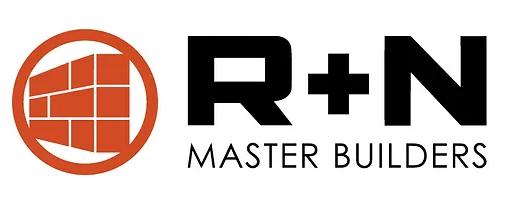
Tel: 021 422-3580
info@r-n.co.za
www.r-n.co.za


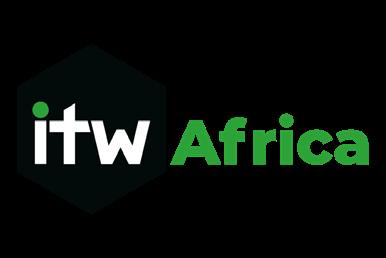
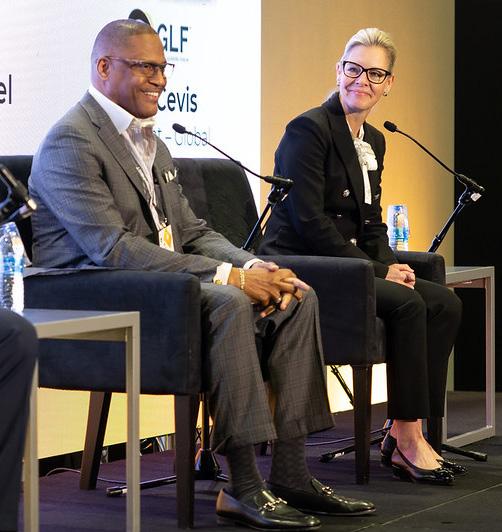
ITW AFRICA is an influential gathering of C-level executives, VPs, Directors, and Heads representing every facet of the digital infrastructure value chain. ITW Africa offers a platform for seamless meetings that empower you to forge fresh agreements, strengthen alliances, and establish valuable connections. With an exciting line-up of social functions such as invigorating breakfast briefings, dynamic networking lunches, and vibrant drinks receptions, you’ll have numerous
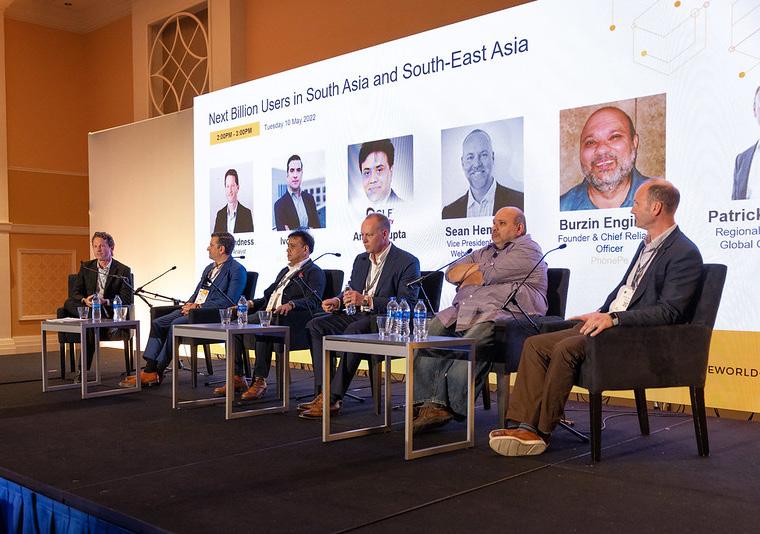
opportunities to interact with likeminded professionals, existing clients, and prospective business partners. Prepare to immerse yourself in a bustling atmosphere designed to foster fruitful encounters and propel your professional journey forward.
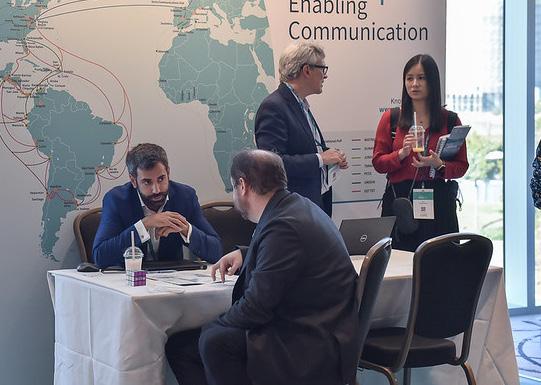


12 - 14
SEPTEMBER 2023, NAIROBI, KENYA
ACCELERATING CONNECTIVITY IN AFRICA
Meeting heavy agenda
Networking-led activities


C-suite insights


SAVE 10% WITH CODE: OUTLOOK10
HOST SPONSORS

DIAMOND SPONSORS
GOLD SPONSORS
SILVER SPONSORS

 Priscilla Gathungu CEO, Java House
Priscilla Gathungu CEO, Java House

“My greatest motivator is change and transformation; stagnation is boring. Making an impact on our people is also one of our focal points, and I am greatly motivated by both our team and our customers. By our very nature as a company, we are in the people business!”
Bhavna Patel CEO, Groote Schuur Hospital
“To provide excellent service. When you walk around the hospital and see staff engaging, smiling and happy to be working, that in itself just gives so much satisfaction. Similarly, when patients leave here satisfied with the service that they received, that provides the motivation to carry on.
Leadership in this context is so difficult and it's not something that comes easily. It's about building relationships more than anything.”
Jason De Carteret Head of Solarcentury Africa“We are a team of experts that are not only exceptional at their jobs, but are also good people who you can depend on to make the right decisions in any given situation. Having that level of trust in your team inspires teamwork, and I consider leading such a team an honour. That is my greatest motivator.”

Are you a CEO/Director interested in telling your story? Contact Africa Outlook now!
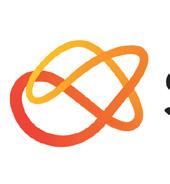
To round off each issue, we ask our contributing business leaders for their views on the same question
Building on the global success of our regional titles – Africa Outlook, APAC Outlook, EME Outlook, and North America Outlook – Outlook Publishing is proud to introduce a platform dedicated to the mining and resources sector.

As mining organisations worldwide confront unprecedented change, embracing technological innovations and incorporating critical environmental sustainability agendas, now more than ever is the time to showcase the strides being taken in this dynamic sector. A multi-channel brand, Mining Outlook brings you the positive developments driven by organisations across the global mining industry through our various platforms. Discover exclusive content distributed through our website, online magazine, social media channels, and dispatches delivered straight to your inbox with a bi-weekly newsletter.
Through this compelling new venture, we foreground the movers and shakers of the industry. To participate as a featured company and join us in this exciting endeavour, contact one of our Project Managers today.
www.mining-outlook.com


